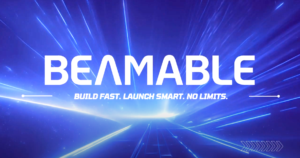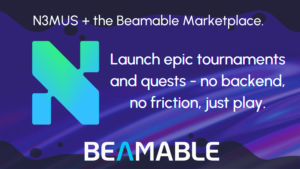Category: Blog
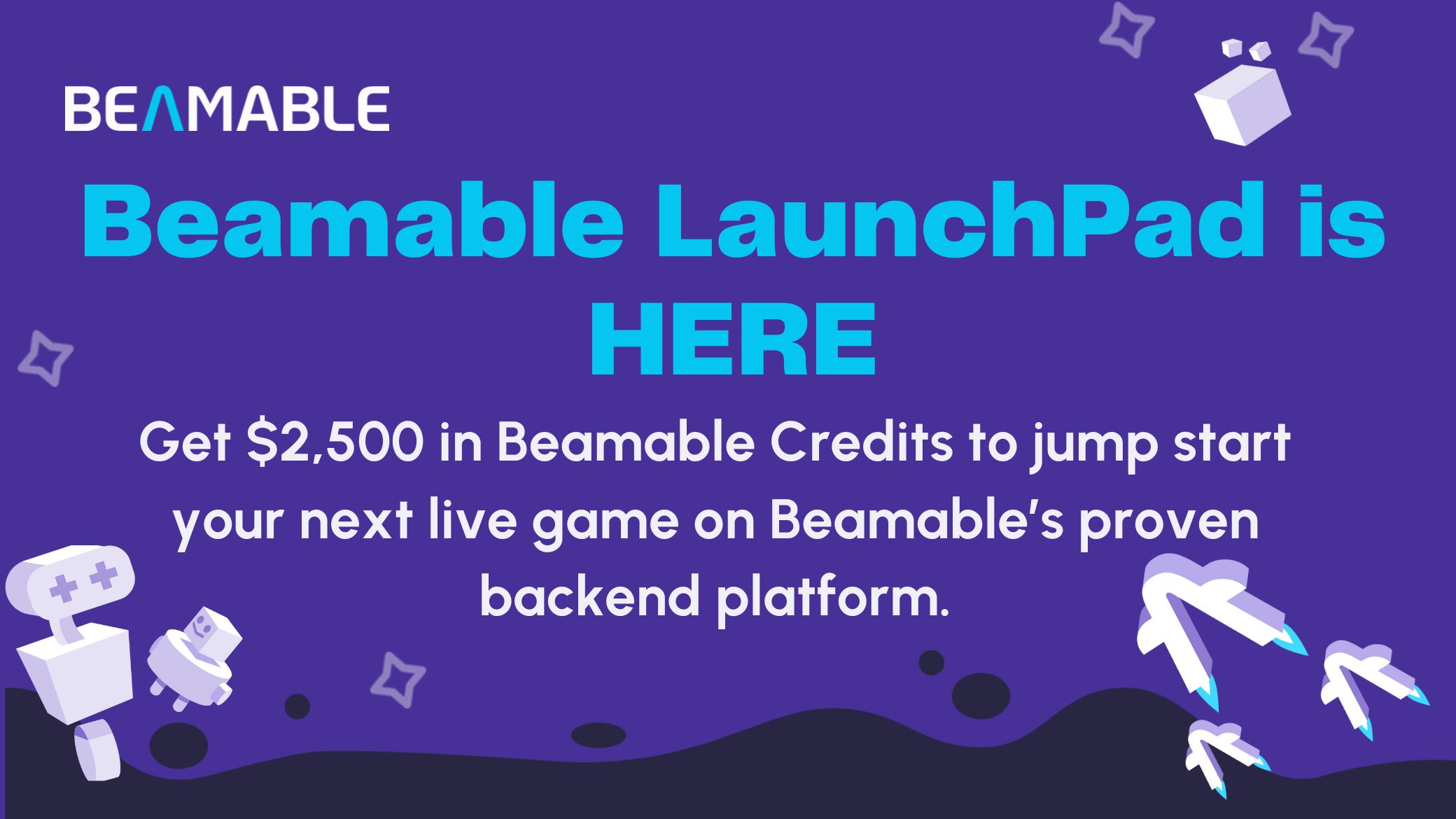
Introducing Beamable LaunchPad: $2,500 in Credits to Jumpstart Your Live Game
Building a live game is harder than ever. Studios are under pressure to ship fast, operate continuously, and deliver player experiences that keep evolving. But the path from prototype to production is often slowed by one thing: backend complexity.
At Beamable, we believe that developers shouldn’t have to choose between building great gameplay and managing servers. That’s why we created Beamable LaunchPad—a new developer acceleration program that gives studios a $2,500 head start to build, launch, and scale their live games faster.
What is Beamable LaunchPad?
Beamable LaunchPad is a $2,500 credit program designed to remove the financial and technical barriers that slow game development. Whether you’re building your first live-service title or scaling a new project, LaunchPad helps you get started on Beamable’s proven backend platform with less cost and less risk.
Your credits can be applied toward the services that make the biggest impact on your roadmap:
- Laser Beam onboarding – Fast-track your backend setup with Beamable engineers configuring your core systems: Identity, Content, Analytics, and SDK integration. (Normally $5,000—now half off.)
- Implementation Support – Collaborate directly with Beamable’s co-development team to customize or extend your backend.
- Licenses – Apply credits toward Studio Tier or Pro Tier access, including dedicated support via Discord, email, or Slack.
Beamable LaunchPad is flexible by design—every studio can use the credits differently based on its goals, tech stack, and timeline.
Why We Built It
The reality of modern game development is that every successful live game becomes a service — and building the infrastructure to support that service can be a major drain on time, budget, and focus.
Beamable’s mission has always been to simplify that journey. LaunchPad is our way of making enterprise-grade backend tools and developer support accessible to any studio, regardless of size or funding stage.
We’ve seen studios move from prototype to production three to five times faster on Beamable than when maintaining their own backend. By combining pre-built systems, Unity and Unreal SDKs, and optional hands-on support, LaunchPad gives teams the freedom to focus on gameplay, content, and creativity—not infrastructure.
Studios shouldn’t have to choose between building great gameplay and managing servers. Beamable LaunchPad removes that trade-off. It gives developers a faster, lower-cost way to start and scale on Beamable so they can focus on what matters most—creating incredible player experiences.
Trapper Markelz, COO of Beamable
Who It’s For
Beamble LaunchPad was created to make enterprise-grade live-service infrastructure available to every studio—from lean indie teams and ambitious startups to established AAA developers. Whether building a free-to-play mobile hit, a large-scale MMO, a co-op adventure, or a web3-enabled experience, LaunchPad gives studios the freedom to experiment, iterate, and scale without heavy upfront costs.
We created Beamable LaunchPad for:
- Indie and mid-sized studios that need to move fast but can’t justify hiring backend engineers.
- Teams of any size preparing for launch who want to offload setup and implementation and get to market faster.
- Developers migrating from legacy backends like PlayFab or Firebase who need a smoother transition.
- Studios building with Unity or Unreal who want Beamable’s SDKs and LiveOps tools natively integrated.
Simply put: If your goal is to ship faster, spend smarter, and reduce technical debt, LaunchPad is for you.
Proven Platform, Real Momentum
Beamable already powers nearly 100 live games, supports more than 11 billion API calls, and serves three million monthly active players across mobile, console, and PC. The Beamable platform gives studios of every size the ability to operate scalable, feature-rich live games without maintaining servers or rewriting backend code.
Beamable LaunchPad builds on that foundation, giving new developers immediate, measurable value—a faster path to launch, lower operational risk, and access to the same technology trusted by Beamable’s global partners.
How to Apply
Getting started is simple:
1️⃣ Apply – Contact Beamable.
2️⃣ Qualify – Confirm your studio details and preferred Beamable tier.
3️⃣ Activate – Redeem your $2,500 credits and start building.
Build Fast. Launch Smart. No Limits.
The Beamable LaunchPad program is part of our ongoing mission to make live-service development faster, more flexible, and more accessible to every team.
Whether you’re building a multiplayer adventure, a social mobile title, or a new Web3 experience, Beamable gives you the infrastructure, tools, and support to bring your vision to life — and now, with LaunchPad, the runway to get started.
👉 Apply for Beamable LaunchPad and get $2,500 in credits to jumpstart your live game today.
Beamable LaunchPad FAQ
What is Beamable LaunchPad?
Beamable LaunchPad is a developer acceleration program that provides $2,500 in credits to help studios build, launch, and scale live games faster using Beamable’s backend platform.
Who can apply?
LaunchPad is available to commercial game studios of any size building with Unity or Unreal.
What can the $2,500 credits be used for?
Credits can be applied toward Laser Beam onboarding, implementation support, or Beamable Studio and Pro Tier licenses.
How does LaunchPad help my team?
By handling backend setup and services, Beamable shortens the path from prototype to live game—typically 3–5 times faster than building and maintaining your own infrastructure.
When will I receive the credits?
Once your application is approved and your tier confirmed, credits are applied directly to your Beamable account and can be redeemed immediately.
Where do I apply?
Contact Beamable at beamable.com.
Key Takeaways
- $2,500 in Beamable Credits gives studios a faster, lower-risk way to start building and launching live-service games.
- Credits can be used for Laser Beam onboarding, implementation support, or Beamable Studio and Pro licenses.
- Teams using Beamable typically move from prototype to production 3–5x faster than those managing their own backend.
- Built for Unity and Unreal developers, LaunchPad simplifies LiveOps, data management, and content systems—no DevOps required.
- Ideal for indie, mid-sized, and AAA studios looking to cut backend costs, reduce complexity, and scale confidently.
- Beamable already powers nearly 100 live games, handling 11B+ API calls and 3M+ monthly players across platforms.
👉 Schedule a Demo of Beamable’s Live Game Backend
👉Sign up for our newsletter to learn more ways to stay ahead in game development
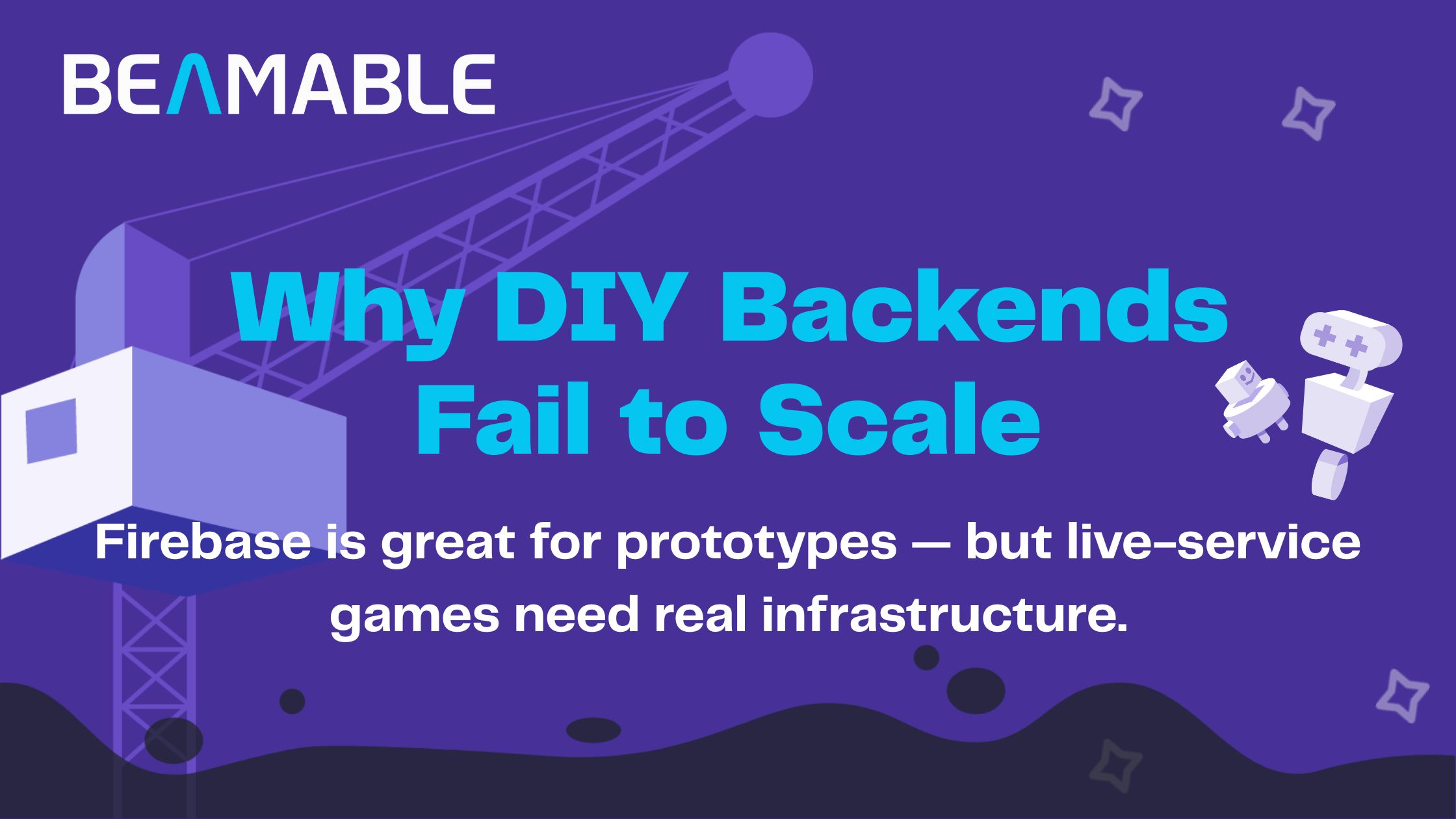
Why DIY Backends Fail to Scale
Why do so many studios start with Firebase or DIY backends?
It’s simple, quick, and free to start.
Firebase and similar tools are perfect for prototypes or early MVPs.
They let developers spin up authentication, cloud save, and database services in minutes—no backend engineers required.
But as soon as a game attracts real players, things change.
The same “lightweight” setup that initially felt frictionless becomes the biggest obstacle to growth.
Where Firebase hits its limits
Firebase was built for mobile apps, not massive multiplayer games.
Its limitations show up fast when you start scaling concurrent users or adding live-service features.
Here’s where teams hit bottlenecks:
| Challenge | Impact |
| Limited server logic | No native support for real-time gameplay, matchmaking, or server authority |
| Cost spikes | Realtime Database and Firestore scale unpredictably with reads/writes |
| Data siloing | Difficult to manage multiple regions or extensive inventories |
| Version control issues | Updating backend logic can break live environments |
| Player concurrency | Lacks built-in features for lobbies, sessions, or event processing |
Firebase is ideal for static content and small user bases—but live-service games need dynamic, persistent, and scalable systems that can evolve with the player base.
Learn more about what live-service games need.
The scalability trap of DIY infrastructure
When Firebase (or similar backends) hit capacity, teams usually try to patch the problem with custom servers, cloud functions, or external plugins.
That’s where complexity—and cost—skyrocket.
Instead of building new features, developers spend weeks debugging cloud deployments, syncing player data, and managing DevOps pipelines.
The result:
- Slower development cycles
- Fragmented systems
- Poor live ops flexibility
- Lost time and morale
Beamable was created to solve exactly this. It provides a fully managed, extensible backend purpose-built for games—no patchwork required.
How Beamable solves what Firebase can’t
Beamable gives developers the freedom of Firebase—with the scalability of enterprise-grade infrastructure.
| Capability | Firebase | Beamable |
| Game-specific logic | Limited | Purpose-built modules for identity, economy, and live ops |
| Real-time multiplayer | Requires a custom server | Built-in relay and event handling |
| Live content updates | Manual | Managed via the Beamable Portal |
| Cost control | Unpredictable with usage | Transparent pricing that scales linearly |
| Extensibility | Plugins and workarounds | Fully supported microservice extensions |
Explore Beamable’s backend architecture.
Why great dev teams outgrow Firebase
The difference isn’t technical—it’s strategic.
Top studios stop rebuilding infrastructure and focus on shipping content, not code.
They want a backend that:
- Handles millions of API calls daily without latency issues
- Updates live games instantly
- Integrates with analytics, monetization, and community systems
- Lets them scale across Web2 and Web3 with zero rework
That’s why developers from leading studios are migrating to Beamable—a platform built for high-scale, live-service games, not static mobile apps.
See why great teams ship faster with Beamable.
FAQ: Firebase vs. Beamable for Game Backends
Q1: Can Firebase support a multiplayer game?
Not efficiently. Firebase lacks dedicated multiplayer logic. It can store player data but not synchronize live sessions or authoritative server events.
Q2: Why does Firebase get so expensive at scale?
Costs increase exponentially with reads and writes. Games with frequent player events (like inventories, transactions, or leaderboards) quickly see runaway costs.
Q3: What makes Beamable different?
Beamable is purpose-built for games. It offers modular backend services—identity, economy, cloud save, live ops, analytics—designed to scale automatically and predictably.
Q4: Can I migrate from Firebase to Beamable?
Yes. Beamable supports smooth migrations from Firebase, PlayFab, and custom backends with minimal downtime and complete data preservation.
Start your migration here.
Key Takeaways
- Firebase is great for prototypes—but not production-scale live games.
- DIY backends struggle with cost, concurrency, and control as games grow.
- Beamable provides a scalable, game-specific platform that evolves with your audience.
- The best dev teams don’t rebuild infrastructure—they build on it.
👉 Explore how Beamable helps studios build and scale faster at beamable.com
👉 Schedule a Demo of Beamable’s Live Game Backend
👉Sign up for our newsletter to learn more ways to stay ahead in game development
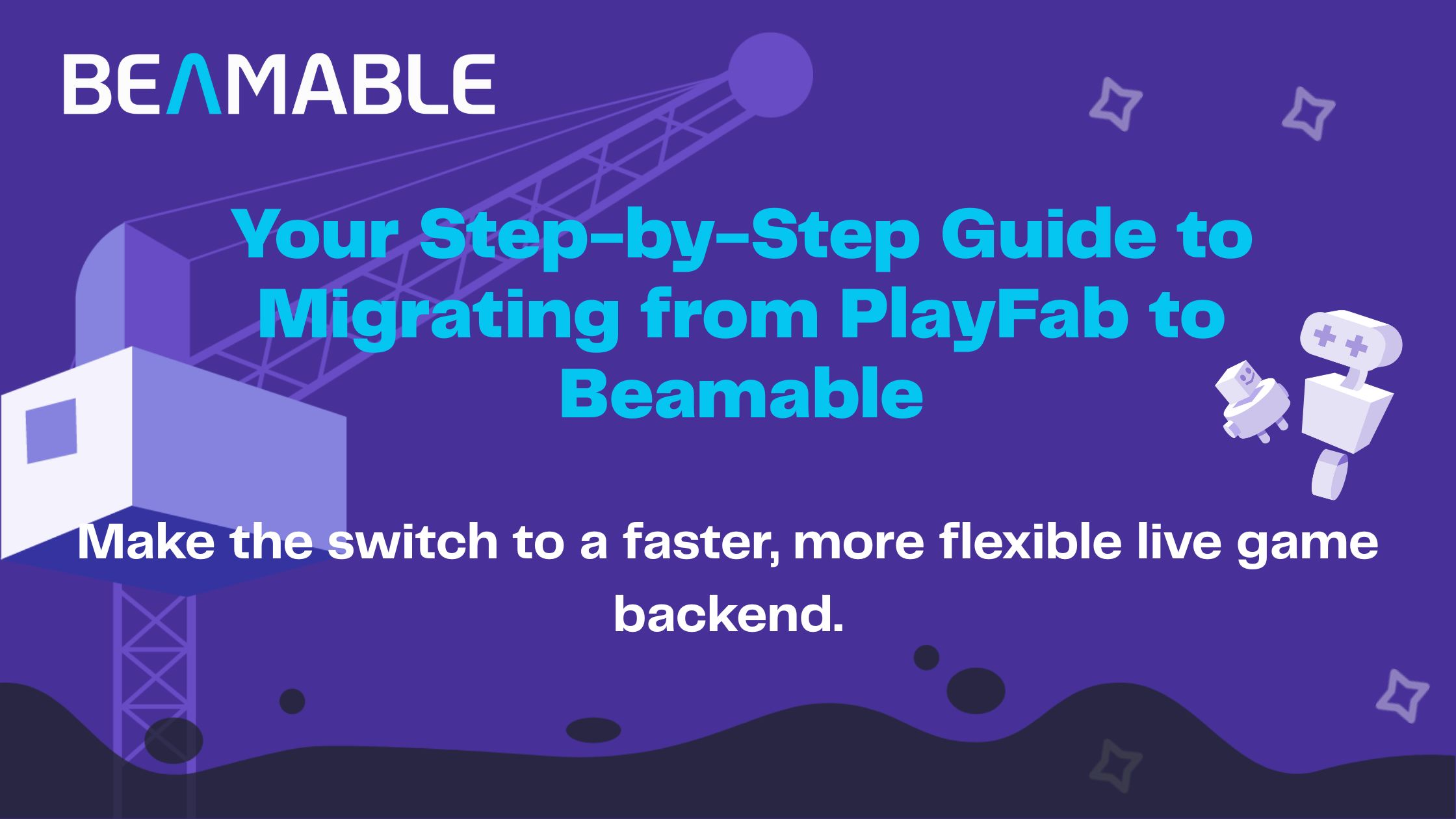
Migrating from PlayFab to Beamable–A Practical Guide for Developers
Why Studios Are Moving Beyond PlayFab
PlayFab helped define the era of cloud backends for games. For years, it gave studios a fast way to launch features like leaderboards, player data, and virtual economies.
But as games have evolved into constantly updated live experiences, developers have outgrown PlayFab’s limits. Studios now want:
- Faster iteration cycles
- Flexible tools for LiveOps and economy tuning
- Freedom to own and extend their backend
- Lower long-term operational costs
Beamable was built for this new reality—giving developers full control, extensibility, and scalability across live-service and multiplayer games.
Why Beamable is the Best Long-Term Choice
Beamable isn’t just a backend; it’s a complete live-service platform designed for how studios build today.
1. Future-Ready Architecture
Beamable is continuously evolving, with built-in LiveOps, content management, microservices, and decentralized infrastructure (via Beamable Network). PlayFab, while stable, hasn’t kept pace with how modern games operate.
2. Developer Control and Extensibility
With PlayFab, extending or debugging CloudScript can become rigid and time-consuming. Beamable lets you create microservices in familiar languages, deploy via CI/CD, and iterate rapidly.
3. LiveOps Without Rebuilds
Change offers, events, and balance live—without code pushes or redeploys. Beamable’s Portal empowers designers and producers to manage content without waiting on engineering cycles.
4. Scalable and Transparent Costs
Beamable’s model is usage-based and predictable. As you grow, your backend scales seamlessly—with no hidden overages or vendor lock-in.
5. Active Development and Support
Beamable continues to expand its ecosystem, with new modules, SDK updates, and direct engineering support. Studios get help migrating, optimizing, and scaling their backend—something PlayFab users often cite as missing.
When PlayFab isn’t the Right Fit
PlayFab remains useful for smaller titles or prototypes, especially for teams already embedded in Azure.
But studios typically reach a tipping point when:
- They need advanced LiveOps or in-game commerce.
- Custom scripts become hard to maintain.
- Scaling introduces cost spikes or performance constraints.
- They want to own their data and logic fully.
When you hit those walls, migration isn’t just a tech decision—it’s a strategic one. Beamable unlocks new creative and operational freedom.
How to Migrate from PlayFab to Beamable
Migration isn’t “one click,” but it’s a known and supported process. Many teams have done it successfully—and Beamable can guide you through it.
Step 1: Audit Your Current Setup
Identify which PlayFab services you rely on (authentication, leaderboards, player data, etc.) and note any custom CloudScript logic.
Step 2: Map to Beamable Modules
| PlayFab Feature | Beamable Equivalent | Migration Notes |
| Title Data | Content System | Import metadata and configs into Beamable’s content pipeline. |
| CloudScript | Microservices | Rebuild logic using Beamable’s C# microservices framework. |
| Economy | Economy Module | Gain full control and visibility into virtual currencies and items. |
| Player Data | Identity | Supports unified player profiles across devices and platforms. |
| Events | LiveOps | Run seasonal events and offers instantly via the Beamable Portal. |
Step 3: Set Up and Test
Create your project in the Beamable Portal, connect the SDK, and import your player data. Run PlayFab and Beamable in parallel if you need to stage your rollout.
Step 4: Optimize and Extend
Deploy microservices, automate content updates, and explore optional integration with Beamable Network for decentralized compute or cross-game services.
Step 5: Get Help When You Need It
Our support team and partners have helped dozens of studios transition from PlayFab. Beamable’s Laser Beam implementation packages and Pro Support tiers are designed to de-risk migrations and accelerate launch.
Migration Isn’t a Risk—It’s an Upgrade
Migrating from PlayFab isn’t about fixing what’s broken—it’s about evolving to what’s next.
Beamable gives you:
- The agility to iterate faster
- The tools to monetize smarter
- The infrastructure to scale sustainably
And if you’re ready to make the move, we’ll help you get there—step by step.
👉 Schedule a Demo of Beamable’s Live Game Backend
👉Sign up for our newsletter to learn more ways to stay ahead in game development
FAQ
Q: Is it really worth migrating?
If your game is growing, yes. The faster you can adapt and monetize, the more revenue you can capture—and Beamable gives you the tools to do that.
Q: How long does migration take?
Most teams transition within a few weeks, depending on data size and code complexity.
Q: Will I lose any player data?
No. Beamable supports seamless import of PlayFab player data and economy balances.
Q: What kind of support does Beamable offer?
Our Pro Support plans and partner network can manage the entire migration if you prefer a turnkey path.
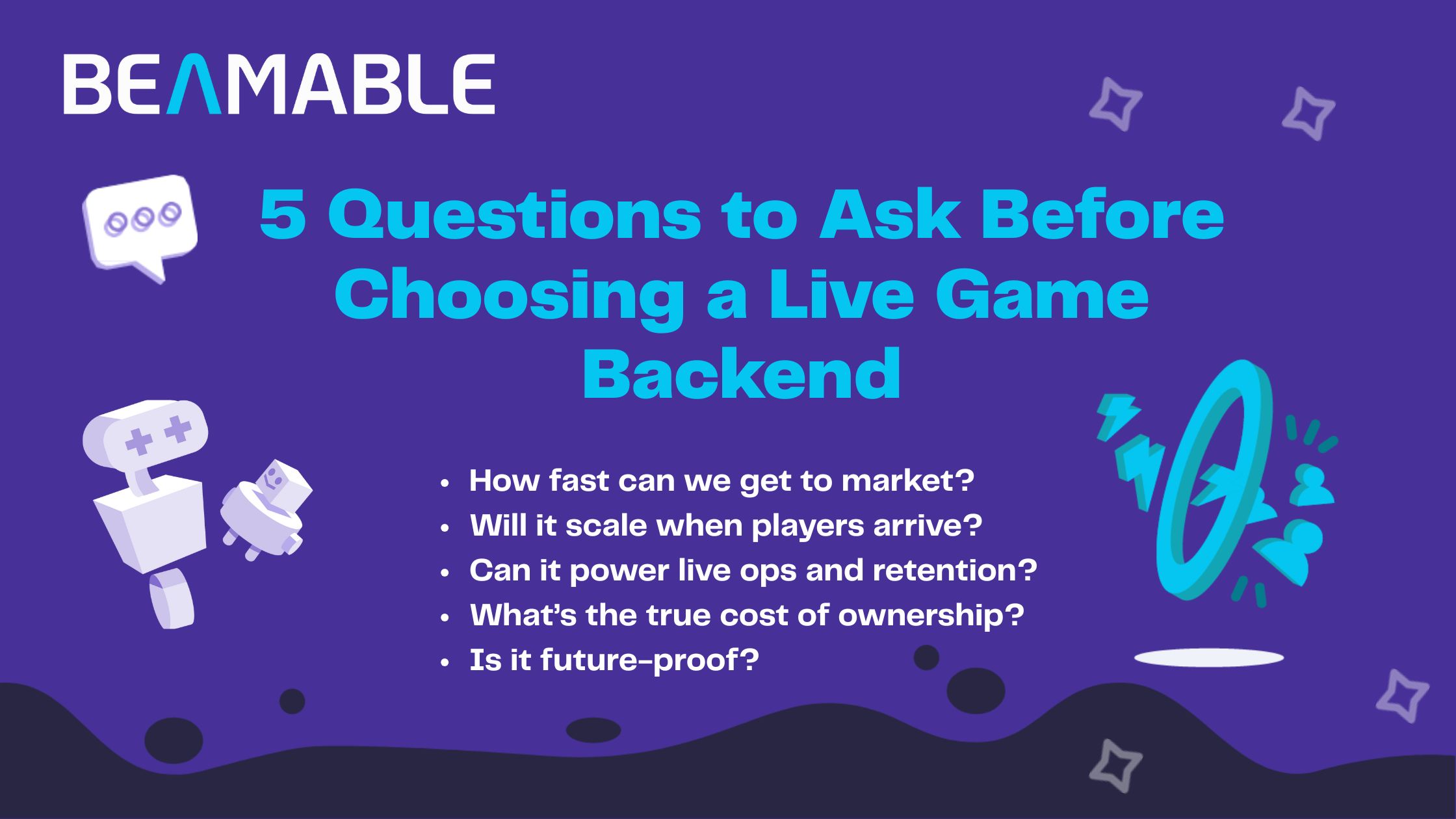
What Studio Leaders Need to Ask Before Choosing a Live Game Backend
Why Choosing the Right Live Game Backend Matters
The number one reason live games fail isn’t a lack of engagement; it’s wasted time and resources on backend infrastructure. Accounts, servers, commerce, leaderboards, and live ops are essential, but they don’t directly improve gameplay.
Studio leaders who choose the wrong backend risk delays, budget overruns, and missed market opportunities.
The proper live game backend lets you:
- ✅ Launch faster (saving 6–12 months of engineering time).
- ✅ Scale smoothly when player counts spike.
- ✅ Run retention-driving live ops without heavy dev lift.
- ✅ Lower the cost of ownership over the lifetime of your title.
- ✅ Future-proof your game across platforms and markets.
Here are the five critical questions every studio head, technical director, or producer should ask.
1. How Fast Can This Backend Get Us to Launch?
Time to market is everything. Ask vendors:
- Does the backend integrate natively with Unity and Unreal Engine so your developers can use a workflow they already know?
- Can we prototype and launch quickly with out-of-the-box game feature options?
- Can we easily extend the defaults with custom APIs or integrate in existing services?
Studios that move quickly don’t just save money; they capture players before the market shifts.
2. Will It Scale When Players Arrive?
Launching is one thing. Handling millions of players is another. Ask:
- Is this backend already powering live games at scale?
- How many monthly active players rely on it?
- What’s the track record for uptime and reliability?
A backend proven in production environments gives confidence that your game won’t collapse when it scales.
3. Can It Power Live Ops and Retention?
Retention — not just installs — drives revenue. Backend infrastructure should make engagement easy:
- Can designers and producers run events, sales, and A/B tests without engineers?
- Does the platform support leaderboards, challenges, and segmentation?
- How fast can we act on data and push changes into the game?
A backend that enables fast iteration helps you keep players engaged for years.
4. What’s the Total Cost of Ownership?
DIY and open-source solutions may appear cheaper upfront, but they often become more expensive over time. Ask:
- What are year-one and year-three costs, all-in?
- Does the provider cover security, payments, and compliance out of the box?
- How much engineering time will be tied up in backend support instead of new features?
Smart studios think beyond sticker price to long-term cost efficiency.
5. Is This Backend Future-Proof?
Your game won’t stay the same. Neither should your backend. Ask:
- Can we expand from mobile to console or PC without a rebuild?
- Is the provider shipping new features that align with industry trends?
- What’s the roadmap for support, community, and ecosystem growth?
Choosing a backend that evolves with you prevents painful rewrites in the future.
The Right Questions Lead to the Right Backend
Studio leaders don’t need to become backend experts — but they must ask the right questions before choosing. Speed, scalability, retention, cost, and future-proofing will determine whether your studio invests the next year in building infrastructure or creating great games.
At Beamable, we provide ready-to-use backend services for Unity, Unreal, and Web. With over 90 live games, 3 million+ monthly active players, and billions of monthly API calls, our infrastructure is battle-tested at scale. We help studios launch faster, scale seamlessly, and focus on gameplay — not servers.
👉 Schedule a Demo of Beamable’s Live Game Backend
👉Sign up for our newsletter to learn more ways to stay ahead in game development
FAQ: Choosing a Live Game Backend
What is a live game backend?
A live game backend provides cloud infrastructure for accounts, commerce, servers, leaderboards, and live ops — essential for multiplayer and live service games.
Why not build a custom backend in-house?
Custom builds often take 6–12 months and are significantly more expensive to maintain in the long term. A managed backend reduces risk, time, and total cost of ownership.
What backend works best with Unity or Unreal?
Beamable integrates directly into Unity and Unreal Engine, enabling teams to ship faster without the complexity of backend development.
How do I compare backend costs?
Compare year-one costs to year-three costs, including developer hours, scaling, compliance, downtime, and ongoing support. Hidden costs often make DIY backends more expensive.
Can a backend help with retention?
Yes. Platforms with built-in live ops, A/B testing, and player segmentation help studios keep players engaged long after launch.
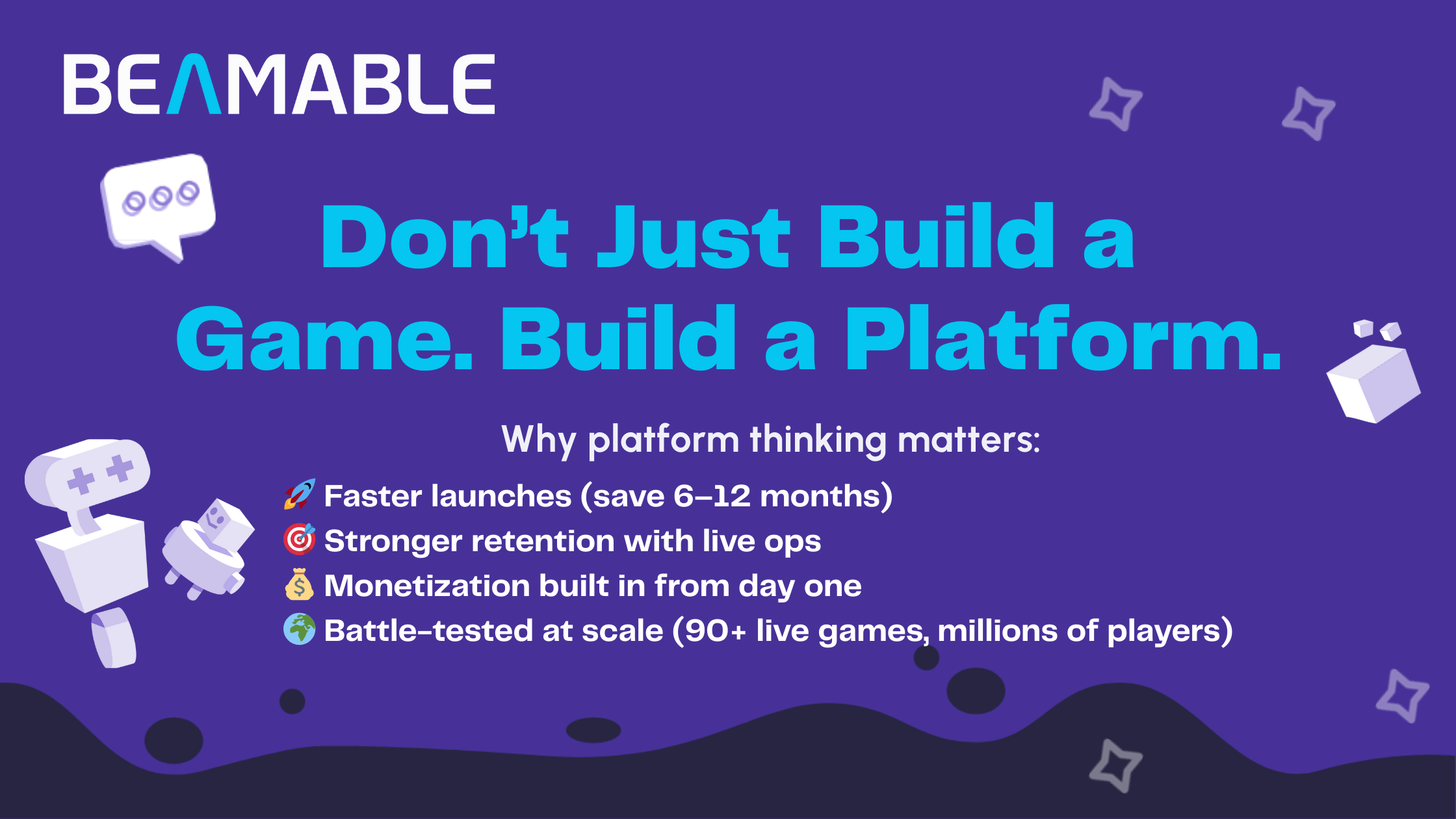
Why Your Next Game Needs to Think Like a Platform, Not Just a Product
The challenge for today’s game studios isn’t just launching — it’s lasting.
In an industry where players expect live events, social features, and constant updates, games that think like products burn bright and fade fast. Games that think like platforms evolve into ecosystems that sustain engagement, revenue, and community for years.
Look at the most successful titles of the last decade: Fortnite, Roblox, and Genshin Impact. None of them are static releases — they’re living platforms that deliver continuous value.
And Beamable-powered games like FIFA Rivals, Pudgy Party, and Star Trek Timelines prove the same mindset works across indies, mid-size teams, and AAA publishers.
Why Product Thinking Falls Short
Games built only as products often face:
🚫 A “one and done” lifecycle with limited updates.
🚫 Weak player retention after launch.
🚫 Missed revenue opportunities from unplanned monetization.
🚫 Costly rebuilds when trying to scale or pivot.
In contrast, platform-driven games are built to adapt and expand from day one.
The Platform Mindset in Action
Shifting from product thinking to platform thinking changes everything:
- Time to Market: Platforms launch faster because backend systems don’t need to be reinvented.
- Retention and Revenue: Features like live ops, commerce, and leaderboards keep players coming back.
- Future-Proofing: Flexible infrastructure allows updates, expansions, and pivots.
- Community: Players don’t just play — they participate through events, guilds, and social features.
This isn’t theoretical. It’s the proven approach behind Beamable customers who are already growing sustainable games.
How Beamable Helps Games Become Platforms
Beamable provides the infrastructure that transforms games into platforms, including:
- Accounts and authentication
- Game servers
- Commerce and stores
- Leaderboards and achievements
- Live ops and events
With Beamable, studios save months to a year of backend work, lower costs, and launch faster. Trusted by 200 studios and 4,000 developers worldwide, Beamable powers over 90 live games with 100 more in development.
From indie creators to AAA publishers, Beamable enables games to think like platforms, not products.
Proof Points from the Field
- FIFA Rivals went from prototype to global launch in under 10 months by leveraging Beamable, saving a year of backend work.
- Pudgy Party and Star Trek Timelines scale to millions of players with stable, reliable backend infrastructure.
- Bigfoot Games integrated leaderboards and player ID in weeks, accelerating live retention testing.
- Industry-wide, giants like Fortnite, Roblox, and Genshin Impact validate the platform approach — thriving because they never stop evolving.
Build Fast. Launch Smart. No Limits.
Games treated as products struggle to last. Games treated as platforms adapt, grow, and engage players for years.
Beamable helps studios make that leap — saving development time, cutting costs, and delivering the infrastructure to power sustainable success.
👉 Ready to build your next game like a platform? Get started with Beamable.
FAQ
Q1: What does “game as a platform” mean?
It means designing a game for ongoing updates, community, and monetization — not just a single launch.
Q2: Why do games like Fortnite and Roblox succeed as platforms?
They succeed because they’re built for continuous live ops, evolving content, and community-driven participation.
Q3: How does Beamable help my studio adopt this mindset?
Beamable provides ready-to-use infrastructure — accounts, commerce, servers, leaderboards, and live ops — so you can focus on gameplay while we handle the platform foundation.
Q4: What’s the risk of product-only thinking?
Games built as products often fade quickly, missing retention goals, monetization potential, and opportunities to scale.
Q5: Is building a platform harder or more expensive?
Not with Beamable. We cut months to a year of backend work, reduce costs, and give studios the flexibility to grow sustainably.
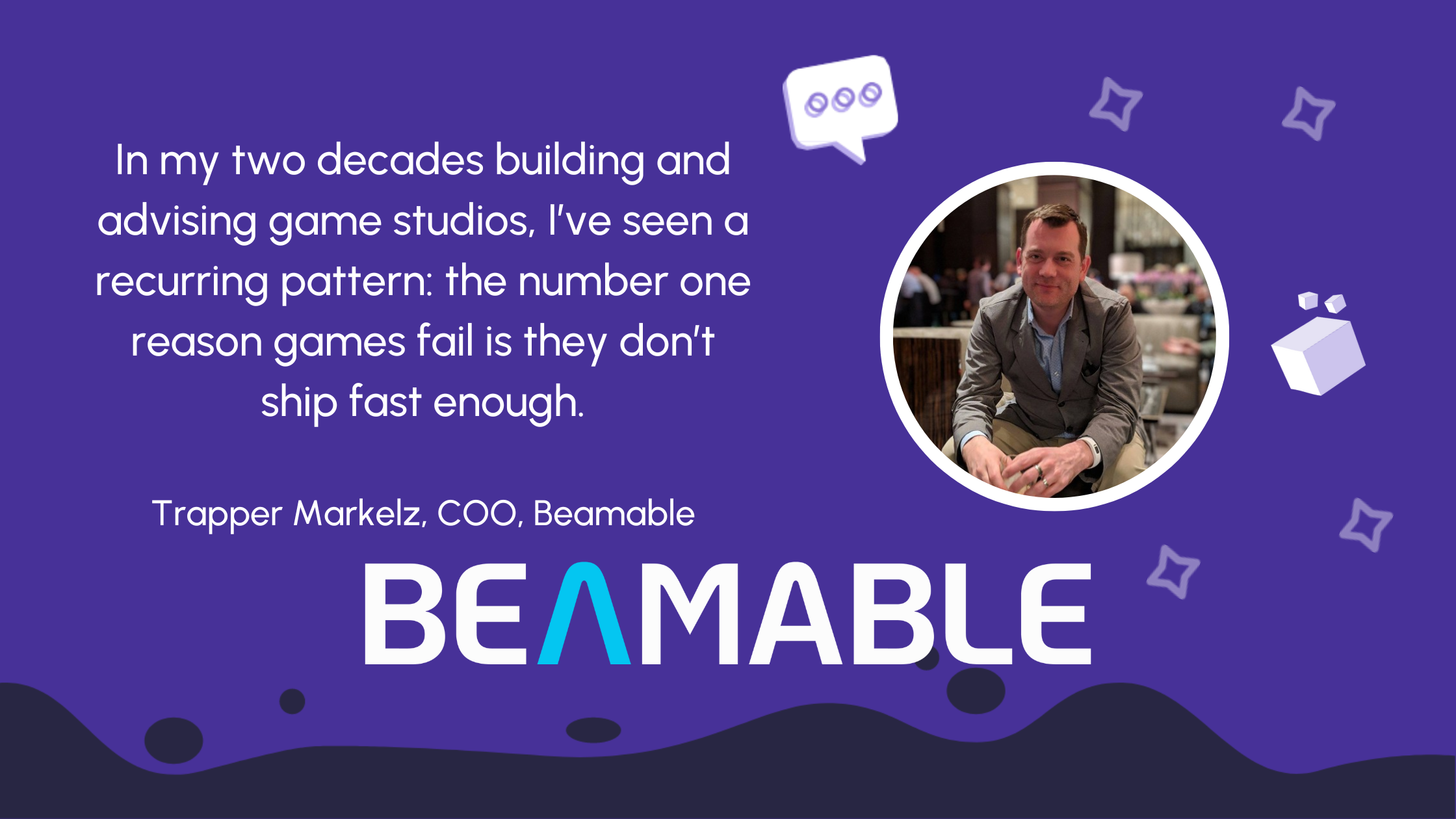
Why Most Games Fail Before They Even Launch
Why do so many games fail to ship?
In my two decades building and advising game studios, I’ve seen a recurring pattern: the number one reason games fail is they don’t ship fast enough.
Teams pour months — sometimes years — into backend systems like accounts, servers, commerce, leaderboards, and live ops. These systems are vital, but they don’t make the game itself more fun. Every week spent on infrastructure is time not spent polishing gameplay, building community, or testing with real players.
Too often, by the time the game is ready to launch, the budget is gone, the market has moved on, or worse — the project never ships at all. A recent GDC survey showed that nearly half of developers canceled a project before launch due to resource constraints and delays. That aligns with what I’ve seen firsthand across the industry.
Why is speed-to-market more important than ever?
Today’s market is unforgiving. Players have more choice, expectations are higher, and cultural trends come and go in months, not years.
Here’s what I tell studios:
- Delays cost money. A mid-sized team can burn $50K–100K a month just keeping development going (Unity Gaming Report).
- Timing is everything. Miss a trend window, and your game may launch into irrelevance.
- Real learning only happens with players. You can’t iterate in theory — you have to ship and get real feedback.
In this environment, speed isn’t just about efficiency — it’s survival.
How Beamable helps studios ship faster
This is exactly why we built Beamable.
Beamable provides ready-to-use infrastructure for the core systems every game needs — directly inside Unity and Unreal. That lets studios save six to twelve months of backend work, freeing teams to focus on what makes their game great.
The impact is clear:
- Lower costs by cutting backend engineering overhead.
- Faster time to market so you can launch while the opportunity is hot.
- More chances to adapt by learning from players early and often.
Today, more than 4,000 developers at 200 studios use Beamable. We already power 90+ live games with 100 more in development — from indie creators to AAA publishers.
What happens if you don’t?
I’ve seen the other side of the coin too many times:
- Studios run out of money before they launch.
- They miss their moment and release into a crowded market that has moved on.
- They ship late with no runway left to support live operations.
And the numbers back it up. Industry analysts at GameDiscoverCo estimate that 70% of games fail to turn a profit. The ones that succeed don’t wait until everything is perfect — they ship, they learn, and they improve.
Final thought
As a COO, I think about risk constantly. The riskiest path in game development is spending years on infrastructure before you ever test your game in the market.
The studios that win are the ones that get into players’ hands faster. That’s the opportunity Beamable was built to unlock.
👉 Learn how Beamable helps studios ship faster
FAQ: Shipping Games Faster
Q: What is the number one reason games fail?
A: The top reason games fail is delays. Studios spend months or years on backend systems like servers, accounts, and commerce — systems that don’t improve gameplay but drain budgets.
Q: How much development time can Beamable save?
A: On average, Beamable saves studios 6–12 months of backend work by providing ready-to-use infrastructure directly inside Unity and Unreal.
Q: Why does speed-to-market matter in gaming?
A: Launching fast helps studios capture trend windows, reduce costs, and gather player feedback earlier. According to Unity, delays can cost a mid-sized studio $50K–100K per month in overhead.
Q: Who is using Beamable today?
A: Beamable is trusted by more than 4,000 developers at 200 studios, powering 90+ live games with 100 more in development, from indie teams to AAA publishers.
Q: What happens if studios delay their launch?
A: Delays often lead to canceled projects, missed market opportunities, or lack of budget to support live ops. Industry analysts estimate 70% of games fail to turn a profit.
Build Fast. Launch Smart. No Limits.
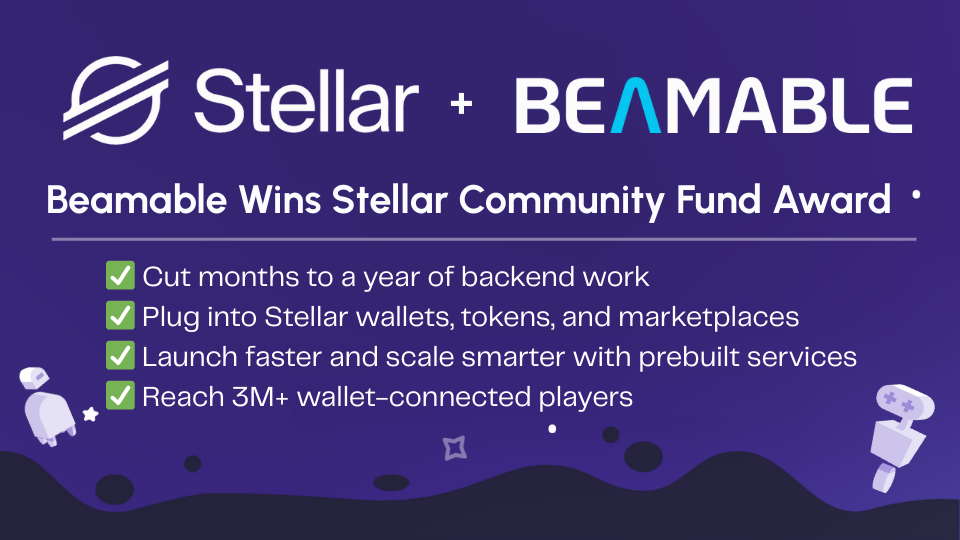
Beamable Wins Stellar Community Fund Award to Help Game Developers Ship Faster
The number one reason games fail is they don’t ship fast enough. Studios waste months — sometimes years — building backend infrastructure like accounts, servers, commerce, and live ops. By the time they launch, budgets are drained, players have moved on, or worse, the game never ships at all.
Beamable was built to solve that problem. We provide ready-to-use backend services that integrate directly into Unity, Unreal, and Web — helping developers cut months to a year of development time and save significant costs. That means teams can launch sooner, adapt faster, and focus on what matters most: making games fun.
Now, thanks to a $150,000 Build Award from the Stellar Community Fund (SCF) #38, Beamable is bringing that mission to the Stellar ecosystem.
What Is the Stellar Community Fund?
The Stellar Community Fund (SCF) is an open-application awards program that fuels projects building on Stellar. Round #38 awarded over $2.5M worth of XLM to 24 projects tackling real-world problems with blockchain.
Beamable’s initiative, Onboard Game Devs with Beamable, was selected as a Build Award winner, recognizing our ability to bring meaningful traction and adoption to Stellar through gaming.
Read the full SCF #38 recap here.
Why Stellar + Beamable Accelerates Developers
Gaming is one of the most natural fits for blockchain adoption. Players already understand digital assets, in-game currencies, and online marketplaces. What they lack are fast, low-cost rails that make those assets reliable at scale.
By integrating Beamable with Stellar, developers get:
- Time-to-Market Advantage: Ship games up to a year faster with prebuilt backend + Stellar integration.
- Wallet Authentication: Plug Stellar wallets directly into game logins.
- Token and NFT Support: Power in-game currencies, rewards, and digital assets.
- Marketplace Integration: Create player-driven economies backed by Stellar rails.
- Prebuilt Game Services: Use inventory, stats, content versioning, and more out of the box.
This means less engineering overhead, lower costs, and fewer missed launches.
Proof That It Works
Beamable isn’t new to this. Today, we power:
- 90+ live games (with 100+ in development)
- 4,000+ developers across 200 studios
- Teams ranging from indie creators to AAA publishers
With Stellar integrated, this proven model extends into web3-powered games that reach real players.
Beyond SDKs: Driving Real Adoption
The Stellar integration isn’t just technical. It’s about creating a complete ecosystem for growth:
- Beamable Marketplace: A hub of composable services for developers.
- Beamable Network Boost: A promotional engine that has already driven millions of engagements across Discord, Steam, Twitch, and social channels.
- 3M+ Wallet-Connected Players: Stellar-ready games will benefit from airdrops, influencer campaigns, and coordinated activations.
Beamable doesn’t just help developers build — we help them launch, scale, and succeed.
The Road Ahead
With support from the Stellar Community Fund, Beamable will:
- Release Stellar-ready SDKs for Unity, Unreal, and Web.
- Partner with developers to bring the first Stellar-powered games to market.
- Showcase how Stellar infrastructure + Beamable backend can cut time-to-market while unlocking new monetization models.
Our mission is clear: help developers ship faster, stay lean, and succeed. Stellar is part of that journey.
FAQs About Beamable and Stellar
What is the Stellar Community Fund (SCF)?
The SCF is a program that awards funding to projects building on Stellar. Round #38 awarded over $2.5M in XLM to 24 teams.
How much did Beamable receive?
Beamable was awarded $150,000 worth of XLM in SCF #38.
What will Beamable build with Stellar?
Beamable will integrate Stellar into its SDKs for Unity, Unreal, and Web, enabling wallet login, tokens, NFTs, and marketplaces in games.
Why does Stellar matter for gaming?
Stellar provides fast, low-cost, global payment rails and smart contracts — ideal for powering in-game economies and digital assets.
How does Beamable help developers?
Beamable saves developers months to a year of backend work, reducing costs and increasing the odds their game ships successfully.
Join the Journey
Beamable has always been about helping developers build and launch faster. With Stellar, we’re expanding that mission into web3, giving studios the tools and infrastructure to reach global audiences with real utility.
👉 Learn more about SCF #38 in the official Stellar recap.
👉 Follow Beamable and Beamable.Network for updates.
The future of web3 gaming on Stellar starts now.
Build Fast. Launch Smart. No Limits.
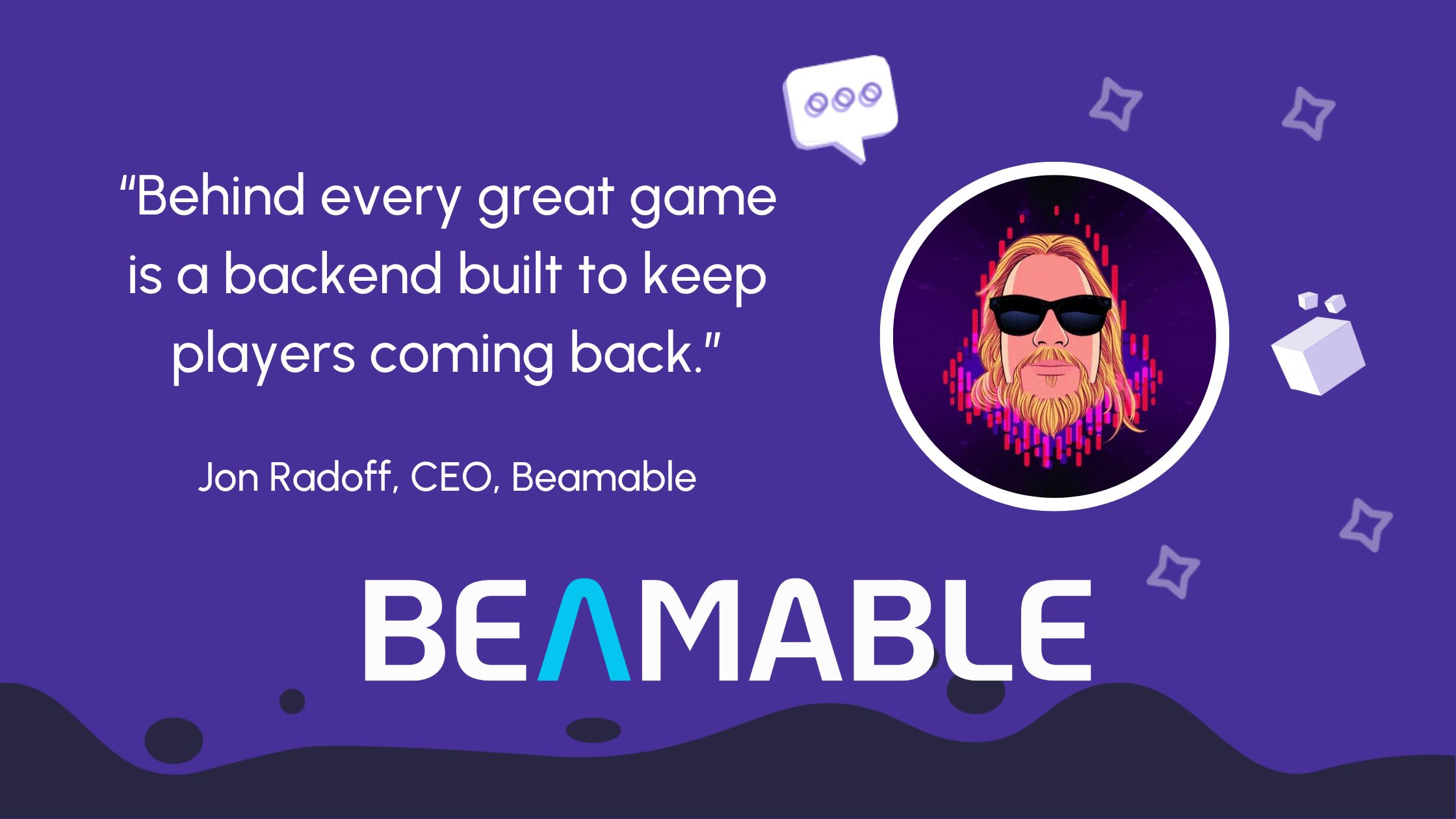
The Link Between Backend Design and Player Retention
By Jon Radoff
When game developers talk about retention, they often focus on gameplay loops, monetization design, or community engagement. But behind the scenes, there’s another major factor that directly influences whether players stick around: backend design.
From seamless matchmaking to real-time events, the way your backend is structured can make or break your game’s long-term success.
Why Does Backend Matter for Retention?
A Unity Gaming Report found that retaining players for 7 days increases the chance of 30-day retention by 60%. Retention is all about keeping players engaged without frustration — and the backend plays a critical role:
- Load Times and Stability: Every second of load time increases player churn risk. According to Google, even a one-second delay in mobile load time can reduce conversions by 20%. In gaming, this translates directly into lost play sessions.
- Matchmaking Quality: Poorly tuned backend matchmaking can frustrate players with unbalanced matches, leading to early abandonment.
LiveOps and Events: A robust backend lets you launch live events, seasonal content, and personalized rewards quickly — keeping players coming back for fresh experiences.
What Are the Hidden Costs of a Weak Backend?
Too many studios underestimate backend complexity. They build bespoke systems that:
- Take months (or years) to finish.
- Drain engineering resources that should be focused on gameplay.
- Struggle to scale when players show up in force.
The result? Technical debt that creates bottlenecks and leaves players with login failures, unstable servers, or broken live events — all of which erode retention.
In fact, a Newzoo study shows that 40% of players quit a game after experiencing persistent technical issues. That’s retention lost before gameplay even gets a chance to shine.
How Can Smart Backend Design Improve Retention?
When backend design is handled strategically, studios can:
- Deliver Seamless Experiences: Fast, stable logins and matchmaking keep players engaged.
- Iterate Quickly: Game-ready services (auth, commerce, leaderboards, chat) allow teams to focus on content, not infrastructure.
- Enable Personalization: Data-driven backend systems let you segment and reward players based on behavior, boosting engagement.
- Support Hybrid Web2 + Web3 Models: For studios experimenting with digital ownership or decentralized economies, flexible backend design ensures scalability.
At Beamable, we’ve seen first-hand how studios improve retention by outsourcing backend complexity. By powering 90+ live games, 7 billion monthly API calls, and $3M ARR, Beamable.Network proves that a strong backend can scale without slowing down development.
Building Retention into Your Infrastructure
Backend design isn’t just technical — it’s a retention strategy. Here are three best practices:
- Design for Scale from Day One. Assume success and prepare for it. Use infrastructure that scales automatically with player demand.
- Automate LiveOps. Backend should allow non-engineering teams (like product managers and community leads) to run live events, promotions, and experiments without code.
- Prioritize Stability and Uptime. A downtime incident can cause permanent churn. Uptime targets of 99.9%+ should be the baseline.
“Player retention isn’t just about gameplay — backend design directly impacts stability, load times, live events, and personalization. A strong backend boosts retention by delivering seamless experiences, supporting iteration, and preventing technical churn.”
FAQ
Q: How does backend design affect player retention?
A: Backend design influences load times, stability, matchmaking, and live events. A poor backend leads to churn, while a strong backend improves retention by delivering seamless and personalized experiences.
Q: What are common backend mistakes that hurt retention?
A: Overbuilding custom systems, neglecting scalability, and underestimating LiveOps requirements are frequent mistakes that frustrate players and reduce retention.
Q: How can developers improve backend-driven retention?
A: By using scalable infrastructure, automating LiveOps, and ensuring high uptime, developers can support long-term player engagement.
Build Fast. Launch Smart. No Limits.
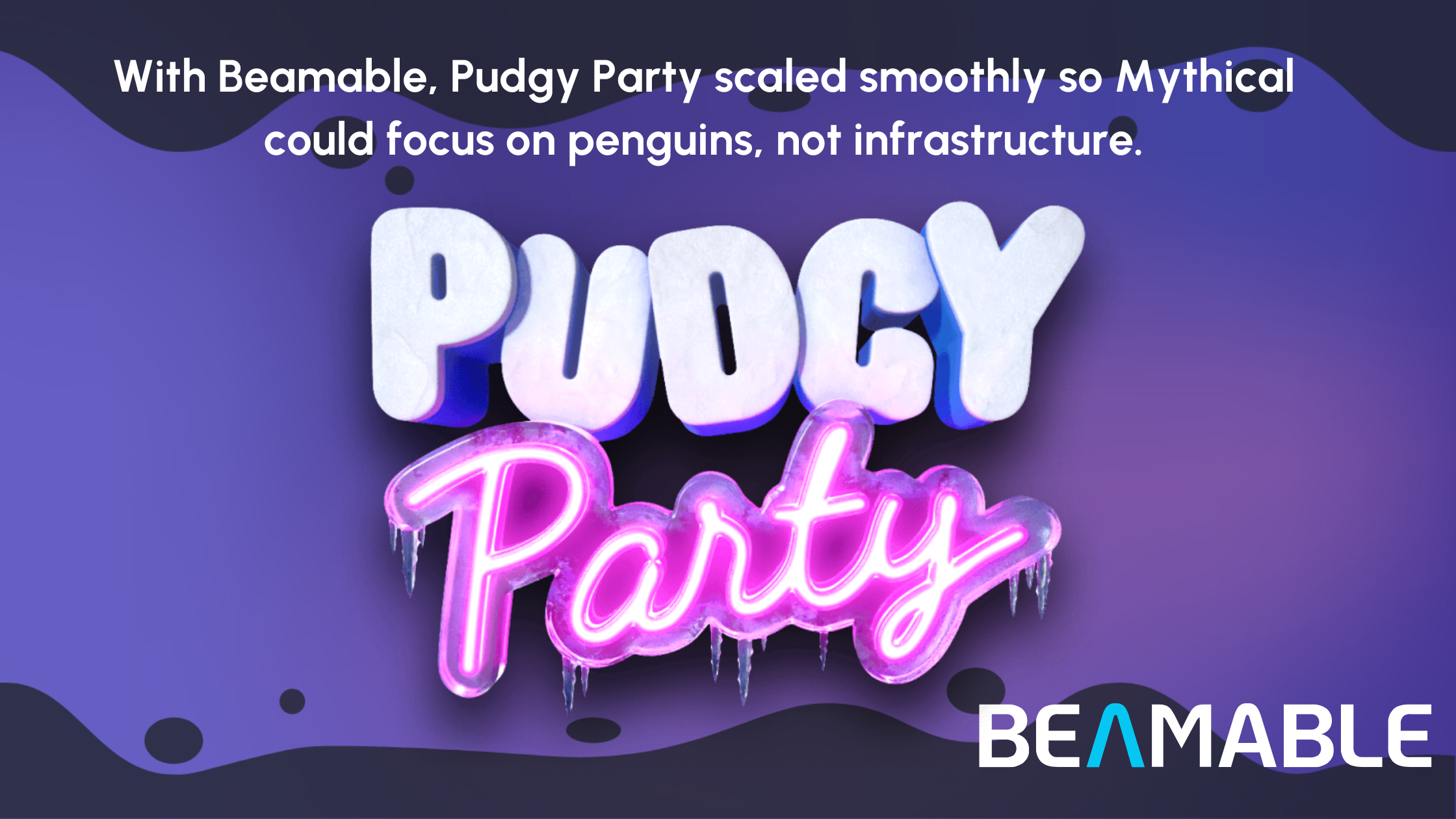
Beamable Powers Pudgy Party’s Global Launch
When Mythical Games brought Pudgy Party to players worldwide, the challenge wasn’t just about delivering penguins and party royale chaos. It was about launching at scale from day one—without forcing developers to lose focus on gameplay.
That’s where Beamable made the difference.
Private Cloud, Purpose-Built for Mythical
Mythical chose Beamable’s Private Cloud, giving them:
- Infrastructure customized to their game’s needs
- A full source code license for long-term flexibility
Independent deployment on their schedule, without shared bottlenecks
Backend That Accelerates, Not Delays
With Unity-native SDKs and game-ready services, Beamable cut months of backend engineering from the roadmap. That meant faster iteration and more time to refine what players love: physics-driven movement, costumes, and party mechanics.
Beamable powered core systems, including:
- Player stats and progression tracking
- Matchmaking and lobbies for seamless multiplayer
- Authentication integrated into Mythical’s accounts
- Bespoke C# microservices unique to Pudgy Party
- Notifications and events to drive engagement
- Leaderboards that fuel competition
Hybrid Inventory: Web2 Meets Web3
Beamable enabled Mythical’s hybrid economy with:
- On-chain assets for true ownership (via Mythos Chain)
- Off-chain items and currencies for progression and gameplay
- Federated inventory unifying Web2 and Web3 into a seamless player experience
This dual system delivered smooth gameplay for all while unlocking digital ownership for Web3-native players.
Ongoing Support for LiveOps and Scale
Beamable supports Mythical beyond launch with embedded LiveOps expertise:
- Load and scale testing to prepare for global rollout
- Real-time monitoring across authentication, lobbies, inventory, and microservices
- Operational support from a team that has scaled games for Disney, FOX, and other major IPs
Gameplay Velocity Without Distraction
By eliminating backend roadblocks, Mythical shipped updates faster and tuned player experiences in real time. In the weeks before launch, the team added new modes, costumes, and retention features — all without slowing down for infrastructure.
The Beamable Advantage
Beamable delivers backend infrastructure that scales cleanly, so developers stay focused on building FUN. Learn how Beamable can power your next game.
Build Fast. Launch Smart. No Limits.
FAQ
Q1: How did Mythical Games scale Pudgy Party’s global launch?
A1: Mythical used Beamable’s Private Cloud, Unity-native SDKs, and embedded LiveOps support to scale globally without slowing development.
Q2: What backend features did Beamable provide for Pudgy Party?
A2: Beamable powered matchmaking, player progression, leaderboards, authentication, hybrid Web2 + Web3 inventory, and custom C# microservices.
Q3: Why did Mythical choose Beamable over building in-house?
A3: Beamable eliminated backend bottlenecks, saving months of engineering work, so Mythical’s developers could focus on gameplay and rapid updates.
Q4: How does Beamable support Web3 economies in games?
A4: Beamable enables hybrid economies with on-chain assets for ownership and off-chain items for gameplay, unified into a single federated inventory.
Q5: What is the Beamable advantage for game developers?
A5: Beamable delivers backend infrastructure that scales cleanly, supports LiveOps, and accelerates launch velocity — helping teams build fast and launch smart.
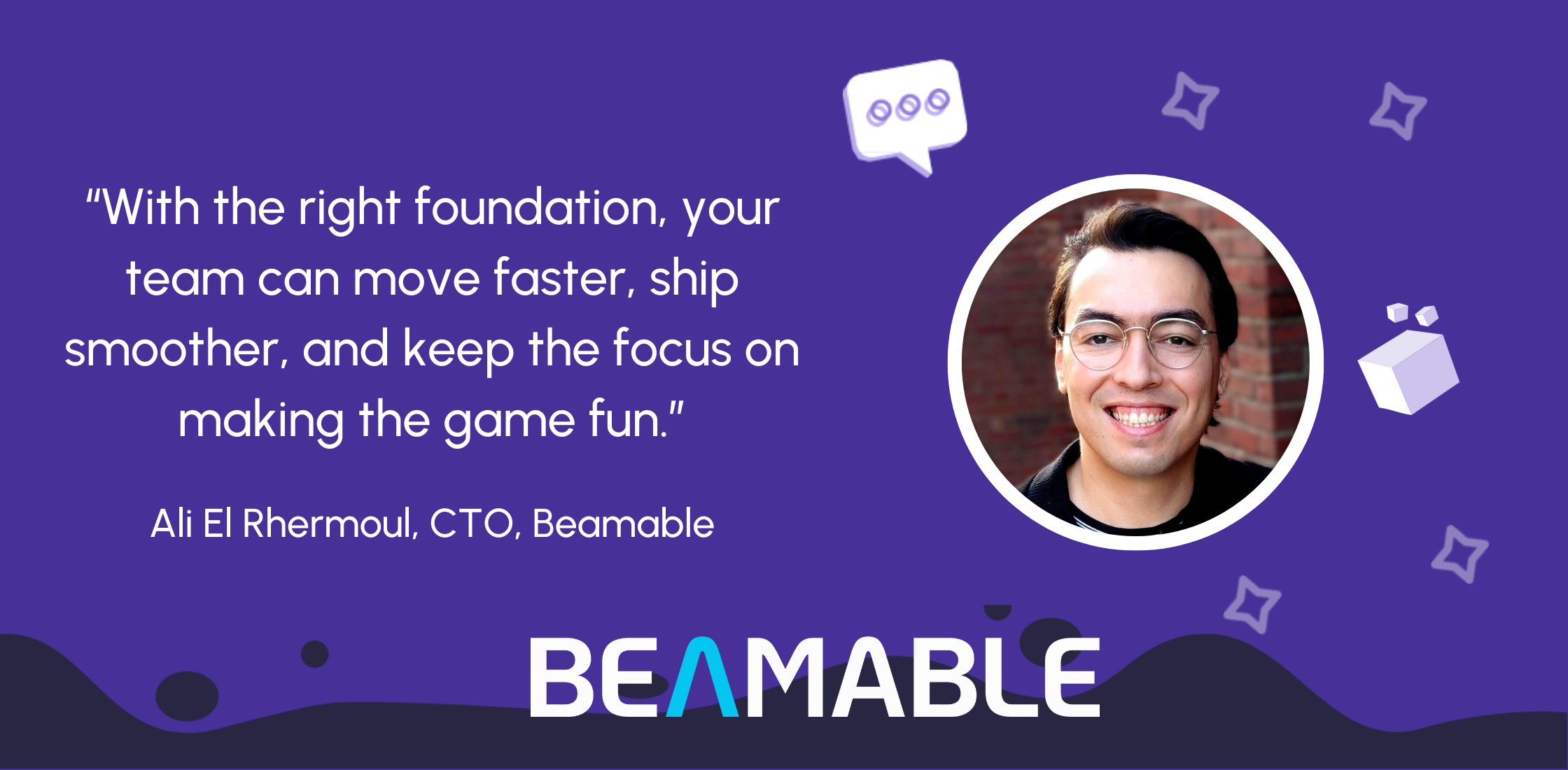
Unblocking Your Roadmap with Better Tech Choices
What is the backend bottleneck in game development?
Every studio starts with the same dream: make a great game, grow an audience, and keep players coming back. But somewhere between concept art and live ops, the backend bottleneck appears—and suddenly, your roadmap slows to a crawl.
It doesn’t matter how fun your core loop is if your team is stuck wrestling with infrastructure. If your engineers are patching servers instead of prototyping features, or if a simple UI change means weeks of backend rework, you’ve hit the bottleneck.
What is the hidden cost of building your own backend?
Most developers underestimate the ongoing cost of backend engineering. What starts as “just a leaderboard” or “just a login system” quickly grows into:
- Matchmaking
- Player inventory
- Live events
- Notifications
- Payments
- Analytics
Each system becomes a permanent maintenance burden. For small studios, that means slowed innovation. For larger studios, it means millions diverted into infrastructure that doesn’t differentiate your game.
How do you know you’ve hit the backend bottleneck?
- Delayed Features: Promised content slips because backend updates aren’t ready.
- Overloaded Engineers: Gameplay coders spend more time debugging infrastructure than building fun.
- Unpredictable Costs: Cloud bills spike as player numbers grow, eroding your margin.
- Fragile Live Ops: Downtime, lag, or broken events risk your relationship with players.
How can better tech choices unblock your roadmap?
The way out isn’t brute force—it’s making smarter choices. Backend shouldn’t be the anchor dragging your roadmap. Instead, it should be the platform that accelerates it.
“Every developer has felt the pain of waiting on backend fixes before they can ship a feature. That frustration isn’t inevitable. With the right foundation, your team can move faster, ship smoother, and keep the focus on making the game fun.”
— Ali El Rhermoul, CTO, Beamable
That’s why Beamable exists. With Unity- and Unreal-native SDKs, pre-built microservices, and a private cloud deployment model, Beamable gives studios the foundation to:
✅ Ship Faster: Skip months of backend build time with ready-to-use services.
✅ Scale Confidently: Grow from hundreds to millions of players without downtime.
✅ Stay Focused: Keep your team building gameplay, not reinventing infrastructure.
Real-world proof: How studios unblock their roadmaps with Beamable
When Mythical Games launched Pudgy Party, they needed infrastructure that could handle scale on day one. By deploying on Beamable’s Private Cloud and leveraging pre-built services like matchmaking, leaderboards, and notifications, their developers stayed focused on gameplay instead of backend plumbing.
Similarly, the team behind Doctor Who: Lost in Time used Beamable to support live events and real-time player engagement. Rather than losing months to building custom infrastructure, they tapped into ready-made systems and launched faster—without sacrificing reliability.
Why does this matter for game studios?
When backend is solved, your studio can return to what matters: delighting players.
- New features roll out faster.
- Live events become reliable.
- Creative teams innovate without waiting on infrastructure.
The bottleneck isn’t inevitable. The right backend choices today can open the door to a smoother, faster, and more sustainable roadmap tomorrow.
FAQ: Beamable and Backend Bottlenecks
Q: What is the backend bottleneck?
A: The backend bottleneck is when infrastructure limits the speed of feature development, live ops, or scaling, slowing your roadmap.
Q: Why is building your own backend risky?
A: Custom backend systems create permanent maintenance burdens, unpredictable costs, and slower innovation.
Q: What is Beamable?
A: Beamable is a game backend platform with Unity- and Unreal-native SDKs, pre-built microservices, and private cloud deployment options.
Q: How does Beamable unblock roadmaps?
A: Beamable provides ready-to-use backend services that let teams ship faster, scale reliably, and stay focused on gameplay.
Q: Who benefits most from Beamable?
A: Both indie and AAA studios. Smaller teams gain speed and focus, while larger studios save millions in long-term infrastructure costs.
Ready to unblock your roadmap?
👉 Talk to Beamable today and see how better backend choices can accelerate your next release.
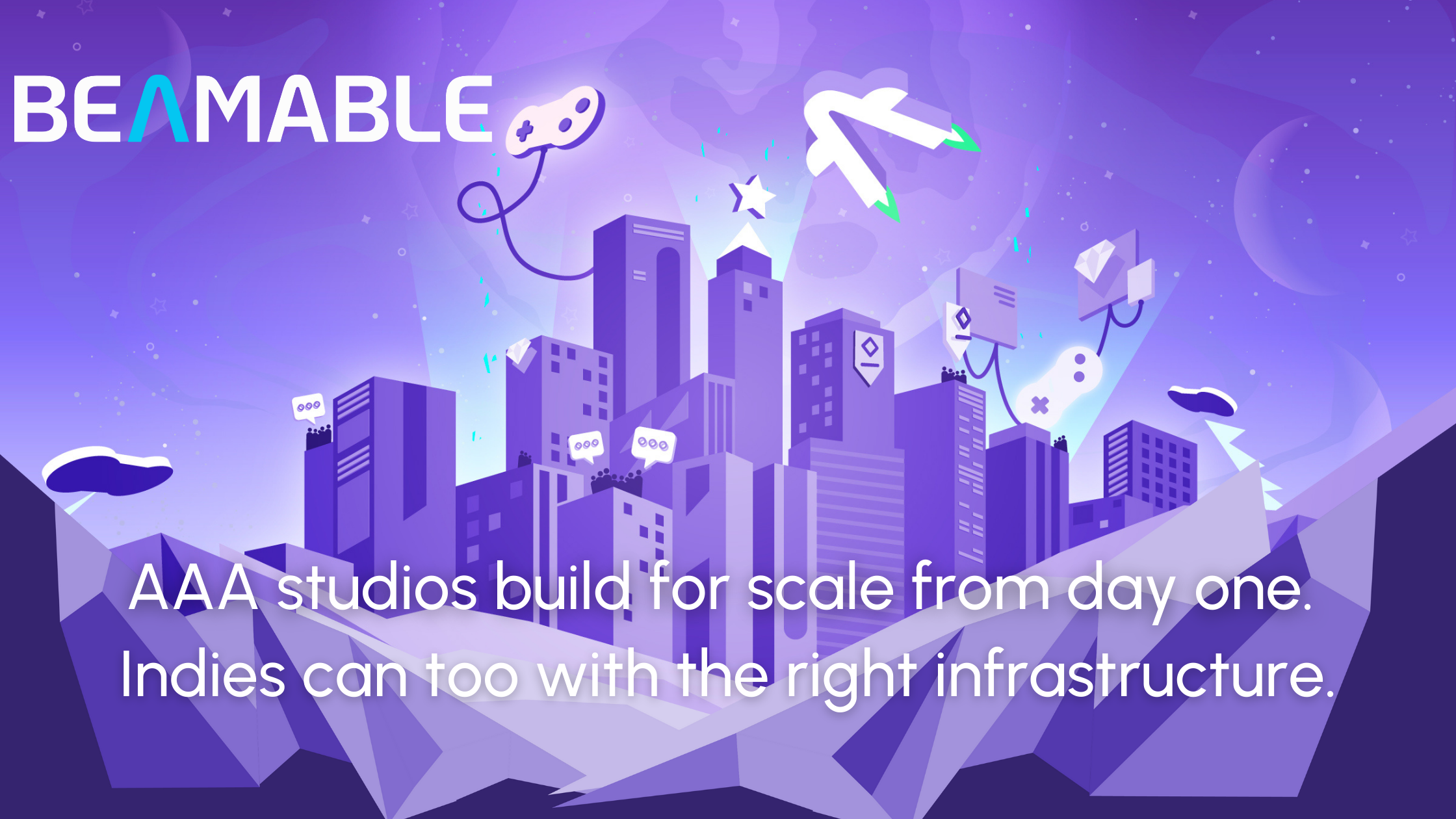
What AAA Studios Know That Indies Often Learn Too Late
Why is scaling live games so difficult?
Today marks the global launch of Pudgy Party, the latest release from Mythical Games — and another title powered by Beamable. The adorable penguins are ready for party royale chaos, but behind the scenes there’s a serious lesson every developer should take to heart: scaling live games is hard.
AAA publishers know this. For years, they’ve operated at a scale where backend decisions can make or break a title. Indies, on the other hand, often wait until they’ve already hit traction to think about infrastructure. By then, it’s like trying to rebuild your airplane while it’s mid-flight.
From FIFA Rivals to Star Trek Timelines to Doctor Who: Lost in Time, the studios behind the world’s biggest IPs prepare for scale from day one. Here are three lessons AAA teams internalize early that indies often learn too late.
Lesson 1: Why does infrastructure matter as much as gameplay?
AAA studios invest heavily in backend infrastructure before launch because they know players won’t forgive downtime. A fun mechanic can win hearts, but if logins fail or progression data disappears, frustration spreads faster than your marketing ever could.
When Mythical launched Pudgy Party globally, they deployed on Beamable’s Private Cloud. That gave their team the confidence to deliver physics-driven fun, costumes, and Web3 integrations — without worrying about server bottlenecks.
Lesson 2: Why is iteration speed survival in live games?
The best live games aren’t just launched — they’re constantly evolving. AAA studios build pipelines that let them push updates, new content, and balance tweaks weekly, sometimes daily.
Take The Office: Somehow We Manage. Fans expect new content drops and character updates that bring the world of Dunder Mifflin to life. Without a backend foundation that supports rapid iteration, those updates would stall.
Lesson 3: Why is scalability not optional?
AAA studios assume success. They plan for millions of players from day one, not thousands. Even if the game never reaches those heights, the preparation ensures stability and peace of mind.
When FIFA Rivals hit the App Store charts, scaling wasn’t left to chance. And for Star Trek Timelines, millions of players across six app stores continue to explore the galaxy because the infrastructure was built for the long haul.
Indies often build for the first hundred or thousand players and hope to “worry about scaling later.” But if lightning strikes — your trailer trends, a streamer picks you up, or your game is featured — you can burn through your once-in-a-lifetime moment in a weekend if your backend collapses.
What Indies Can Do Differently?
The truth is, indies don’t need AAA budgets to build like AAA. Tools and platforms exist today that let small studios plug into scalable, production-tested infrastructure without months of engineering.
That’s exactly why we built Beamable. Our Unity-native SDKs and extensible services let you:
✅ Launch fast with pre-built systems
✅ Scale confidently from hundreds to millions of players
✅ Keep your team focused on gameplay, not firefighting infrastructure
Whether you’re building your first indie hit or your tenth, you deserve the same live-ops foundation AAA studios take for granted.
The Bottom Line
Making a great game gets you noticed. Scaling it keeps you in business.
AAA studios know this instinctively because they’ve lived the pain at scale. Indies who learn it early give themselves the best shot at long-term success.
Don’t wait until your servers are melting and your players are walking away. Build for scale now — your future self (and your players) will thank you.
FAQ: Scaling Live Games with Beamable
Q: Why do AAA studios prioritize backend early?
A: Because downtime, login failures, or data loss can sink even the best gameplay. Infrastructure matters as much as mechanics.
Q: How do AAA studios maintain iteration speed?
A: By building pipelines and using backend systems that let them push new content and balance updates quickly.
Q: Why is scalability critical for live games?
A: Player numbers can spike overnight. Without backend readiness, success can overwhelm servers and damage player trust.
Q: What is Beamable?
A: Beamable is a game backend platform with Unity-native SDKs, extensible microservices, and private cloud deployment for reliable scaling.
Q: Can indies build like AAA without AAA budgets?
A: Yes. Beamable lets small teams plug into production-tested infrastructure, skip custom backend builds, and focus on gameplay.
Ready to scale like AAA?
👉 Talk to Beamable today and see how we help studios of every size launch, scale, and evolve their live games.
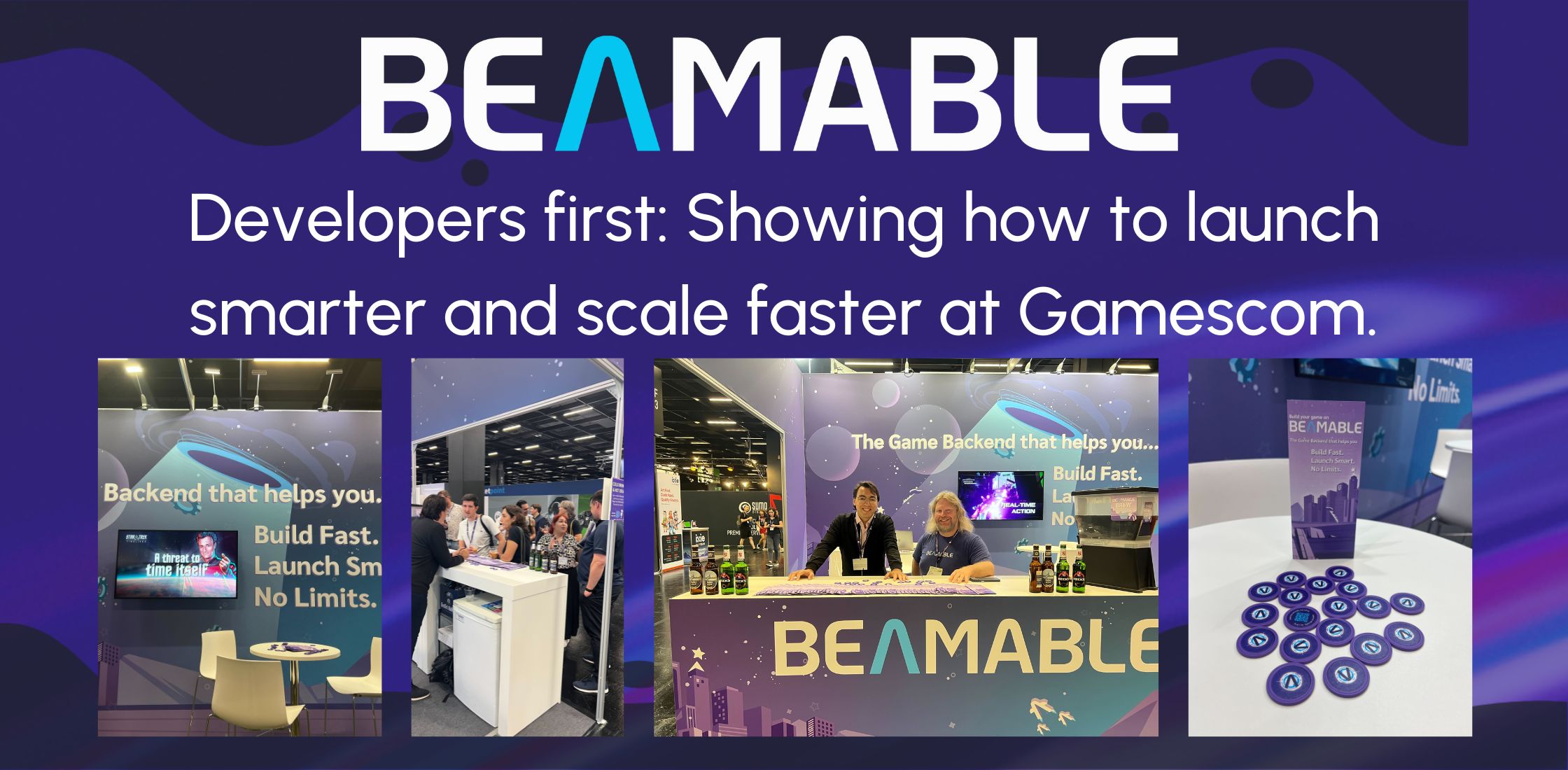
Cold Brew and Hot Code: Showcasing Live Game Tools at Gamescom 2025
Gamescom 2025 was one of our best events yet. Over three days in Cologne, the Beamable team connected with developers, publishers, and partners from all over the world to showcase how our platform helps studios build, launch, and scale live games with speed and flexibility.
A Booth Full of Builders
Our business area booth was buzzing from open to close. Developers—from scrappy indies to major studios—came by to see how Beamable’s Unity and Unreal integrations streamline live game development. From content workflows to backend services like matchmaking and leaderboards, our demos highlighted what Beamable makes possible: more time spent building great gameplay, less time reinventing infrastructure.
Cold Brew and Live Game Chops
We like to say Beamable brings more than just technology—we bring culture, too. At gamescom, that meant serving up daily cold brew straight from home and pairing it with our live game expertise. A little taste of America in Europe, fueling conversations about what it really takes to launch and grow lasting game experiences.
Happy Hour, Happy Community
One of the best parts of gamescom was simply connecting with people. Our Happy Hour quickly became one of the week’s go-to networking spots, with attendees gathering to swap stories, ideas, and future plans. The energy was so strong, we hosted a second one the next day—twice the crowd, twice the fun.
Spotlight on Live Games
Beamable exists to empower studios to deliver long-lasting, live experiences. At gamescom, we saw firsthand how much the developer community values solutions that give them speed, ownership, and flexibility. Whether it was in a meeting room or over a cold drink, the message was clear: teams want to focus on building games, not managing infrastructure.
Beamable.Network Joins the Party
While Beamable was the star of the show, Beamable.Network also had its moment at gamescom. Together with Polygon, Wolves DAO, and MomentumX, we co-hosted a mixer that brought together an amazing crowd of builders, investors, and community leaders to talk about the future of decentralized infrastructure for games. It was a great way to connect Beamable.Network’s mission with the broader Web3 and DePIN ecosystem.
Looking Ahead
As we wrap up gamescom 2025, one thing stands out: the excitement around Beamable is stronger than ever. Developers are looking for ways to build smarter, launch faster, and operate live games with confidence—and we’re here to deliver.
If we missed you at gamescom, we’d still love to connect. Feel free to book some time with our COO Trapper to talk about how Beamable can help you build fast and launch smart with no limits.
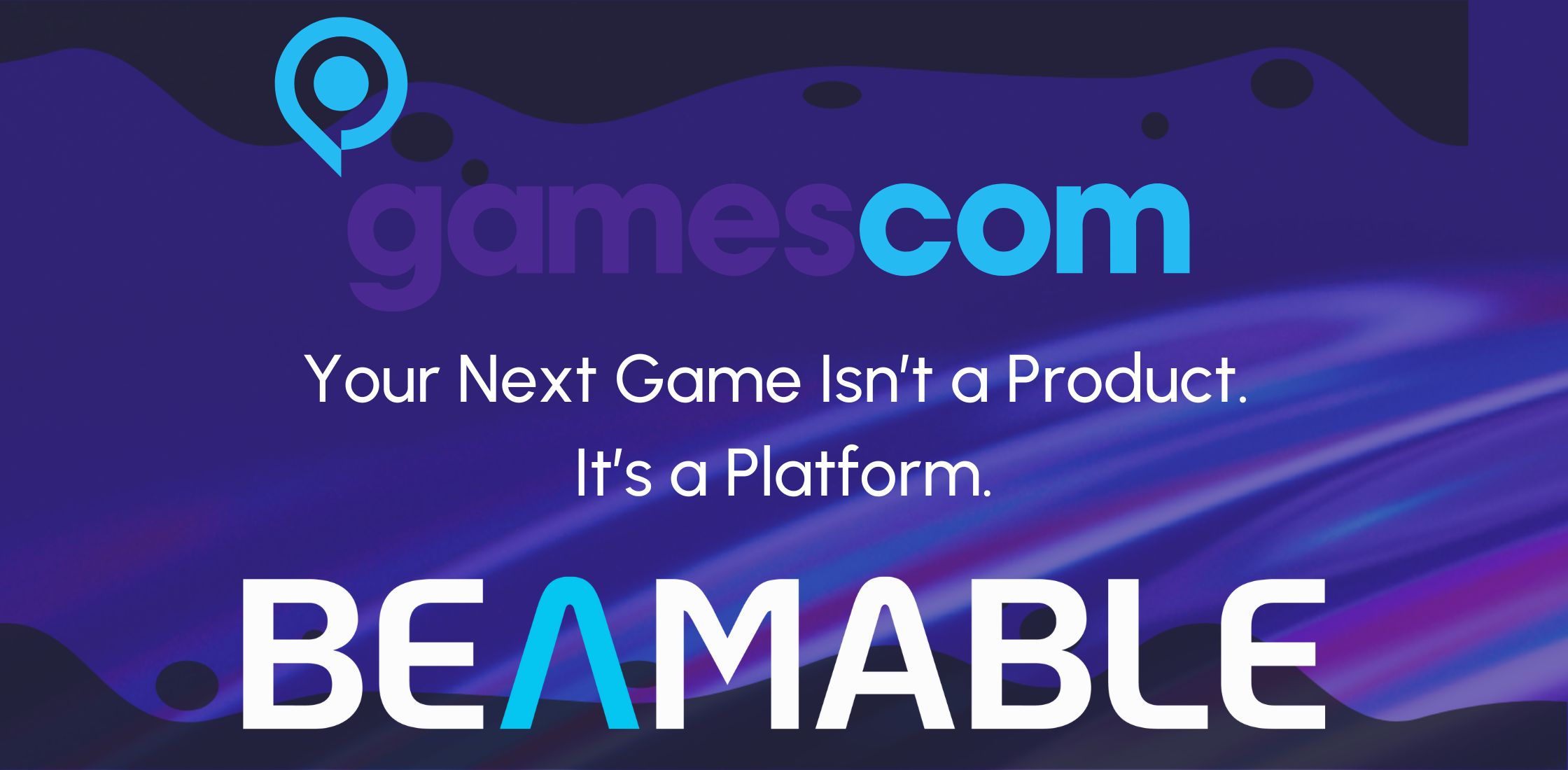
Your Next Game Needs to Think Like a Platform, Not Just a Product
This week, the global games industry is in Cologne for gamescom 2025, and one theme keeps coming up in conversations: the future belongs to studios who treat games like platforms, not just products.
Players today don’t just want a game—they want a living, evolving experience that connects them to communities, offers new content, and gives them reasons to return day after day. That’s the promise of the live service model, and it’s redefining how successful studios build and sustain their titles.
The Rise of the Live Service Model
The transition from packaged products to live services has reshaped player expectations:
- Ongoing engagement – Games that grow keep players invested far beyond launch.
- Sustainable monetization – Revenue streams extend well past the initial sale.
- Community building – Social features turn games into virtual gathering places.
But here’s the catch: live service success doesn’t happen by accident. It has to be designed into your game from the start.
Thinking Like a Platform Matters Early
Too often, studios try to bolt on live service features late in development. The result? Technical headaches, fragmented content pipelines, and missed opportunities.
By thinking like a platform early, you can:
- Scale confidently to millions of players.
- Streamline content delivery with pipelines that empower your team.
- Future-proof your game for new business models, player behavior, and tech shifts.
At gamescom, the studios leading the conversation are the ones already planning for this future.
How Beamable Supports the Shift
Beamable is purpose-built to help developers embrace live service thinking from day one. Our platform delivers:
- Proven Game Services like leaderboards, chat, and guilds.
- No-code Content Tools to launch events and offers without engineering bottlenecks.
- Scalable Infrastructure that grows with your player base.
- Flexible Monetization to keep your in-game economy dynamic.
We’ve already powered millions of players and billions of API calls. Now we’re helping studios at every stage of development launch games that are platforms, not just products.
Let’s Talk at Gamescom
If you’re in Cologne this week, come meet the Beamable team in the Business Hall. We’re here to talk about how we can help your studio embrace live service from day one…. and unlock the full potential of your next game.
👉 Ready to build your next platform? Set up a meeting now: https://calendly.com/tmarkelz/trapper-gamescom-2025?month=2025-08
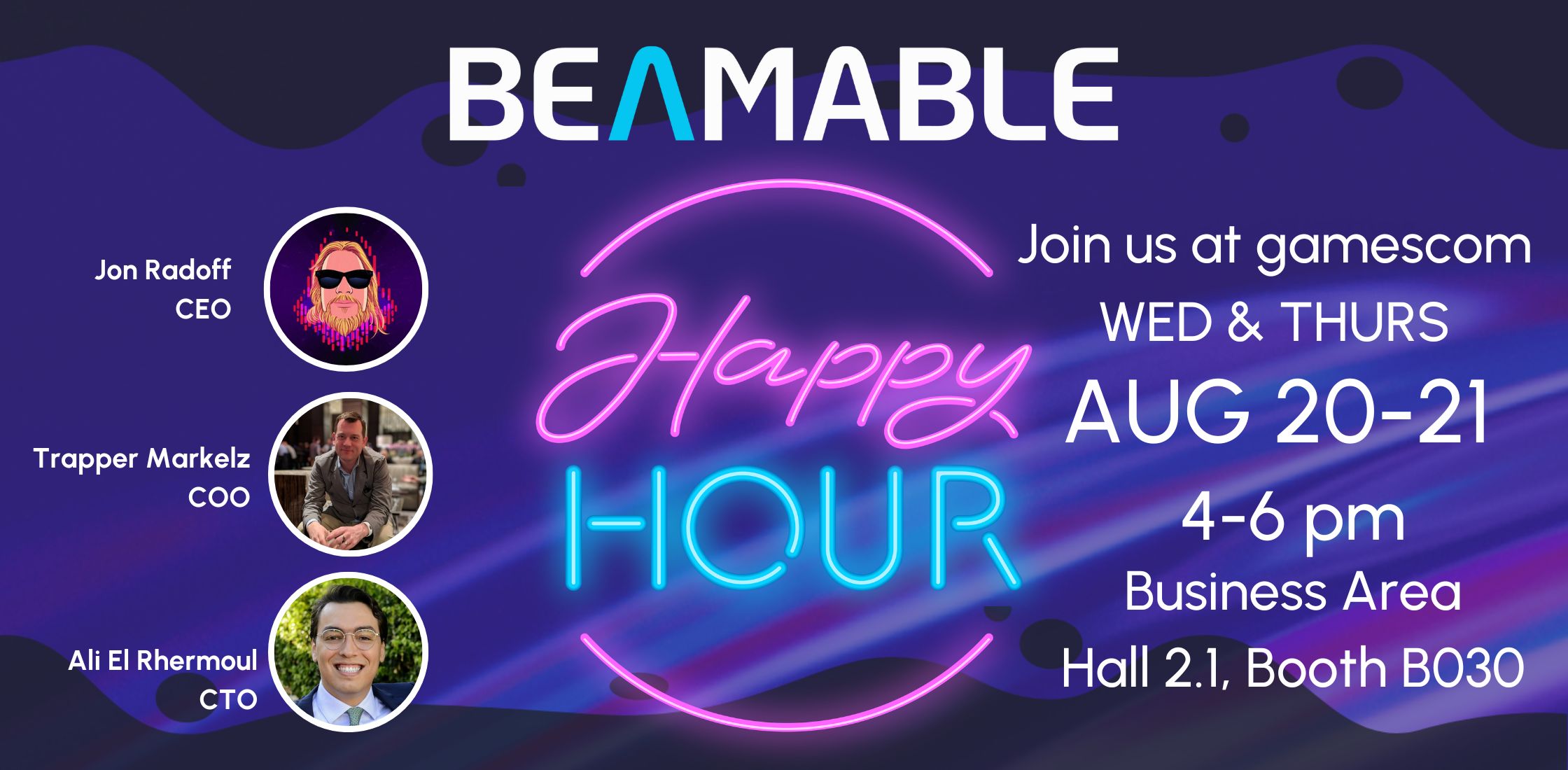
Raise a Glass to Innovation: Beamable’s Daily Happy Hours at gamescom 2025
Join us for drinks, networking, and great conversations in the Business Hall
At Beamable, we’re building the future of game infrastructure—scalable, production-proven, and purpose-built for live games. But we’re also building community. That’s why we’re excited to host daily Happy Hours at our booth during gamescom 2025 in Cologne!
📍 Where to find us:
gamescom Business Area
Hall 2.1, Booth B030
🕓 Happy Hour Times:
Wednesday and Thursday
4–6 pm
We’ll be welcoming friends, developers, publishers, and partners to grab a drink, unwind, and connect with the Beamable team. Whether you’re building your first live game or scaling an existing title, Happy Hour is a great time to learn how our SaaS platform helps teams launch faster, manage live ops with ease, and skip the backend grind.
What to Expect:
🍻 Cold drinks, good vibes
🎮 Live demos and conversations with our founders
🧠 Big ideas about the future of Web3 gaming
🤝 A chance to meet fellow game builders and investors shaping what’s next
We know gamescom can be a whirlwind of meetings and showfloor chaos. Consider this your invitation to wind down, meet the people behind Beamable and Beamable.Network, and explore how we’re unlocking the next era of player-powered games.
Let’s Play, and Let’s Build—Together.
Mark your calendar. Bring your curiosity. And don’t miss your chance to toast to the future of decentralized game development with us.
Can’t make happy hour? Reach out to Beamable COO Trapper Markelz and schedule some time to connect!
Build Fast. Launch Smart. No Limits.
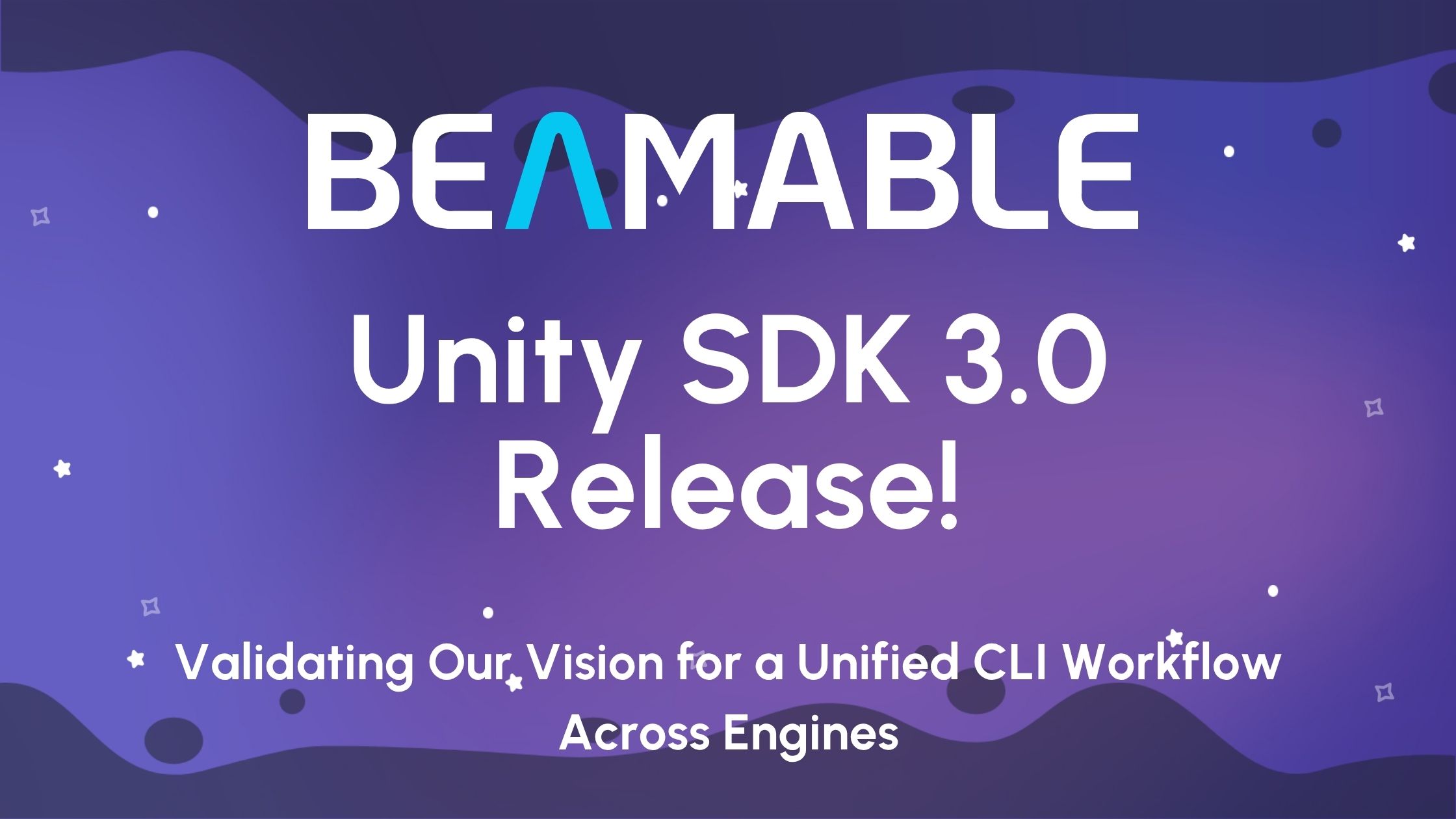
Beamable Unity SDK 3.0: A New Era of Content Management and Developer Experience
This Release Validates Our Vision for a Unified CLI Workflow Across Engines
At Beamable, we’ve always believed that empowering developers means removing complexity, streamlining workflows, and making live game operations as seamless as possible—whether you’re using Unity, Unreal, or something custom.
With the release of Beamable Unity SDK 3.0.0, we’re delivering on that promise in a major way.
What’s New in Unity 3.0.0?
This update isn’t just incremental—it’s a foundational shift in how Unity developers can build, manage, and operate live games with Beamable.
What This Means for Developers
If you’re a Unity dev using Beamable, Unity 3.0.0 gives you:
- More control over your content
- A smoother, more secure development workflow
- A modern toolchain that’s consistent across engines
And if you’re still on the fence about Beamable, there’s never been a better time to try it.
Here’s what we’re most excited about:
New Content Manager Powered by the CLI
We’ve replaced the old Unity-native content tools with a brand new content manager built on our CLI. This means:
- Faster iteration using the same CLI you know and love
- Support for content per realm, so you can isolate and manage content with precision
- A truly dynamic content workflow that mirrors the flexibility and power we’ve already established in Unreal
This is the future of content ops—and it’s available now.
Simplified and Secure Login
We’ve rebuilt the Unity editor login flow using the CLI, eliminating the need to store credentials in Unity’s /Library folder. This not only improves security, but also aligns with modern engineering best practices.
Goodbye Server Package (Sort Of)
The com.beamable.server package? It’s still there—for legacy reasons—but it’s effectively empty. We’ve decoupled core logic from the editor package to streamline usage and reduce clutter.
Upgraded to CLI 5.3
Under the hood, this release leans entirely on CLI 5.3, meaning nearly all important operations are routed through the CLI rather than HTTP calls directly from the Unity editor. That’s a huge architectural shift with some very cool implications:
- Easier debugging
- Better parity across engine clients
- More consistency in how Beamable operates across Unity and Unreal
Cleaner Runtime Behavior
We’ve made the Unity runtime smarter and leaner—no more sending heartbeat messages when PubNub isn’t in use.
Engineering Wins: A CLI-Centric Future
From an engineering perspective, this release marks a major milestone in Beamable’s evolution. The Unity SDK 3.0:
- Minimizes use of UIToolkit, keeping the editor lightweight and maintainable
- Relies entirely on the CLI for key functionality, further validating our cross-engine design pattern
Build fast. Launch smart. No limits.
Explore Unity 3.0.0 and see how Beamable is reshaping live game development—one release at a time.
👉 Check out the Docs
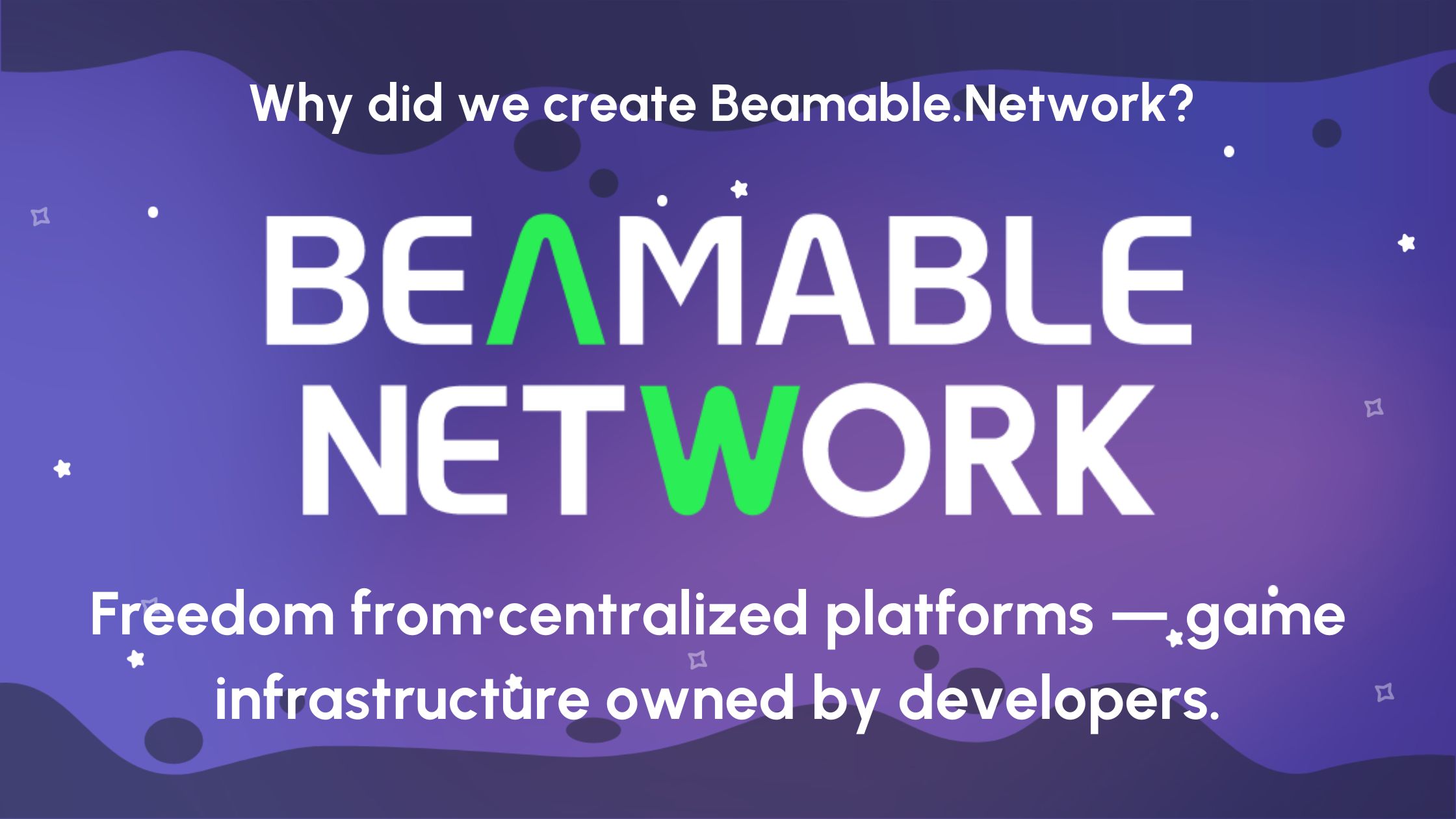
Why We Built Beamable.Network
Unlocking a new era of player-powered games
At Beamable, we’ve always believed in empowering game developers. Our core SaaS platform helps studios launch fast, scale smart, and stay focused on building great gameplay instead of reinventing backend systems. But even as Beamable has grown, we kept seeing the same fundamental tension again and again:
Studios seek creative freedom, scalable infrastructure, and business control, yet they’re locked into centralized platforms that hinder ownership and innovation.
So we asked: What if we could offer the power of a AAA live game platform, but make it decentralized, composable, and owned by the people building and playing the games?
That’s why we built Beamable.Network.
The Big Shift: From Centralized Platforms to Open Infrastructure
Game development is entering a new era. Players expect live updates, social systems, on-chain economies, and multi-platform reach. However, the infrastructure supporting these features remains under the control of a few centralized platforms, which makes developers dependent on third parties for hosting, monetization, and scale.
Meanwhile, a new movement is gaining steam: DePIN — decentralized physical infrastructure networks — are using blockchain and token incentives to build real-world systems that are open, performant, and self-sustaining.
Beamable.Network is our contribution to that movement.
We’re combining the power of Beamable’s battle-tested backend with the openness of decentralized infrastructure, giving developers a new way to build and operate games at a global scale, with actual ownership baked in from day one.
What Is Beamable.Network?
Beamable.Network is a decentralized protocol that brings together:
- High-performance game backend services (identity, content, live ops, commerce)
- Distributed node infrastructure (compute, storage, bandwidth)
- Web3-native monetization models (tokens, NFTs, cross-game assets)
- On-chain governance and composability for community-led innovation
It’s a developer-first ecosystem that replaces the closed, black-box approach of legacy platforms with transparent, interoperable tools.
You can think of it like a multiplayer operating system built to power the next generation of games across mobile, PC, console, and AR/VR.
Why It Matters for Developers
Building a live game today is hard. You’re juggling backend tools, cloud providers, game engines, content pipelines, payments, analytics… and most of it isn’t built to work together.
Beamable.Network solves this by offering:
✅ Out-of-the-box infrastructure for live games
✅ Developer ownership of content, systems, and revenue
✅ Cross-game interoperability via open standards
✅ Lower costs through decentralized node operation
✅ Community-driven evolution, not top-down control
Whether you’re an indie looking to launch your first on-chain game, or a AAA studio exploring new monetization and scalability options, Beamable.Network is your foundation.
From Vision to Execution
We didn’t start with buzzwords. We started with game dev pain.
Our team has built MMOs, launched live services, and run large-scale game platforms. We know what it takes to deliver real-time multiplayer, social systems, and reliable ops across millions of players. Beamable.Network is built on that experience with a vision for what comes next.
And this isn’t just theory. The network is coming to life with nodes launching, games integrating, and an upcoming Token Generation Event (TGE). We’re opening the door for anyone to be part of the ecosystem as a developer, a player, or a network contributor.
Join Us
Beamable.Network isn’t just a product. It’s a movement toward open game infrastructure where studios build faster, players gain real ownership, and the old rules no longer gate innovation.
We’re building it because we believe the future of games should belong to the people who create and play them.
If you believe that, too, come build with us.→ Learn more at Beamable.Network
→ Follow us on X: @Beamable
→ Get updates on our upcoming TGE and node sales
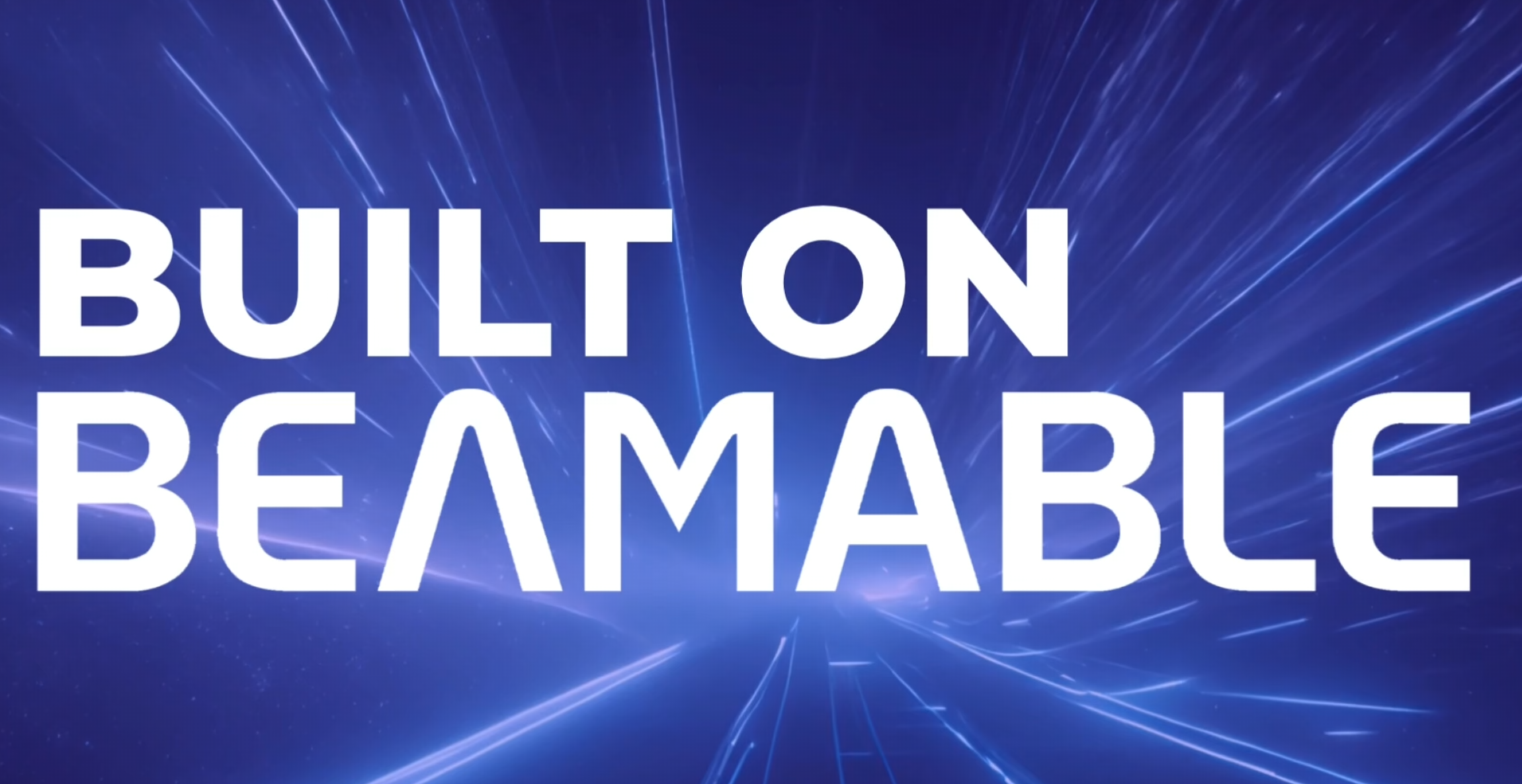
From Indie Dreams to AAA Ambitions: The Games Built on Beamable
At Beamable, we believe game development should be faster, smarter, and more fun – whether you’re a solo dev launching your first passion project or a studio shipping your next AAA title to millions of players.
That belief comes to life in our latest video, showcasing just a few of the incredible games powered by Beamable. What unites them isn’t genre, platform, or budget – it’s the need for live game infrastructure that gets out of the way and lets them focus on what really matters: the player experience.
From charming single-dev experiments and cozy builders, to competitive multiplayer arenas and blockchain-enabled worlds, Beamable is the invisible engine that helps studios of all sizes:
✅ Go live faster
✅ Update content without code redeploys
✅ Monetize with built-in systems
✅ Operate across mobile, PC, console, and Web3 platforms
✅ Scale without breaking their backend—or their team
Whether you’re a studio of one or one hundred, Beamable lets you build the game you imagine – without compromise.
🎮 Watch the video now and see what’s possible when games are Built on Beamable:
And if you’re ready to get started, talk to us about your next big idea!
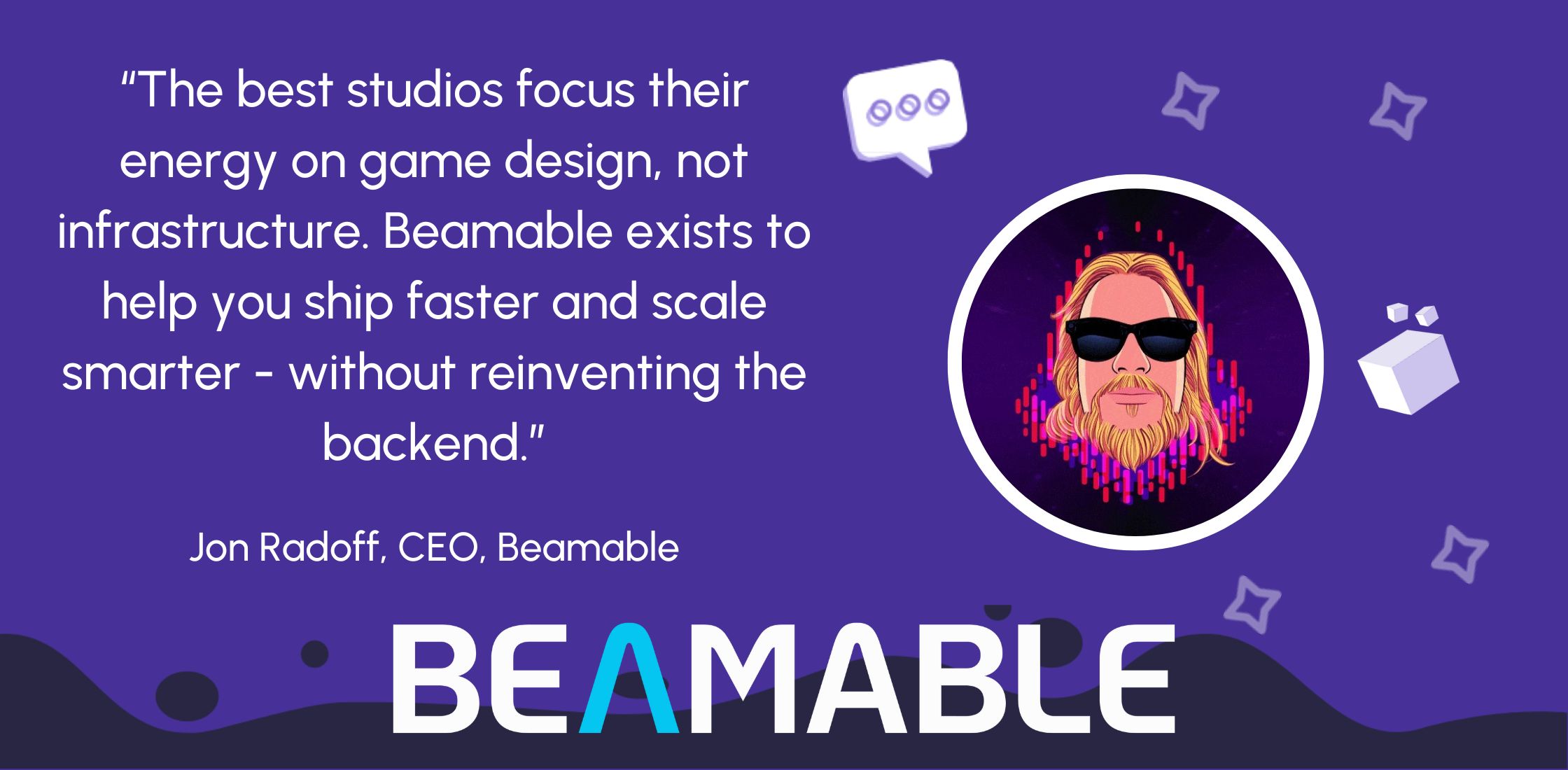
The Real Cost of Building vs. Buying Your Live Game Backend
By Jon Radoff
Building a live game today isn’t just about designing great content. It’s about orchestrating a living, breathing experience – one that evolves in real time, personalizes for every player, and monetizes responsibly. And behind all of that? A complex web of backend infrastructure that most players never see, but every developer feels.
I talk with game studios all the time who are weighing a critical decision:
Should we build our live game backend from scratch, or buy a platform like Beamable?
On the surface, building may seem appealing. Total control. Tailored features. No recurring fees. But under the surface lies a different reality… one filled with hidden costs, tech debt, and roadmaps that never quite catch up to the ambition of the game.
Let’s break it down.
1. Time Isn’t Just Money… It’s Opportunity
When you build your own backend, you’re not just paying in engineering hours. You’re paying in market delay.
Every sprint spent writing identity services, store logic, or player inventory systems is a sprint not spent building your game’s core loop, polishing onboarding, or optimizing your retention curve. Worse, backend code doesn’t generate buzz. It doesn’t drive wishlist additions. It doesn’t get you funding. It just silently delays you.
Beamable customers typically shave 6–12 months off development timelines. That’s a runway-extending, investor-impressing, team-retaining advantage that no homegrown backend can match.
2. The Myth of “One and Done” Engineering
Building your own backend isn’t a one-time investment. It’s a commitment to lifelong maintenance.
APIs break. Storefront logic evolves. Players expect Twitch drops, login rewards, and real-time events. And you know what happens when the only person who understands the content editor leaves the company? Chaos.
With Beamable, updates and improvements happen continuously. You’re not just buying tech – you’re buying sustainability. You’re de-risking your roadmap and freeing your engineers to work on features that differentiate your game.
3. Security, Scale, and… Sleep
Running a live game means handling real money, personal data, and concurrent users across regions. That means compliance, cloud ops, and 24/7 uptime.
Ask yourself:
- Do you want to build and audit your own GDPR and CCPA compliance stack?
- Do you want your team paged at 3 AM when AWS latency spikes in Singapore?
- Do you want to be liable for security vulnerabilities when players hack your homemade server?
Beamable gives you peace of mind. Proven scalability. Battle-tested security. And a team that lives and breathes live ops – so you can sleep a little better.
4. Cost Isn’t Just What You Spend – It’s What You Sacrifice
Let’s talk dollars. To replicate the core systems Beamable provides – identity, social, commerce, content management, live events – you’re easily looking at $500K–$2M in upfront engineering cost. Add another $250K/year for hosting, DevOps, and updates.
But the real cost? It’s the opportunity cost of not shipping fast enough to capitalize on a trend, not having the bandwidth to A/B test your store, or not being able to respond to a player behavior shift in real time.
With Beamable, you pay only for what you use. There’s a free tier to get started, and pricing scales with success – not ambition.
The Smarter Path
We didn’t create Beamable because we dislike custom code. We created it because we believe creativity should never be held hostage by infrastructure.
Beamable is here to unlock velocity. To democratize live game development. To let you focus on what makes your game great – not the plumbing underneath.
So before you commit to a year-long backend build that becomes a five-year obligation, ask yourself this:
Do you want to be a backend company, or a game studio?
Because if your answer is the latter, Beamable might just be the smartest move you make.
Want help weighing your options? Let’s talk → https://beamable.com/contact-us

10 Days to ApeChain: How Beamable Helped POG Digital Pivot Fast
When POG Digital needed to switch their Web3 game integration to ApeChain – fast – they called Beamable. What followed was a 10-day sprint through uncharted territory: new chain, new logic, new constraints. Here’s how we pulled it off:
Step 1: Learn Before You Launch
Before writing a single line of code, we did our homework. ApeChain’s docs, roadmap, and architecture got a full review to confirm it could meet POG’s performance and scalability goals.
Step 2: Locking in a Reliable RPC
To move quickly, we chose Alchemy as the RPC provider. It gave us the tools to test transactions, deploy smart contracts, and move at the speed the project demanded.
Step 3: Adapting to ApeChain’s Transaction Model
ApeChain introduced a twist: multiple transaction formats and non-standard gas behavior. That meant we had to ditch standard assumptions and write custom handling logic.
Step 4: Refactoring Contracts on the Fly
POG’s original “Play for Coins” contract was too large for ApeChain’s limits. We restructured and optimized the code to keep the gameplay intact without exceeding size constraints.
Step 5: Upgrading Beamable’s Microservices
Our live game services – minting, wallets, transaction monitoring – were updated to reflect ApeChain’s gas pricing and encoding differences. Minimal disruption. Maximum flexibility.
Step 6: Launch-Time Curveball? Handled.
One day before launch, POG needed to remint collections on-chain. We shipped an update within hours – tweaking both smart contracts and backend logic to support it seamlessly.
DONE in 10 Days
From research to live deployment, ApeChain support was up and running in just 10 days. It’s a great example of how Beamable helps game teams move fast, even when the target moves mid-sprint.
“Beamable didn’t just help us pivot – they became part of the team. We threw them a major curveball with ApeChain, and they delivered in 10 days. That kind of speed and partnership is rare in Web3.”
– Kyler Frisbee, CEO of POG Digital
Need to Build Fast on Web3?
Beamable helps developers and chain providers integrate smart contract logic, backend services, and live operations – without getting stuck in the weeds.
→ Let’s talk. We’ll help you get there.
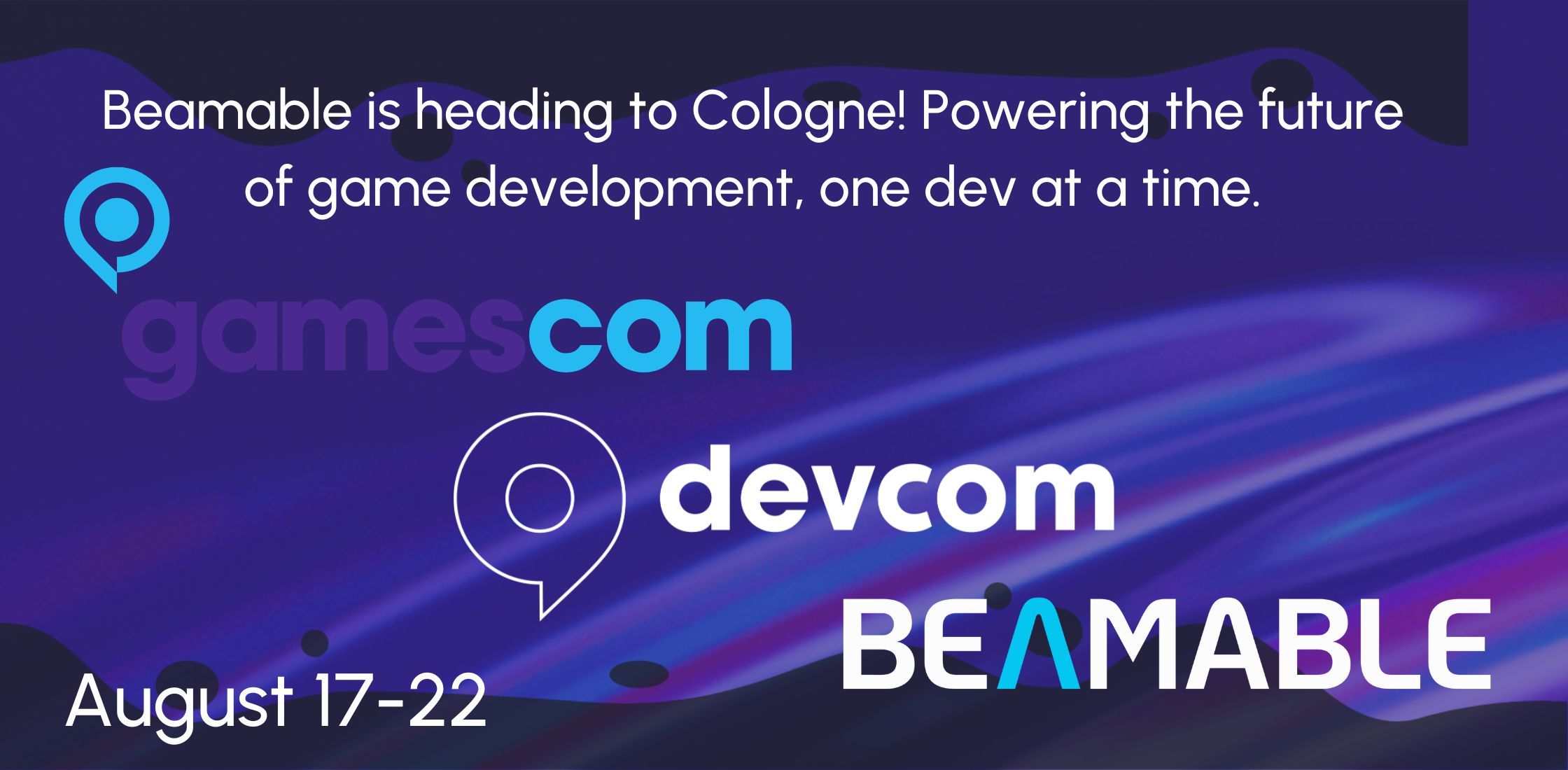
Beamable is Headed to devcom and gamescom 2025!
August is nearly here, and for the global game development community, that means one thing: Cologne, Germany. Beamable is excited to announce that we’ll be on the ground for both devcom and gamescom 2025, connecting with game developers, partners, and publishers from around the world.
devcom: Where Conversations Start
We’re kicking off the week at devcom, August 17-19, the go-to conference for deep industry conversations, insight-sharing, and forging new partnerships. We’re especially excited to meet with:
- Game studios looking to modernize their live ops
- Web3 game developers looking for scalable live ops solutions
- Infrastructure and tool partners exploring integrations
- Publishing teams looking to reduce backend complexity
devcom offers a rare opportunity to sit down face-to-face, learn what developers are building, and find new ways to collaborate. If you’re attending and want to talk shop – whether you’re AAA, indie, or anywhere in between – we want to hear from you.
📅 Book a meeting with Beamable CTO Ali El Rhermoul? Schedule time with Ali here.
gamescom: Come See Beamable in Action
Once the show floor opens, we’ll be exhibiting at gamescom in the Business Area:
Hall 02.1 | Booth B-030
We’ll be showcasing how Beamable helps studios:
- Build faster with Unity-native SDKs
- Launch smarter using Web3-native monetization
- Scale without limits on cloud infrastructure built for games
Whether you’re building a multiplayer RPG, an idle battler, or the next breakout co-op experience, we can help you focus on gameplay, not infrastructure.
🎯 Want to book a meeting with the Beamable team at devcom or gamescom? Drop us a line or visit us at Hall 02.1, Booth B-030.
📅 Want to book a meeting with Beamable COO Trapper Markelz? Schedule time with Trapper here.
See you in Cologne!
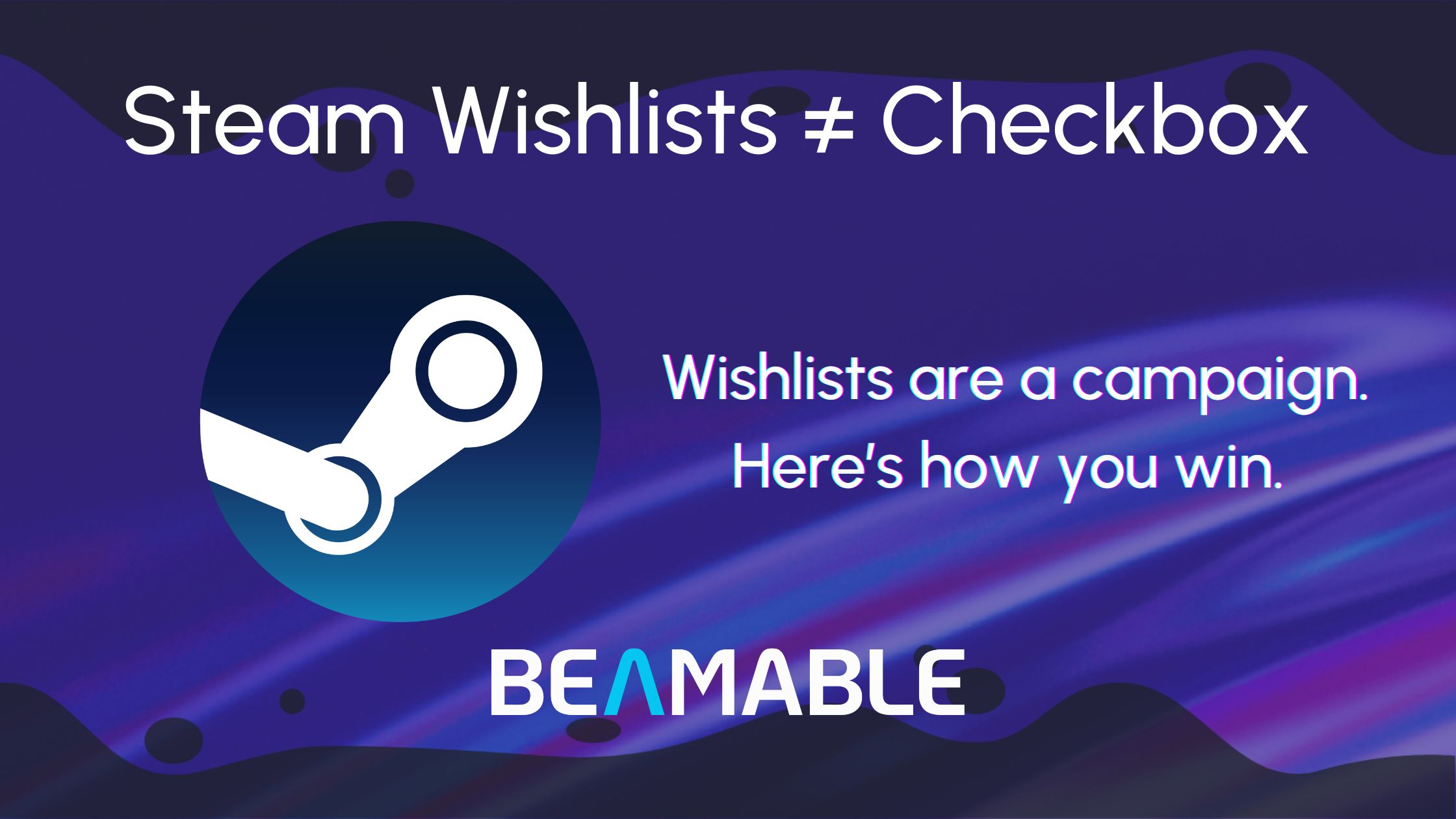
Cracking the Wishlist Code: Smart, Proven Tactics to Boost Your Game’s Steam Momentum
Steam wishlists are the heartbeat of a successful PC game launch. They drive algorithmic visibility, influence festival and media coverage, and give you crucial leverage in conversations with publishers, partners, and investors.
But everyone already knows the basics – set up your Steam page, make a trailer, launch a demo. If you’re here, you’re ready to go beyond that.
Let’s talk about what actually moves the needle.
1. Hit Festivals with Intention – Not Just Presence
Yes, being in Steam Next Fest matters. But don’t just show up – show up with a plan.
- Build pre-fest hype: Schedule creator streams, run countdowns, and tease your demo days in advance.
- Time your social and email pushes around when your genre spikes in traffic during the festival.
- Be active during the event – respond to comments, update your demo with patches, and stream live dev Q&As.
Smart teams treat Next Fest like a launch event, not just another checkbox.
2. Take Advantage of Programs Like Beamable Network Boost to Expand Reach
If you’re launching a multiplayer or Web3-enabled game, Beamable Network Boost can help supercharge discovery. The program amplifies games through coordinated creator outreach, cross-promotions with other network titles, Discord and social pushes, and targeted campaign support—all designed to drive real wishlist activity.
The best part? It’s designed to spotlight games that are building toward launch momentum—not just the biggest names.
👉 Learn more about Beamable Network Boost
3. Build a Shareable ‘Wishlist Moment’ Strategy
Don’t ask players to wishlist – give them a reason to share that they did.
Tactics that work:
- “Wishlist and Share” unlocks (exclusive art, behind-the-scenes content, or community rewards)
- Countdown-style campaigns (“Help us hit 25,000 wishlists to unlock surprise feature X”)
- Social templates that fans can personalize (e.g., “I just wishlisted this – can’t wait!”)
You’re not just collecting wishlists – you’re building hype around them.
4. Drop an Update or Surprise Beat Every 4–6 Weeks
Wishlists spike with attention. Attention comes from newsworthy moments.
Successful studios treat the pre-launch period like a live service:
- New trailer? Tease it. Drop it. Recap it.
- Dev diary? Schedule it and premiere it with a Q&A.
- Big milestone? Celebrate it with your community and media.
You want people checking back in – not just wishlisting and forgetting.
5. Partner With Mid-Tier Influencers for Demo Coverage
Instead of chasing megastreamers, focus on creator clusters with 20K–100K subs who live in your genre. They’re more accessible, more likely to engage with your Discord, and their audiences are laser-focused. Make it easy:
- Offer early demo keys or exclusive content
- Share clean overlays, talking points, and wishlist CTAs
- Give them reasons to revisit – updated builds, dev reactions, even community shoutouts
6. Play the Algorithm: Tag and Category Optimization
Steam’s backend matters. Updating your tags, categories, and description copy every few weeks – based on what’s trending – can dramatically improve your placement in “More Like This” carousels and discovery queues.
Example: If you’re seeing a surge in deckbuilders or cozy games, test related tags to reach that browsing audience.
Pro tip: Use third-party tools like SteamDB and Nocturnal to track competitors and trends.
7. Leverage Discord to Create Momentum That Converts
Don’t just build a Discord – activate it.
- Pin the wishlist link in welcome and announcement channels
- Run dev update AMAs with “wishlist and drop a question” entry
- Host exclusive playtests or behind-the-scenes livestreams for wishlist backers
Treat Discord like a high-conversion landing page that moves people from fans to future players.
8. Celebrate the Climb – Publicly
Whether you’re hitting 5K or 50K wishlists, use those milestones to reinforce social proof and encourage the next wave. Every celebration becomes a re-engagement opportunity.
Good post formats:
- “We hit 25K wishlists! Here’s a thank-you gift…”
- “New milestone unlocked—now let’s go for 50K!”
- “Our community is growing fast. Haven’t wishlisted yet? Get in here.”
Even better: sync these moments with an update or beat to double the impact.
Final Thought: Make Wishlist Growth a Campaign, Not a Checkbox
Wishlists are a byproduct of buzz. You can’t brute force them – but you can earn them by consistently delivering reasons for people to care.
Treat every month before launch like its own campaign. Stack meaningful moments. Track what converts. And amplify with the right partners – whether it’s creators, festivals, or programs like Beamable Network Boost.
Want help driving wishlist momentum?
From creator strategy to pre-launch marketing campaigns, Beamable can help. Let’s make your launch one to watch. Talk to us →
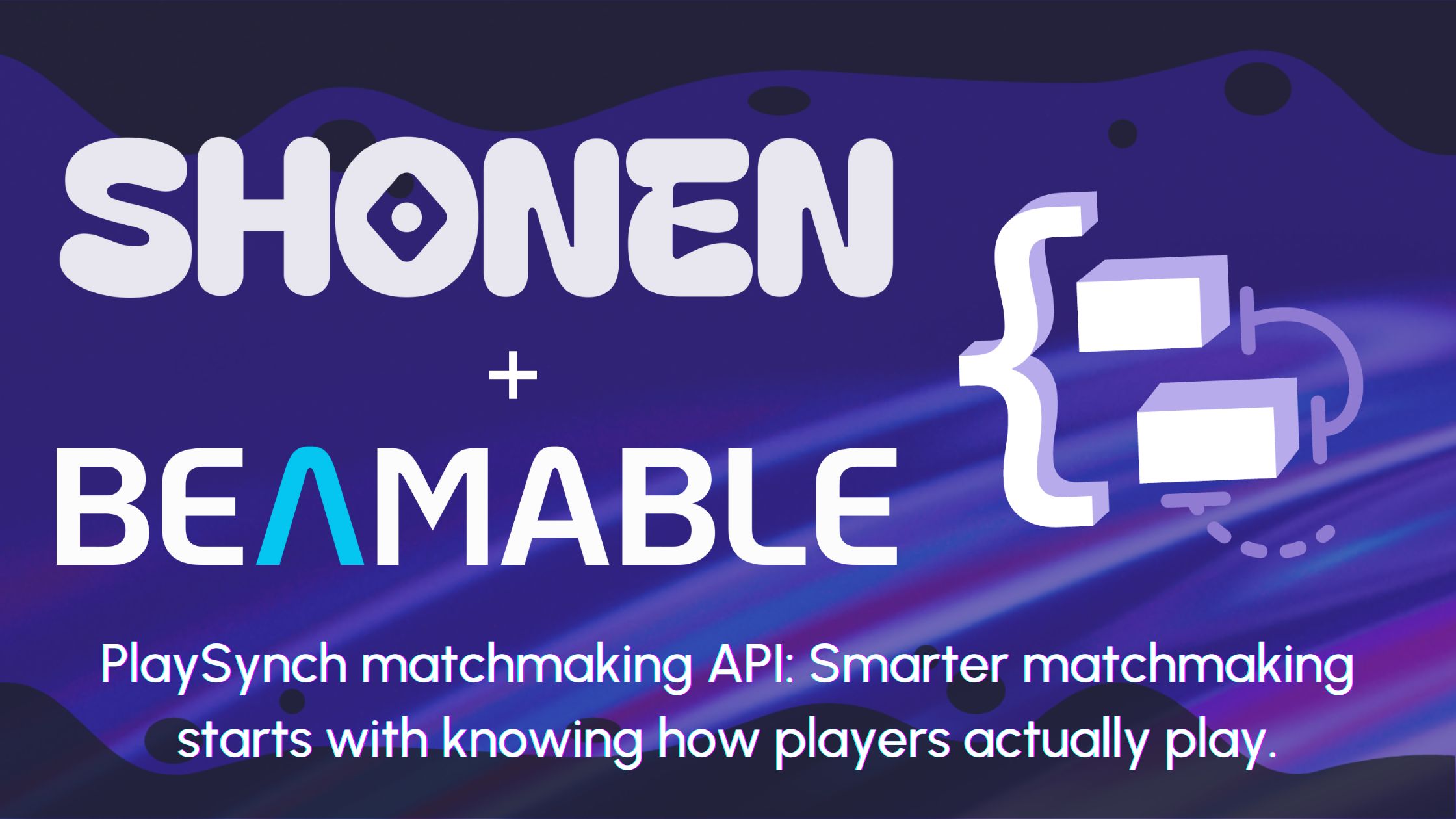
Beamable Marketplace Spotlight: PlaySync Matchmaking API
PlaySync brings a smarter, more social approach to matchmaking – one that goes far beyond ELO and MMR. Designed for today’s multiplayer experiences and tomorrow’s breakout community platforms, the PlaySync API connects players based on how they actually play, factoring in personality, playstyle, goals, and availability.
If you’re building a co-op RPG, a competitive PvP title, or a social-first platform, PlaySync gives you an edge where it matters most: helping players form real, lasting connections.
Matchmaking That Builds Loyalty
Player retention doesn’t hinge on balance alone – it depends on chemistry. With PlaySync, matchmaking becomes about social fit, not just skill. Players are more likely to stick around when they have fun, feel supported, and want to squad up again.
Key differentiators:
- 🎮 Behavior-based matchmaking – Go beyond skill to match based on playstyle, goals, and preferred roles
- 🧠 Social dynamics and personality – Pair players who click, not just compete
🔄 Lightweight and flexible – Works with any game or platform and adapts to your logic
Designed for Game Developers
PlaySync was built with developers in mind. Whether you’re working on a casual co-op game or a high-stakes tactical shooter, PlaySync makes it easy to launch smarter matchmaking fast and scale it as your game grows.
- ⚡ Fast to integrate – Minimal dev lift, maximum flexibility
- 🔧 Custom-fit – You stay in control of matchmaking rules and logic
- 📈 Scalable – Grows with your player base and community dynamics
With PlaySync and Beamable, you can launch more socially sticky multiplayer experiences without backend bloat.
See It in Action
The PlaySync API is launching soon, but you can already experience it live on Shonen, an anime-inspired gaming community built on Sui that uses PlaySync to match players for meaningful, replayable sessions.
Why We’re Excited
At Beamable, our goal is to give studios every advantage to build, run, and grow their games. PlaySync’s player-centric, socially intelligent matchmaking aligns perfectly with that mission.
Because smart matchmaking isn’t just good UX – it’s good retention.
→ Explore PlaySync in the Beamable Marketplace
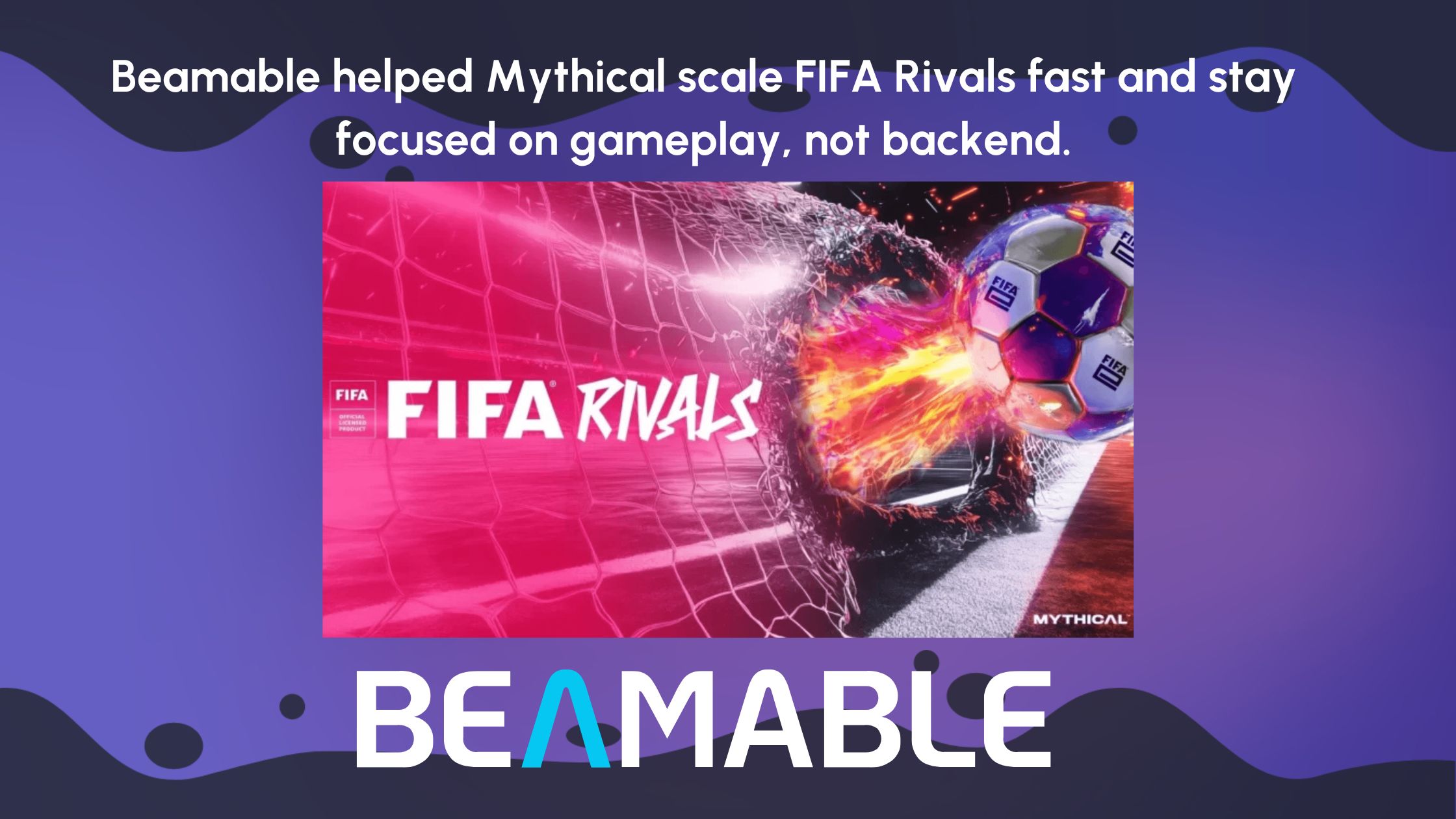
How Beamable Supported Mythical in Scaling FIFA Rivals and Staying Focused on the Fun
When FIFA Rivals launched globally, it quickly rose to the top of the charts and earned strong App Store ratings of 4.8 stars out of 5. Behind the scenes, the other real success story was their infrastructure. The game is on track to reach tens of millions of players, and Mythical Games knew that backend bottlenecks couldn’t be part of the equation.
They needed stability, scalability, and the ability to iterate fast. So they made a foundational decision early on:
Mythical chose Beamable’s Private Cloud
Our single-tenant backend gave them:
- Full customization of infrastructure and service sizing
- A long-term source code license for maximum flexibility
- Deployment on their timeline and terms, with zero reliance on shared infrastructure
Fast Backend Implementation
Mythical integrated Beamable and launched FIFA Rivals in under 9 months. With Beamable’s Unity-native SDKs and game-centric services, they avoided months of backend engineering and were able to focus on building features that players would love.
Hybrid Inventory and Web3 Integration
Using Beamable’s extensible inventory and currency systems, the game supports:
- On-chain assets from Mythos
- Off-chain items and currencies tied to gameplay and progression
- A unified system for managing interoperable economies across Web2 and Web3
LiveOps, Monitoring, and Support
Beamable supported Mythical not only before launch, but as an embedded partner in live operations:
- Extensive load and scale testing pre-launch
- Real-time performance monitoring post-launch
- Issue resolution and operational support from a team with deep experience scaling Star Trek, Game of Thrones, Disney, FOX, and other major IPs
Velocity Without Distraction
The biggest win? Mythical was able to focus entirely on gameplay and iteration, not backend plumbing.
In the final month before launch:
- They shipped multiple feature updates
- Tuned based on player behavior and KPI trends (like retention and engagement)
- Responded rapidly to feedback thanks to Beamable’s tools and LiveOps infrastructure
The takeaway: Mythical didn’t slow down for infrastructure – they accelerated because of it.
That’s the Beamable difference: infrastructure that gets out of your way so you can focus on the fun.
Build Fast. Launch Smart. No Limits.
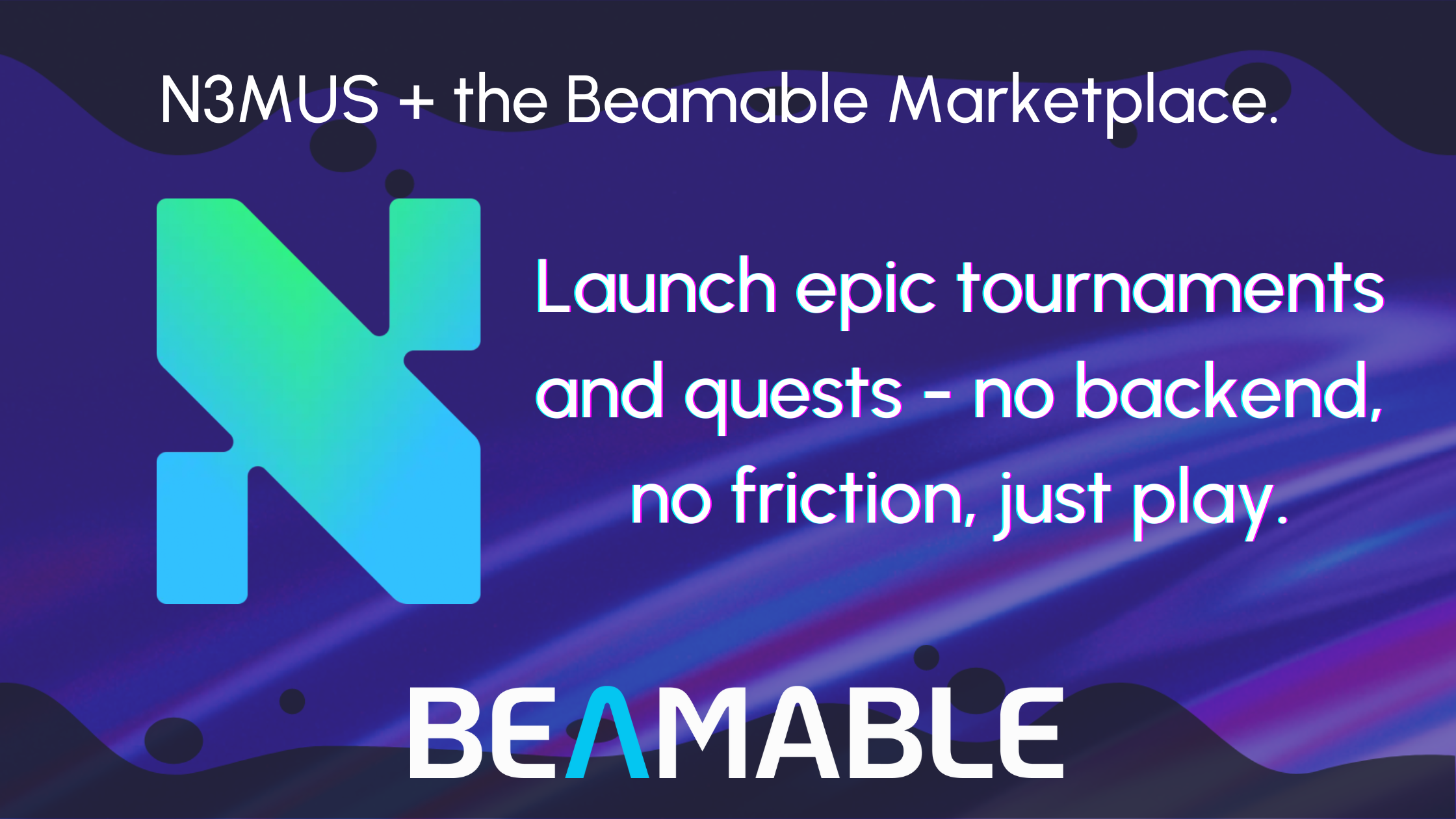
Game Studios Want to Grow. N3MUS + Beamable Just Made It Easier.
Every game developer wants their launch to pop and their community to grow – but driving engagement, creating scalable events, and offering meaningful rewards usually means stitching together brittle tools or spinning up a custom backend.
That’s the problem N3MUS was built to solve.
Now available in the Beamable Marketplace, N3MUS gives developers everything they need to launch scalable, high-impact tournaments, quests, and reward campaigns – with no backend code required.
And when paired with Beamable’s live game services, N3MUS unlocks a powerful new chapter for studios ready to scale their community and deepen player engagement.
🧩 What Is N3MUS?
N3MUS is a plug-and-play platform designed for both Web2 and Web3 ecosystems, making it incredibly easy to launch dynamic, event-based campaigns.
With real-time leaderboards, automated prize distribution, and optional, gasless blockchain integration, N3MUS helps studios:
- Onboard thousands of new players
- Drive engagement through tournaments and quests
- Deliver rewards without backend complexity
- Activate communities across digital ecosystems
It’s battle-tested, scalable, and fully integrated with Beamable.
🎮 What Developers Can Do With N3MUS
Whether you’re building a mobile RPG, a Web3 social game, or anything in between, N3MUS empowers you to:
✅ Run Instant Tournaments and Quests. Create and launch interactive events with scoring, leaderboards, and prize logic – all without writing or hosting any backend code.
✅ Onboard Web2 AND Web3 Players. Reach wider audiences with sponsored tournaments, social challenges, and ecosystem-wide campaigns that scale effortlessly.
✅ Tap Into Blockchain (Only If You Want To). Gasless, wallet-optional blockchain features enable secure, chain-agnostic rewards without the headaches of smart contract management.
“N3MUS is a huge unlock for developers looking to run engaging campaigns without taking on backend overhead. We are excited to work with them and give devs the power to add community features faster.”
— Trapper Markelz, COO of Beamable
“Game devs shouldn’t need to be backend engineers to run epic live events. With N3MUS, we’ve made it possible to launch scalable tournaments, quests, and on-chain campaigns in minutes – and integrating with Beamable brings that power to an even broader set of creators.”
— Neal Peters, Founder of N3MUS
🚀 Why It Matters
Player engagement is the new growth metric – and N3MUS gives developers the tools to level up how they run events, drive retention, and build buzz.
And because it’s fully integrated with Beamable’s live services platform, studios get all the benefits of orchestration, identity, economy, and content tools in one unified workflow.
✅Engage players.
✅Scale events.
✅Grow your game.
N3MUS makes it easy.
🔗 Learn more and explore N3MUS on the Beamable Marketplace:
https://beamable.com/nemus-integration
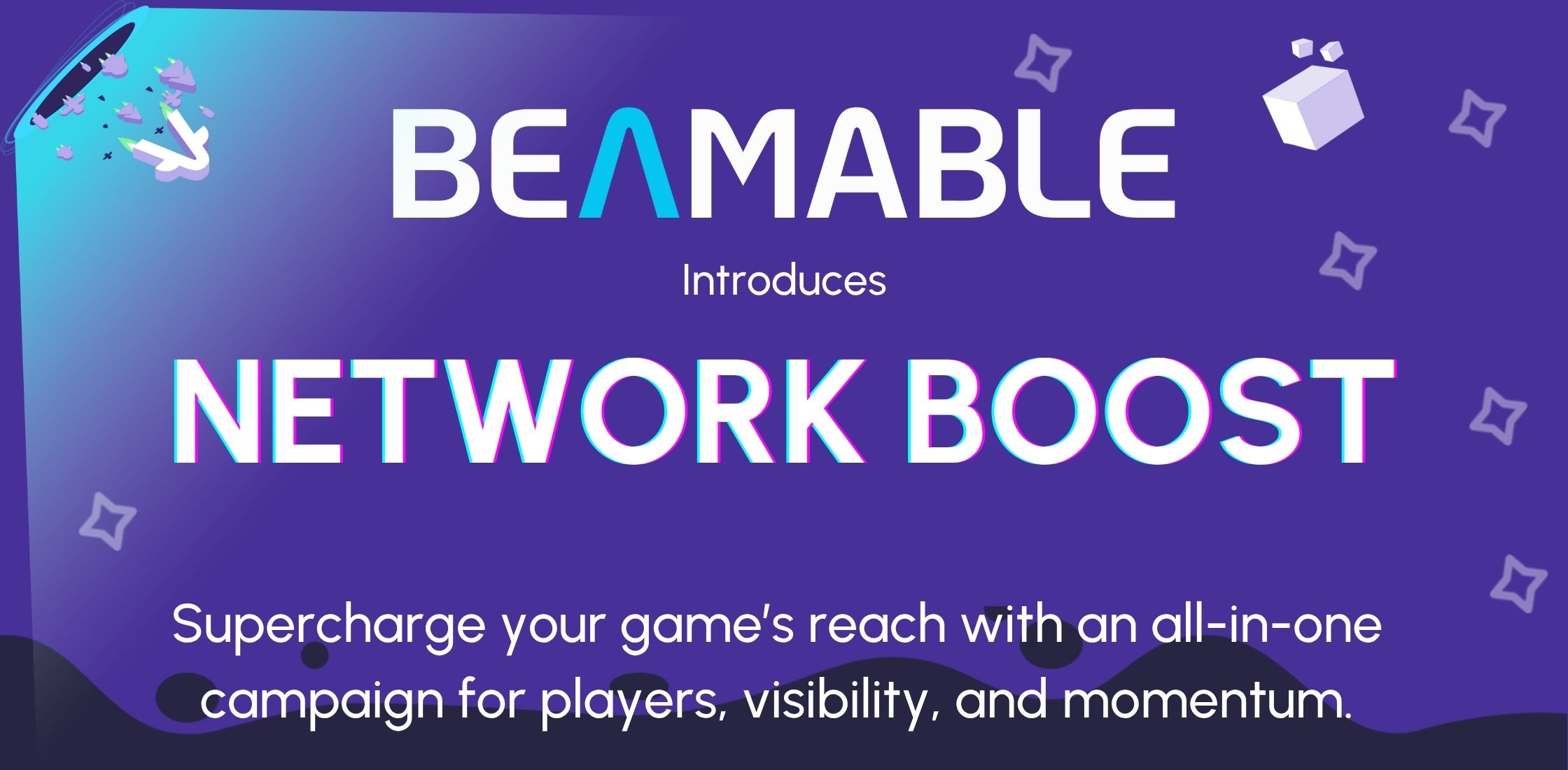
Introducing Beamable Network Boost: Supercharge Your Game’s Reach and Community
Are you a game developer building with Beamable? Do you want to expand your player base, spark massive community engagement, and increase your social presence – all without stretching your studio’s resources?
Beamable Network Boost is your exclusive opportunity to do just that.
🚀 What Is Beamable Network Boost?
Beamable Network Boost is a high-impact promotional campaign tailored specifically for games powered by Beamable. It’s your moment in the spotlight – supported by our team, amplified by our community, and designed to accelerate growth across key player metrics.
Over the summer, we’re running a curated series of Network Boosts to feature top-tier games that are building the future of decentralized gaming. If you’re ready to scale, we’re ready to help.
🔧 What’s Included in a Boost?
🎙️ Livestreamed AMAs
Host a co-branded AMA with Beamable CEO Jon Radoff, where your founders share your vision, journey, and game – live with our growing community of players and creators.
🎯 Gamified Quests
We design and deploy quests aligned to your KPIs – whether that’s wishlists, Twitter followers, Discord joins, or gameplay milestones. Example quests include:
• Following your game on social media
• Watching YouTube or Twitch content
• Joining your Discord
• Wishlisting your game on Steam
…and more.
🎁 Gacha Giveaways
Supercharge participation with rare in-game items, merch, digital collectibles, or whitelist spots for upcoming sales.
📢 Social Amplification
Our team creates and shares co-branded content across Twitter and crypto-native platforms to drive traffic and awareness for your game.
📈 Proven Results from Past Boosts
“Beamable Network Boost is the single best marketing promotion we have ever done. Partnering with Beamable Network Boost gave Warped Universe a massive lift ahead of launch. We activated thousands of new players across Discord, Telegram, YouTube, and Instagram – while also driving engagement through unique campaigns like ‘Proof of Viewership.’ The visibility and momentum we gained were exactly what we needed to prime our community.” — Scott Brown, Warped Games
“Beamable Network Boost was a game-changer for our growth. We gained over 110,000 new Discord followers, brought in 130,000 players, and supported over 140,000 NFT mints. The campaign delivered scale, speed, and exactly the kind of Web3-native audience we were looking for.” — Kyler Frisbee, POG Digital
“Beamable Network Boost played a key role in expanding the Wildcard community. We saw over 10,000 new Steam wishlists and 10,000 sign-ups from players who were genuinely excited about the game. The campaign delivered targeted visibility and helped us reach the right audience at exactly the right time.” — Tony Valcarcel, Head of Marketing, Wildcard Alliance
“Beamable Network Boost helped us rapidly amplify awareness and wishlist traction for Immortal: Gates of Pyre. In just five days, we gained over 5,300 new Steam wishlists, generated hours of livestream content, and reached tens of thousands of players through social media engagement. It was an efficient, high-impact way to grow our audience ahead of launch.” — Ian Hunt, Sunspear Games
❓ How Does It Work?
Beamable has built a network of 4 million+ gamers and creators who complete quests to earn points and unlock rewards on the Beamable Network.
You can explore the questing platform at hub.beamable.network.
Once you’re ready to activate, we’ll configure the content, quests, and rewards to drive gamers to your game.
📆 Ready to Boost?
Integrate Beamable. Pick your week. We’ll handle the rest:
- Content creation
- Quest deployment
- Gacha prize logistics
- AMA scheduling
- Social promotion
All you need to bring is your game and your story.
Beamable Network Boost is for ALL GAMES BUILT ON BEAMABLE – Mobile, PC, Console, Web2, Web3, and everything in between.
Our mission is to get you players, get you plays, get you exposure, and build the Beamable Network.
💡 Let’s Build the Next Breakout Hit
Beamable Network Boost is more than a marketing campaign – it’s a force multiplier for your game. If you’re building on Beamable and seeking to expand your reach, engagement, and momentum, this is your opportunity.
Spots are limited. Read more about the program here, and apply now! Let’s boost your game to new heights.
Build Fast. Launch Smart. No Limits.
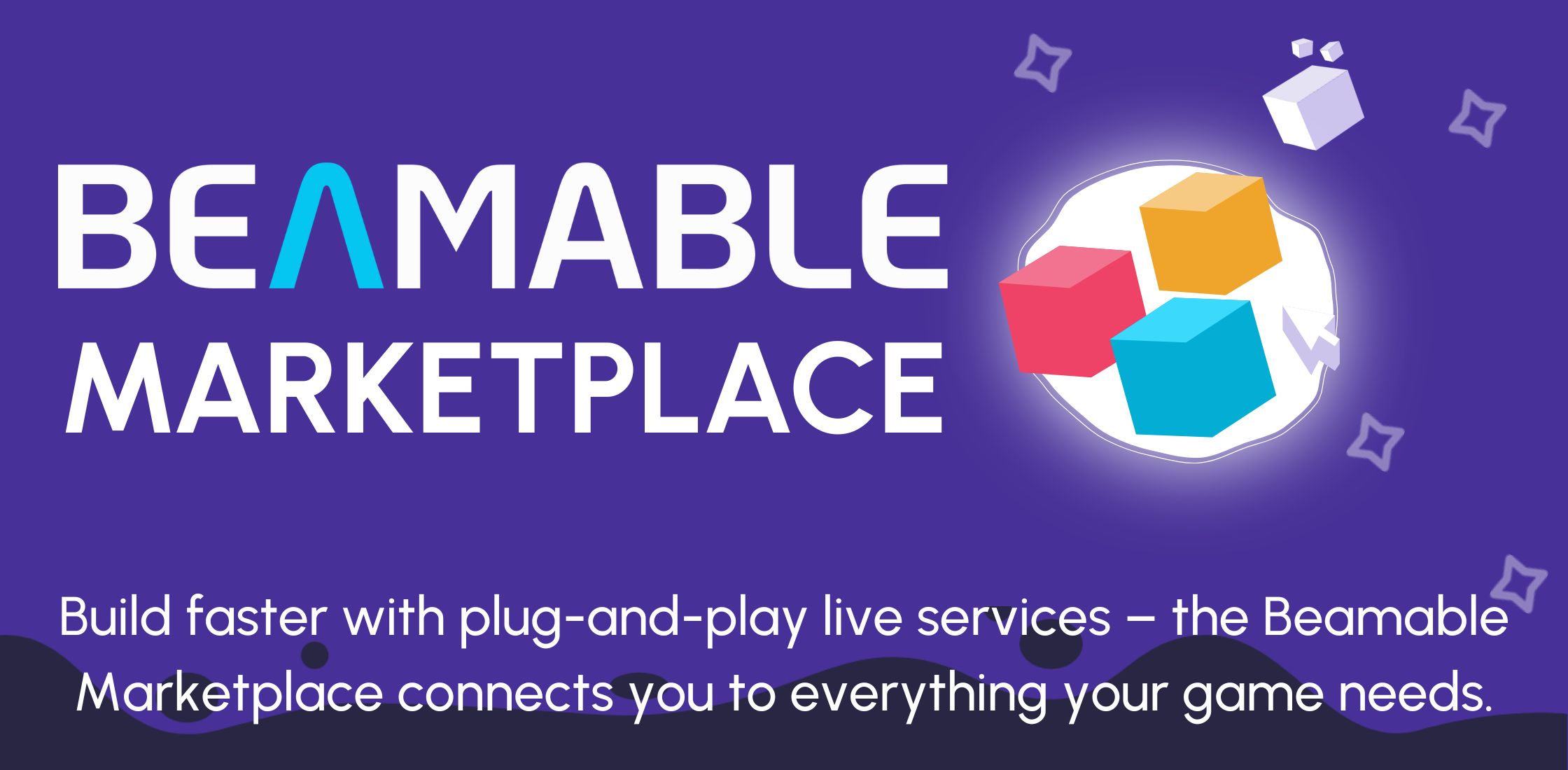
Why We Built the Beamable Marketplace – and How It Helps You Build Better Games
As a game developer, your job doesn’t stop at launch. You’re managing live ops, monetization, backend infrastructure, community engagement, and much more – often with limited resources and growing expectations. At Beamable, we know this because we’ve been there ourselves.
That’s why we created the Beamable Marketplace – a powerful extension of our platform designed to help you build fast, launch smart, and scale without limits.
Why We Built the Beamable Marketplace
We built the Marketplace to give developers like you a faster, smarter path to building and scaling great live games – without getting bogged down by backend complexity or third-party headaches.
Instead of spending weeks stitching together services or reinventing critical systems, the Marketplace offers curated, pre-integrated solutions that plug directly into your Beamable-powered game. It’s a unified ecosystem built to help you:
- Build fast by integrating essential tools – such as payments, content management, and live services – without writing backend code
- Launch smart with trusted partners that reduce risk and speed up implementation
- Break limits with a growing network of partners that support every aspect of your game – from monetization and compliance to analytics, community, and more
Whether you’re a solo dev or a live service powerhouse, the Beamable Marketplace gives you the flexibility and firepower to create without compromise.
What You’ll Find in the Marketplace
The Beamable Marketplace is your gateway to a curated collection of tools and services that can help you:
- Monetize your game efficiently
- Automate backend functionality
- Deliver seamless live service experiences
- Connect with trusted third-party platforms
- Grow without outgrowing your infrastructure
Every tool in the Marketplace is purpose-built for the realities of game development – saving you time, reducing technical debt, and helping you stay focused on delivering great gameplay.
Powerful Partners, Real Impact: Tebex
We’re proud to feature trusted, production-ready partners in the Marketplace – and Tebex exemplifies exactly why this matters. Tebex is a full-stack monetization platform trusted by thousands of games—from Minecraft servers to MMOs and modding communities. Now fully integrated with Beamable, Tebex gives you everything you need to start generating real revenue, fast.
With Tebex, you can:
- Sell in-game items, DLC, passes, and cosmetics via in-game or webstore checkout
- Process payments globally with built-in tax handling, fraud protection, and compliance
- Launch fast with customizable storefront templates
- Keep more of your earnings thanks to lower transaction fees than traditional platforms
Tebex handles the hard stuff – payments, taxes, legal overhead – so you don’t have to. It’s an ideal solution for studios that want complete control over their game’s economy, without building it all from scratch.
Who the Marketplace Is For
The Beamable Marketplace was built for game makers of all sizes – from scrappy indie devs to studios running massive live services. It’s especially valuable if you’re looking to:
- Add monetization and payments without building from scratch
- Avoid the complexity of backend and compliance systems
- Launch faster with vetted, ready-to-use tools
- Maintain creative and financial control over your game
- Scale your game without scaling your engineering team
What’s Next
The Marketplace is just the beginning. We’re continuously adding new tools, services, and strategic partners to expand what’s possible for your game. From monetization and payments to community, economy, and live ops – there are no limits to what you can build.
Explore the Marketplace Today
Discover how the Beamable Marketplace can accelerate your development, simplify your launch, and help you scale without compromise:
Need help integrating a Marketplace tool or want to talk strategy? Reach out to the Beamable team – we’re here to support your next big idea.
Build Fast. Launch Smart. No Limits.
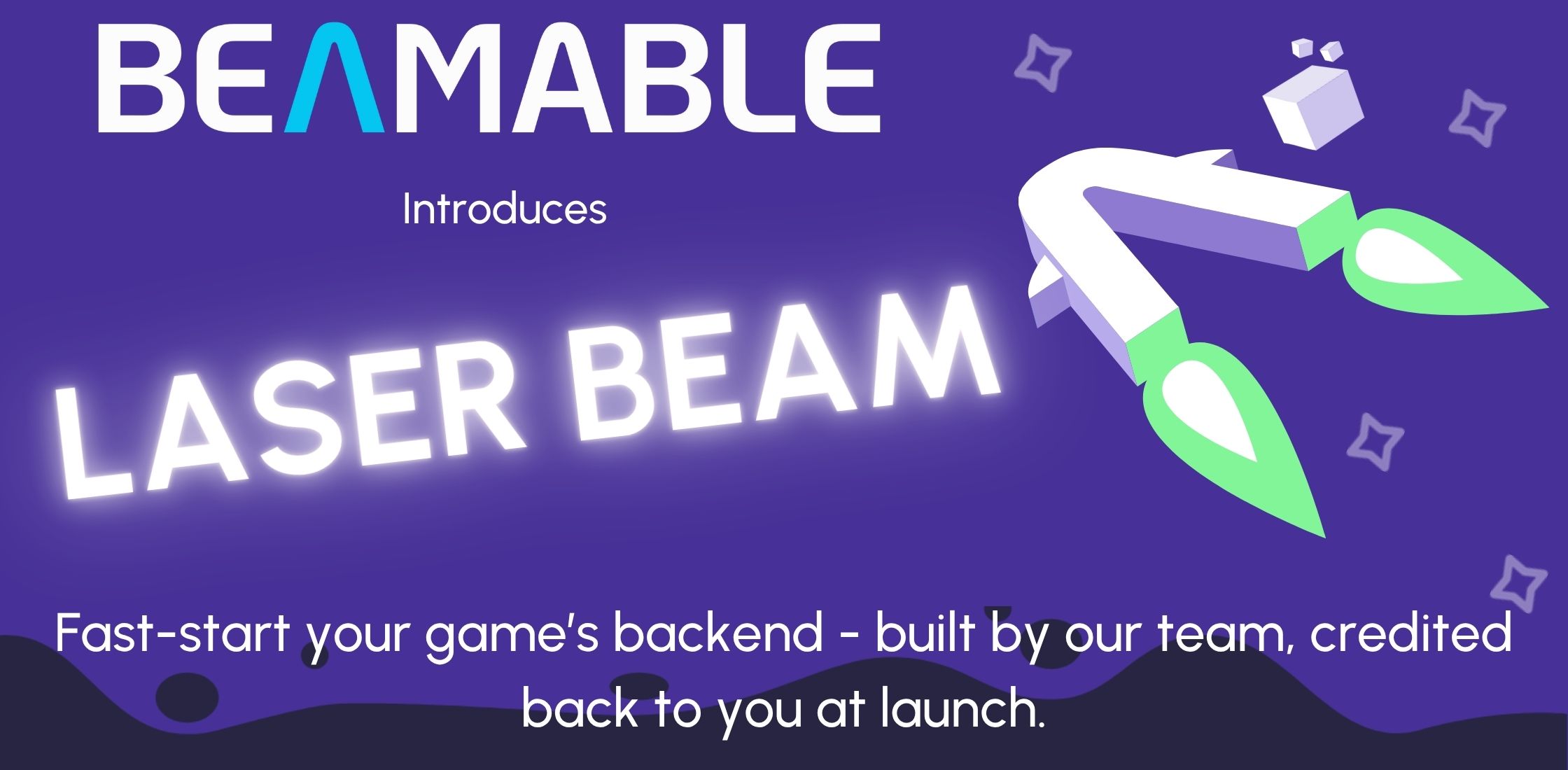
Introducing Laser Beam: A Faster Way to Build Your Backend on Beamable
If you’re a game developer, you know that building the backend can be a painful part of launching a live game. It’s complex, time-consuming, and expensive – especially if you’re a small team without backend engineers on staff.
That’s why we created Laser Beam.
Laser Beam is a focused onboarding program from the Beamable team that gets your game’s backend live fast. For just $5,000 upfront, we’ll set up your Beamable environment, integrate with your project in Unity or Unreal, and give you direct support from the people who built the platform.
And here’s the kicker: that $5,000? It gets credited back to you as usage credits when you go live.
What’s Included in Laser Beam?
With Laser Beam, you’ll get a comprehensive, ready-to-scale backend built for you.
Here’s what’s included:
$5,000 SDK Install – We’ll implement Beamable in your game – Unity or Unreal – with three core systems:
- Identity – Frictionless and ready to link to primary platforms like Apple/Google/Steam
- Player Profile – a 360-degree player CRM with profile stats
- Content Management – So you can update your game over the wire.
- Base Analytics – To populate a dashboard with DAUs, MAUs, and cohort retention (D1, D3, D7, Etc)
12 Months of Discounted Pro Support – To get the support you need to ship
- $500/month (a discounted rate)
- Private Slack channel with Beamable engineers
- Hands-on help from setup through launch
$5,000 Usage Credit – For when you ship and scale
- Covers API usage fees when you cross 50 million calls/month
- Additional usage: $10 per 1 million calls
It’s our way of investing in your success. You get a working backend and expert support now, and we credit it back to you when you go live.
Who Is Laser Beam For?
Laser Beam is purpose-built for:
- Studios without backend engineers
- Teams on tight timelines
- Games nearing soft launch or early access
- Projects that want to “just get going”
Rather than spending weeks figuring out live services, you can hand it over to the team that built Beamable – and get to launch faster.
Why We Built It
We’ve worked with hundreds of studios, and the same challenge comes up over and over: teams are eager to build, but the backend either slows them down or gets cut short.
We wanted to remove that bottleneck and make your game backend setup effortless, reliable, and affordable. With Laser Beam, you don’t have to guess. You don’t have to reinvent the wheel. You just get a working backend built by the experts who know Beamable best.
It’s Beamable – ready out of the box.
Why Not Just Use the Free Tier?
Our free tier is a great way to explore Beamable, but it’s completely DIY.
Laser Beam is plug-and-play, with pro-level support. Instead of your engineers spending time ramping up, you’ll get a live backend, personalized support, and a production-ready environment, all in a fraction of the time.
Next Steps
Laser Beam is available now. We’re not shouting about it with a press release. No noise, no hype – just a way to help studios move faster.
If you’re interested, let’s talk. In the meantime, learn more about our implementation: https://beamable.com/why-beamable/co-dev-implementation
👉 Or, if you’re already in touch with our team, just ask about Laser Beam and we’ll get the process started!
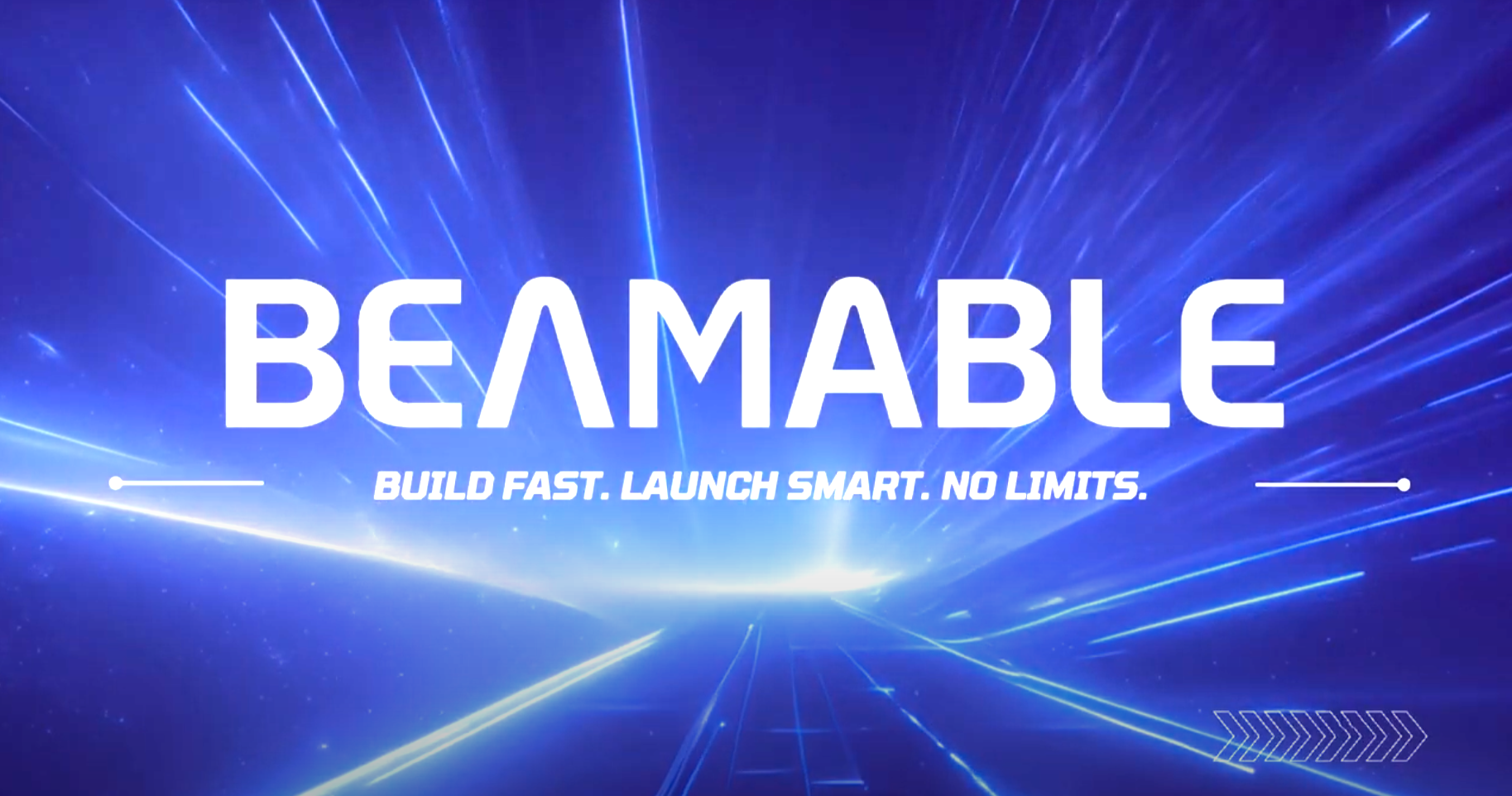
Game Development Should be about Imagination – not Infrastructure
But too often, it’s the opposite. Teams pour their energy into building backends, patching together multiplayer services, or troubleshooting live ops – when what they really want is to create the next unforgettable world, mechanic, or moment.
That’s why Beamable exists.
We built Beamable to take the complexity out of live game development and give studios the power to focus on what matters: the game itself. Whether you’re an indie pushing boundaries or a AAA studio scaling a universe, Beamable is here to do the heavy lifting.
With Beamable, you get a powerful set of tools and infrastructure that’s:
- Battle-tested and developer-friendly
- Plug-and-play with Unity, Unreal, and the platforms you’re already using
- Tailored for live games – with built-in support for multiplayer, economy, commerce, events, and more
- Future-ready – built to evolve with the next wave of gaming, including Web3 and decentralized infrastructure
We’ve watched too many studios burn out building the same backend systems over and over again. So we decided to change the game.
Beamable is more than a service – it’s a partner in your development journey. We’ve built the connective tissue so you can build the game.
Let us handle the backend. You handle the fun.
🎥 Watch the video to see what Beamable unlocks for game developers like you!
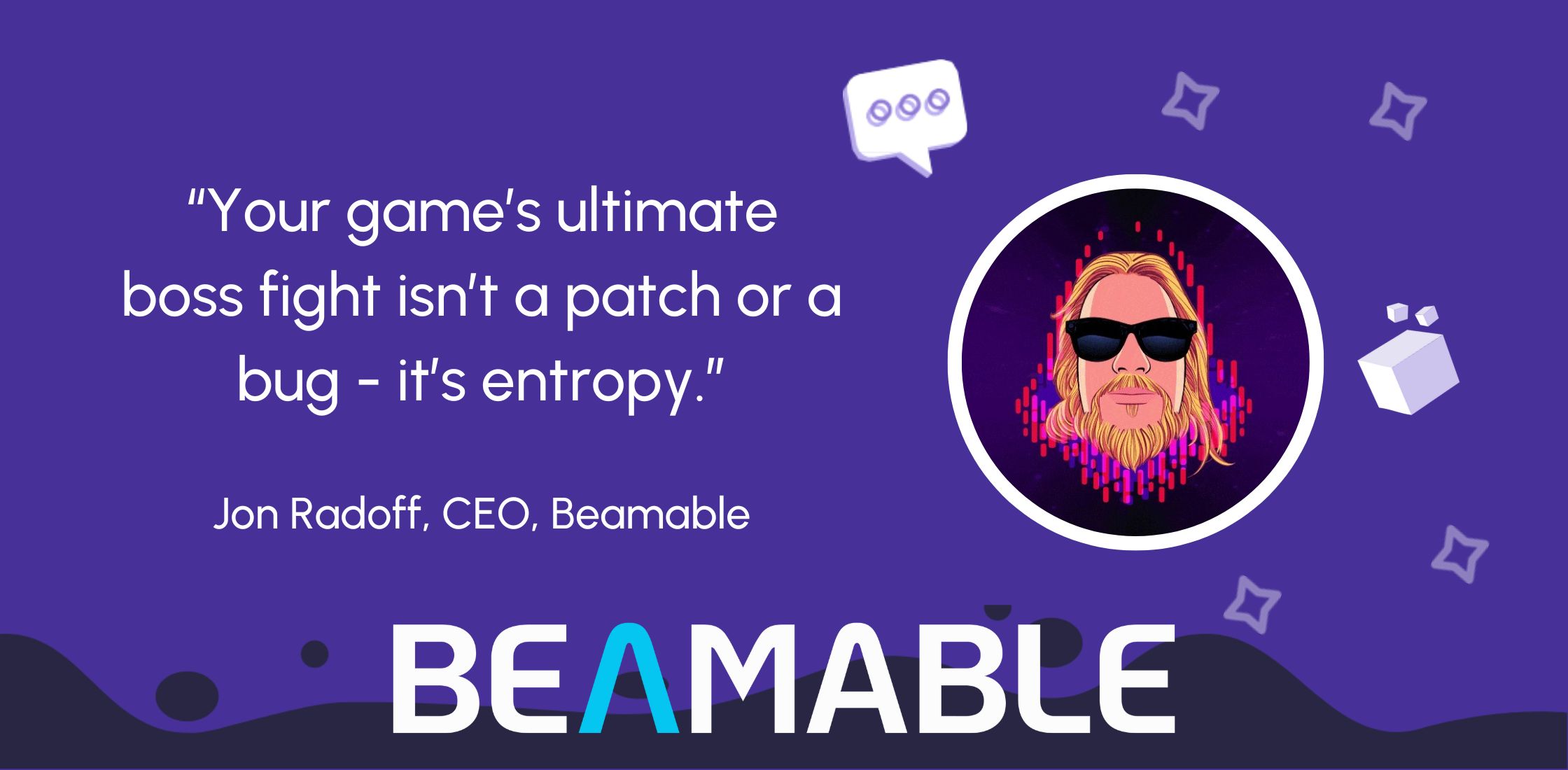
The Real Game Isn’t What You Built – It’s What You Keep Alive
Launch day is a milestone. A cause for celebration. A moment of pride. But in today’s live service era, launch day is just the tutorial. The real game begins after you hit “publish” –
and most studios are not ready.
At Beamable, we’ve seen this story play out time and again: teams put everything into building a great game, only to realize – too late – that what determines success isn’t what they shipped. It’s what they sustain.
Why Launch Isn’t the Finish Line
The gaming industry still romanticizes the idea of the big launch. Teasers, trailers, early access countdowns – it all builds toward the day your game enters the world.
But if you’re building a live service game, a free-to-play title, or any game designed for long-term engagement, you can’t afford to think like a launch studio.
You have to think like a live studio – one that’s organized not just around building games, but around keeping them alive.
The Real Boss Fight: Entropy
What kills most games post-launch isn’t a bad review or a patch gone wrong. It’s entropy – the slow unraveling of systems that aren’t designed to adapt.
- Outdated infrastructure that can’t scale with your player base
- Rigid tools that slow down your LiveOps team
- Burnt-out developers and exhausted support staff
- A brittle economy or engagement loop that can’t evolve
If you aren’t designing for this challenge, you’re designing for obsolescence.
“Your game’s ultimate boss fight isn’t a balance patch or a new DLC. It’s entropy. And it is relentless.”
– Jon Radoff, CEO of Beamable
Build Fast. Launch Smart. No Limits.
At Beamable, we believe the studios that will win the next era of gaming are those who treat longevity as a design goal, not a side effect.
That means:
- Reframing the mission from “game development” to “ecosystem design”
- Investing early in backend infrastructure that can flex and scale
- Equipping teams with LiveOps tools that empower iteration without engineering bottlenecks
- Designing for lifecycle instead of launch hype
Because the real game isn’t what you built. It’s what you keep alive.
“The future of gaming doesn’t belong to those who launch the fastest—it belongs to those who adapt the longest. The next generation of studios will be defined not by what they build, but by what they evolve.”
– Jon
From Game of Thrones Ascent to Star Trek Timelines: Lessons from the Front Lines
Beamable CEO Jon Radoff knows what it means to run a live game at scale. As the creator of Game of Thrones Ascent and Star Trek Timelines, he’s seen firsthand how backend architecture, community resilience, content pipelines, and tooling decisions make – or break – a game’s future.
In both titles, it wasn’t the launch that mattered most. It was the ability to:
- Rapidly deploy content
- Scale operations without burning out the team
- Design an evolving player experience
- Build infrastructure that could handle the unexpected
Those lessons now power Beamable’s platform – used by studios today to build sustainably from day one.
Design for the Lifecycle
Here’s the truth: if you’re not ready for what happens after launch, then launch isn’t your biggest challenge.
You need to prepare for:
- Years of content drops
- Ongoing community engagement
- Real-time data and analytics
- Retention loops and monetization balancing
- Server scaling, ops, and 24/7 uptime
- Team turnover and tool continuity
Games are no longer disposable. They’re evolving products – and success belongs to those who design accordingly.
Don’t Just Ship a Game. Sustain a World.
Beamable exists to help studios transition from launch thinking to lifecycle thinking. We provide:
- A full-featured backend for live games with Unity and Unreal support
- A powerful LiveOps portal so your team can update content without engineering
- Support for decentralized infrastructure via Beamable Network
- Tools that let you focus on gameplay and player experience – not server maintenance
Let’s build games that don’t just survive – they thrive.
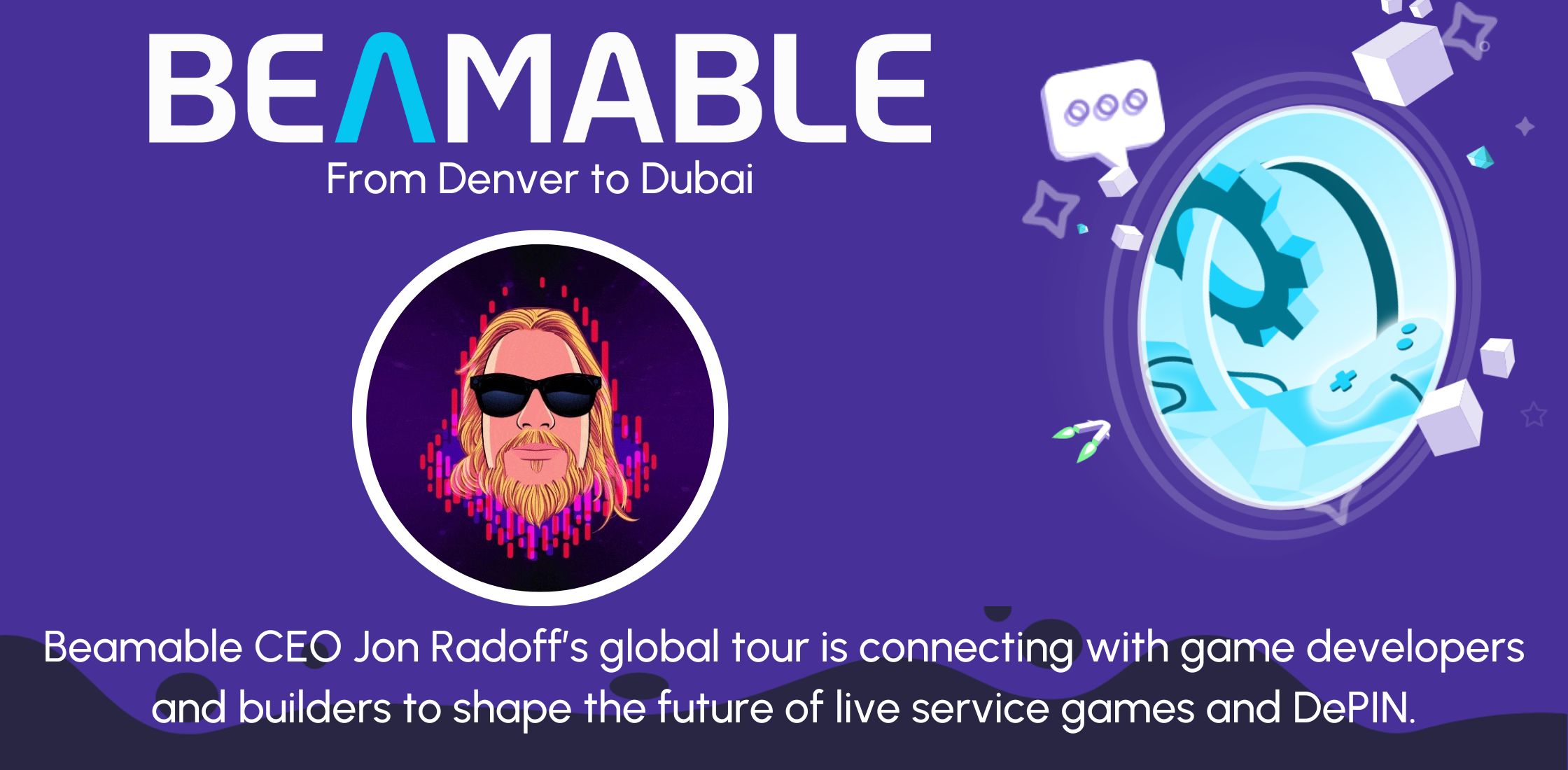
From Denver to Dubai: Why Jon Radoff’s Global Tour Matters to the Future of Beamable
Over the past few months, Beamable CEO Jon Radoff has been racking up the miles—touching down everywhere from San Francisco and Denver to Toronto and Dubai. His schedule? Packed. His mission? Laser-focused.
At first glance, it might look like your typical founder hustle: panels, pitch decks, and partnership meetings. But Jon’s travels are about more than just expanding Beamable’s footprint. They’re about planting a flag at the intersection of two major forces reshaping gaming: live service infrastructure and decentralized physical infrastructure networks (DePIN).
Here’s why that matters for you – and for the future of games.
1. Listening to the Builders
Whether he’s speaking at ETHDenver, hosting a DePIN-focused X Space, or meeting one-on-one with game developers, Jon’s goal is the same: listen first.
Game studios today are balancing more complexity than ever – scaling live ops, monetizing across platforms, building with smaller teams, and now exploring decentralized models for ownership and infrastructure. By sitting down with founders, studios, KOLs, and investors across the globe, Jon is bringing those insights home to Beamable.
And they’re directly shaping our roadmap.
2. Beamable.Network Is a Bold Expansion – But Beamable Is Still the Core
Let’s be clear: Beamable.Network is an ambitious new layer in our vision. It brings the principles of DePIN—ownership, decentralization, and tokenized incentives—into the live game infrastructure space. But it’s built on the foundation that thousands of developers already rely on: Beamable.
Every conversation Jon is having – from Dubai’s DePIN builders to Toronto’s indie scene – reinforces the idea that developers need both:
- A powerful, proven backend for live games
- New models that reward participation and contribution
Beamable is delivering both.
3. We’re Building a Global Ecosystem, Not Just a Product
When your CEO is crossing time zones and spending time with game makers on the ground, it sends a clear signal: Beamable isn’t just building tools. We’re building a movement.
From traditional game studios to onchain-native projects, from AAA publishers to solo indies – Beamable is becoming the connective tissue for a new era of live gaming. One where developers can build faster, launch smarter, and create more value for their players and communities.
What’s Next
We’ll be sharing more of Jon’s insights in the coming weeks – from event recaps to technical deep dives and even video content. But the key takeaway is this:
Beamable is going where the game developers are – geographically and technologically.
If you’re curious about how live game infrastructure is evolving, or if you want to explore how Beamable can support your next project (Web2 or Web3), we’d love to connect.
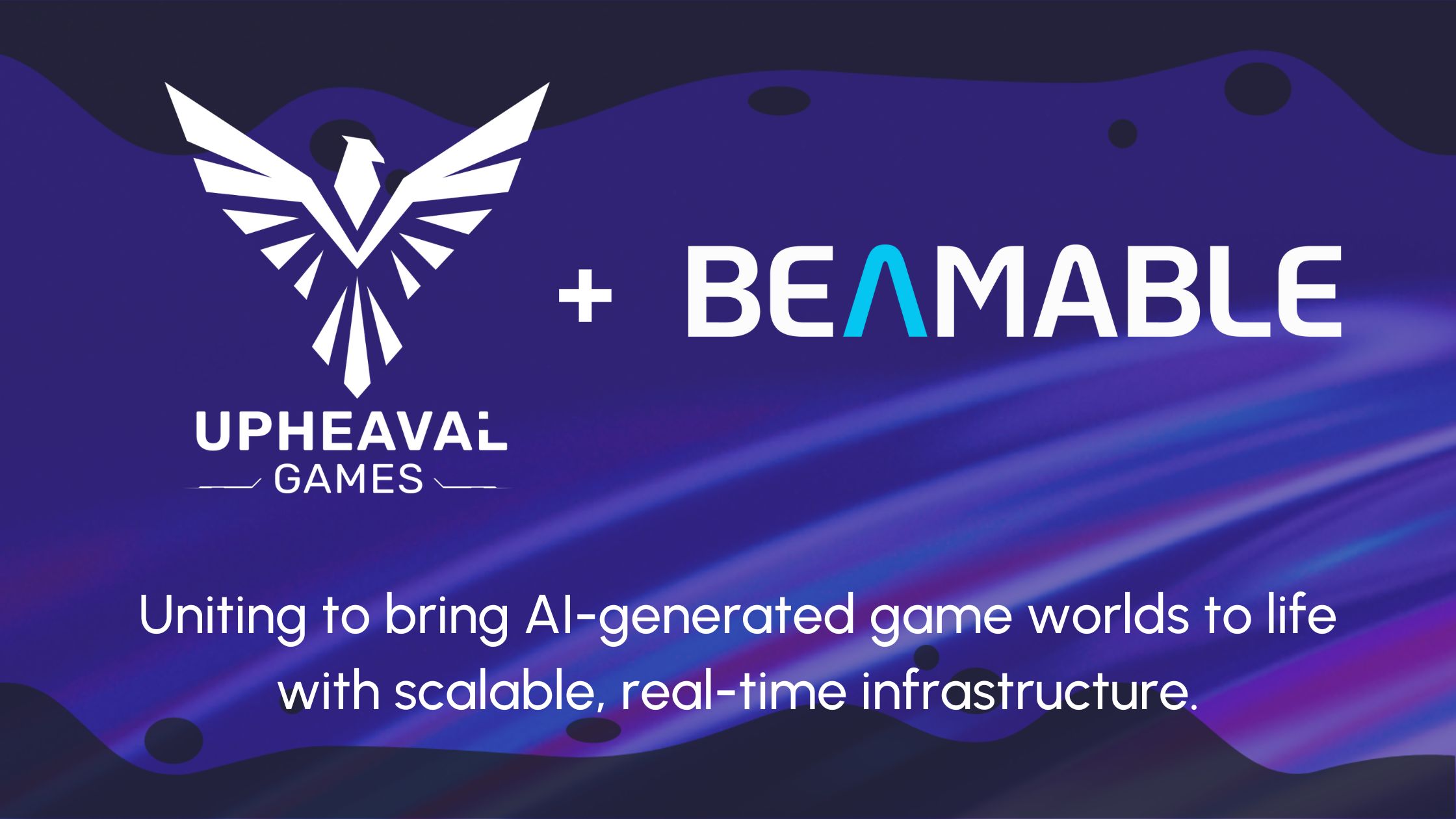
Beamable Partners with Upheaval Games to Shape the AI-Driven Future of Game Development
At Beamable, we’ve always envisioned game development as a thrilling synergy of boundless creativity and robust infrastructure. Today, we’re excited to announce our partnership with Upheaval Games, pioneers behind Dreamer, a revolutionary AI-powered platform that’s reshaping the very fabric of game creation.
Celebrated by Forbes as the herald of the “agentic era” in AI-driven game development, Upheaval’s Dreamer Portal supercharges human imagination with intelligent, agent-driven tools that swiftly conceptualize, refine, and deploy breathtaking content. At the heart of this innovation are Digital Beings – agents endowed with their own memories, desires, and personalities, who evolve and grow alongside players. Through engaging interactions, these agents continually learn, adapting their behaviors and narratives dynamically, making each gaming experience uniquely personal and alive.
So where does Beamable come in?
We’re powering the backend of that same revolution.
As Upheaval reimagines how developers build the frontend of games using generative AI, Beamable provides the live game infrastructure needed to bring those creations to life at scale. Think of it as the perfect fusion of brains and brawn – AI tools that dream big, and a backend that can deliver those dreams to millions of players in real time.
Together, we’re exploring what it means for AI-generated game content to actually work in the context of live service games. That means everything from managing dynamic player data and in-game economies to syncing AI-authored content across game sessions, regions, and updates. We’re building new workflows where AI-created assets and behaviors can be deployed, tested, and iterated on with zero friction – no DevOps required.
Why This Matters
Game development is entering a new era where iteration speed, personalization, and live interactivity are paramount. Upheaval is redefining how games are created. Beamable is redefining how they’re run. And together, we’re unlocking new possibilities that couldn’t exist even five years ago.
“The real promise of AI in games isn’t just about content creation – it’s about connection. When generative tools like Dreamer meet backend systems like Beamable, we unlock the ability to build living, responsive game worlds that adapt to every player in real time,” said Jon Radoff, CEO of Beamable. “This partnership with Upheaval puts us at the forefront of that evolution.”
“Our mission with Dreamer is to remove friction from the creative process and empower developers to focus on storytelling, world-building, and player experience,” said Jeff Goodsill, President of Upheaval Games. “Beamable’s infrastructure complements that mission perfectly – making it possible to take what creators build in Dreamer and deliver it directly into the hands of players with scale, speed, and stability.”
Whether you’re an indie dev, a growing studio, or a AAA team rethinking your content pipeline, the question is no longer if AI will change game development – it’s how fast you can adapt.
With Beamable and Upheaval, we’re making that transition faster, smarter, and more creator-friendly than ever before.
Stay tuned. The future is being built in real time – and you’re invited.
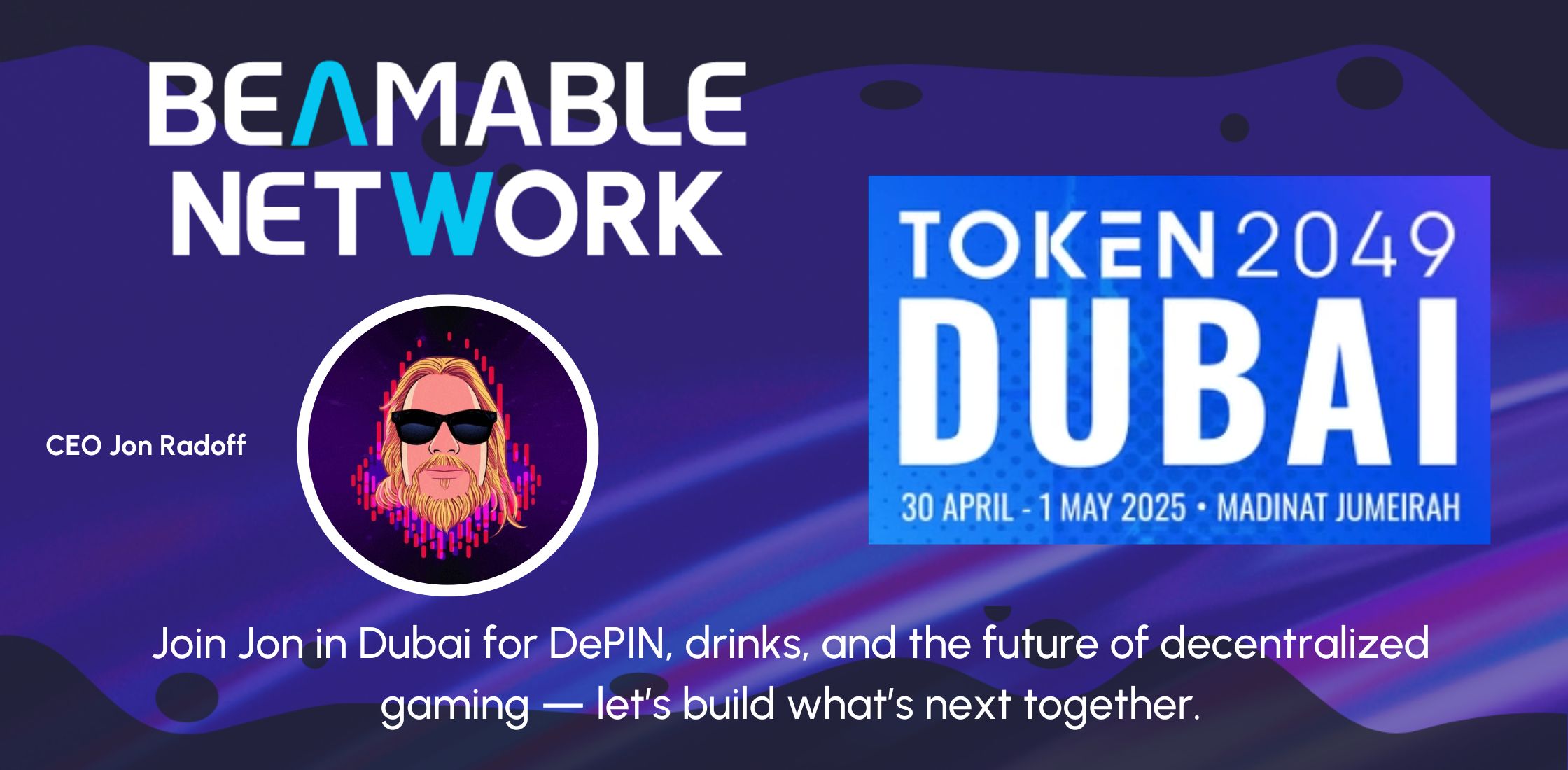
Beamable Heads to Dubai for TOKEN2049: Join Us for DePIN, Gaming & More
We’re heading to Dubai – and bringing the energy.
Beamable CEO Jon Radoff will be on the ground at TOKEN2049 Dubai, one of the world’s premier crypto and Web3 gatherings, and we’re not just attending – we’re activating!
Here’s what we’ve got lined up:
🚀 April 30 – Founders & Investors Brunch (Invite Only)
Beamable is kicking off the week with an intimate gathering of builders, founders, and investors. Over good coffee and better conversations, we’ll dive into what’s next for Web3 games, infrastructure, and the DePIN movement. Want in? Reach out — space is limited. https://lu.ma/token2049_gaming
🗣 May 1 – Jon Radoff Keynote at DePIN Day
Beamable CEO Jon Radoff will take the stage at DePIN Day to deliver a keynote on the intersection of gaming and decentralized infrastructure. From monetization to scalability, Jon will share real-world insights on how Web3-native games are reshaping the industry — and what’s next. If you’re serious about DePIN or gaming, this is a talk you won’t want to miss. https://lu.ma/depin-dubai
🎮 🍸 May 1 – DePIN & Gaming Happy Hour
Later that evening, we’re co-hosting the DePIN & Gaming Happy Hour, bringing together top builders, publishers, investors, and tech innovators at the heart of Dubai’s web3 scene. It’s a chance to unwind, connect, and celebrate what we’re building together. Drinks are on us! https://lu.ma/cby75s2d
Why It Matters Beamable.Network is all about enabling game studios to thrive in a decentralized future. From on-chain economies to scalable infrastructure built on Solana and beyond, we’re empowering developers to launch and grow games without reinventing the backend.
TOKEN2049 Dubai is the perfect place to show what’s possible – and we’re excited to connect with those who are building the future alongside us.
Want to meet with Jon or the Beamable team in Dubai? Shoot us a note or find us at one of the events above. Let’s build something great – together!
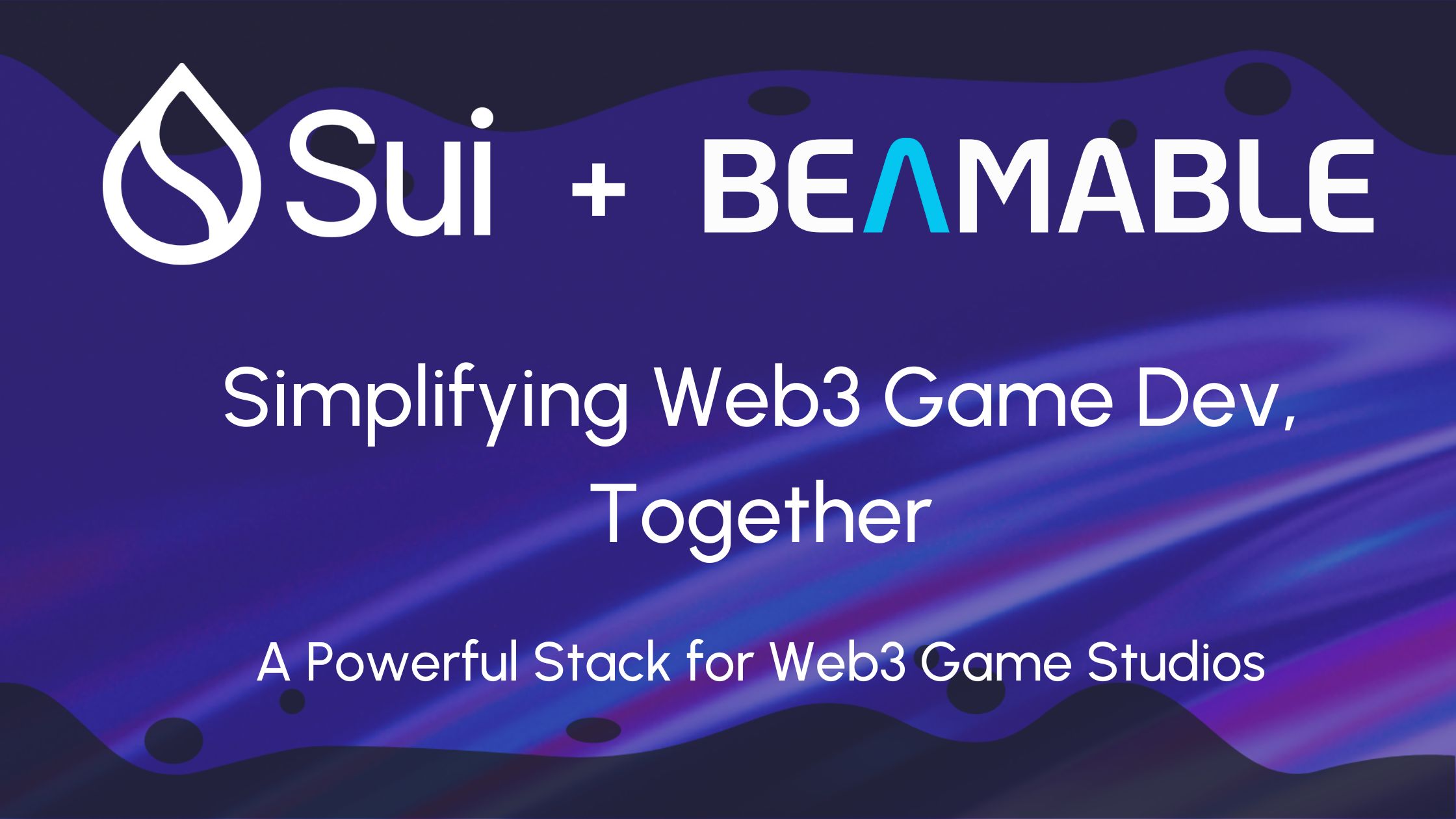
Sui is Simplifying Web3 Game Development – Here’s Why That Matters to Beamable (and to You)
At Beamable, we’re all about making life easier for game developers – especially those building ambitious, scalable, and player-driven games. So when we saw Sui’s recent post on how they’re simplifying Web3 game development, we appreciated it. A lot. And we wanted to share why this update matters from our perspective.
Because let’s be real: for Web3 games to thrive, developers need more than just a chain – they need a stack.
Sui is delivering a huge piece of that with tooling that empowers developers to bring blockchain-backed game systems to life – without needing to become full-time infrastructure engineers. And at Beamable, we’re excited to help fill in the rest of the stack.
Sui’s Tools + Beamable.Network = A New Era of Game Development
Sui’s new dev tools are packed with features that make it easier to build persistent, interactive worlds:
- Unity SDKs for faster integration into existing pipelines
- Visual scripting tools that lower the barrier for complex logic
- Object-based architecture for dynamic, upgradeable game assets
- Asset ownership and transfer tools baked into the core of the engine
Pair that with Beamable.Network – our decentralized backend infrastructure for live games – and you’ve got a powerful combo. Developers can offload live ops, commerce systems, identity management, and cross-platform support to Beamable while using Sui to power the on-chain side of gameplay and asset ownership.
Together, we’re making it possible to ship faster, operate more efficiently, and give players more control over their experiences.
We’re Building the Tools So You Can Build the Future
At Beamable, we’ve always believed that developers should spend their time creating great games – and we can handle the backend and blockchain complexities. That’s why we’re proud to partner with ecosystems like Sui that are lowering the barriers to entry and helping make Web3 game development… feel like game development.
Whether you’re an indie just getting started or a studio looking to scale, now’s the time to explore how Beamable and Sui can power your next game.
🚀 Ready to build?
Start exploring Beamable.Network or book a call with our team to see how we can help you get to market faster.
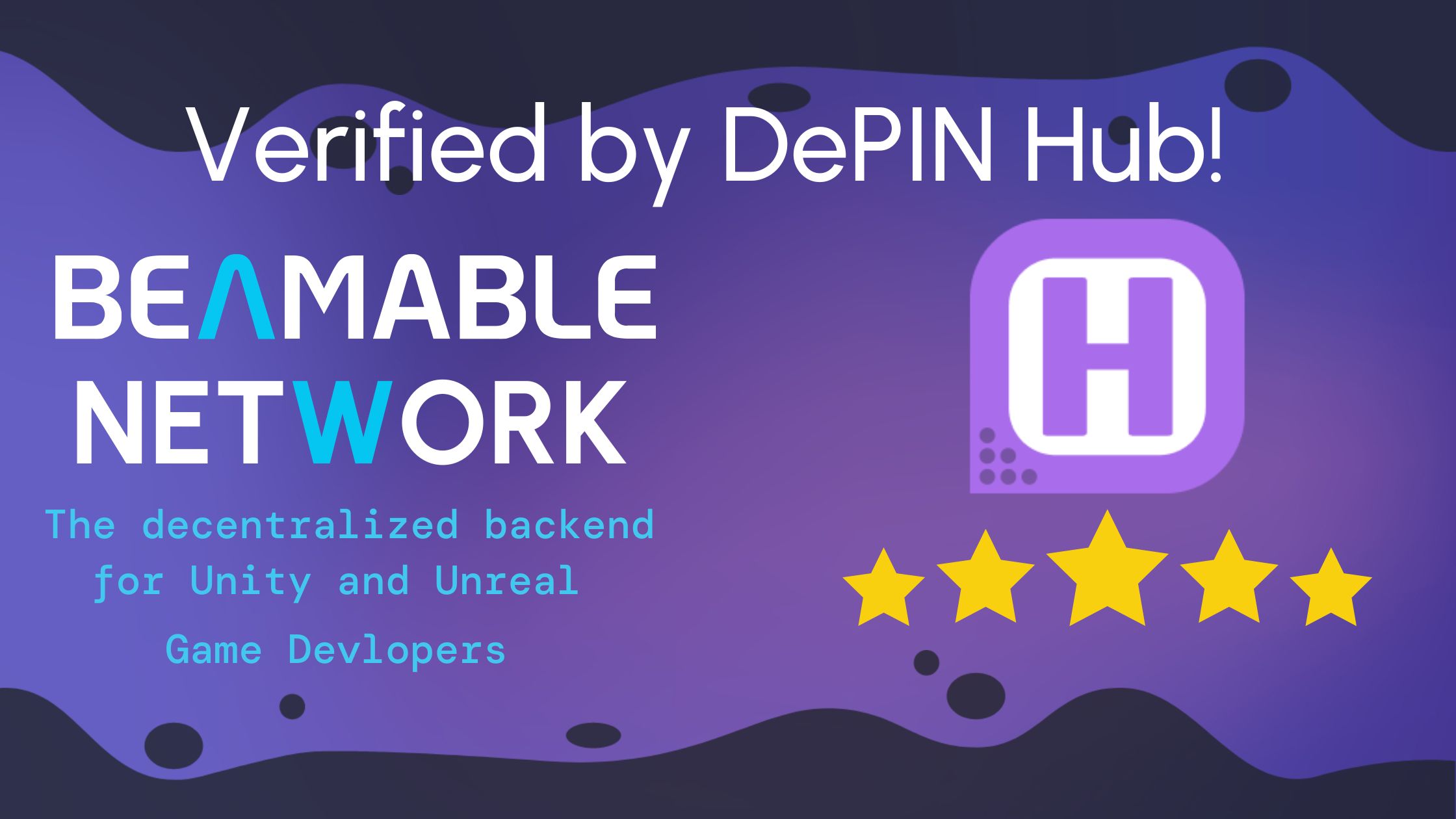
Beamable Verified by DePIN Hub: What It Means for Game Developers
We’re proud to announce Beamable.Network – the decentralized infrastructure initiative from Beamable – has been officially verified by DePIN Hub, scoring 86 out of 100 in their independent evaluation.
While Beamable.Network is a new project, the company behind it – Beamable – has been empowering game developers for years. From backend-as-a-service tools to live operations support, we’ve always believed that developers should be able to focus on making great games without getting buried in infrastructure work.
This verification validates our next step: building a decentralized future that gives you more control, more composability, and fewer compromises.
🧩 Why This Matters for Developers
Whether you’re using Beamable’s live game services today or exploring the Beamable.Network for the first time, our mission is the same – to help developers:
- Ship faster
- Operate more efficiently
- Own their game infrastructure without managing it
Beamable.Network is bringing that vision into the decentralized space — giving studios access to a composable, lower-cost, decentralized backend that integrates seamlessly into Unity or Unreal Engine projects.
⚙️ Key Takeaways from the Verification Report
DePIN Hub’s rigorous evaluation process focused on real-world impact, technical design, and ecosystem potential. Here’s what stood out for developers:
- ✅ Built for Unity and Unreal
Beamable.Network integrates with the tools you already use – no custom engine rewrites are required. - 🧩 Modular Architecture
Pick the features you need: matchmaking, leaderboards, in-game economy, social systems – or build your own modules on top of the network. It’s like LEGO for backend services. - 💸 Backend Costs Slashed by Up to 50%
Beamable.Networks replace centralized hyperscalers like AWS or Azure with a decentralized infrastructure model, which means less vendor lock-in and significantly reduced spending. - ⏱ Speed Without Compromise
Launch new games or scale existing ones with reusable backend components that don’t require rebuilding every time. Our SDK and platform are designed for fast iteration. - 🌍 Decentralized and Reliable
Beamable.Network uses enterprise-grade infrastructure partners like i3D and Gcore to ensure low latency and global coverage – with decentralization expanding over time.
🧠 The Beamable Ecosystem: Centralized Simplicity Meets Decentralized Power
Let’s take a second to clarify what lives where:
- Beamable (the platform) is a mature, developer-friendly backend-as-a-service solution used by 86+ live games. It provides centralized tools and services that help you build, monetize, and scale live games quickly.
- Beamable.Network is our decentralized extension – a composable infrastructure protocol that enables developers to deploy backend services across a distributed network, with support for blockchain assets, modular architecture, and on-chain transparency.
The beauty is, you don’t have to choose. You can start with Beamable and scale with Beamable.Network, or build on both, depending on your needs.
🧱 Built by Game Developers, for Game Developers
Beamable has always been about reducing friction between vision and execution. With Beamable.Network, we’re going even further – creating a future where you can build freely, without fear of vendor lock-in, surprise service shutdowns, or skyrocketing cloud bills.
The DePIN Hub verification is an important milestone, but for us, it’s just another step in supporting game creators.
🚀 Get Started
Whether you’re an indie dev or an AAA studio, Beamable and Beamable.Network can help you build faster, operate smarter, and take full control of your game infrastructure.
👉 Explore Beamable.Network
👉 Start building with Beamable today: https://beamable.com/
Let’s redefine what’s possible – together.
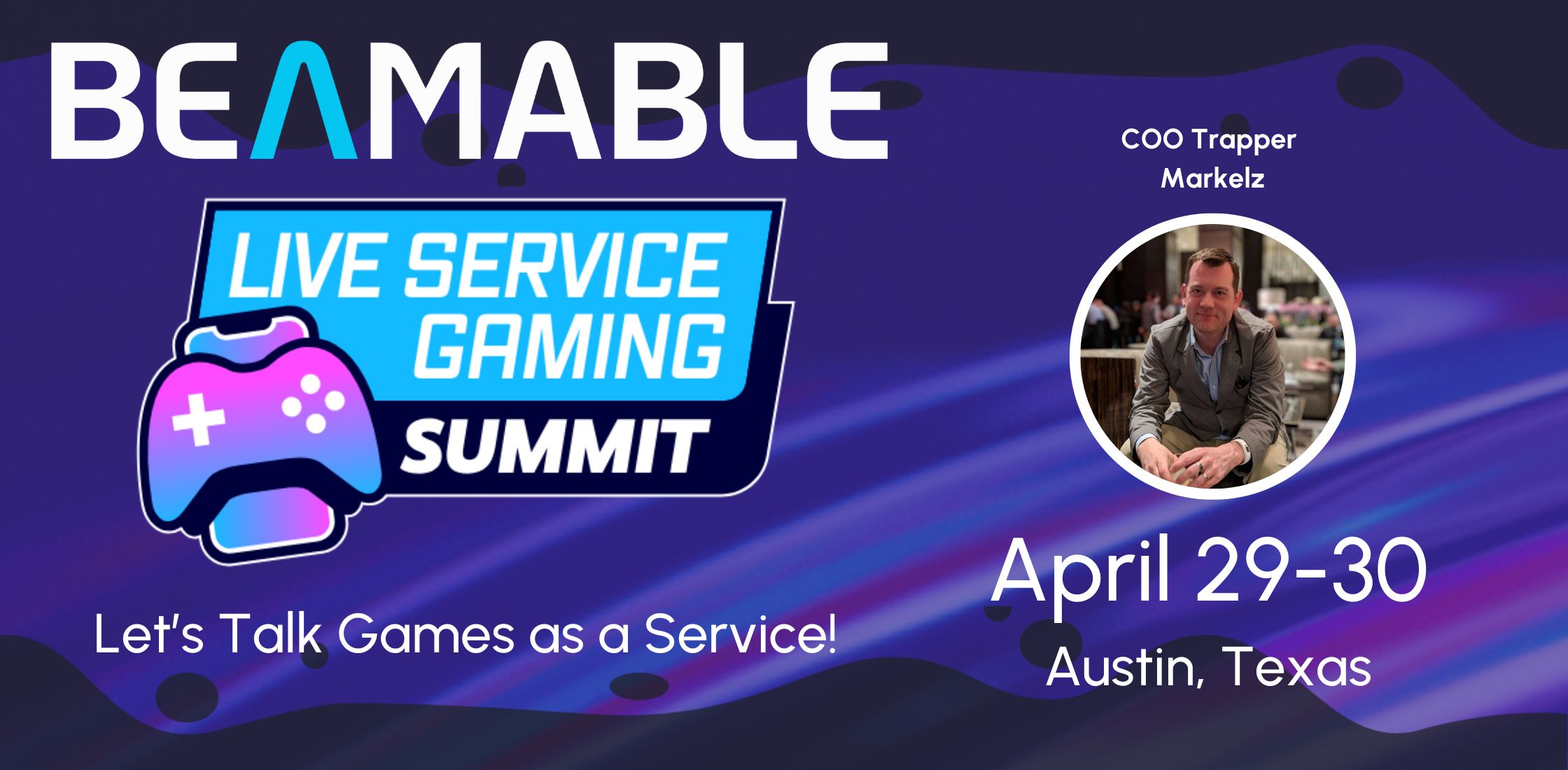
Meet Beamable at the Live Service Gaming Summit
We’re heading to Austin! Beamable is excited to be part of the Live Service Gaming Summit North America, taking place April 29–30 at the Austin Marriott South – and we’re bringing some serious firepower.
Our Co-Founder & COO Trapper Markelz will represent Beamable at Booth 4 for the duration of the summit. He’ll be boots on the ground, taking meetings, hosting meet-and-greets, and diving deep into conversations about the future of live service games.
If you’re building – or thinking about building – a live game, swing by Booth 4 to talk shop with Trapper and learn how Beamable helps studios reduce backend complexity and get to market faster.
🎤 Don’t Miss Trapper’s Panel
Trapper will also be speaking on one of the summit’s must-attend panels:
🗓️ Panel: Evaluating the Game Technology Landscape to Deliver Live Games at Scale
🕚 Time: April 29, 11:05 AM – 11:35 AM
📍 Location: Stream A – Scalable Game Infrastructure
Panelists:
- Luis Villegas, Head of Technology – PlayStation Studios
- Doug Mellencamp, Studio Director – Bethesda Studios Montreal
- Sean Tracy, Senior Director, Tools & Tech Content – Cloud Imperium Games
- Trapper Markelz, Co-Founder & COO – Beamable
Topics include:
- Building and scaling backend platforms for live games
- Managing player surges and maintaining gameplay stability
- Leveraging cloud and server architecture for modern multiplayer experiences
✅ Book Time with Trapper
Want to set up a one-on-one meeting or demo? Trapper’s schedule is filling up fast – reach out now to reserve a time slot at Booth 4:
📍 Location: Booth 4, Live Service Gaming Summit
📅 Dates: April 29–30
📬 Contact Trapper to schedule a meeting
Let’s Build What’s Next in Live Games
From backend tech to live ops best practices, Beamable is here to help game studios unlock scalable success. Whether you’re AAA or indie, stop by Booth 4 to see how we can help power your next live game.
We’ll see you in Austin!
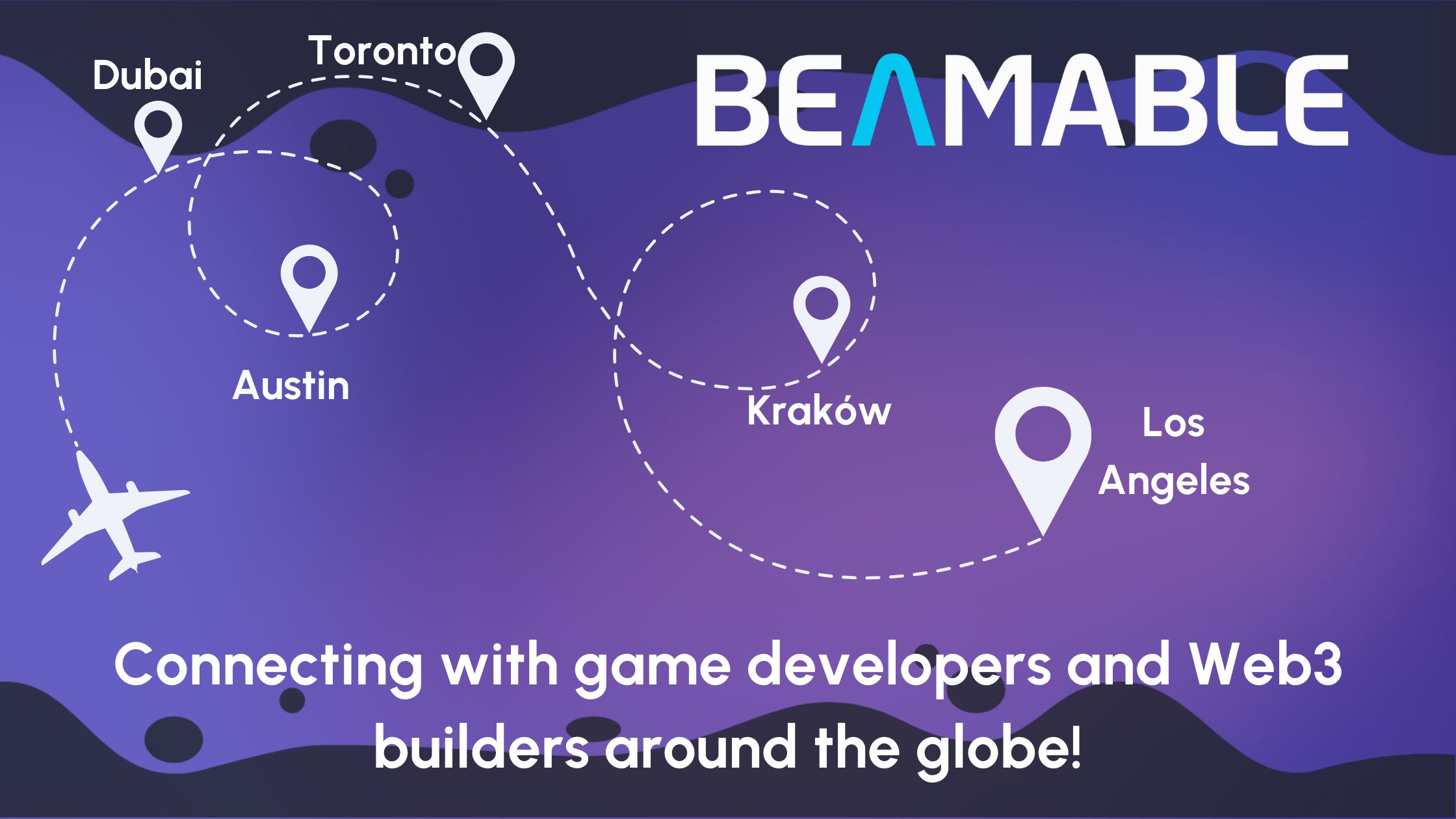
Beamable Is Hitting the Road: Spring 2025 Tour Across Web3 and Games
April and May are shaping up to be an exciting whirlwind for Beamable as we crisscross the globe, connecting with developers, innovators, and builders across Web3 and the broader games industry. Whether it’s the future of decentralized infrastructure or the evolution of live game services, we’re on a mission to showcase how Beamable and the Beamable Network are unlocking new possibilities for game creators everywhere.
Web3 World Tour: Dubai, Lugano & Toronto
Our intrepid CEO, Jon Radoff, will kick things off at TOKEN2049 Dubai, one of the leading global gatherings for Web3. Jon will be meeting with leaders across DePIN (Decentralized Physical Infrastructure Networks), decentralized compute, storage, bandwidth providers, gaming protocols, and crypto-native developers. These are exactly the types of builders that Beamable Network is designed to support – and we’re looking forward to connecting directly with them on how we’re creating the backbone for scalable, decentralized games.
While in Dubai, we’ll also be hosting side events and community meetups, just like the ones we ran during GDC – bringing together developers, investors, and creators for meaningful conversations about what’s next.
From there, Jon heads to Decentralized Lugano, where he’ll speak on the growing convergence between blockchain infrastructure and the game development ecosystem. After that, it’s on to Consensus Toronto, where Beamable will be diving deeper into how Web3-native infrastructure can power persistent worlds, dynamic economies, and player-owned ecosystems.
Leveling Up Live Game Services
Back in North America, COO Trapper Markelz will represent Beamable at the Live Service Gaming Summit North America. As an on-stage speaker, Trapper will share lessons from working with studios across the spectrum – on how they can reduce backend complexity, accelerate time to live, and operate sustainable live games without massive engineering teams.
We’ll also be making stops at Digital Dragons in Kraków, Nordic Game in Malmö, and GamesBeat Summit in Los Angeles. These events are vital for us because they put us face-to-face with the developers and studios building the next generation of games – whether they’re launching multiplayer hits, creating Web3-native experiences, or just exploring how to build better games, faster.
Why This Matters
Being at all of these events is about more than just visibility – it’s about being present with the communities we serve. We’re showing up to listen, collaborate, and co-create with the developers shaping the future of games.
Whether you’re scaling a live game, experimenting with Web3 mechanics, or building the next breakout hit – we want to meet you, share what we’re working on, and learn about your vision for the future.
See you on the road!

Beamable @ GDC 2025: Recap & Highlights from a Game-Changing Week
What a week! GDC 2025 was one for the books, and Beamable showed up in full force to meet the moment. From thought-provoking panels and exclusive summits to high-energy networking events, our team was everywhere – and we’re still buzzing from the incredible conversations we had with developers, investors, and Web3 trailblazers from around the world.
Here’s a look back at everything Beamable brought to the table at GDC 2025:
Lifting Off with Leaders & Visionaries
We kicked things off with an invite-only brunch that brought together the sharpest minds in the space – from A16z, Binance, Meta, and Coinbase to Polygon, Sequoia, Animoca, and Bitkraft. This wasn’t just about eggs and mimosas (though they were delicious!) – it was about big ideas and bold bets on the future of decentralized gaming.
The atmosphere was electric as founders and funders traded insights on where the industry is heading and how infrastructure like Beamable can empower next-gen games to scale and succeed.
From the Stage to the WolvesDen
🎤 Beamable x Solana Developer Summit
Beamable CEO Jon Radoff and CTO Ali El Rhermoul lit up the stage with their session, “De-risking Live Ops with a Decentralized Backend.” The room was packed as they walked developers through how decentralized infrastructure can streamline live game operations, reduce backend risk, and unlock new levels of cost efficiency and scalability.
The message resonated loud and clear: Web3-native infrastructure isn’t just the future – it’s the smart way to build today.
🔥 Sui Gaming Summit
Beamable COO Trapper Markelz was on site diving into real-time demos and strategic conversations. He shared how Beamable is helping developers explore scalable Web3 monetization and economy design – putting power back in the hands of creators and communities.
🐺 Alpha Night @ WolvesDen
We wrapped up Day 2 with high-impact networking at WolvesDen, hosted by WolvesDAO and Gamified. The night was filled with top-tier builders, ambassadors, and investors – all laser-focused on the next phase of decentralized gaming. The conversations were candid, the connections real, and the energy unstoppable.
🍻 Beamable Happy Hour – A Massive Hit
We said it would be fun – and we delivered. Beamable’s happy hour was absolutely packed, bringing together an incredible mix of developers, founders, and future collaborators over drinks and good vibes. We talked Web3, game dev, backend tools, and everything in between.
The space was buzzing with energy, and it quickly became one of the go-to networking events of the night. Big thanks to everyone who came out, raised a glass, and joined the conversation on the future of decentralized gaming. We’re already thinking about how to top it next year!
🤝 Wall-to-Wall Meetings with Game Makers Building the Future
All week, our calendars were full – and we wouldn’t have it any other way. Beamable met with dozens of studios, developers, and publishers across both Web2 and Web3, each with bold visions and real technical challenges.
Whether it was a mobile studio rethinking live ops, a blockchain-native team launching an NFT-driven MMO, or a AAA publisher exploring decentralized economy tools, the common thread was clear: the industry is hungry for infrastructure that’s flexible, scalable, and built for the next generation of games.
These meetings weren’t just intros – they were real discussions about integration, monetization, backend solutions, and partnership opportunities. And with Beamable Network at the center, we’re excited to help turn these conversations into launches.
✨ Why GDC 2025 Mattered
This year’s GDC wasn’t just about showing up – it was about showing what’s possible. Beamable came into the week with one goal: to help game developers harness the power of decentralized infrastructure and next-gen monetization. Whether you’re building an indie multiplayer title or launching the next big Web3 game, Beamable Network is built to help you scale, thrive, and innovate.
We’re grateful for every conversation, every handshake, and every spark of collaboration. Huge thanks to all the teams, partners, and developers who joined us throughout the week.
🚀 Let’s Keep Building!
GDC 2025 might be over, but the momentum is just getting started. If you missed us at the show or want to continue the conversation, we’re here for it. Let’s talk game infrastructure, decentralized live ops, or how we can partner to launch your next title.
Until next time, GDC! Let’s build the future of games – together. 🎮🔥
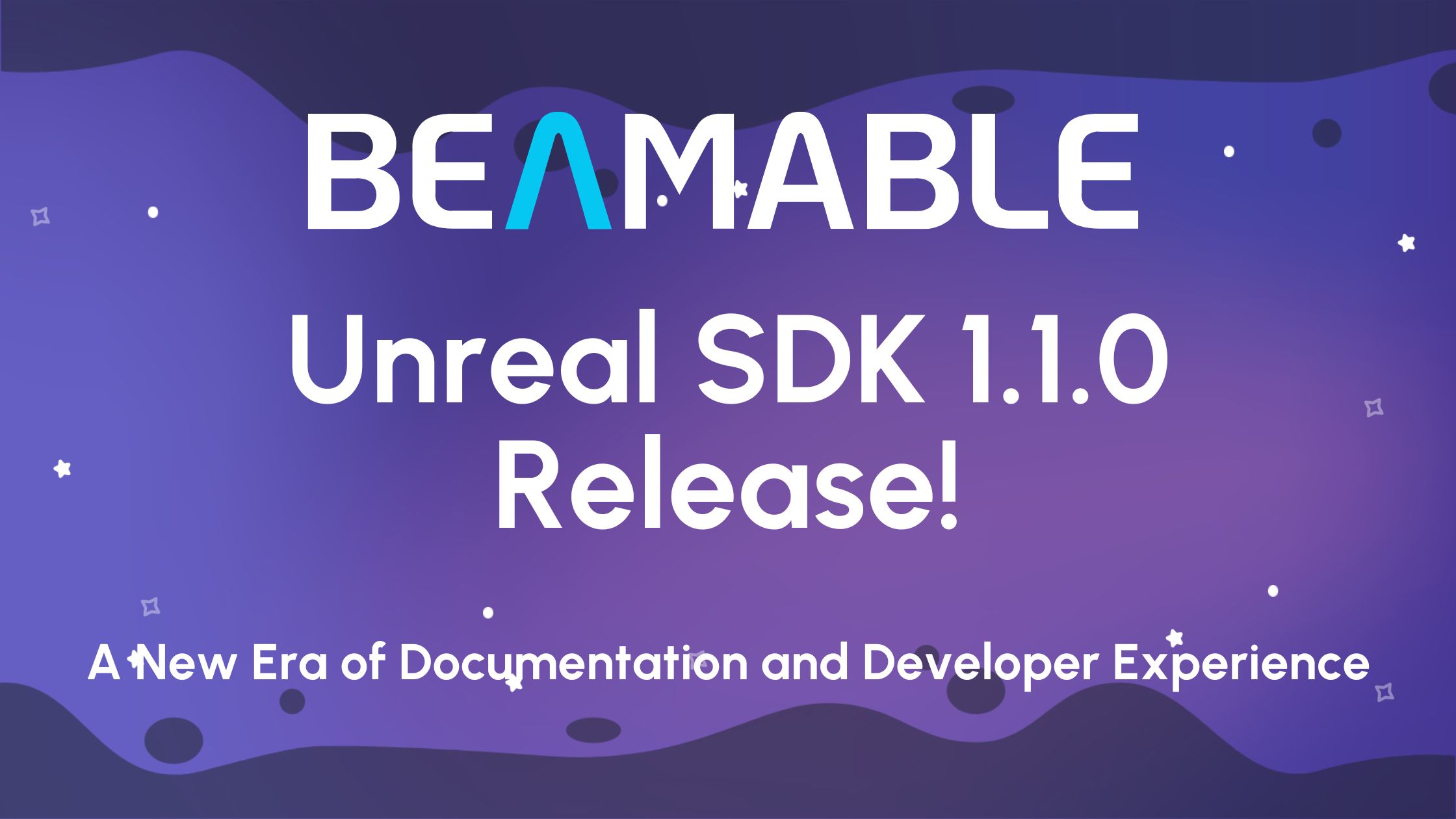
Beamable Unreal SDK 1.1.0 Release: A New Era of Documentation and Developer Experience
We just hit an exciting milestone with the release of Beamable Unreal SDK 1.1.0, bringing not only new capabilities but also a major revamp of our documentation. This update is more than just a version bump – it represents a fundamental shift in how we support developers, streamline workflows, and provide comprehensive guidance for integrating Beamable into Unreal Engine projects.
What’s New in Unreal SDK 1.1.0?
Alongside this release, we’ve implemented a completely overhauled documentation system that lays the groundwork for even more improvements in the future. This update enhances discoverability, usability, and clarity for developers looking to leverage Beamable’s powerful features in their games.
Key Highlights:
- New Documentation Theme – We’ve introduced an MkDocs-powered theme with light and dark mode support, providing a cleaner and more accessible reading experience.
- Reworked Navigation – The documentation now features a sidebar navigation system instead of a top bar, making it easier to find relevant sections and explore content more intuitively.
- “What’s New” Section – A dedicated space to highlight the most important changes in each version, including migration notes to help developers smoothly transition between updates.
- Expanded and Refined Content – We’ve added new pages covering key Managed Services like Matchmaking and Lobbies, ensuring that all documentation is up to date and feature-complete.
- Improved LiveOps Sample – The LiveOps sample UI and UX have been redesigned from the ground up, offering a more intuitive experience for developers experimenting with Beamable’s LiveOps capabilities.
Even More Developer Experience Improvements
Beyond documentation, Unreal SDK 1.1.0 includes meaningful updates on the feature side, specifically targeting in-editor usability and behind-the-scenes runtime performance:
- Beamable Window UX Improvements & Bugfixes – We’ve refined the Beamable editor windows for a smoother, more intuitive experience, with cleaner layouts and reduced friction in daily workflows.
- Content Window UX Improvements & Bugfixes – The Beamable Content Window also received usability upgrades that make managing and interacting with game content easier than ever.
- Improved Runtime Connectivity Handling – Engineers will appreciate smarter handling of network connection states at runtime. These enhancements help your game behave more reliably across a range of connectivity conditions, whether during development or live gameplay. Read more in our technical docs (insert actual link).
Why This Matters for Developers
Clear, well-structured documentation paired with smart usability improvements is a game-changer for any SDK. With Unreal SDK 1.1.0, we’re making it easier than ever for developers to integrate Beamable into their Unreal projects—whether you’re just starting out or optimizing a complex, live game.
This new documentation workflow and expanded feature set will serve as the foundation for future improvements across all SDKs, ensuring consistent, high-quality resources and tools for the Beamable community.
Explore the New Docs
Check out the updated Unreal SDK documentation here and let us know what you think! We’re always looking for feedback to make our tools even better for developers.
🚀 Try it out, explore the new features, and build amazing experiences with Beamable!
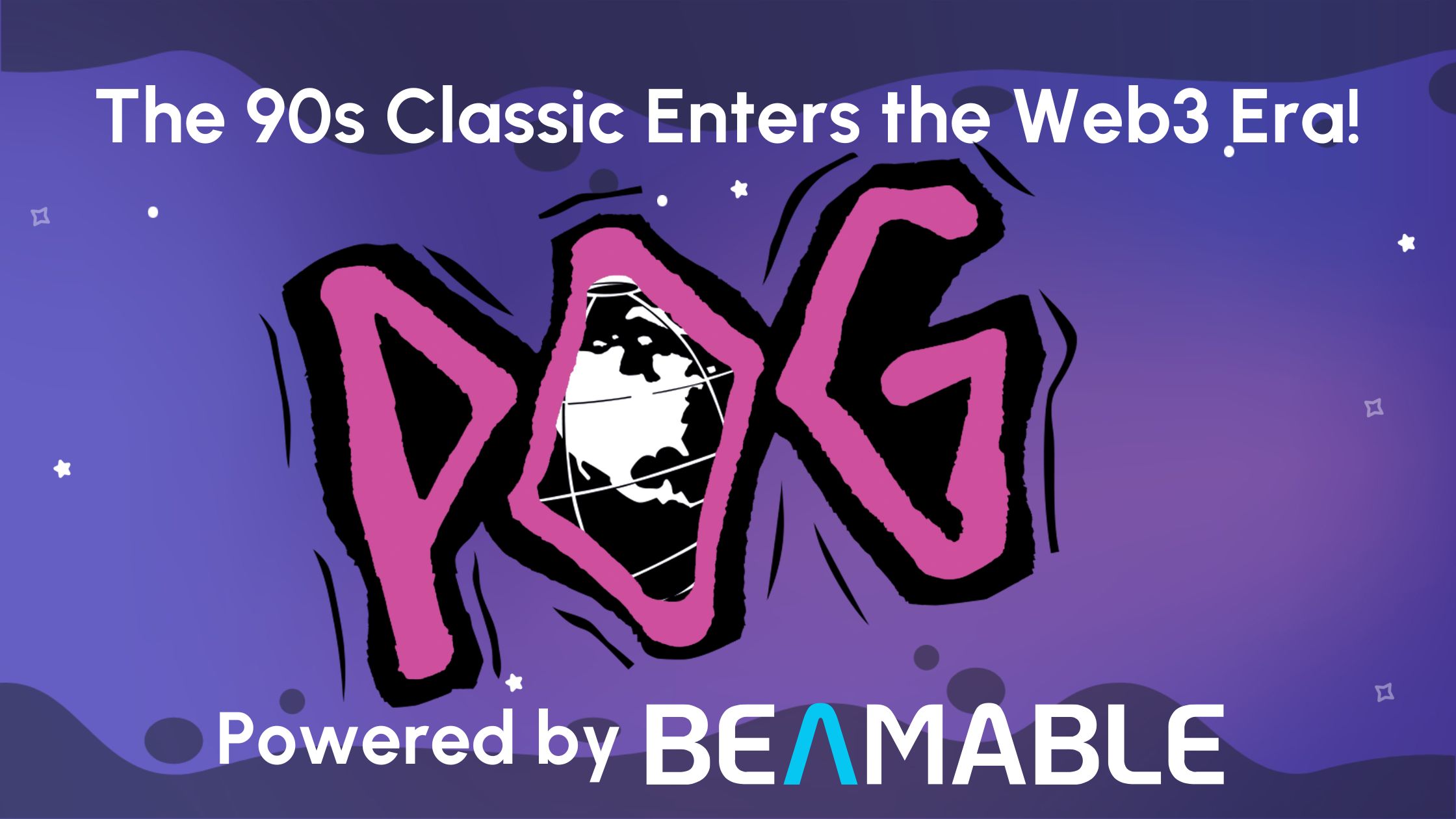
POG Battle: The 90s Classic Enters the Web3 Era with Beamable
The iconic game of POGs is back – bigger, better, and fully on-chain. Beamable and POG have teamed up to launch POG Battle, a Web3-powered revival of the classic 90s sensation that lets players relive their childhood memories with a blockchain twist. And the best part? Players can claim a free limited-edition GDC Beamable POG to use in the game right now.
POG Battle: Where Nostalgia Meets Innovation
Revealed at GDC 2025, POG Battle is already making waves in the Web3 gaming space. Since its beta launch, the game has seen explosive growth, with over 250,000 games played and $1.2 billion worth of POGs used in battles. This isn’t just a retro comeback—it’s a glimpse into the future of digital gaming, powered by Beamable’s cutting-edge technology.
POGs first took the world by storm in the 90s, becoming a schoolyard obsession where players collected and battled with cardboard discs and slammers. Now, POG Battle brings the excitement to the blockchain, allowing players to own, trade, and compete with digital POGs like never before.
How Beamable Powers the POG Revolution
Beamable’s robust Web3 technology is the backbone of POG Battle, providing:
✅ Seamless, real-time gameplay – No lag, no interruptions, just classic POG battles reimagined for the digital era.
✅ True digital ownership – Players can collect and trade their digital POGs, ensuring they truly own their in-game assets.
✅ Frictionless Web3 integration – No complicated wallets or onboarding; just jump in and start playing.
POG Battle is also integrated into Beamable’s Quest platform, unlocking even more ways for players to engage, earn, and compete. By signing up, players can claim a free limited-edition GDC Beamable POG and use it immediately in-game. Plus, daily rewards inside the POG Hub keep the action going.
🔗 Claim your free GDC Beamable POG now: hub.pogdigital.com
🔗 Sign up on the POG Launchpad: launchpad.pogdigital.com
The Future of POG Battle: What’s Next?
To keep the POG economy sustainable, Beamable and POG are optimizing in-game mechanics, including a POG burn event to balance the economy ahead of the full arcade launch. But that’s just the beginning. Looking ahead, the roadmap includes:
🎟️ Seasonal tournaments – Competitive play with exclusive rewards.
🎮 Expanded in-game content – More collectibles, new mechanics, and fresh ways to play.
🔗 Deeper blockchain integrations – A continuously evolving Web3 experience.
Ready to… Battle!?
The nostalgia is real, and the future is here. POG Battle isn’t just a game—it’s a community, an economy, and a new way to play. Whether you were flipping POGs on the playground back in the day or discovering them for the first time, now is the time to join the revolution.
🚀 Jump into POG Battle today and claim your free GDC Beamable POG!
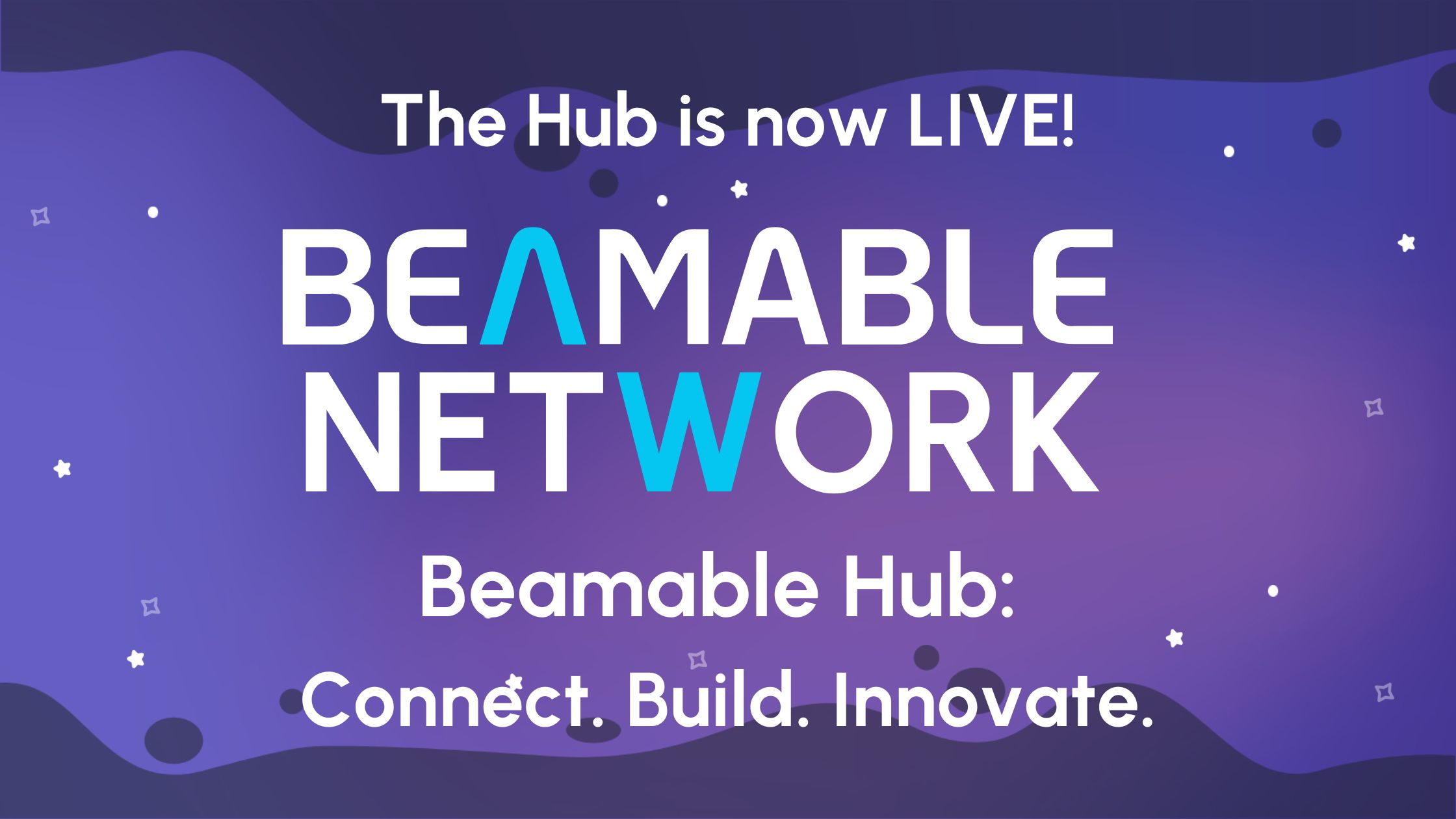
Welcome to the Beamable Hub: Your Community Gateway to the Future of DePIN Gaming
The Beamable Network is growing, and with it comes a new way to connect, learn, and build together! We’re thrilled to introduce Beamable Hub – our new gamified community hub designed to bring developers, node operators, and Web3 enthusiasts together to shape the future of decentralized game infrastructure.
Why We Built Beamable Hub
Decentralized Physical Infrastructure Networks (DePIN) are revolutionizing industries by replacing centralized services with community-driven, decentralized infrastructure. Beamable Network is leading this shift in gaming, and we recognize the importance of fostering a strong, engaged community that collaborates, innovates, and grows together.
But this isn’t just another forum or Discord server. Beamable Hub is built with gamification at its core, transforming passive participation into an interactive, rewarding experience.
Gamification Powers Engagement & Growth
We’re redefining what it means to be part of a community by integrating game-like mechanics that enhance engagement and cooperation:
🎯 Missions & Challenges – Complete tasks, quests, and challenges to earn points, badges, and digital rewards.
🏆 Leaderboards & Achievements – Track your progress, climb the ranks, and compete with fellow community members.
🔗 Referral & Growth Incentives – Invite friends, grow the network, and get rewarded for building the Beamable community.
🎟️ NFT & Digital Collectibles – Earn exclusive NFTs as rewards, event passes, or membership perks.
💬 Discussion Boards & Threads – Forums and social features help superfans interact beyond just passive content consumption.
🤝 Discord & Web Integrations – Seamlessly sync with Discord, Telegram, and social media to stay engaged.
📱 Mobile-Friendly Access – Stay active and connected on the go with a frictionless user experience.
🔔 Email & Notification Systems – Keep up with updates, reminders, and personalized content.
Why Gamified Communities are the Future
Traditional online communities often rely on organic discussions, but gamified communities incentivize engagement, foster deeper loyalty, and create interactive experiences rather than just passive participation.
By incorporating rewards, challenges, and leaderboards, Beamable Hub turns members into active contributors rather than just spectators. Web3 mechanisms like NFTs and tokens add a layer of ownership and exclusivity, making engagement more purposeful and rewarding. In an era of short attention spans, this approach boosts retention and strengthens community bonds.
Beamable’s DePIN Project is on the cutting edge of this movement, and Beamable Hub is your portal to the future of gamified, decentralized gaming.
Join the Beamable Hub Today!
The future of DePIN in gaming is community-driven, and we want you to be part of it. Earn rewards, engage in challenges, and help shape the next generation of decentralized gaming.
💡 Get started today at hub.beamable.network
Let’s build the future – together. 🚀
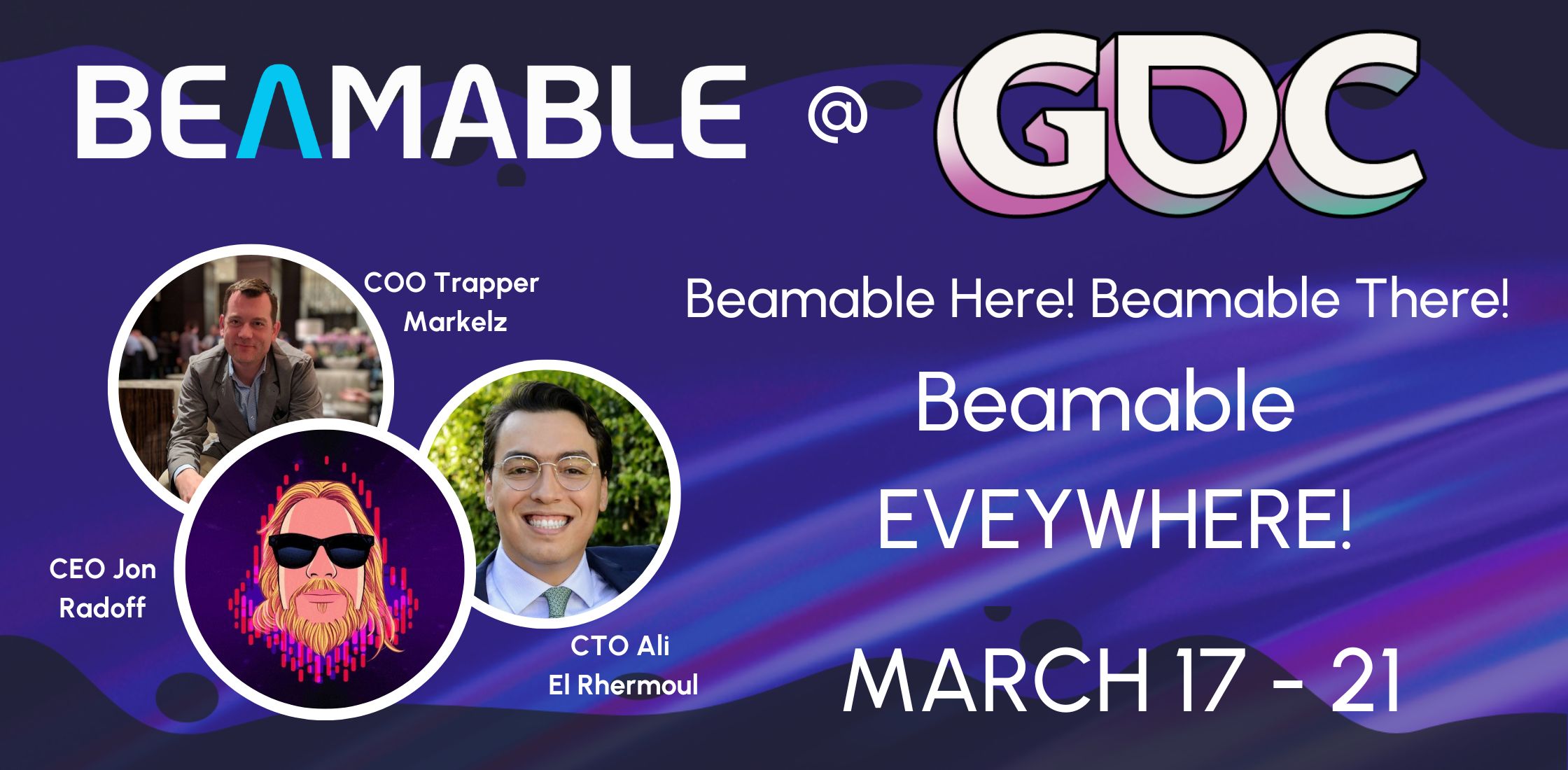
Beamable Goes All In at GDC 2025 – Meet Us There!
GDC 2025 is just around the corner, and Beamable is going all in! Next week, San Francisco will be buzzing with game developers, investors, and industry leaders, and we are bringing our full force to the event. Whether you are an indie developer, a AAA studio, or a Web3 pioneer, we have an action-packed lineup designed to help you build, scale, and monetize your next great game.
Where to Find Us at GDC 2025
We are not just attending GDC – we are everywhere next week! From exclusive networking events to hands-on discussions about the future of game development, here is where you can connect with Beamable throughout the week:
🚀 GDC Founders & Investors Brunch – Gaming Edition
📅 Monday, March 17 | 🕚 11:00 AM – 2:00 PM | 📍 Mellow Mercado, 330 Pine Street
An exclusive brunch bringing together game studio founders, investors, and industry leaders for a high-level discussion on the future of game development, funding, and technology.
📩 Sign up now: https://lu.ma/fractl_gdc
🎮 Solana Developer Summit
📅 Tuesday, March 18 | 🕘 9:00 AM – 6:00 PM
A full day of Solana-focused game development insights, technical sessions, and networking with the top minds in Web3 gaming.
🎤 Featured Beamable Session:
📅 Tuesday, March 18 | 🕝 2:20 PM (PST) | 📍 Moscone Center, Room 3022, West Hall
🗣 Speakers: Beamable CEO Jon Radoff & CTO Ali El Rhermoul
De-risking Live Ops with a Decentralized Backend: Join Jon and Ali as they discuss how decentralized infrastructure can help game developers future-proof their live ops while improving reliability, security, and cost-efficiency. This is a must-attend session for any developer looking to reduce backend risks while scaling operations.
More details here: https://schedule.gdconf.com/session/solana-developer-summit-de-risking-live-ops-with-a-decentralized-backend-presented-by-beamable/911823
🔥 Sui Gaming Summit
📅 Tuesday, March 18 | 🕙 10:00 AM – 5:00 PM | 📍
Beamable is joining Sui’s ecosystem partners to explore scalable gaming solutions and Web3-native monetization strategies. Beamable COO Trapper Markelz will be on hand to go hands on with Beamable. Make an appointment or stop by and say hello!
Register now: https://suigamingsummit.splashthat.com/
📩 Schedule a meeting with Trapper: https://calendly.com/tmarkelz/gdc-2025-trapper-markelz?month=2025-03
🐺 Alpha Night @ WolvesDEN
📅 Tuesday, March 18 | 🕕 6:00 PM – 9:00 PM | 📍 1537 Revere Ave, San Francisco
A high-impact networking night hosted by WolvesDAO and Gamified, bringing together top KOLs, ambassadors, and investors to discuss the future of decentralized games. Beamable will be there, you should, too.
More info here: https://lu.ma/dlus1drb
🏡 Hathora Hub – Beamable’s GDC Home Base
📅 Tuesday, March 18 – Thursday, March 20 | 📍 767 Market Street
Beamable will have a dedicated presence all week at the Hathora Hub, a premium networking and co-working space designed for game developers.
💡 Beamable’s Trapper Markelz will be here, too! He’s accepting meeting appointments now – if you are interested in discussing game infrastructure, monetization, or partnership opportunities, this is your chance to connect directly with him.
📩 Schedule a meeting with Trapper: https://calendly.com/tmarkelz/gdc-2025-trapper-markelz?month=2025-03
Let’s Connect at GDC 2025!
At Beamable, we are focused on helping game developers navigate new frontiers in game development and monetization. Whether you are looking to integrate blockchain-based economies, explore scalable backend solutions, or tap into Web3-native monetization, our team is ready to show you how Beamable Network is powering the next generation of games.
🚀 Want to book a meeting with us at GDC? Reach out to us, and let’s make something amazing happen!
See you next week at GDC 2025! 🎮🔥
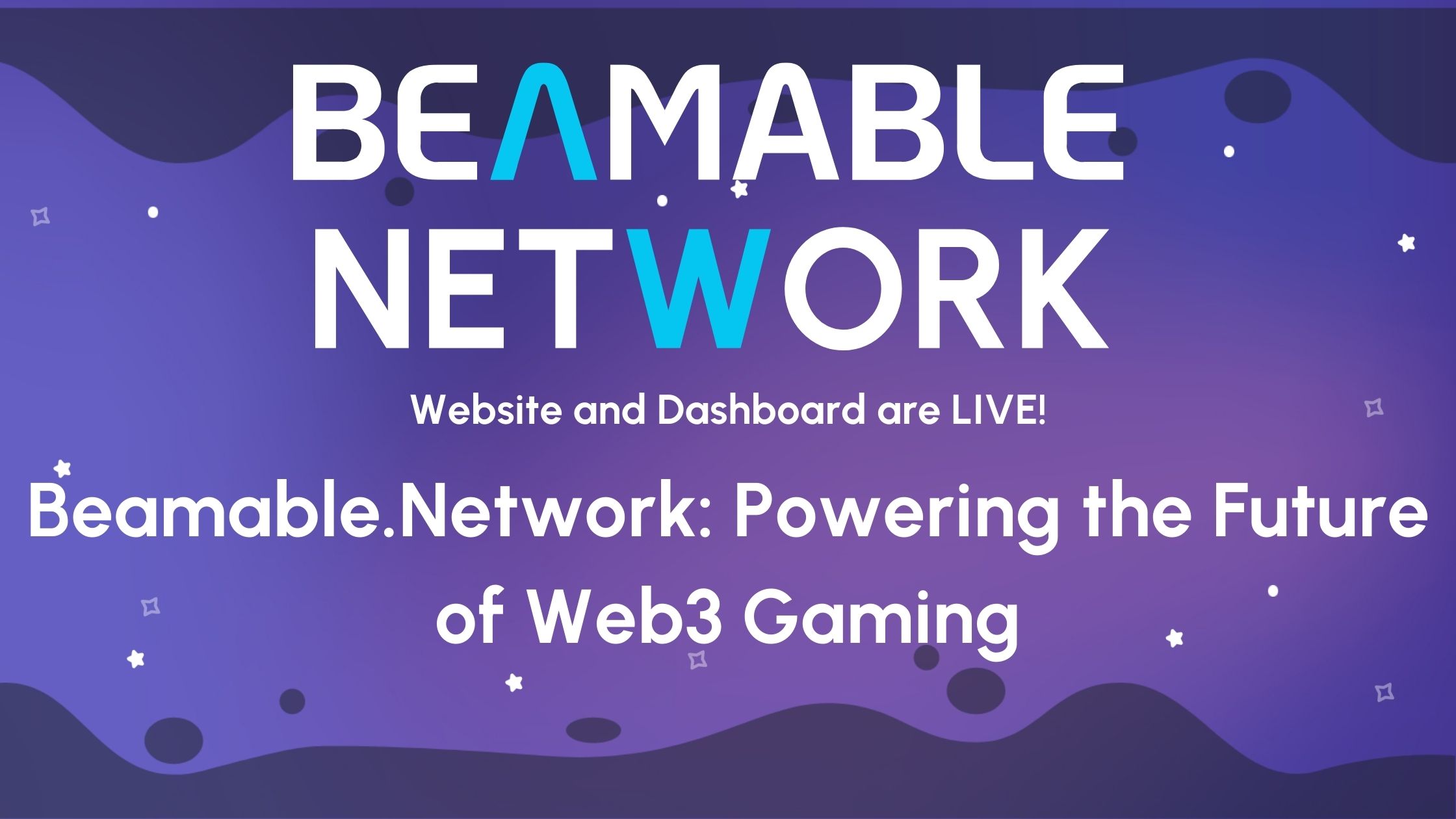
Introducing Beamable Network: The Future of Decentralized Game Infrastructure
Web3 gaming is entering a new era, and Beamable is shaping its future. Today, we’re introducing the Beamable Network website and dashboard – a powerful hub for developers and contributors to engage with one of the most forward-thinking Decentralized Physical Infrastructure Networks (DePIN) in gaming.
What is Beamable Network?
Beamable Network is designed to power the next generation of decentralized games by providing a scalable, high-performance infrastructure. Our vision is to create a developer-friendly, cost-effective, and community-driven ecosystem that enables game studios to integrate Web3-native features seamlessly.
With Beamable Network, game developers can access distributed compute, decentralized storage, and high-speed transaction capabilities while maintaining the immersive, real-time experiences players expect.
A New Era of Game Infrastructure
The launch of Beamable.Network marks a significant milestone in our mission to redefine how game developers leverage blockchain technology. The website and dashboard provide developers and contributors with:
✅ Real-time Network Insights – Track the performance, capacity, and decentralization metrics of the Beamable Network.
✅ Developer Tools & Resources – Access guides, SDKs, and API documentation to start building on Beamable Network today.
✅ Node Operator Dashboard – A streamlined interface for those contributing compute and storage resources to the network, making it easier than ever to participate in the decentralized gaming economy.
✅ Seamless Integration Support – Step-by-step guidance to onboard your game, leverage Web3-native monetization models, and optimize your infrastructure costs.
Beamable Network as a Leading DePIN Project
Decentralized Physical Infrastructure Networks (DePIN) are transforming industries by replacing traditional, centralized services with distributed, user-driven ecosystems. Beamable Network has already established itself as a Top-10 DePIN project by revenue, reinforcing its position as a major force in decentralized gaming infrastructure.
🎮 Purpose-Built for Gaming – Unlike generic blockchain infrastructure, Beamable Network is optimized for the unique demands of multiplayer and real-time game experiences.
⚡ Scalable & Cost-Efficient – Our Solana-based network ensures high-speed, low-cost transactions, making Web3 features accessible for game developers at any scale.
🌍 Community-Powered Growth – By enabling anyone to contribute infrastructure resources, Beamable Network ensures that the ecosystem remains decentralized, resilient, and sustainable.
💰 Top-10 DePIN Project by Revenue – Beamable Network’s rapid adoption and robust economic model have propelled it into the upper echelon of DePIN projects, solidifying its leadership in the gaming space.
Join the Beamable Network Today!
The launch of our website and dashboard is just the beginning. We invite game developers, node operators, and Web3 enthusiasts to join us in shaping the future of decentralized gaming. Whether you’re looking to integrate Beamable Network into your game, contribute to the network’s growth, or explore new opportunities in DePIN, now is the perfect time to get involved.
🚀 Explore the new website and dashboard today at Beamable.Network!
Let’s build the future of gaming – together.
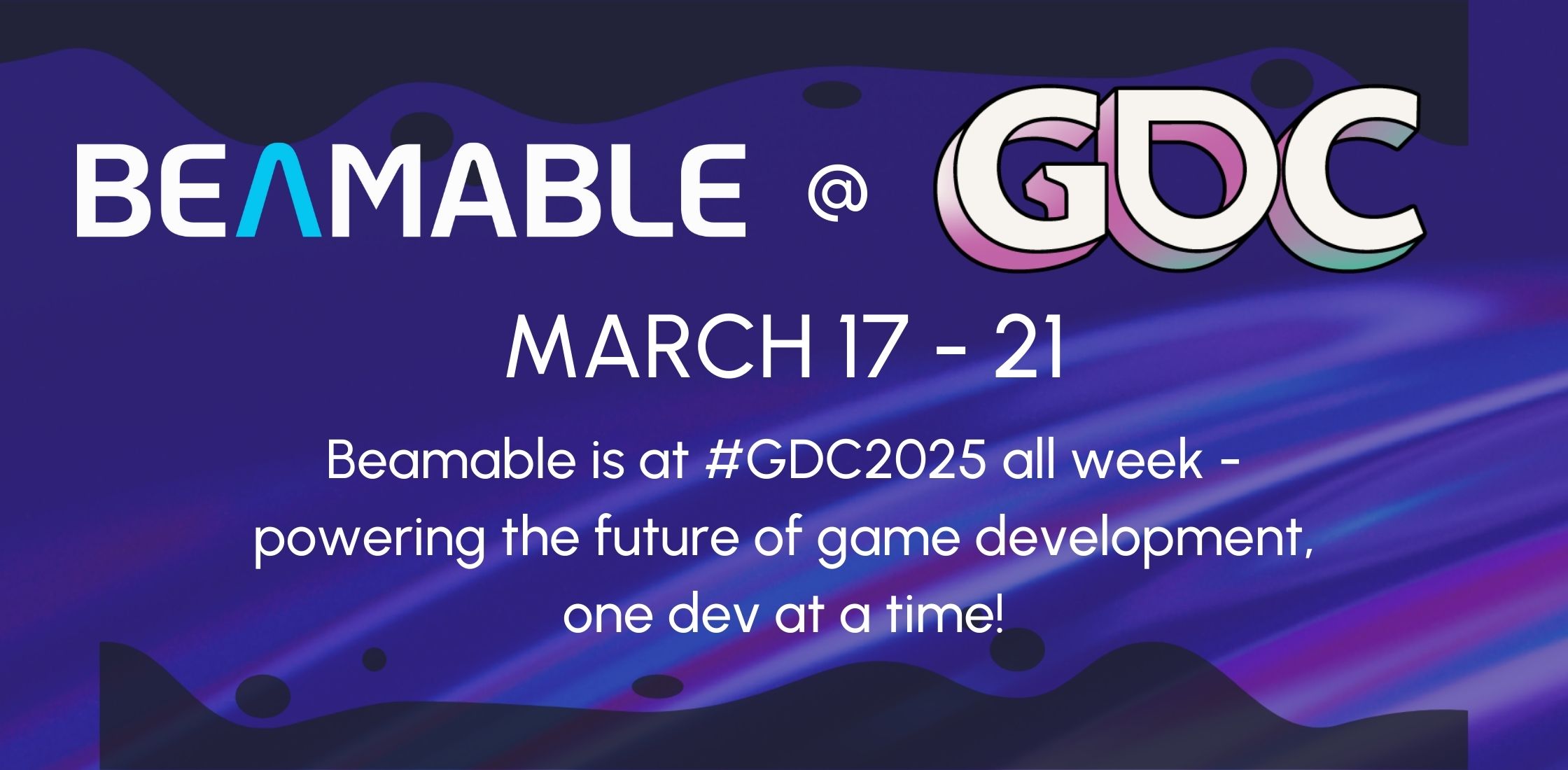
Beamable @ GDC 2025: Showcasing the Future of Live Game Development
The Game Developers Conference (GDC) 2025 is nearly here, and Beamable is all in! We’ll be on the ground all week, connecting with game developers, showcasing the latest innovations in live game services and backend technology, and helping studios build, scale, and monetize their games with ease.
Why GDC Matters
OK – we all know GDC is the epicenter of game development, bringing together thousands of industry professionals to discuss trends, share knowledge, and explore the tools shaping the future of gaming. For Beamable, this year is about empowering developers with scalable backend solutions – no server engineers are required. Whether launching a new game, expanding an existing one, or exploring Web3 integrations, our platform makes it easier than ever.
Beamable at GDC 2025
🔹 Meet the Team – We’re hosting meetings, drop-ins, and even some social time with brunch and happy hour throughout the week. Let’s discuss seamless backend integration, live operations, and monetization strategies.
🔹 Deep-dive Insights – Learn how Beamable’s microservices architecture simplifies backend development while supporting high-scale game operations.
🔹 Talks & Sessions – Jon Radoff and other Beamable experts will speak on key topics, from decentralized game economies to scalable infrastructure for live games. Stay tuned for details!
🔹 Networking & Events – From casual meetups to exclusive gatherings, we’re connecting with game makers who want to push boundaries.
Let’s Connect!
Are you heading to #GDC2025? We’d love to meet up! Schedule some time with us here: https://calendly.com/tmarkelz/gdc-2025-trapper-markelz
The future of game development is here—let’s build it together. 🚀🎮
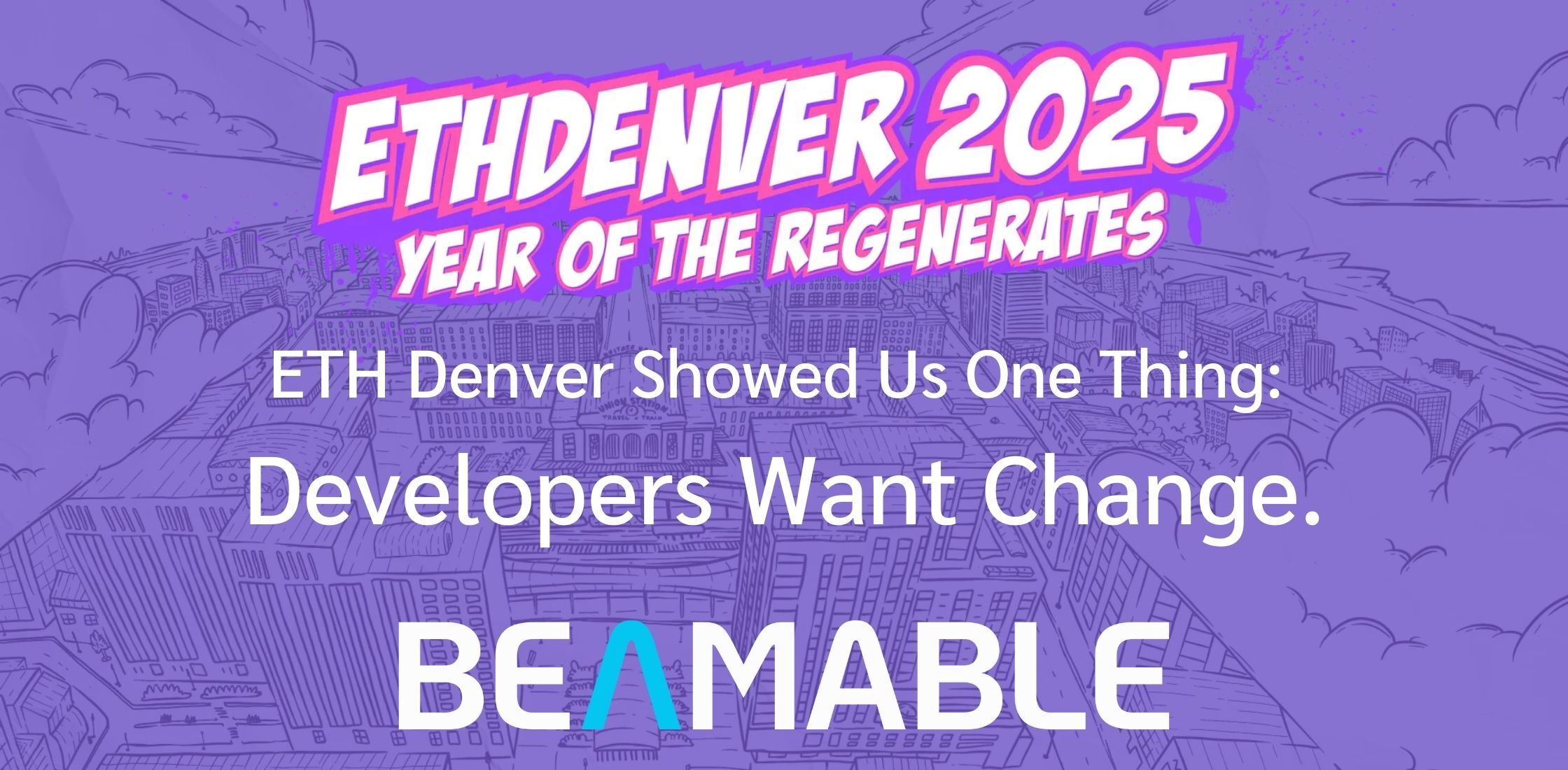
Beamable at ETH Denver: Why Game Infrastructure Needs to Change
Live service games aren’t just the future – they’re the present. And yet, the infrastructure supporting them still looks a lot like the past: expensive, fragmented, and increasingly vulnerable to the shifting priorities of centralized providers.
At ETH Denver 2025, we saw firsthand how much this conversation is accelerating. Developers aren’t just curious about decentralized infrastructure anymore – they’re demanding it. They want to move faster, reduce risk, and build on systems that won’t disappear when a corporate strategy shifts. That’s precisely why we built Beamable.Network – and why it’s now one of the Top 10 DePIN projects by revenue (source: depin.ninja).
“Developers at ETH Denver saw Beamable.Network as a compelling solution to the challenges of live game infrastructure. The idea of an open-source, community-owned network resonated because it gives them control, aligns with their needs, and removes the risks of centralized platforms changing their business models or shutting down services. Beamable is here to accelerate game development, making it easier and more cost-effective to build and scale live service games.”
Jon Radoff, CEO of Beamable
Why Decentralization Matters for Game Development
For years, developers have embraced open-source software because it gives them flexibility and control. But why stop at software? Game infrastructure must be open, community-owned, and independent of single points of failure.
The problem isn’t just that centralized providers can be expensive or inefficient—they introduce existential risks to studios that rely on them. We’ve seen this play out repeatedly:
- Amazon shut down GameSparks, affecting 2,000+ games
- Unity’s pricing model shift caught developers off guard
- Multiple gaming backend services have been acquired or discontinued, forcing costly migrations
This isn’t just inconvenient – it’s structural fragility baked into game development. When infrastructure is owned and controlled by the same companies that can shut it down, developers don’t actually own their tech stack.
That’s why the shift toward decentralized physical infrastructure (DePIN) is so compelling and why Beamable.Network is already one of the most successful DePIN projects in gaming infrastructure.
The Role of Beamable.Network in This Shift
ETH Denver made clear that decentralization isn’t just an ideological stance—it’s a practical solution to real problems. The developers we spoke with were excited about Beamable.Network not because it’s Web3 but because it solves challenges they face today, whether they’re building a traditional live game or a blockchain-powered one.
What changes when infrastructure is open and decentralized?
✅ Studios gain control – Instead of depending on a single provider’s roadmap, they build on a network designed to be permanent and adaptable.
✅ Risk is reduced – Compute power is distributed across multiple suppliers, preventing a single failure point from taking everything down.
✅ Costs go down – Studios bid for compute, creating a competitive, market-driven pricing model rather than being locked into static, corporate-controlled rates.
✅ Development accelerates – Instead of stitching together fragmented tools, developers get an interoperable, composable backend that just works.
And this isn’t just theoretical. Over 80 games already use Beamable, with another 60 in active development.
The shift from centralized infrastructure to open, community-driven networks is happening now because developers are realizing it’s not just a better philosophy but also a better business decision.
The DePIN Opportunity: Why This Isn’t Just About Gaming
ETH Denver wasn’t just about games. DePIN – the idea of decentralizing physical infrastructure – was a central theme across multiple industries. Cloud computing, storage, AI workloads, and beyond are all moving toward decentralized models.
In that context, Beamable.Network isn’t just about fixing game infrastructure. It’s part of a larger movement toward open, developer-aligned technology.
- Datacenters compete for capacity, rather than infrastructure being monopolized by a handful of corporations.
- Studios stake tokens to access reliable compute, creating a market-based alternative to rigid pricing models.
- Billions of API calls per month prove that decentralized infrastructure isn’t just viable – it’s already working at scale.
We’re watching a fundamental shift in how digital infrastructure is built and sustained. And gaming, as an industry that thrives on constant iteration, is positioned to lead the way.
Beamable’s Solution: Open Software, Open Network
For years, open-source software has empowered developers by giving them control, flexibility, and the ability to build on shared innovation. Beamable extends that same philosophy to infrastructure, creating a community-owned network where game developers aren’t locked into a single provider’s business model or roadmap.
Instead of relying on closed, centralized platforms, Beamable.Network offers an open, decentralized alternative – where game studios can tap into scalable compute power, reduce costs, and future-proof their games against sudden shutdowns or policy changes.
Why Beamable?
✅ Lowers Costs – Games bid on compute from a network of suppliers, cutting costs by 50%+
✅ Eliminates Risky Dependencies – Multiple compute suppliers prevent reliance on a single provider
✅ Accelerates Development – Composable software allows teams to launch faster
Just as open-source software revolutionized development, open infrastructure is the next step – giving game studios more control over their tech stack while benefiting from a scalable, decentralized backend that evolves with the industry.
Built by Game Developers, for Game Developers
The Beamable team has deep experience in live service games, having built and shipped titles played by over 20 million players worldwide. Games such as Star Trek Timelines and Game of Thrones Ascent are just some of the projects the team has led – giving Beamable the expertise to create infrastructure that truly meets game developers’ needs.
Final Thoughts from ETH Denver
If ETH Denver showed us anything, game developers aren’t waiting around for better solutions – they’re looking for alternatives that give them more control, reduce risk, and let them build faster.
That’s precisely what we’re building with Beamable.Network – a Top 10 DePIN project that’s proving decentralized game infrastructure isn’t just the future, it’s already here.
🔗 Learn more: Beamable.network

Jon Radoff at SXSW: Metaverse 2025 – Revival and Reinvention
We’re thrilled to announce that Jon will be taking the stage at SXSW 2025! As part of the groundbreaking Game Industry track, his panel discussion, Metaverse 2025: Revival and Reinvention, promises to redefine the future of gaming and digital entertainment.
Unlocking the Future of Entertainment
SXSW has long been the place where innovation meets inspiration, and this year is no different. From March 9-11, 2025, the Game Industry track will showcase the explosive growth of gaming as the ultimate entertainment platform. Expect to see an incredible fusion of music, media, and immersive technology that’s transforming how we play, create, and consume content.
Why You Can’t Miss This Panel
On March 12, 2025, at 10:00 AM CT, join Jon at Hilton Austin Downtown, Salon K (Experiential AI) as he leads a forward-thinking conversation on the evolving metaverse. His panel will dive deep into:
- AI and Decentralization: Discover how artificial intelligence and Web3 are driving innovation and economic efficiency within XR and gaming.
- Immersive Experiences: Learn about the technologies reshaping game development and enhancing user experiences.
- The Future of the Metaverse: Get a sneak peek into what the metaverse will look like in 2025, and how these transformative trends are setting the stage for a new era in digital entertainment.
This isn’t just another tech talk – it’s a comprehensive look at the building blocks that are rapidly bringing us closer to the metaverse of tomorrow.
Be Part of the Revolution
Jon’s insights and expertise make him a must-see speaker for anyone interested in the cutting-edge of gaming and immersive media. Whether you’re a developer, a gamer, or simply a tech enthusiast, this panel is designed to inspire and inform, offering a glimpse into a future where creativity and technology converge in unprecedented ways.
Ready to be part of this transformative experience?
Add to your calendar now and join us at SXSW for an unforgettable dive into the metaverse!

Beamable Expands Web3 Gaming Capabilities with Mythos Chain Integration
Web3 gaming is evolving fast. Developers need scalable, decentralized infrastructure to power immersive, player-driven economies – without the technical friction that comes with blockchain integration.
That’s why we’re excited to announce native support for Mythos Chain within Beamable Network, giving developers an out-of-the-box solution for seamless Mythos token integration.
Unveiled at ETH Denver 2025, this initiative—backed by Scytale Digital, a key investor in Beamable and Mythical—brings the power of Polkadot-based scalability and interoperability to game developers building with Web3.
Why Mythos + Beamable?
As a Polkadot-based chain, Mythos provides the speed, security, and cross-chain compatibility to build next-gen Web3 games. By integrating native support for Mythos tokens, Beamable removes the complexity of blockchain implementation, enabling studios to launch and scale Web3-powered game economies effortlessly.
“Mythos running on Polkadot will unlock a highly scalable, interoperable ecosystem that gives game developers the flexibility and efficiency they need to build the next generation of Web3 games,” said Jon Radoff, CEO of Beamable. “By integrating native Mythos support into Beamable, we’re eliminating complexity and empowering studios to create seamless, player-driven economies that redefine engagement and ownership in gaming.”
Bringing Mythos to Game Developers
With the Beamable SDK for Mythos, developers gain access to:
- Seamless Mythos token support – Enabling in-game transactions, asset ownership, and decentralized economies.
- Plug-and-play blockchain integration – Designed for easy adoption across major game engines and Web3 infrastructures.
- Scalable monetization and economy solutions – Empowering studios to build sustainable, player-driven economies with minimal friction.
Live Discussion with Beamable & Mythical Games CEOs
Want to dive deeper into the future of Web3 game development?
Join Jon Radoff (Beamable CEO) and John Linden (Mythical Games CEO) for a special edition of Jon’s “Web3 Game Development Livestream” at 9 AM ET on Wednesday, Feb. 26.
Topics will include:
✅ The vision behind Beamable’s Mythos SDK integration
✅ How Polkadot-based infrastructure benefits game developers
✅ The evolving role of Web3 gaming economies
✅ Strategies for onboarding traditional game developers into Web3
✅ Insights into the next wave of blockchain-powered game design
🎥 Watch the live stream and join the conversation on Beamable’s official channels!
The future of Web3 game infrastructure is here. With Mythos and Polkadot integration, Beamable is making decentralized gaming more accessible, scalable, and seamless than ever before.
💡 Ready to build? Learn more at beamable.network
🔔 Stay connected – follow us on X: @Beamable

Beamable Network Expands To Solana to Power the Future of Game Infrastructure
The gaming industry is undergoing a massive transformation. As developers push the boundaries of online experiences, traditional cloud infrastructure – expensive, centralized, and prone to bottlenecks – can no longer keep up.
That’s why we’re excited to announce Beamable Network is launching on Solana, bringing decentralized infrastructure to gaming at massive scale. With Solana’s high-performance blockchain, Beamable Network delivers a scalable, cost-efficient alternative to hyperscaler cloud providers, giving developers the freedom to build the next generation of games – without the limitations of big tech’s walled gardens.
Why Beamable Network + Solana?
When we set out to build Beamable Network, we knew we needed a blockchain that could handle millions of users and billions of API calls – without the slow speeds and high costs of traditional infrastructure. Solana stood out as the clear choice.
Unmatched Speed & Scalability
Solana’s proof-of-history (PoH) consensus delivers sub-second transaction finality, ensuring real-time backend operations for modern games. No more lag. No more bottlenecks. Just seamless, decentralized performance at scale.
Radical Cost Efficiency
Compared to traditional cloud providers, where costs scale aggressively as games grow, Solana’s transaction fees average fractions of a cent – allowing developers to build and scale affordably.
Proven Track Record in DePIN
From Helium (decentralized wireless infrastructure) to Render (GPU rendering), the biggest Decentralized Physical Infrastructure Network (DePIN) projects have chosen Solana for a reason: it works. Now, Beamable Network joins that ecosystem, bringing decentralized compute, storage, and networking infrastructure to the gaming industry.
Breaking Free from Centralized Cloud Providers
For too long, game developers have been locked into costly, centralized cloud services like AWS, Google Cloud, and Azure – providers that control pricing, limit flexibility, and create single points of failure.
Beamable Network changes that. By decentralizing backend services, developers gain access to an infrastructure that is scalable, resilient, and free from vendor lock-in. With tokenized incentives, infrastructure contributors also benefit, ensuring a sustainable, community-driven approach to game infrastructure.
A New Era for Game Development
The future of game infrastructure is decentralized. With Beamable Network on Solana, developers now have the tools to build high-performance, scalable games without compromising on cost or control.
Learn more about our Solana integration here.
Ready to explore the next generation of game infrastructure? Learn more at beamable.network
Stay updated – follow us on X: @Beamable
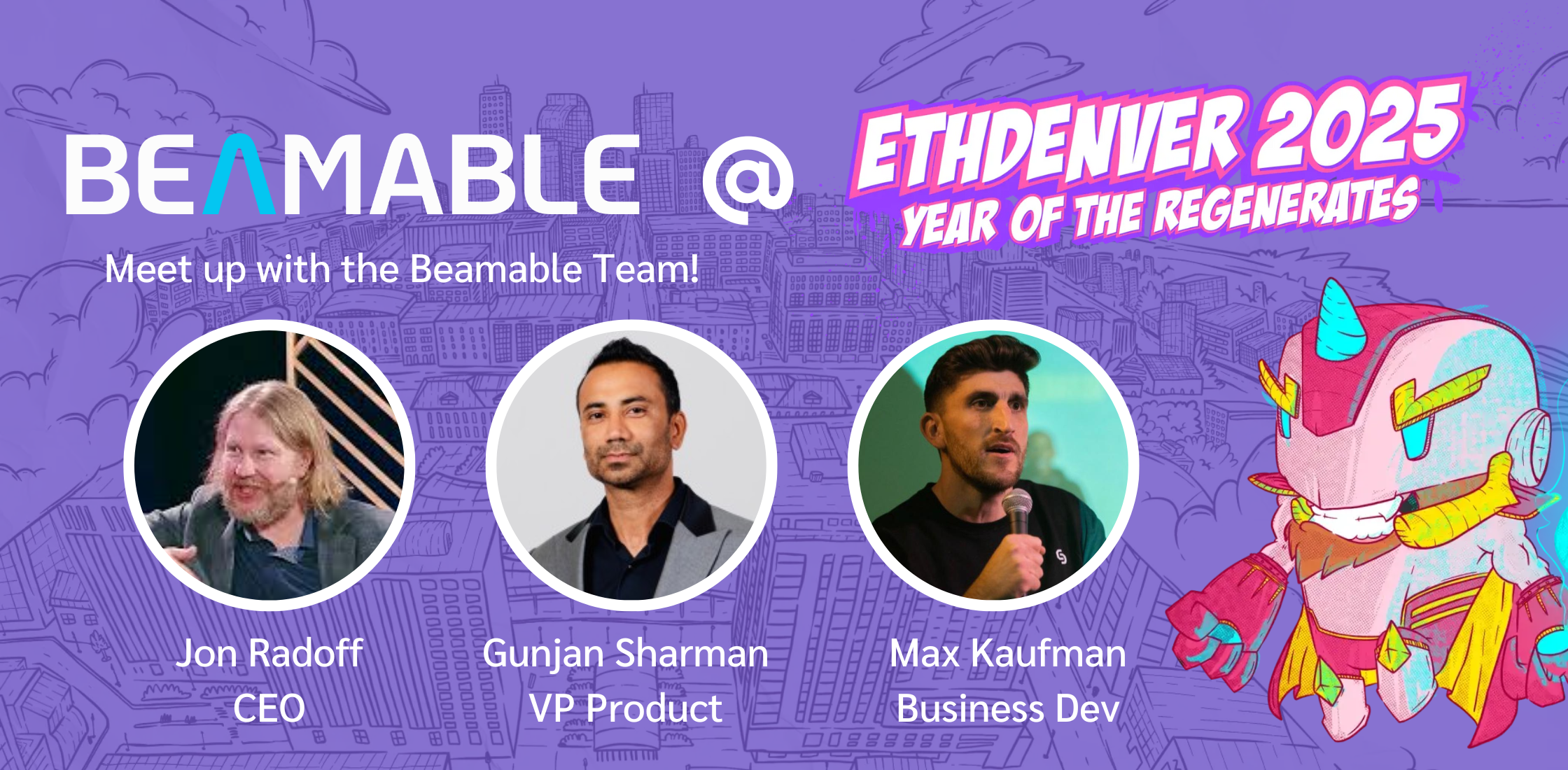
Beamable at ETHDenver 2025: Join Us for a Week of Web3 Gaming Innovation
Beamable is excited to announce that our CEO, Jon Radoff, VP of Product, Gunjan Sharman, and Business Development Representative, Max Kaufman, will be attending ETHDenver 2025 from February 24 to March 1! This premier blockchain event is where the Web3 industry’s top leaders, developers, and innovators come together to shape the future of decentralized technologies.
ETHDenver presents an unparalleled opportunity for Beamable to engage with game developers, studios, blockchain partners, key opinion leaders (KOLs), and more. Our team will be on-site to discuss the upcoming Beamable Network launch, token generation event (TGE), node sale, and cutting-edge tools designed to empower game monetization in the decentralized economy.
Jon Radoff Speaking at DePIN Day
Beamable is excited to participate in DePIN Day, a key event at ETH Denver focused on decentralized physical infrastructure networks. Our CEO, Jon Radoff, will be speaking at 2 pm MT about Beamable.Network and how decentralized game infrastructure is transforming the gaming industry, enabling developers to create more scalable, resilient, and player-driven experiences.
Why Connect with Beamable?
At Beamable, we are redefining how games monetize and interact with blockchain technology. Our network launch, TGE, and node sale are key milestones that will bring new opportunities for game developers to build sustainable, decentralized economies within their games. Whether you are a game studio, blockchain partner, investor, or Web3 enthusiast, we want to hear from you!
Connect with Beamable at ETH Denver
Through our partnership with MomentumX Global, a trusted Web3 business development and go-to-market firm, we are thrilled to be part of ETHDenver’s vibrant ecosystem.
📩 Want to schedule a meeting? DM TG @maxkaufman32 or email max@momenttumx.global to get on the calendar!
We look forward to seeing you at ETHDenver 2025! Let’s build the future of Web3 gaming together. 🚀
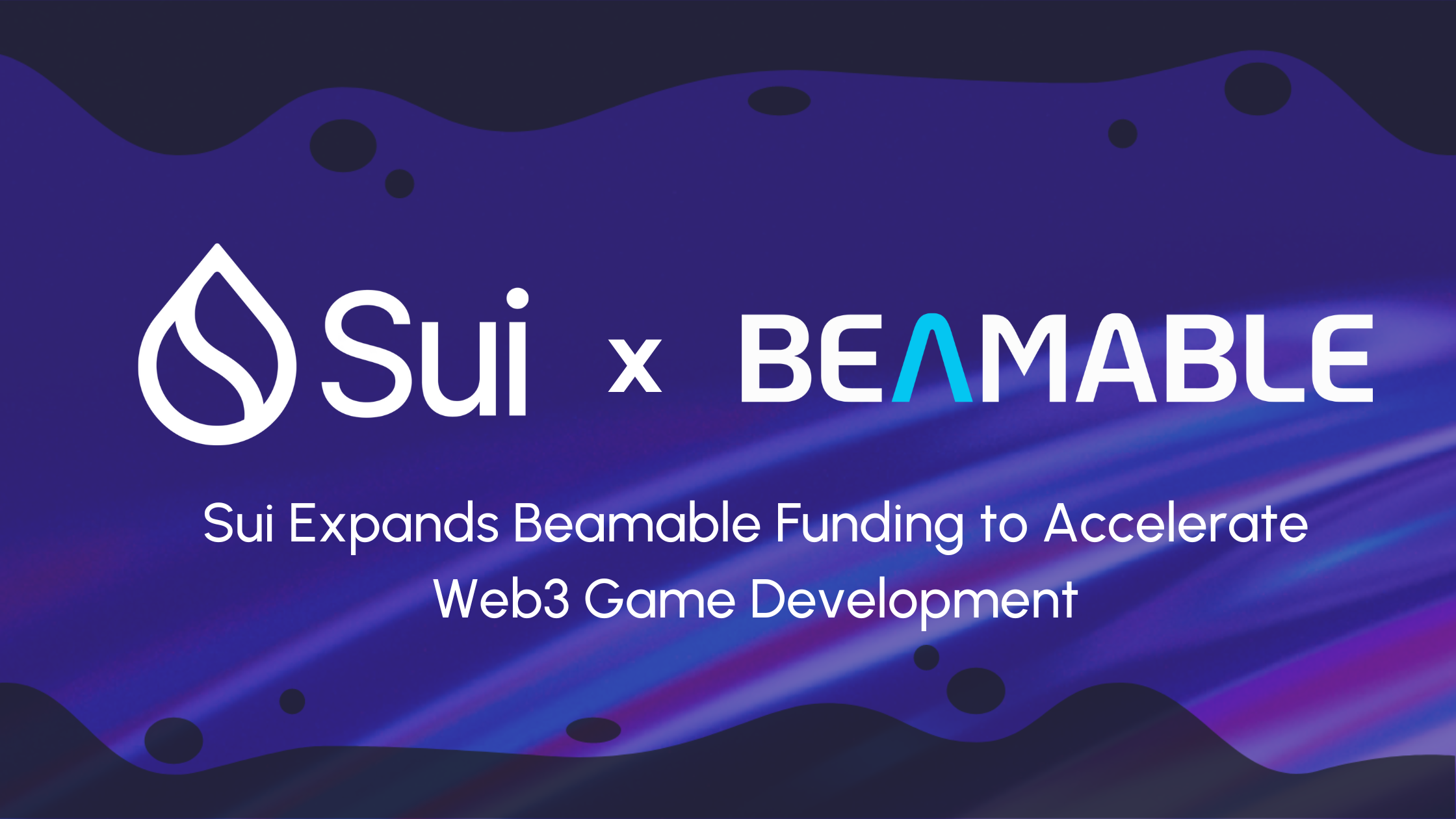
Beamable Expands Web3 Gaming with Sui Foundation Grant
🚀 Big news for game developers! Beamable has received a grant from the Sui Foundation to enhance blockchain integration, making Web3 gaming more accessible, scalable, and powerful than ever before.
What This Means for Game Developers
Beamable’s partnership with Sui will supercharge its existing Unity and Unreal Engine integrations, bringing:
✅ Stashed Wallets – A seamless Web3 wallet with Web2 login convenience
✅ zkLogin via Enoki – Use Google or Twitch to create a Sui wallet
✅ Sponsored Transactions – Remove friction by allowing sponsored blockchain transactions
✅ Advanced NFT Support – Mint, burn, and dynamically update NFTs with storage rebates
✅ Closed Loop Tokens – Game-specific tokens for regulated digital asset use
✅ Sui Kiosk – A decentralized marketplace for in-game assets
With these tools, developers can focus on crafting incredible gaming experiences while effortlessly integrating blockchain features.
Warped Games Leads the Way
🎮 One of the first studios to embrace these enhancements is Warped Games, the team behind Warped Universe. Their upcoming Unreal Engine game leverages Beamable’s new Web3 capabilities, proving just how powerful this integration will be.
“Beamable and Sui make our lives easier as game devs so we can focus on delivering what matters most to players.”
– Scott Brown, President of Warped Games
Get Involved Now
Want to integrate Sui-powered blockchain features into your game? Start today:
📢 Stay updated—follow us on X: @Beamable
This is just the beginning of a new era for Web3 gaming. Join us as we build the future of decentralized gaming experiences! 🎮🔥

Beamable’s CTO, Ali El Rhermoul, Attending D.I.C.E. 2025 to Connect with Game Makers
We’re excited to share that Ali El Rhermoul, CTO of Beamable, will attend the D.I.C.E. 2025 Summit in Las Vegas this February from the 11th to the 13th!
D.I.C.E. is where the gaming industry’s top leaders, innovators, and visionaries gather to explore the future of interactive entertainment.
Ali will be on-site to meet with game developers, studios, and partners, discussing how Beamable helps creators build, scale, and monetize their live games with ease.
Whether you’re launching a new project or looking to optimize your live operations, this is an excellent opportunity to connect and explore how Beamable can support your success.
Book a Meeting
If you’ll be at D.I.C.E. 2025 and want to chat about your game, schedule a meeting with Ali to discuss how Beamable can help you build and grow your live game.
We look forward to seeing you in Vegas!

Beamable Secures $13.5M Series A Funding Led by BITKRAFT to Advance Decentralized Gaming Infrastructure
We’re thrilled to announce that Beamable has raised $13.5 million in a Series A funding round led by BITKRAFT Ventures to further develop and scale the Beamable Network, a Decentralized Physical Infrastructure Network (DePIN) for gaming. This investment will help us redefine how backend infrastructure for games is built, shifting from centralized hyperscalers to a decentralized, community-driven model.
A New Era for Gaming Infrastructure
The Beamable Network is set to be one of the top 10 DePIN projects globally at launch, thanks to the demand from games already leveraging Beamable’s technology. By decentralizing computing power, storage, and network bandwidth, the network offers developers greater scalability, cost efficiency, and resilience.
As part of this shift, the newly established Beamable Foundation will oversee open-source development and the creation of a tokenized protocol, ensuring that developers have a robust alternative to traditional cloud providers.
Investor Support & Industry Impact
Alongside BITKRAFT Ventures, the funding round included investments from Arca, Advancit Capital, 2Punks, P2 Ventures, Solana Foundation, Scytale Digital, defy.vc, GrandBanks Capital, and Permit Ventures.
Carlos Pereira, General Partner at BITKRAFT Ventures, emphasized the significance of this move:
“We believe Beamable is uniquely positioned to set a new standard for decentralized infrastructure in gaming. Its proven technology and built-in demand, combined with the disruptive potential of DePIN, represents an unparalleled opportunity for game developers across Web2 and Web3.”
What’s Next?
Beamable’s transition to a decentralized model is not just an evolution—it’s a game-changer for developers looking to build scalable, cost-effective, and resilient online experiences. This funding ensures we can continue empowering game creators with cutting-edge infrastructure solutions that break free from traditional limitations.
To learn more about the Beamable Network and our vision for the future of decentralized gaming, visit beamable.network.
Summary of Coverage
VentureBeat (exclusive)
https://venturebeat.com/games/beamable-raises-13-5m-for-decentralized-open-source-backend-infrastructure-for-games/
Axios Pro Rata
https://www.axios.com/newsletters/axios-pro-rata-789f88d5-a109-4e81-95fd-9e5cfef70c70.html
WSJ VC Pro
https://createsend.com/t/d-6635C87B0085F4262540EF23F30FEDED
StrictlyVC
https://preview.mailerlite.com/m8h2h3z8y2/2673979513712417140/y3p9/
FinSMES
https://www.finsmes.com/2025/02/beamable-raises-13-5m-in-series-a-funding.html
city biz
https://www.citybiz.co/article/658139/beamable-raises-13-5m-series-a/
Blockchain Gamer
https://www.blockchaingamer.biz/features/14400/updated-blockchain-game-investment-funding-list/
NFTgators
https://www.nftgators.com/depin-project-beamable-secures-13-5m-series-a-round-led-by-bitkraft/
Live Bitcoin News
https://www.livebitcoinnews.com/bitkraft-leads-13-5m-series-a-in-beamable-to-boost-decentralized-gaming/
###

Beamable Foundation Launches to Revolutionize Game Infrastructure with Community-Owned Solutions
Beamable has announced the launch of the Beamable Foundation, an independent organization focused on transforming the gaming industry through open-source technology and a Decentralized Physical Infrastructure Network (DePIN).
By open-sourcing Beamable’s proven backend technology and leveraging blockchain, the Foundation aims to create a scalable, secure, and community-owned infrastructure for game development. “Open-source software is frequently higher quality, more secure, and better supported than closed-source alternatives,” said Jon Radoff, CEO of Beamable, underscoring the mission to advance innovation through collaboration.
The Beamable Network’s DePIN is a groundbreaking infrastructure model, enabling participants to contribute computing power, storage, and network resources in exchange for token-based rewards. Unlike other DePIN projects, Beamable starts with a thriving ecosystem, boasting millions of users and billions of API calls already utilizing its backend. Designed for both blockchain-based “Web3” games and traditional “Web2” games, the network bridges accessibility and innovation, making it a versatile solution for an industry projected to generate $200 billion in revenue by 2025.
With a focus on community ownership, enterprise-grade reliability, and interoperability, the Beamable Foundation aims to deliver a next-generation virtual hyperscaler for games. Its open-source ecosystem will streamline game development and encourage global collaboration, ensuring developers can innovate while leveraging robust backend services. To learn more or get involved as a developer, contributor, or investor, visit beamable.network.

Build a Thriving Game Studio with Insights from the Multiplayer Game Report
Crafting a great game is a monumental challenge, but building a thriving game studio? That’s an entirely different game. For developers looking to scale their operations, deliver better player experiences, and streamline their workflows, the Multiplayer Game Report offers indispensable advice.
Beamable’s extensive expertise in backend systems, live game operations, and studio efficiency makes their contributions to this report a must-read for any developer ready to level up.
Beamable’s Contribution to the Multiplayer Game Report
Beamable understands the unique challenges game developers face. From managing in-game economies and backend infrastructure to crafting engaging player experiences, they’ve been at the forefront of helping studios overcome these hurdles. Trapper Markelz, Beamable’s Co-Founder and COO, shares valuable insights throughout the report, including:
- Why backend systems are the foundation of modern game development
- How to scale your game with ease
- Why speed to market is critical for success
What’s Inside the Multiplayer Game Report?
This report features Beamable’s expertise alongside other industry leaders like Gameye, BespokeCI, Solsta, and BugSplat. Together, they provide a comprehensive roadmap for creating games and running a successful studio.
- Best Practices for Scaling Your Studio
Explore actionable advice for setting up efficient systems, managing teams, and optimizing workflows, all shared by experts who’ve been in your shoes. - Streamlined Backend Solutions
Beamable highlights how to manage in-game economies, authentication, social features, and LiveOps with ease using their comprehensive SDK. - Real-World Case Studies and Insights
Learn from real-world examples, including how successful studios have used Beamable’s tools to enhance player experiences and grow their businesses. - Key Data for Smarter Decision-Making
Discover how to track and utilize data to improve every aspect of your game, from matchmaking and leaderboards to crash reporting and player retention.
Who Should Read This Report?
This report is designed for game developers, indie studios, and team leaders who:
- …want to scale their studio with confidence.
- …are ready to optimize backend systems and live game operations.
- …need practical advice and tools to launch games faster and more effectively.
Get the Multiplayer Game Report Today
Don’t miss your chance to learn from industry leaders and transform your studio into a powerhouse.
Download the Multiplayer Game Report now and unlock the tools and insights to build better games!

Beamable 2024 Year-End Summary: A Year of Milestones, Innovation, and Transformation
As we wrap up 2024, Beamable reflects on an incredible year filled with innovation, growth, and stronger connections with our developer community. This year, we achieved remarkable milestones, introduced transformative updates, and continued to enhance our platform to empower game developers worldwide. Here’s a comprehensive look back at everything we accomplished together.
🚀 Beamable Mercury Release: A Game-Changer
The year’s highlight was the release of Beamable Mercury, our most significant update yet. This groundbreaking release introduced:
- Unity SDK 2.0: A complete redesign of our Unity SDK, delivering better workflows, enhanced integration, and unmatched performance.
- CLI 3.0: Redesigned for flexibility, offering streamlined Microservices deployment and management.
- Standalone Microservices (SAMS): Every C# Microservice is now a standalone project, simplifying organization, testing, and scaling.
Mercury represents a leap forward, empowering developers to build, test, and deploy faster while maintaining the flexibility needed to innovate.
🛠️ Product Innovations Throughout the Year
This year saw continuous improvements across our platform, enhancing usability, performance, and reliability:
- Beamable 1.19.10 – 1.19.21:
- SDK Enhancements: Improved runtime performance, better content caching, and token analytics to monitor and optimize user experiences.
- CLI Updates: Bulk content editing, enhanced error handling, and support for complex Unreal Engine integrations.
- Live Ops Portal Enhancements: Faster analytics queries, improved leaderboard management, and enhanced usability features.
- New Marketplace Integrations:
- Blockchain & Decentralization: Support for SUI Blockchain, Theta Network, and Venly, enabling seamless decentralized features.
- Matchmaking & Hosting: Partnerships with Edgegap and Hathora brought advanced matchmaking and decentralized hosting to developers.
- Reliability & Stability:
- Introduced a new Status Page for real-time updates on platform performance.
- Enhanced Microservices resilience, reducing latency and improving thread safety.
🎮 Community Engagement
Beamable engaged with the global gaming community at major events, showcasing our platform and strengthening relationships:
- Gamescom 2024: Connected with so many developers at one of the world’s largest gaming events.
- GameFi Unleashed & Token 2049: Bridged the gap between blockchain and gaming innovation.
- GDC 2024: Announced key updates and partnerships, emphasizing our commitment to empowering game developers.
Our CEO, Jon Radoff, played a central role in these engagements, delivering insights at events like the Korean Blockchain Week and the Play Beyond Summit.
📈 Looking Ahead
2024 was a transformative year for Beamable, marked by groundbreaking releases, global engagement, and a renewed commitment to empowering game developers. As we enter 2025, we are excited to build on this momentum, providing innovative tools and unparalleled support to help you create unforgettable gaming experiences.
Thank you for being part of our journey. Here’s to an even more exciting 2025!
Happy New Year from all of us at Beamable! 🎉

Beamable Mercury: Our Latest Release
Beamable is the open platform for game server technology, and we are thrilled to be entering our latest release phase, Beamable Mercury, which includes our Unity 2.0 SDK, our CLI 3.0, and our first official Unreal Engine 1.0 release! All of these products are about equipping game developers with best-in-class tools to develop, deploy, and manage microservices and databases. For a complete overview of the Mercury release, check out this video:
Beamable Microservices
Beamable has long offered Microservices as an integrated part of our Unity SDK, and now we are extending them to work wherever our developers work, inside Unity or Unreal, or simply in a code-first environment.
Microservices are built as dotnet 8 applications. They are integrated seamlessly into our Unity and Unreal SDKs and can be managed directly by the CLI. In Unity, Microservices are no longer part of the Unity compilation pipeline, which means Unity developers have access to full msbuild and nuget capabilities inside their Microservices. The Microservices offer a slimmed-down Dockerfile so developers can customize their deployed containers. Publishing Microservices is safer and faster than before, enabling developers to create and deploy Microservices in minutes.
When you write a Beamable Microservice, our tooling will automatically generate code-code in Unity or Unreal, so you don’t have to spend time writing boilerplate. We handle request routing, auto-scaling, and security- so you can focus on building your game.
Unity SDK Updates
The Beamable Unity 2.0 SDK is available today. The new SDK is powered by our CLI running behind the scenes. The Beamable SDK will automatically adapt your Unity project into a Beamable CLI-compatible project, meaning Unity developers inherit all the advantages of using the CLI and maintain integrated workflows within the Unity Editor.
To take full advantage of the CLI, the 2.0 SDK will migrate your old 1.0-era Microservices into CLI-compatible Microservices. These CLI-compatible services are called Standalone services because they do not rely on Unity’s compilation pipeline. Instead, standalone services are compiled with dotnet 8, which unlocks a variety of powerful features for developers to utilize.
You can run your services directly from an IDE. Debugging your services has never been easier. You can place a breakpoint in your Microservice code and use your IDE of choice to start debugging the application or attach it to a running process. Debugging in the 1.0 era of the SDK was complicated and involved complex and brittle configurations. None of that is necessary anymore, and debugging is as easy as starting the application.

Your services have full access to Nuget and MsBuild. Nuget is dotnet’s standard package management tooling and there are a wide variety of packages available to add your Microservices, such as Newtonsoft. MsBuild is the tooling used to build dotnet 8 applications, and you can extend your csproj file to include custom files, manage complex builds, or run post-build scripts. The Program.cs file is also customizable.
When Microservices are published to the Beamable Cloud, they are dockerized images. We have exposed a slim Dockerfile you can use to configure your build images. The build and upload process of the images has been dramatically optimized, and you should notice much faster Microservice publications.
While all of these new features are available outside of Unity, we have maintained a strong Unity Editor workflow integration. We have rebuilt the Microservice Manager window to integrate the capabilities of the new standalone services. We have renamed the window to Beam Services, and it allows you to create, run, stop, view logs, manage, delete, and publish Microservices and Microstorage objects.

Your old Microservices will be migrated to the new Microservice format the first time you open the Beam Services window. We strongly recommend you back up your project before starting the migration. The migration will handle the vast majority of existing Microservices, including those with .dll references, Assembly Definition references, Storage Object references, and custom code. Please see our documentation for more information on how the migration flow works, as well as a few limitations of the migration flow that will require manual intervention.
We have removed the Beamable Toolbox window and the prefabs that existed inside it, such as Account Management. The skinning and theming controls have also been removed. If you already use these prefabs, they still exist within the package, so you can still use them. However, they are obsolete and will not receive patches in the future.
Instead of the Toolbox, we are introducing LightBeams, which are Unity Package Manager Samples available from either the Package Manage or the new Beam Library window. LightBeams are meant to be lightweight samples that teach you how to use the Beamable SDK. They are not meant to be drag-and-drop shippable. The only exception is our Admin Console prefab, which is available in the Beam Library. Our goal is to develop each LightBeam as a simple example of how to use our SDK instead of building complex, fully featured game examples that may obscure the actual SDK usage. These LightBeams are also developed internally by Beamable Developers in the same repository and Unity project as the SDK itself, which means they will stay updated with the latest Beamable features and code.

The Toolbox used to have buttons that allowed you to log in or out, change your realm, open the portal, and navigate to the other main areas of the Beamable Editor SDK. All of those functions now exist in the Beamable Button, which is located at the top of the Unity Editor. In 1.19.23, the button showed the currently installed SDK version number, but now it shows the currently selected Realm. If you need to find the version number, check your manifest.json file or go to the account page.
Unreal SDK Updates
Unreal’s first official release was developed alongside early adopters and focuses on Beamable’s Core Features:
- Microservices and Federations
- Content
- Stats and Inventories
- Lobbies and Matchmaking and Dedicated Server Build support.
We have been in preview for a while now, but with the release of 1.0.0, we’ve taken all the feedback from our partners and developed SDK workflow improvements all around.
In particular, we have a brand new Editor Content Window and Subsystem that is much more VCS-friendly while retaining the Unreal-native look and feel.
We also have a brand new Microservice Window that allows you to Run/Stop microservices locally through the editor, see the logs the service is emitting, configure Federations, and even enable a brand new collaborative workflow made possible by Beamable’s Microservice approach to cloud code. This also automatically detects it when running the service through the IDE, courtesy of our CLI-backing.
We understand that a lot of Unreal developers work on Dedicated Server games. As such, a lot of you will want to use our Federated Game Server capabilities to integrate Beamable’s microservices with your choice of Game Server Orchestrator (we hear Hathora is a good one). It used to be the case that our Beamable servers could not route requests to federations in your locally running services. This meant that for every code change you made in the federation logic, you had to publish the microservice to a realm to be able to test it. This was a problem because publishing would affect the entire realm, AND it took a lot of time.
We are happy to announce that such problems are no longer relevant. Not only are Microservice deployment speeds significantly faster now (down to 30s~1m from 5m~10m, in a lot of cases), but you can also change your service’s code, set up a content-based filter via the Editor or CLI, and then run your service. Any match made from the selected content types will be forwarded to your local microservice instead. This is a massive iteration time improvement and should make working on a dedicated server game much easier.
That is not all, though. Earlier, we mentioned a new collaborative workflow. Well, this is it: any developer can now share their locally running service with another developer in the same realm! This means that debugging collaboratively with teammates can happen much more organically. For example, if a designer runs into a bug with the deployed microservice. An engineer can hop on a call with them, run that microservice in their machine, have the designer point their PIE mode towards their local service, and then reproduce the issue while you have logs and a breakpoint added to your code.
Working this way can help engineers quickly unblock designers being hampered by critical bugs and make team communication much more fluid and efficient. I’m sure you can imagine other interesting applications for this collaborative workflow, too.
To round out this release, all of the above is joined by many fixes around Lobbies, Matchmaking, Stats, Inventory subsystems, and the early stages of MicroStorages in-editor support.
That’s all we have for Unreal, folks! Read along for more information on the CLI, as the CLI plays a significant role in Unreal development with Beamable.
CLI
The Beamable CLI 3.0 empowers both our engine integration SDKs. The major change from CLI 2.0 to 3.0 is how the CLI is installed in your project. Previously, the CLI was installed as a global dotnet tool. This meant that if you had multiple projects using different versions of Beamable, you had to switch your global installation version each time you switched between projects. To solve this limitation, in 3.0, the CLI is installed as a local dotnet tool. This means that the project knows its current CLI version number, and when you run the dotnet beam version, you will be using the CLI version for the current project. The version number is stored in the .config/dotnet-tools.json file in your project root directory. This is a standard practice of dotnet tools. Microservices and Storage .csproj files will automatically reference this version of Beamable as well, which means when you need to change your version of Beamable, you can use the beam version install command once, and it will upgrade your CLI as well as your SDK.
Experience Mercury Now!
Beamable’s Mercury release delivers a powerful evolution of our game development tools. With the enhanced Unity 2.0 SDK, first official Unreal SDK release, and a revamped CLI 3.0, developers can build faster, debug effortlessly, and collaborate seamlessly across diverse environments.
The Unity SDK introduces streamlined microservices management and robust integration with modern dotnet tooling, while the Unreal SDK provides advanced support for dedicated servers, federations, and collaborative workflows. Our CLI 3.0 further simplifies version management and project-specific tooling, ensuring a smooth and efficient development experience.
To explore these updates and more, sign up or log in to your portal now, grab the latest SDK versions, and build on Beamable today.

Building Games, Not Infrastructure: A Developer’s Guide to Beamable.
The Problem We’re Solving
If you’re building a live service game, you are likely aware of the degree of complexity, as you have spent months architecting backend systems, dealing with multiple codebases, and hoping your infrastructure choices won’t come back to haunt you.
You’re not alone; research shows that 95% of game studios are running or planning to launch live service games. With this in mind, we at Beamable provide a comprehensive suite of tools that allows YOU, the developers, to focus on what matters most: gameplay.
2023 game Development Report (Source: Griffin)
Code Where You Already Work
Firstly, we’ve eliminated the context-switching problem. Instead of jumping between different IDEs and environments, you can write your server-side logic directly in Unity or Unreal. Here’s what this means for your workflow:
- Write both client and server code in C#
- Debug your entire stack from one place
- Deploy with a single click
- Test and iterate rapidly
Our founder, John, put it best: “The best features can usually be prototyped in days if not hours.” We’ve seen this in action with partners like Mythical Games and Wildcard Alliance, who’ve dramatically accelerated their development cycles.
Infrastructure That Grows With You
Backend dependencies can make or break a live service game. When Amazon discontinued GameSparks in 2022, over 2,000 games were left stranded, and they suddenly needed to rebuild their backend.
We’re making sure that never happens to our partners. Our decentralized infrastructure handles over 10B API calls monthly, but more importantly, you’re not relying on a centralized provider. You get the reliability of enterprise infrastructure with the much-needed element of independence.
The Tools You Actually Need
We’ve built what we wished we had when running live ops for major titles. Our suite of tools include:
- Live Operations – Deploy new content, run sophisticated A/B tests, and manage your entire economy in real time, all without requiring engineering resources or client updates. Perfect for quick iterations and responding to player behavior.
- Development Tools – We’ve unified the traditionally fragmented game development pipeline. Debug your entire stack in one environment, deploy with a single click, and maintain direct communication with players. This isn’t just about convenience; it’s about eliminating the costly context-switching and communication gaps that remain an issue in traditional game development.
- Performance Management – Our system automatically handles player load spikes, distributes content through edge nodes for optimal latency, and provides real-time monitoring of every aspect of your game’s performance. Think of it as having an entire DevOps team built into your infrastructure.
Our DePin Component
Game infrastructure has also traditionally meant choosing between costly private servers or centralized providers. DePIN solves this by creating a cost-effective network where infrastructure is shared and validated across multiple operators. Our DePIN architecture gives you three key components:
- Container Nodes – These nodes execute your custom game logic and C# microservices with enterprise-grade reliability. They’re designed to handle everything from basic inventory systems to complex game-specific modules, scaling automatically with your player base, all while keeping your code exactly where you wrote it.
- Router Nodes – These direct player connections to the optimal servers, continuously optimize for latency, and ensure smooth gameplay regardless of player location. When milliseconds matter for player experience, Router Nodes make sure every interaction happens at peak efficiency.
- Validator Nodes – These nodes continuously monitor the network’s health, verify workload execution, and maintain reliability across the entire system. If any part of the infrastructure isn’t performing to standard, Validators ensure your game automatically adjusts, keeping your players’ experience consistent and secure.
Cost Savings & Developer Impact.
The average studio spends $22M building backend infrastructure. Beamable is changing that equation, with our partners typically seeing an elimination of separate backend teams and pay-as-you-scale pricing.
$22M backend expenditure breakdown (Source: Metaplay)
Here’s what you can expect:
- Before Beamable:
- Multiple codebases
- Separate backend team
- Months of infrastructure setup
- High operational costs
- With Beamable:
- Single codebase
- Unified development team
- Same-day deployment
- Pay-for-what-you-use pricing
Getting Started
We know you want to focus on making your game unique, not rebuilding the same infrastructure everyone else is building. It’s like having to build your own roads and bridges before you can start a delivery service – timely and a waste of valuable resources.
Our SDK integrates directly with Unity and Unreal. No separate backends to manage, no complex deployments to coordinate, just tools that work where you already work.
The Bottom Line
“Code in the fewest languages possible, ideally just one,” is one of our first principles at Beamable. Everything in our platform is designed to let developers focus on what matters – building a great game. We handle the complexity of infrastructure so you can focus on making your game stand out from the crowd.
For more information, please download our technical whitepaper.
Happy developing!

Beamable’s New Versioning System: Clarity and Flexibility for Our Developers
At Beamable, we’re committed to making the development experience as smooth as possible, and that starts with how we manage our software versions. In our latest update, we’re making some important changes to our versioning system. Here’s a breakdown of what you need to know:
Semantic Versioning: A Commitment to Clarity
We’re embracing semantic versioning as our guiding principle. This means that you can expect no breaking changes in minor or patch releases. By sticking to this structure, we ensure that any changes we make won’t disrupt your project unless explicitly marked as a major update.
However, this might result in more frequent major versions than what you’re used to. While major releases often sound daunting, they signal that we’re introducing significant improvements or structural changes, like new technologies or features.
What Each Release Means
To help you navigate updates with confidence, here’s a simple breakdown of the types of releases you’ll see from Beamable:
- Patch Releases: These are small, targeted bug fixes. Think of them as quick, isolated fixes for very specific issues—like squashing a null reference bug in a particular function. Patches are designed to be safe and straightforward to apply.
- Minor Releases: A bit more substantial, minor releases could include groups of bug fixes, feature enhancements, or even new features. These updates are often low-risk, focusing on improving your development experience without overhauling systems.
- Major Releases: These signify larger changes, often including breaking changes that impact how systems are designed or function. For example, when we expand a feature set—like introducing new technology into Unity (such as the Unity Stand Alone Micro Services feature)—you’ll see a major release. These are opportunities to unlock powerful new capabilities, but they may require changes on your end.
Named / Flagship Releases!
In addition to the standard version numbers, we use named releases (now referred to as flagship releases) to signify particularly important milestones. These labels act as “tags” on a version, highlighting major moments in Beamable’s development. For instance, you might see a release labeled “Beamable Mercury,” but that doesn’t necessarily correspond to a major version. It’s just a tag to signify a significant update.
Managing Updates in Your Workflow
While we’re working hard to make updating as smooth as possible, we understand that integrating updates into live or in-development projects can be tricky. Here’s how you can manage Beamable updates across different stages:
- In-Development Projects: Feel free to incorporate new minor and patch releases regularly to benefit from the latest bug fixes and features. If a major release arrives, take the time to assess whether the changes will impact your project before upgrading. When you do, try and keep in mind that major upgrades after release are inherently harder to do than before release.
- Live Ops Projects: For live projects, be cautious with updates, especially major releases. We recommend creating a separate test environment to validate any updates before rolling them out to your live environment. We recommend scheduling dedicated time to upgrade whenever you can afford and will get something out of the latest release. Delaying updates too much might force you to do it at inconvenient times and can have an impact in the time bug-fixes become available due to backporting constraints.
- Maintenance Mode Projects: If your project is in maintenance mode and only receiving minor bug fixes, be conservative with updates. Stick to patch releases to ensure stability, and only consider larger updates if absolutely necessary.
A Final Word
While we’ve set up this versioning system with careful planning, we also understand that software can be unpredictable. Even with the best intentions, bug fixes might occasionally introduce behavioral changes. As a best practice, always treat updates with a degree of caution and thoroughly test new releases within your workflow.
We’re excited about these changes and believe they’ll help keep Beamable both reliable and flexible as we continue to evolve our platform.
Let us know what you think, and feel free to reach out if you have any suggestions on how we can make this process even smoother for your team!
Happy developing!

Jon Radoff Interviewed at GameFi Unleased
At the GameFi Unleashed event during Token 2049, Jon Radoff, CEO of Beamable, discussed how Beamable is revolutionizing backend development for both web2 and web3 games. He highlighted how Beamable simplifies the technical complexities for game developers, allowing them to focus on gameplay instead of backend infrastructure like social systems, matchmaking, and blockchain integration. You can watch that interview at Youtube or right here!
Below are key points from Jon’s insights:
- Beamable’s Role: Beamable is a gaming backend technology provider, streamlining backend development for both web2 and web3 games. Developers can focus on gameplay rather than backend logistics like matchmaking and social systems.
- Web2 and Web3 Integration: The platform supports both web2 and web3 games, emphasizing that many essential game features (multiplayer, chat, etc.) overlap between the two ecosystems.
- Chain Abstraction: Beamable simplifies blockchain integration, allowing developers to build games without worrying about specific blockchain technology until later. Switching between blockchains is easy, removing technical hurdles for web2 developers transitioning to web3.
- Challenges for Developers: Many web3 developers struggle to balance blockchain tech and good game design. Beamable automates blockchain functionality, helping teams focus on building engaging games rather than managing blockchain specifics.
- Deepin Project: Beamable is launching a new backend solution aggregating various service providers to ensure flexibility and scalability, preventing reliance on a single provider like Amazon. This will protect developers from issues like when Amazon discontinued its GameSparks service, affecting thousands of games.
- Vision for the Future: Beamable’s platform aims to make game development more accessible, scalable, and adaptable, especially for web3 gaming, by offering integrated backend services that work across different blockchain and server providers.
Beamable’s vision is to provide seamless backend support to game developers, empowering them to create better games without being bogged down by backend or blockchain complexities.

Beamable Launches New Leaderboard Sample Project for Game Developers
Beamable is pleased to announce the release of its new Leaderboard Sample Project for Unity, designed to streamline the integration of leaderboard services into your game. This project offers game developers a powerful, efficient way to implement leaderboards, enabling rich player engagement through tournaments, events, and power-based ranking systems.
Overview
The Leaderboard Sample Project provides a practical, minimalist example for integrating group-based leaderboards, supporting tournament, event, and total power leaderboards. By using this sample, developers can easily implement group and individual score tracking with robust reward mechanisms, saving time on backend implementation.
Key Features
- Tournament Group Leaderboard: Automatically generates group-based leaderboards for each tournament cycle, ensuring group and individual scores are tracked effectively.
- Event Group Leaderboard: Handles real-time score tracking across both individual and group leaderboards during events.
- Total Power Leaderboard: Displays player rankings based on total power, calculated from in-game inventory or assets.
Simplified Leaderboard Integration
This project is designed to help developers integrate leaderboard services with minimal effort, while offering full control over customization and functionality. Here are the core benefits:
1. Automated and Reliable Leaderboard Creation
The sample automates leaderboard creation upon the first score submission, but also includes manual fallback mechanisms to ensure leaderboards are generated even in cases where automation fails. This guarantees complete and accurate score tracking for all players and groups.
2. Effortless Group Score Management
For games with group-based competitions, the Leaderboard Sample Project simplifies the process of managing group scores. The system automatically aggregates individual scores to calculate and display group rankings, eliminating the need for manual score summation. Even if a group’s leaderboard isn’t generated, the script ensures group scores are calculated and displayed correctly.
3. Seamless Integration with Beamable Stats Service
Beamable’s stats service is deeply integrated into this project, allowing the retrieval and management of key player metrics like tournament or event points. If no points are available for a player, the system can assign a default score, ensuring all players can participate in leaderboards from the start.
4. Comprehensive Support for Multiple Leaderboard Types
The sample supports a variety of leaderboard types to meet different gameplay needs:
- Tournament Leaderboards: Automatically cycle through tournament phases with individual and group score tracking.
- Event Leaderboards: Track player progress in real-time during live events.
- Total Power Leaderboards: Summarize and rank players based on their total in-game assets or power levels.
5. Total Power Leaderboard for Player Ranking
The project also includes a leaderboard specifically designed to track player rankings based on their total power. This is particularly useful for games where player progression is tied to asset collection or strength accumulation. The system automatically calculates power from inventory data and updates the leaderboard accordingly.
Efficient Reward Systems and Banning Features
The sample project integrates a reward system that allows developers to configure and distribute rewards based on leaderboard performance. This functionality is handled seamlessly through Beamable’s API, ensuring that rewards are accurately distributed to top-performing players or groups.
Additionally, the sample provides mechanisms for banning and unbanning groups from leaderboards, ensuring the integrity of competitive play. Developers can easily manage banned groups through a dedicated service, ensuring those groups are excluded from leaderboard rankings.
Get Started with Beamable
The Leaderboard Sample Project is available now on Beamable’s GitHub repository. With extensive documentation and built-in customization options, this project provides game developers with a comprehensive solution for adding competitive leaderboards to their games with minimal development effort.
Whether you are running tournaments, organizing events, or tracking player progression, the Leaderboard Sample Project equips you with the tools you need to enhance player engagement and foster competition in your game.
Experience how Beamable can simplify your leaderboard implementation and start building competitive features today.

Beamable at Unite 2024
Beamable is pleased to announce that our Chief Technology Officer, Ali El Rhermoul, and Chief Operating Officer, Trapper Markelz, will be attending Unite 2024, Unity’s premier conference for game developers. This year’s event is set to be an important opportunity for industry professionals to connect and explore the latest advancements in game development.
Unite 2024: A Key Industry Event
Unite is Unity’s flagship conference, providing a platform for game developers, studios, and technology partners to engage with new tools, technologies, and industry trends. The conference is renowned for its in-depth sessions and workshops, offering valuable insights into Unity’s latest features and updates.
What Beamable is Bringing to Unite
Ali El Rhermoul and Trapper Markelz are looking forward to engaging with the game development community and discussing how Beamable’s solutions can support and enhance your projects. Here’s what they’ll be focusing on:
1. Engaging with Developers
Ali and Trapper are keen to meet with developers from various backgrounds, including indie creators and large studios. Beamable’s platform offers backend-as-a-service solutions designed to simplify and accelerate game development. We are interested in discussing how our technology can integrate with Unity to meet your specific needs and challenges.
2. Understanding New Technologies
Unite 2024 will showcase Unity’s latest advancements. Ali, with his expertise in technology and innovation, will be closely observing these developments to assess how they can complement Beamable’s offerings. Staying abreast of these changes is critical for us to ensure our solutions remain relevant and effective.
3. Exploring Partnership Opportunities
The conference is an ideal setting for establishing and strengthening partnerships. Trapper Markelz, with his background in operations and strategic growth, will be exploring opportunities for collaboration. We are open to discussing potential partnerships that could drive mutual benefit and innovation.
Connecting with Us
Ali and Trapper will be available for meetings throughout the conference. If you would like to arrange a meeting with them, please contact us through our official contact page or reach out on social media. We will also provide updates from the event via our social media channels, so follow us on Twitter and LinkedIn for the latest information.
Looking Forward
Unite 2024 represents a significant opportunity for Beamable to connect with the game development community and explore new technological advancements. Ali El Rhermoul and Trapper Markelz are eager to discuss how our solutions can support your projects and contribute to your success.
We look forward to seeing you at Unite 2024.

Beamable To Attend Token 2049 & GameFi Unleashed
Beamable is thrilled to announce our sponsorship of GameFi Unleashed, an exclusive event taking place during Token 2049 in Singapore on September 17, 2024. This gathering is a powerful convergence of the Web3 gaming ecosystem, and we couldn’t be more excited to be part of it! Our CEO, Jon Radoff, will be attending, speaking, and is eager to connect with partners, customers, and industry leaders to discuss the future of gaming and blockchain.
What is GameFi Unleashed?
GameFi Unleashed is more than just an event; it’s a celebration of innovation, collaboration, and the limitless potential of Web3 gaming. It’s the ultimate platform for game developers, founders, VCs, media, key opinion leaders, and leading tech partners to network, share knowledge, and forge strategic partnerships. As a sponsor, Beamable is proud to support this mission to drive the industry forward.
Beamable at GameFi Unleashed
Beamable is dedicated to empowering game developers with the tools they need to build engaging, scalable, and innovative online games. As an open, extensible game server platform, Beamable allows developers to integrate player authentication, analytics, social features, commerce, inventory management, content management, metagame features, GenAI, Web3 capabilities, and more into their projects effortlessly. With support for both managed SaaS and private cloud options powered by AWS, Beamable scales with your game’s needs.
Our CEO, Jon Radoff, will be attending GameFi Unleashed and is looking forward to meeting with partners, customers, and other industry leaders. Whether you’re interested in discussing the future of Web3 gaming, exploring Beamable’s capabilities, or simply looking to connect with a fellow enthusiast, Jon is ready for productive discussions and collaborations.
Meet the Partners Making GameFi Unleashed Possible
GameFi Unleashed is brought to life by an incredible lineup of partners who are driving the Web3 gaming industry forward:
- Senet: A Beamable customer that offers a dynamic gaming platform integrating cryptocurrency skill games and uniting players worldwide to play and earn.
- Skale Labs: The world’s fastest blockchain, designed for fast, secure, user-centric Ethereum scaling with zero gas fees and enhanced features for gaming and dApps.
- Sphera World: A blockchain ecosystem transforming sports and esports fan engagement through digital collectibles and SocialFi.
- Hashlock: A leading Web3 security firm dedicated to fostering safe and innovative blockchain adoption.
- Sequence: An all-in-one development platform making Web3 integration in games easy and fun for builders and players.
- D4 Innovation Lab: A project incubation service focused on blockchain, AI, and data innovation.
- eBux.com: A new stablecoin and rewards protocol launching in 2024, offering incentives for purchasing digital collectibles and games.
- Caldera.xyz: A rapidly growing rollup ecosystem on Ethereum, empowering Web3 teams to launch high-performance, customizable rollups.
- Double Take: A Gen Z marketing agency specializing in social media and content creation, driving impactful brand connections.
- All Things Blockchain: A non-profit association dedicated to organizing educational meetups and networking events for the blockchain community.
Join Us at GameFi Unleashed!
If you are at Token 2049, check out GameFi Unleashed! Whether you’re a developer, an investor, or simply an enthusiast of the blockchain and gaming worlds, reach out to schedule a time with us for a conversation.
We hope to see you there!

Beamable is at Korean Blockchain Week
Beamable is excited to announce that our CEO, Jon Radoff, is at Korean Blockchain Week (KBW) this year! Known as one of the most prominent blockchain events in Asia, KBW brings together leaders, innovators, and enthusiasts from around the globe to explore the latest advancements and opportunities in the blockchain space. This year, Jon is looking forward to meeting up with our customers, partners, and friends to discuss the future of blockchain technology, gaming, and the Web3 ecosystem.
Why Korean Blockchain Week?
Korean Blockchain Week has grown to become a key hub for blockchain and cryptocurrency discussions, bringing together industry experts, developers, and visionaries to share their insights and foster collaboration. For Beamable, KBW is not just another event—it’s an opportunity to connect directly with the community that drives our industry forward. It’s a chance to understand the needs, challenges, and aspirations of our partners and customers and to share Beamable’s vision for a decentralized future in gaming.
Beamable’s Vision in the Web3 Space
Beamable has always been at the forefront of innovation in gaming and digital experiences. With the advent of Web3, we’re doubling down on our commitment to empower game developers by integrating blockchain technology into the core of their game economies and experiences. Our goal is to provide game developers with seamless tools and services that unlock the potential of NFTs, token economies, and decentralized infrastructure (DePIN) within their games.
Jon Radoff has been a vocal advocate for the transformative potential of blockchain technology, especially in gaming. At Korean Blockchain Week, Jon will be sharing insights into how Beamable is making it easier for game developers to create compelling blockchain-based experiences, whether that’s through NFTs, digital marketplaces, or innovative play-to-earn models.
Let’s Connect at KBW!
If you are attending Korean Blockchain Week and are interested in blockchain technology’s intersection with gaming, this is a fantastic opportunity to meet Jon Radoff in person. Whether you’re a customer looking to get more out of Beamable, a partner interested in collaboration, or a friend in the blockchain community, Jon is eager to connect, exchange ideas, and explore the future together.
To set up a meeting with Jon during Korean Blockchain Week, feel free to reach out via our website or connect with us on social media. We’re looking forward to meaningful discussions and building stronger relationships with all of you who share our passion for the future of Web3 and gaming.
About Beamable
Beamable is a leading provider of live game services for game developers, offering powerful solutions for managing game economies, player engagement, and social experiences. With a strong focus on blockchain technology, Beamable is committed to empowering developers to create the next generation of digital experiences.
We hope to see you at Korean Blockchain Week!

Beamable Adds Edgegap Support To Live Marketplace
Beamable is excited to announce that Edgegap, the leader in region-less game server hosting, has been added to the Beamable Live marketplace. This collaboration offers a implementation to game developers which enables them to create multiplayer experiences with the lowest latency possible, automated rapid-scaling, and cost efficiency. Here’s what you need to know about how Beamable and Edgegap are joining forces to transform game server hosting.
Edgegap: Game Server Hosting, Solved
1. For a Flawless Multiplayer Experience
Edgegap’s region-less hosting orchestrates your game servers on the world’s largest edge network, reducing latency of your multiplayer by up to 58%. Proven to scale up to 14 million concurrent users (CCU) to meet the biggest game launches, Edgegap’’s platform is optimized to reduce game developer’s hosting costs by up to 90%. It is is backed by DDoS protection and +99.99% availability.
2. Cross-Platform & Fully Managed Game Servers
Edgegap’s game servers are cross-platform & fully managed which, alongside automated CI/CD solution including multi-version support & automatic rolling updates, makes DevOps a thing of the past as it allows developers to focus on what they do best: creating amazing games.
3. Simplicity and Ease of Use
Edgegap’s simple and fast integration allows game developers to ship faster by skipping key backend development thanks to built-in integration to major game engines and netcodes. This streamlined process means devs can focus on their game’s creative aspects while Edgegap handles the technical heavy lifting.
4. Comprehensive Features
Edgegap offers solutions for every game type, including authoritative servers, relays for peer-to-peer networking, fleets & sessions manager, matchmaking & lobbies, and much more. Whether you’re developing an indie or an AAA game, Edgegap provides all the features you need for every type of project.
5. Cost-Effective Pricing
Edgegap’s clear and simple pricing has no commitment, nor upfront costs or fixed monthly fees. You only pay for game hosting when players are actively playing online matches, making it a highly cost-effective solution for developers of all sizes.
6. Dedicated Support
Edgegap offers 24/7 support, ensuring you have access to expert guidance every step of the way. Their team is dedicated to helping you succeed, providing the assistance you need whenever you need it.
7. Instant DDoS Protection
Edgegap employs machine learning to instantly reroute your game server traffic to over 615 locations across 17+ providers, ensuring your game is always online. With +99.99% availability, you can rest assured that your players will have a consistent and secure gaming experience.
Beamable and Edgegap Integration
The integration between Beamable and Edgegap allows you to deploy game servers hosted on Edgegap through Beamable’s C# microservices (MS). This integration is designed to be simple and efficient, enabling you to leverage Edgegap’s advanced hosting capabilities with ease.
To get started, install the Edgegap Sample Project. It demonstrates how to integrate Beamable and Edgegap to deploy game servers effortlessly.
Summary
By integrating Beamable with Edgegap, we are providing developers with a powerful, efficient, and cost-effective solution for game server hosting. This partnership ensures that your games can handle massive concurrent users, offer low-latency experiences, and remain secure and reliable. Visit Beamable to get started and explore Edgegap for more details on their multiplayer server hosting services.

Join Beamable at Gamescom 2024!
Jon Radoff, CEO of Beamable, and Trapper Markelz, COO of Beamable, will be attending Gamescom 2024! This is a fantastic opportunity to connect with the leaders of our company and explore the future of game development, liveops, generative AI, and web3 technology.
Schedule and Events
Devcom: August 18-19, 2024
Our journey begins at Devcom, where the focus is on game development and community building. Devcom provides a platform for industry professionals to network, share knowledge, and discuss the latest trends and technologies. For more information, visit the Devcom website.
Gamescom: August 20-24, 2024
Following Devcom, we will be at Gamescom, the heart of the gaming world. Gamescom is the world’s largest event for computer and video games and Europe’s most comprehensive business platform for the games industry. It offers endless opportunities to discover new games, technologies, and to meet industry leaders. For more details, visit the Gamescom website.
Beamable CEO, Jon Radoff, speaking at Gamescom Congress
Our CEO Jon is following up his Gamescom presentation from 2023 with a new talk this year focused on the so-called holodeck from “Star Trek” and how generative AI simulation games are close to bringing it into reality.
Book a Meeting with Beamable
Are you a game company working on live games utilizing liveops, generative AI, or web3 technology? We want to meet you! Book a meeting with us through our Calendly link to ensure we can connect and discuss how Beamable can support your projects.
Already a Beamable Customer or Partner?
If you’re already a part of the Beamable family, we’d love to see you at Gamescom! Reach out to us and let us know so we can make sure to meet up. Your feedback and experiences are invaluable, and we look forward to strengthening our partnership.
Connect with Us
Don’t miss this opportunity to meet Jon and Trapper and dive deep into the latest in game development technologies. We’ll be there all week, first at Devcom and then at Gamescom, eager to connect, share insights, and explore potential collaborations.
Stay tuned for more updates, and see you at Gamescom 2024!

Beamable Adds Support for Idem: Bringing State-of-the-Art Multiplayer Matchmaking to Your Games
We are thrilled to announce that Beamable now has support for Idem, the cutting-edge multiplayer matchmaking service. With this integration, game developers can effortlessly bring top-tier matchmaking capabilities into their games, ensuring engaging and competitive experiences for players. Here’s what you need to know about this exciting new Beamable Live Marketplace integration and how it can enhance your game development process.
Why Idem?
1. Advanced Matchmaking Capabilities
Idem offers state-of-the-art multiplayer matchmaking through an easy-to-integrate API. It includes comprehensive rating and ranking systems, covering all your needs whether you’re a budding indie developer or a large studio looking for top-notch performance. Best of all, you can get started for free and only pay if your game becomes a hit.
2. Effortless Integration
Integrating Idem into your game is a breeze. Simply connect to the API, and you’re good to go. Their platform is built for scalability and has been battle-tested to handle overnight successes, ensuring your game can grow without hiccups.
3. Accessible for All Developers
You don’t need a big budget to get best-in-class matchmaking. Idem is free for the first 100,000 players matched, making it an ideal choice for small indie games or running an alpha test. This ensures that even small developers can provide a premium matchmaking experience.
4. Happy Players
Idem’s matchmaking is designed to delight both elite and casual players with short wait times and thrilling gameplay. It helps studios create challenging matches that keep players engaged and coming back for more.
Beamable Integration with Idem
Beamable’s integration with Idem makes it easy to configure and use Idem’s matchmaking in your games. Full details are on the Idem website. The steps include:
- Install Beamable: Get Beamable up and running in your Unity project.
- Create a Microservice: Set up an empty microservice within Beamable.
- Configure Parameters: In the Beamable portal, navigate to your project, then go to Operate -> Config and set up the ‘Idem’ namespace with the necessary parameters.
- Install the Package: Install the Idem package from the git link or by copying the source into your project.
- Deploy IdemMicroservice: Deploy the microservice to start using Idem’s matchmaking features.
- Use IdemService Methods: Utilize methods like StartMatchmaking, StopMatchmaking, and CompleteMatch to control matchmaking processes.
Idem created a simple Unity integration to demonstrate the use of Idem with Beamable. This demo includes:
- IdemServiceTest Scene: Shows how to use IdemService for starting, stopping, and completing matches.
- DirectMicroserviceTest Scene: Provides an example of low-level IdemMicroservice usage, primarily for information and testing.
In addition to that, Idem also developed a demo integration with Beamable’s sample game, HATS. It utilizes Idem’s matchmaker instead of Beamable’s built-in one, demonstrating how to integrate and use Idem in a real-world scenario.
Summary
With Beamable and Idem, you can now bring state-of-the-art multiplayer matchmaking to your games, whether you’re just starting out or managing a large-scale project. The integration is designed to be effortless, scalable, and accessible to all developers, ensuring your players enjoy the best possible gaming experience.
Visit Beamable to get started and explore Idem for more details on their matchmaking services.

Beamable and Aethir Team Up to Revolutionize Game Development
We’re thrilled to announce a game-changing alliance with Aethir, a leading provider of decentralized GPU cloud infrastructure. This strategic collaboration will empower game developers to build, scale, and distribute live games entirely in the cloud, a move that promises to transform the gaming industry.
Read the announcement on Aethir’s blog here:
Aethir Is Empowering the Beamable Gaming Ecosystem
You can read the full press release here:
Aethir and Beamable Announce Alliance to Transform Game Development and Distribution
Together, Beamable and Aethir will offer a complete solution that enables game developers to fully leverage distributed cloud technology. This integration will simplify game development and distribution while enhancing scalability, allowing developers to focus on what they do best—create immersive and captivating experiences for players. Aethir’s decentralized cloud infrastructure has over 80,000 top-shelf GPUs in numerous locations worldwide, thus empowering game developers with the computing power they need to onboard millions of gamers while ensuring a smooth, ultra-low-latency cloud gaming experience.
We’re incredibly excited about the possibilities this alliance unlocks for the future of live game development. We will announce more details as our work with Aethir unfolds.

Hathora Integration Now Available in Beamable’s Live Marketplace
Beamable is thrilled to introduce that Hathora integration, a powerful addition to our Unreal SDK, is now available in our Live Marketplace! This integration brings many unique features that can streamline your multiplayer game development.
With this seamless integration, Beamable ensures that multiplayer games for Unreal can be developed effortlessly using Beamable. Our Unreal SDK now supports Multiplayer workflows (PIE, Linux Dedicated Server Builds), an Online Subsystem implementation, and a multiplayer sample demonstrating the simplicity of integrating Beamable’s matchmaking service with Hathora.
While Beamable provides all of the systems and tooling for data persistence, metagame, infrastructure, and Live Ops, we do not natively offer Game Server Orchestration services, but our good friends at Hathora do. We’ve partnered with them to build an Unreal sample project showing a playable end-to-end integration.
This demo sample is a simple game where you log in and join a queue to train or a 1v1 Solo Queue. Inside the match: reach for your gun and fire projectiles in a mix of FPS and Dodgeball, attempting to hit the other player.

Several customers are successfully building innovative games as a testament to the power of the Beamable Unreal SDK. Wildcard Alliance, for instance, is using this exact stack to develop a groundbreaking 3D Action Card Game.
“We’ve found the Beamable Unreal SDK flexible and easy to work with,” said Brent Dunham, Principal Engineer at Wildcard. “The SDK plus Beamable’s microservice architecture enables us to easily build and deploy game features. The Beamable team has also been very responsive to our unique needs, collaborating directly to help us grow and extend various features in important directions. It’s been a great experience working with Beamable and Hathora.”
This sample and a preview release of the Unreal 1.0 SDK (along with Beamable’s CLI 2.0) are out right now, and you can fetch them at these links:
- Beamable Unreal SDK: Install the Beamable Unreal SDK into your project
- Beamable Unreal SDK Docs: Main page of our growing Unreal docs.
- How To: Setup Beamable Unreal Samples: This explains how game-makers set up the environment to see our samples.
- How To: Launching the Hathora Demo: This is the step-by-step guide for the Hathora Demo.
Check out our Unreal SDK and the Hathora integration. We are excited to see what you build on Beamable!

Beamable and Wildcard Announce Partnership
Beamable and Wildcard announced a technology partnership today. Wildcard posted about the partnership on their blog:
Wildcard, the PVP collectible card-based MOBA, is proud to announce its partnership with Beamable, the online game development platform. By leveraging BEAMABLE’S analytics backend along with their cutting-edge blockchain integration and extensible microservice architecture, this collaboration will allow Wildcard to enhance gameplay, enrich player engagement, easily manage blockchain elements, and streamline the process of building their flagship title.
Wildcard Blog
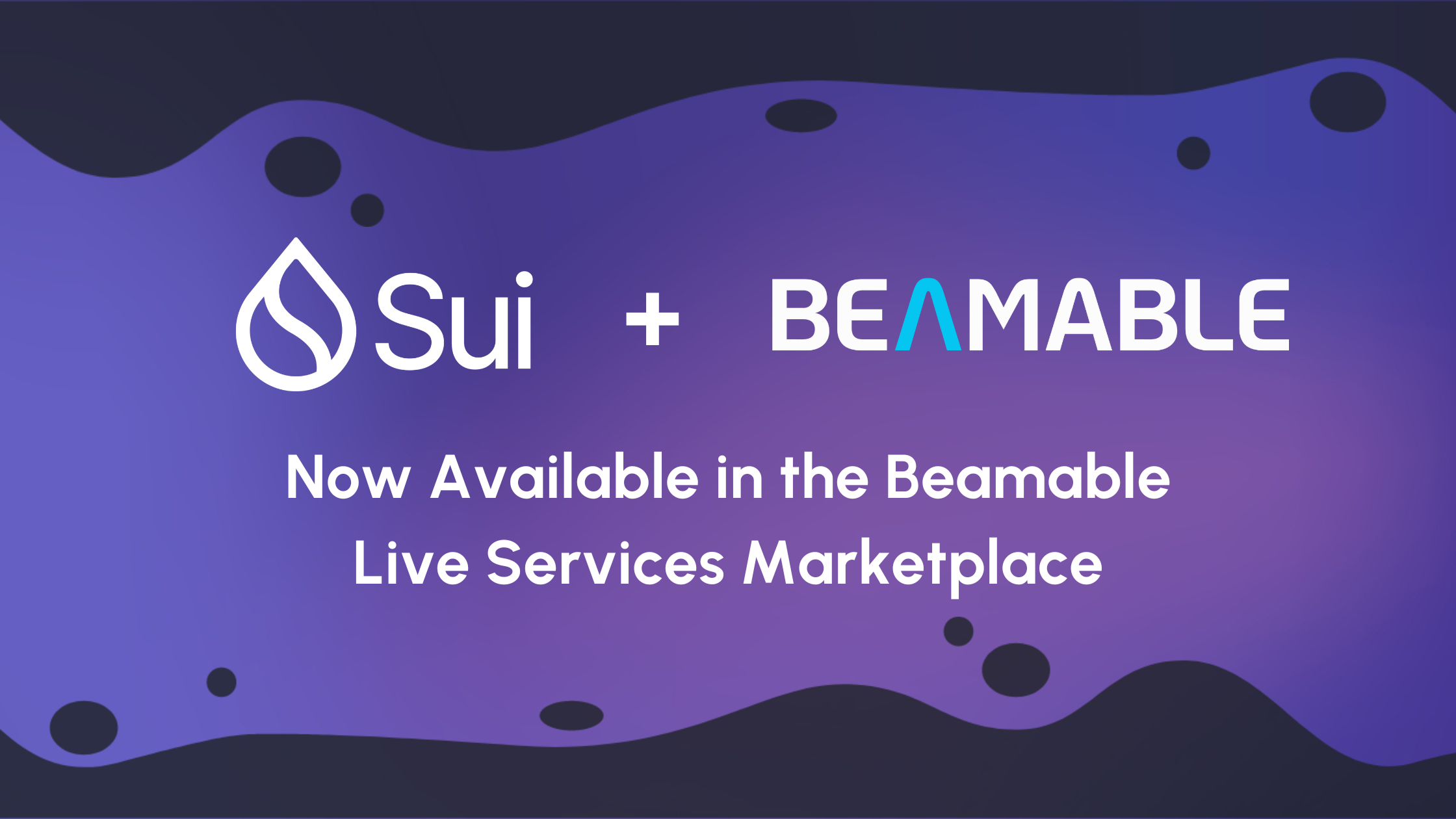
Beamable Support for Sui Blockchain Now Available
Beamable now has full Sui integration available in our Live Services Marketplace!
Sui from Mysten Labs is an increasingly popular choice for building Web3 games. Its object-based architecture, support for dynamic and nested assets, helpful features like sponsored transactions, consistent performance, and low cost make it a powerful platform for game developers.
Video Overview
To get started, download the Beamable/Sui sample project from the Beamable GitHub repo. It contains instructions for setting up a Beamable project with a microservice that handles communication with the Sui Blockchain.
When you launch the Sui / Beamable microservice, Beamable will auto-generate a smart contract from the Beamable content system and auto-deploy it so you can quickly build on-chain items and currencies for your games.
With Beamable and Sui, you now have a powerful set of tools for rapidly building out a Web3 game using both on-chain and off-chain assets directly in your game engine.
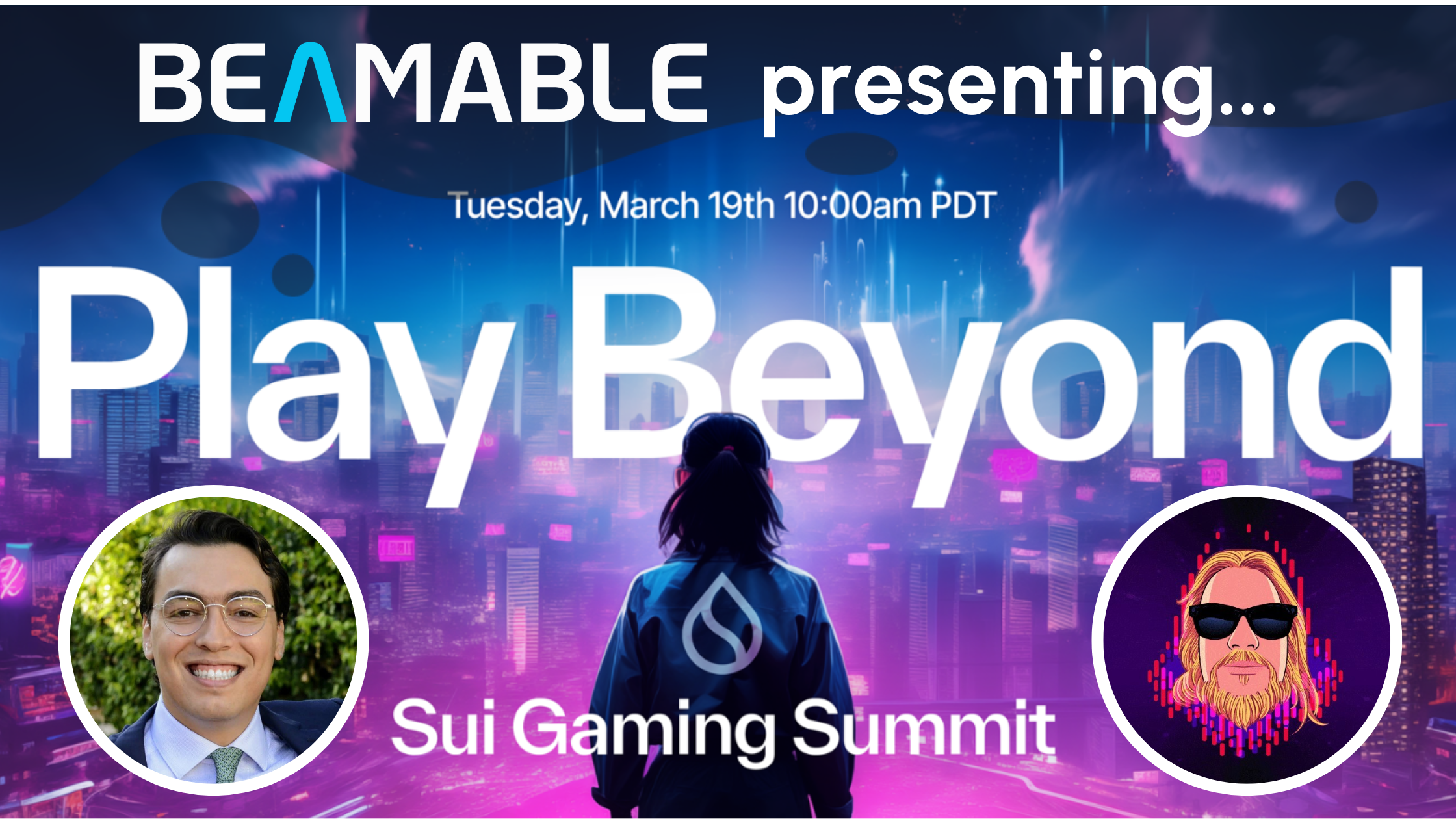
Beamable Presenting at Play Beyond Sui Gaming Summit
Join Beamable’s CEO John Radoff and CTO Ali El Rhermoul for presentations during GDC 2024 at the Sui Gaming Summit!
Beamable + Sui Workshop
From 1:10 – 1:50 PM PT on March 19th, Beamable CTO Ali El Rhermoul will demonstrate how you can use Beamable’s Sui integration to rapidly add on-chain assets to any game project. To be ready for the workshop, make sure you have the technical pre-requisites ready to go:
- Register for a Beamable account: https://portal.beamable.com
- Install Unity 2022 LTS: https://unity.com/releases/editor/qa/lts-releases
- Download and Install Beamable: https://docs.beamable.com/docs/installing-beamable
- Install Docker: https://docker.com
- Clone Beamable Sui GitHub sample project: https://github.com/beamable/sui-example-unity
Jon Radoff on the Main Stage
Right after Ali’s workshop, from 1:50 – 2:15 PM PT on March 19th, CEO of Beamable Jon Radoff will join a number of game leaders in a panel format to discuss the ever-evolving landscape of Web3 games and trends. Panelists include:
- Canaan Linder, CEO, Stardust
- Jon Radoff, CEO, Beamable
- Yan Li, Founding Engineer, Blockus
- Chris Zhu, CEO, Mirror World
- Moderated by Di Pearson, Gaming Strategic Partnerships, Mysten Labs
RSVP Now!
If you want to attend these events and others, please RSVP for the Sui Gaming Summit now!
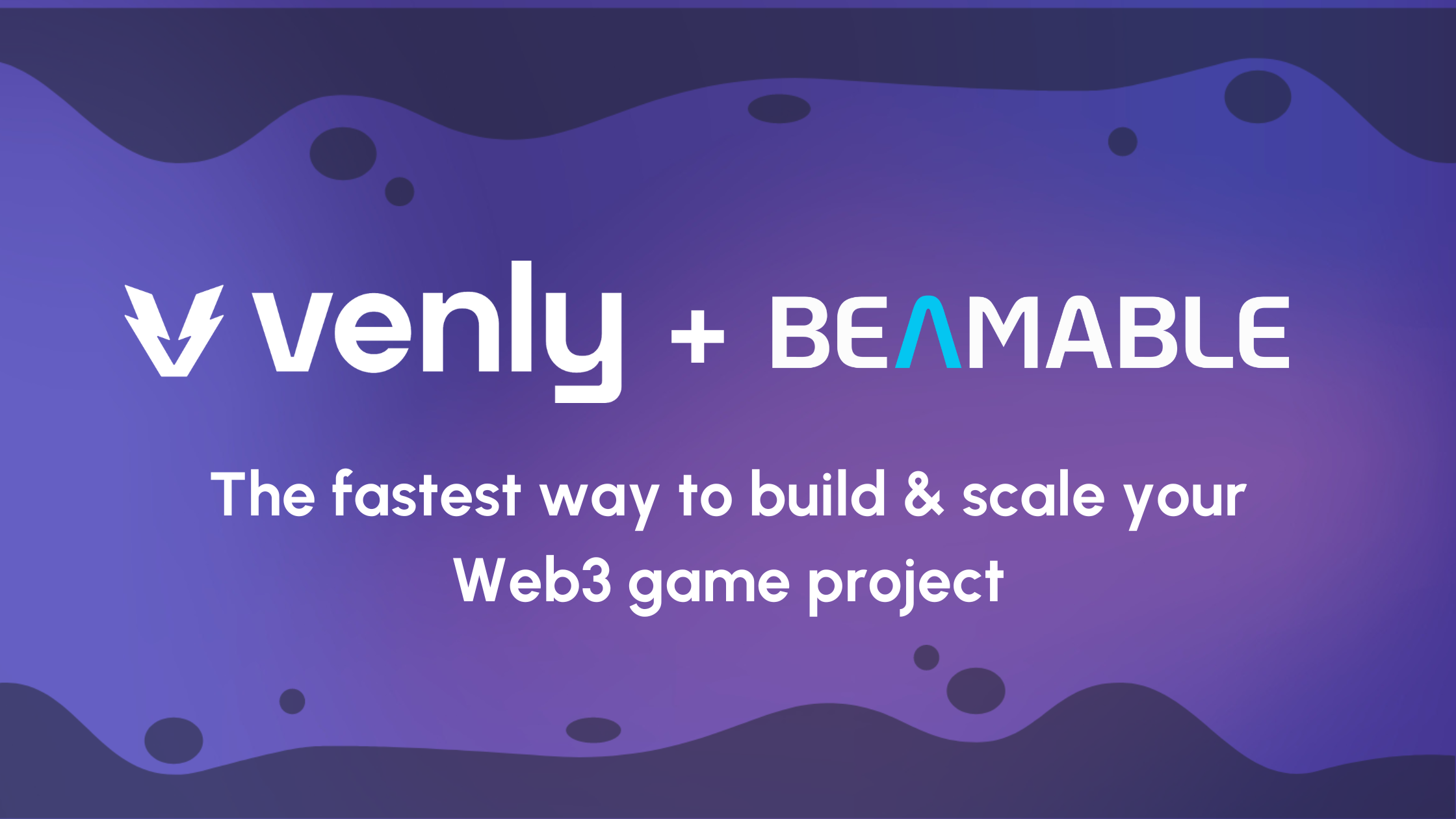
Venly Now Available in the Beamable Live Services Marketplace
Venly Integration is now available in the Beamable Live Marketplace! Download the Beamable/Venly sample project from the Beamable GitHub repo. It has instructions for how to set up a Beamable project with a microservice that handles communication with Venly.
Overview of the Integration
What’s Included?
- A sample project that demonstrates frictionless wallet generation and inventory integrations
- Custodial wallet workflows for player onboarding
- The ability to define on-chain currencies and items and manipulate them in the Beamable LiveOps Portal
- Multi-Chain support for Arbitrum, Aeternity, Avalanche, Bitcoin, Binance, Ethereum, Gochain, Hedera, Litecoin, Tron, Vechain, Polygon, Neo, and Immutable.

Beamable GDC 2024 Announcements
GDC is a time for game developers to come together, celebrate the good moments, mourn the bad ones, and look forward to exciting new technologies in the year to come. The folks at Beamable are eager to share what we’ve been working on. GDC is the perfect time to pause, breathe, and showcase some of the incredible projects we’re getting ready to release into the hands of game developers. Beamable is becoming the open platform for game server development.
We are thrilled to announce:
- Beamable is open to new engines.
- Beamable is open to third-party developers.
- Beamable is open to scrutiny.
Watch the Video Announcement!
Briefly and for the uninitiated, Beamable is a game tools company specializing in reusable and extendable server technologies. Beamable was founded by developers who built, deployed, and managed Live Ops games with over 20 million players. Now, that same technology is empowering hundreds of studios across the globe to build their own successful Live Ops games.
One of the best things that elevates Beamable above the rest is customizable Microservices. We can and do provide a laundry list of ready-made features like frictionless auth, accounts, leaderboards, inventory, events, analytics, social, and commerce features. Those off-the-shelf features work for some games, but inevitably, there are game studios with unique ideas and innovative visions for new ways to adopt Live Ops. No pre-made solution exists that will fit every creative mind’s needs. Beamable allows game developers to create their own customized Microservices that seamlessly plug into the great Beamable architecture and ecosystem, but also unlock developers to do what they do best: develop.
Bring your Game Engine
When Beamable started, we only offered a C# Unity SDK. Throughout 2023, we’ve been working on building a C++ and Blueprint Unreal SDK. By the way, the Unreal SDK is available in Beta, and developers like Playful Studios are building games with it right now. Our official Online Subsystem plugin for Unreal is in early development as well. The Unreal SDK was our opportunity to go from one SDK to many SDKs and from one language (C#) to many languages (C# and C++). Now, the architectural patterns that facilitated our “one to many” journey also make it easy to bring Beamable to new C# based engines like Godot or Monogame, as well as non-C# based engines such as Bevy (Rust), Phaser (Javascript), or custom engines. You should take a look at our Bevy sample project, which integrates a custom Microservice with OpenAI.
Beamable is becoming engine agnostic thanks to our reliance on the Open API 3.0 specification. When you build a Microservice with Beamable, it automatically builds an Open API document. That document can be given to off-the-shelf open-source tooling that generates SDK code in whatever language you need, such as C#, Rust, or Javascript. Beamable’s own services also publish Open API documents, so you can generate bindings to the core Beamable capabilities like Auth, Accounts, and Content. We actually use the Open API documents generated from our own servers to generate the core C# SDK code we ship inside Unity and the core C++ code we ship with the Unreal SDK.
We also built a Command Line Tool (CLI) that makes it easy for developers to manage their Microservices, Content, and other Beamable systems. Within Beamable, we have been refactoring most of the core functionality from the Unity Editor SDK into the CLI. Then, the Unity Editor SDK communicates with the CLI behind the scenes. Our Unreal SDK can also utilize the CLI tooling, which means we can move twice as fast, delivering new Beamable tooling across our engine ecosystem. Our goal is to build engine integrations that feel native to each engine environment, but under the hood, are simple wrappers over our CLI. We can focus more on delivering an idiomatic workflow, and less on boilerplate.
Bring your Plugins
Beamable is becoming much more than an SDK, an API, and an administration website. The ability to write custom Microservices and have them automatically hosted on the cloud means Beamable is the perfect environment to foster interoperability and nurture an ecosystem of third-party plugins and tools for game development. The Beamable Marketplace is a collection of certified modules that extend Beamable and connect it to third-party systems.
Some marketplace integrations like our Scenario AI module work by having a Microservice act as the secure middle-man between players of your game and third parties. Other integrations use Microservices to take ownership of specific game tasks, like Inventory management. Beamable is offering a workshop at GDC ‘24 to teach developers how to integrate blockchain technology like Mysten Labs’ SUI as the source of truth for player Inventory. Simplifying for the sake of brevity, Beamable’s own Inventory service will grant custody of the inventory logic to a custom Microservice, which can proxy the custody to a variety of blockchains, like Polygon, Solana, SUI, and more. Studios like Great Big Beautiful Tomorrow are using this technology right now to deliver fun games that rely on blockchain technology behind the scenes.
Beamable offers more types of this service level federation, including authentication and matchmaking capabilities. For example, you can pull in a ready-made Microservice that connects Beamable’s own Matchmaking functionality with Hathora’s powerful server orchestration API. When a Beamable match is about to begin, the Microservice spins up a dedicated game server using Hathora and then connects all the players to the fresh server.
The marketplace is a great starting point to see what is possible with Beamable Microservices, but you can already build cool stuff on your own. Companies like Go4Gold are integrating custom authentication solutions into their games by using Beamable’s authentication federation. Beamable offers out-of-the-box authentication with Google, Apple, custom email, etc, but we don’t have SMS authentication by default. Go4Gold used the Twilio API and Beamable Microservices to securely bring SMS based authentication to their project.
Bring your Scrutiny
We recently released a public API status page so you can keep track of our uptime and stability. Beamable receives hundreds of millions of API requests per day. Those requests come from over a million monthly active users across over 100 games built on Beamable. We know our API is critical infrastructure for our developer community, and we are dedicated to being accountable for our uptime and stability.
The Beamable client-side SDK is now Source Available on GitHub with a non-permissive license. That includes the Unity SDK, the Unreal SDK, the Microservices code, and our CLI tool. We aim to meet our developer community wherever they work and make it easier for developers to interact with and learn from our SDK code. We’ve opened up Github Issues and Github Discussions on the main C# repository that holds the CLI, and we look forward to engaging with the community. Additionally, GitHub will serve as a new way to get the Unity SDK, including specialized preview builds, into Unity using Unity Package Manager.
If you’ve read this far, I applaud your sense of focus in today’s fast-paced world. As a prize, you can try out our CLI here, get it running in Bevy, or just skip that part and play the sample game.
Have a good GDC, folks!

New Beamable Pricing Discounts
Beamable now offers upfront payment discounts for our customers
Beamable has always operated a flexible pay-as-you-go usage-based monthly subscription model for our game developers. Recently, we’ve had requests from our customers for quarterly, biannual, and annual payment options.
In exchange for executing a payment plan, we are happy to provide additional discounts, giving you even more ways to save with Beamable.
Beamable customers will now have the option to pre-pay their subscriptions, enterprise contracts, private cloud licenses, and services agreements in three-month, six-month, and 12-month terms and receive a discount for doing so.
The discounts are available as follows (Updated January 2025):
- 3-month payment on fees – 4% discount
- 6-month payment on fees – 6% discount
- 12-month payment on fees – 8% discount
This discount will apply to the amount that is pre-paid. Any monthly overages are assessed at the subscription or enterprise contract value and are not included in the pre-pay discount.
Contact us or reach out to your Beamable customer success representative to discuss a pre-payment discount option and receive a copy of the pre-payment contract for your review.
At Beamable, we want to make managing your development, game, and game business as easy and cost-effective as possible. We hope that partnering with you to simplify payments and provide predictability is a win-win for both of us.
You can refer to this new pre-payment option in our Beamable License Agreement. Please Contact Us if you have any questions or if you’d like to move your monthly payments to a quarterly, biannual, or annual option in exchange for the discounts.

Beamable January 2024 Portal Update
This month, we released a significant upgrade to the Beamable LiveOps Portal. Please review the list of changes, and if you have any questions, please reach out on our Discord server or at support@beamable.com!
Release notes
Bug Fixes
- Player calendar activity appeared one day too early
- Downloading Content from the Portal did not always download the correct data
- Event Calendar view white text on yellow bar background was hard to read
- Player Inventory items with lots used to overflow now feature a scrollbar.
- Player Inventory view sorted by items had no effect.
- Analytics data query resulted in an error when the event name contained a hyphen
- Game Tree > Config Defaults context menu was incorrectly placing the customer alias in the CID field
- Downloading analytics data would not always work
- Player Profile Location badges would duplicate when switching pages
- In-Game Mail: sometimes, the currency list only showed coins and gems even when custom currencies exist
- Rendering of act_time timestamp value in Portal Analytics view was incorrect
- Clicking on the realm id in the game tree didn’t take you to the realm section
- Promoting Microservices or Redeploying them in the portal could cause a loss of data in the manifest (e.g., federated components)
Improvements
- Added showing realm alias (if available) API usage dashboard
- Added support for manual entry of date times (without needing date picker)
- Added date-range presets for convenience in specifying date range (e.g. “last 30 days”)
- Added support for hiding archived C# Microservices
- Added additional configuration options to Leaderboard creation
- Added server pagination support to Leaderboards
- Added support for re-ordering items in Commerce Catalog
- Better error message when supplying an invalid CID at login
- Better JSON Visualization and Editing
- Better visual language for disabled or archived C#MS (gray rather than red)
- Faster loading of analytics dashboard
- Faster history service querying in analytics and other sections
- Archived realms show PID
- MongoDB health metrics request uses “Zulu” timestamps
- Admin navbar section is now expanded by default
- API usage dashboard omits non-billable calls
- No longer possible to archive a realm if you have microservices running in the realm

Beamable 2023 Year In Review
2023 was a transformative year for Beamable. We launched new products, expanded our team, added features, and forged numerous new partnerships. Here is a look back at the key milestones that created value for game studios as they tackled the complex problems of building a game, launching it, scaling it, and building a commercially sustainable game business.
2023 Milestones
- Launched Beamable Private Cloud
- Introduced Co-Development & Implementation Services
- Won an Epic MegaGrant to launch the Beamable Unreal SDK
- Introduced the Beamable Live Services Marketplace
- Built Web3 Support for Solana, Polygon, Venly, ZBD, Sui/Mysten, and more!
- Won the GameChanger Award
- Named an AWS for Games Backend Service Partner
- Listed in the AWS Marketplace
- Completed hundreds of service improvements!
Read on for the specifics!
Beamable Private Cloud

We heard from larger game studios that they wanted all the power of Beamable, but with the ability to run it on their own cloud account with a source code license to extend or change whatever they needed.
Beamable Private Cloud (BPC) is just that. It allows developers to fork a complete version of the Beamable environment and launch it on their own infrastructure. With BPC, you get all of the simplicity, workflow advantages, and acceleration that Beamable brings to your game development – with the comfort of operating within your own environment and tweaking things however you need. You can learn more about BPC and see if it fits your needs!
Beamable Co-Dev & Implementation Services
In 2023, we repeatedly heard from our customers that they need Beamable’s technology and want someone on their team who has lived, breathed, and survived the complexity of backend game development. They asked us if we could dive into their code and help them take full advantage of the workflow, tooling, and microservices architecture to expand their game title. For that, we created a new co-dev and implementation services capability inside of Beamable to do just that!
Maybe you want Beamable Private Cloud but don’t have a DevOps team to support and maintain it. Maybe you need a custom game feature. Maybe you want to add Web3 to your game. With Beamable’s Co-Development and Implementation services, you can hire Beamable engineers on a monthly retainer basis to implement/build/integrate anything you need to move your game project forward.
If you could use experienced backend game engineers on your team, contact us, and let’s discuss your project!
Epic MegaGrant Recipient & SDK Launch

Late in 2022, we received an Epic Mega Grant, and by March 2023, we launched the first version of Beamable support for Unreal Engine! Game developers had been asking us for Unreal support, and we delivered.
Throughout 2023, we worked with dozens of Unreal game studios, refining the offering with additional support on integrations, microservices, content, and current Unreal versions. Unreal is now a major part of Beamable, thanks to the support from Epic, the Megagrants program, and our collaborative Unreal game studio partners. Get started with Beamable & Unreal with your own games today!
Live Services Marketplace

Back in March 2023, our CEO, Jon Radoff, laid out a mission for the marketplace:
“Our vision is to accomplish for the cloud what Unity and Unreal accomplished with the front-end of game development. To do so, we had to create more than a place to download files: we had to create the software interfaces to compose backend gaming software in the cloud–and to interoperate with each other.”
– Jon Radoff, CEO, Beamable
Since then, we’ve added almost two dozen partners to the Beamable Live Services Marketplace. Those partners include:
Available Today
- Amplitude integration to pipeline your game analytics to your Amplitude account
- GoPlay.io for fitness-based gameplay accounts
- Mixpanel integration to pipeline stats to your Mixpanel account
- Photon support to add multiplayer to your game
- Polygon integration for rapid Web3 game development
- Scenario.gg support to pipeline runtime generated AI game content
- Solana integration for rapid Web3 game development
- Zebedee for rapidly adding Bitcoin payment support to your game
- Zenject support for easy setup and config of an injection system
Coming Soon
- Common Sense Machines to rapidly pipeline AI assets into your game
- Croquet to offer synchronized multiplayer at scale
- Halliday for ERC-433 Smart accounts and easy Web3 onboarding
- Hathora to manage dedicated servers for multiplayer
- Hero Trainer to add a fitness component to your game projects
- Lamina1 for easy Web3 game development
- Mysten/Sui integration for easy Web3 game development
- Tashi.gg to add dedicated game servers with the simplicity of P2P
- Thirdwave Labs for implementing deep, rich wallet analytics
- Venly support to integrate custodial wallets and authentication across a dozen blockchains
Are you talking to game developers? Join our marketplace, and let’s work together to make it easier for game teams to adopt cutting-edge technology and reduce the glue code it takes to add game server features! Let’s talk!
Web3 Support

In 2023, Beamable built its name as the leading game backend platform in the market, executing against the complexity and challenges of Web3 for game developers. We heard loud and clear that game devs don’t want to learn blockchain, but they do want to use that technology in their games to enable new forms of player engagement, interaction, and novel forms of monetization.
Throughout 2023, we forged key partnerships in Web3, as well as invested in cutting-edge integration and tools to bring the key needs of LiveOps to Web3 game studios. Some of these announcements included:
- In March 2023, we released support for Solana
- Soon after we launched support for Polygon
- Both of those demonstrate how Beamable works with Web3
- We started working with Recur to streamline dev onboarding (now defunct)
- We worked with ZBD to add bitcoin payments to games
- We announced selection by Web3 game publisher Mythical to be their infrastructure provider
- We secured a grant from the Sui Foundation to build integration
- We will announce Venly support shortly!
- On the co-dev side, we are deeply involved with Mystery Society, pioneering new gameplay in this Web3 project!
If you are interested in learning more about our Web3 capabilities, have a project you might want implementation support on, or are a Web3 chain looking to streamline your developer onboarding, please reach out!
Winning the GameChanger Award

It is always an honor to be nominated by your peers and to be selected from thousands of companies as one that is pioneering how games are made.
Winning the Game Changers 2024 award from Lightspeed and GamesBeat was a supreme honor. We will continue pushing the envelope this year, making it easier for game developers to build successful games.
If you believe we could help your studio, please contact us!
Being named an AWS for Games Partner

Ever since joining the ISV Accelerate program for AWS Games in 2021, Amazon has been a key partner for Beamable. We work together on many accounts and have partnered on several key projects.
As Amazon was sunsetting Gamesparks 2.0 this year, they selected Beamable as one of three named game backend solution partners. It was an honor to have our hard work over the years validated, and we look forward to a continued partnership with AWS for Games in 2024!
AWS Marketplace Listing
As a game backend solution partner for AWS, we continued to invest in the partnership by re-listing Beamable’s Live Game Platform on the AWS Marketplace. If you are an AWS customer and have an AWS Enterprise Discount Plan (EDP), your Beamable spend will not qualify as part of that plan spent amount.
Additionally, purchasing Beamable off AWS Marketplace streamlines the contracting process. If you want to purchase Beamable via AWS, please contact us to learn more or go check out our listing!
Hundreds of service improvements
In addition to all the work above, we spent the year listening to our customers and making many material improvements in our SDKs, backend, reliability, performance, and features.
We can’t possibly list them all here! You can review the Beamable Release Notes starting at version 1.10 and then scroll up to 1.19 and beyond!
Thank you!
A special thanks to all of our amazing customers who kept us honest this year, demanded the best, and pushed us to build a better product that makes an real impact in their game development lives.
Cheers to 2023! We look forward to working with you all in 2024!

Where in the world is Beamable CEO Jon Radoff?
As we enter 2024, Beamable will attend several conferences this year. If you are a customer, a game studio, or an indie game developer looking to learn more about how Beamable might help your game team or project, reach out, and let’s schedule a time to talk somewhere in the world!
Beamable will be at these conferences. Will you? Let’s meet up!
MetaV Summit – Dubai, UAE
January 10-11, 2024
https://metavsummit.com/
DICE – Las Vegas, NV
February 13-15, 2024
https://www.dicesummit.org/
LEAP – Riyadh, Saudi Arabia
March 4-7, 2024
https://onegiantleap.com/
SXSW – Austin, TX
March 8-16, 2024
https://www.sxsw.com/
GDC – San Francisco, CA
March 18-22, 2024
https://gdconf.com/
Reboot – Dubrovnik, Croatia
April 24-26, 2024
https://rebootdevelop.com/
Digital Dragons – Krakow, Poland
May 19-21, 2024
https://digitaldragons.pl/en/
GamesBeat – Los Angeles, CA
May TBD, 2024
https://gbs24.venturebeat.com/
DevCOM – Cologne, Germany
August 18-20, 2024
https://www.devcom.global/
GamesCOM – Cologne, Germany
August 21-24, 2024
https://b2b.gamescom.global/gamescom/the-gamescom/
We look forward to seeing you out there! Contact us to schedule a time to meet up!

Are you going to SLUSH? Party with Beamable and ZBD!
We recently announced a partnership with ZBD to provide an onboarding path for rapid Bitcoin payment inclusion in your LiveOps-capable game titles. Now, we are hosting a party at SLUSH in Helsinki, Finland!
Get all of the details on our Eventbrite page now!
2023 has been a challenging year for the game industry and Web3 games in general. That hasn’t stopped companies like ZBD and Beamable from designing, iterating, and building the tools essential for the next phase of game studio growth.
We’re thrilled to announce a collaborative event with ZBD at Slush. Our partnership is especially beneficial for game creators seeking to bypass the complexities of building their own back-end infrastructure and rapidly integrate seamless and secure payments for all!
This exclusive, invite-only gathering is an opportunity to showcase Beamable and ZBD’s latest developments, unique insights, and forward-thinking strategies. More than just a formal event, it’s a chance to unwind and network in one of Helsinki’s premier modern dining venues.
Join us for an enjoyable evening, reconnect with peers, and learn how Beamable and ZBD can help your team in 2024 and beyond!

ZBD and Beamable Launch a Joint Starter Kit for Simple and Secure Bitcoin Integration for Game Developers
We are excited to work with ZBD to offer game developers a turnkey solution for Bitcoin integration into LiveOps tools! Check out the press release below and our ZBD marketplace page to grab the integration!
HOBOKEN, NJ – 14 NOVEMBER, 2023 ZBD, a leading fintech company that offers instant Bitcoin rewards for gamers and developers, has announced the launch of the ZBD Beamable starter kit for small development teams and hypercasual developers. This announcement is the latest phase of its partnership with Beamable, a development platform for online games, to simplify the secure integration of Bitcoin transactions into gaming.
ZBD’s plug-and-play API is a cost-effective, global payment solution built on the Bitcoin Lightning Network that makes it easy for developers to incorporate real-time microtransactions, rewards, and payments into their games. With the ZBD Beamable starter kit, the integration of Beamable with ZBD’s API adds an additional layer of security by keeping sensitive information separate from the client-side of the game.
Christian Moss, ZBD Co-founder and Head of Gaming R&D, comments:
“Developing a secure game requires removing some of the logic from the game to the game server. Many developers, however, such as hypercasual mobile game developers, may not have the resources to develop and maintain a game server. Beamable provides these developers with server-like capabilities without the need for a server or any extra skills in addition to their existing game development skills. By integrating the ZBD API into a Beamable microservice, we’ve enabled developers to start building Bitcoin reward games in a secure way.”
Jon Radoff, CEO of Beamable, comments:
“Our aim has always been to lower the barrier to entry for developers and make it more cost-effective for them to add complex and secure server-side Bitcoin features. Working with ZBD not only makes the implementation of in-game transactions easier than ever, but also adds an all-important extra layer of security.”
Announced in July 2023, the collaboration between the two companies heralded a significant step in the development of the next generation of Bitcoin-integrated gaming, removing the need for a server or systems operations team and enabling developers to integrate server-side features to games while ensuring superior security.
The first Bitcoin-integrated mobile game to be built with the ZBD Beamable starter kit is due to be published in late November.
The ZBD Beamable starter kit is available now on the Beamable marketplace: https://beamable.com/marketplace/zebedee-plug-and-play-api.
For further information:
Raptor PR for ZBD
Clare Wimalasundera / Priyanka Harsora
clare@raptorpr.com / priyanka@raptorpr.com
+44(0) 07581277125 / +44(0)7939 927 615
About ZBD
ZBD is the leading FinTech building payments technology on top of the Bitcoin Lightning Network. Backed by global VCs and gaming studios including Initial Capital, Lakestar, Kingsway Capital, The Raine Group and Square Enix, its sophisticated tools enable developers to easily integrate payments functionality into their products. ZBD erases the boundaries between real and virtual worlds by powering instant global transactions of any size for any game, site or application through the Bitcoin Lightning Network. Learn more about ZBD and the benefits it brings to developers and gamers alike at zebedee.io.
About Beamable
Beamable provides a robust platform for building and scaling the operations of live games, offering both Software-as-a-Service (SaaS) and Private Cloud deployment options. Integrated seamlessly with Unity and Unreal game engines, Beamable allows game developers to focus on creativity while leveraging a comprehensive suite of backend services. With a team of industry veterans and cutting-edge technology, Beamable is headquartered in Boston and has received substantial investment from prominent firms, including Permit Ventures, Companyon Ventures, GrandBanks Capital, and Defy.vc. For more information, visit beamable.com

Beamable Featured by AWS for Games as a Game Backend Solution Provider
Beamable, a leading platform for game development and live operations, is pleased to announce that it has been featured by AWS for Games, as one of its featured game backend solutions.
As the world’s most comprehensive and broadly adopted cloud, Amazon Web Services, Inc. (AWS) has been at the forefront of enabling innovation across industries. AWS for Games is committed to providing game developers with the tools, resources, and infrastructure they need to succeed, and by featuring Beamable as one of its featured games backend solutions, AWS for Games has further solidified this commitment.
By building on AWS, Beamable is able to offer a platform that offers a comprehensive suite of features that streamline game development, deployment, and live operations. By leveraging AWS, Beamable enables game developers to gain accelerated access to powerful infrastructure, robust scalability, and a multitude of tools and services to launch faster and scale while saving time and money.
“We are honored to be chosen as a featured game backend solution by AWS for Games,” said Jon Radoff, CEO at Beamable. “This designation signifies our shared commitment to advancing the gaming industry by providing developers with best-in-class tools and services. We look forward to working closely with AWS to empower game developers worldwide.”
About Beamable
Beamable is an open, extensible game server platform that lets you create online games and virtual worlds in minutes. Rapidly add player auth, analytics, social, commerce, inventory, content management, meta-game features, GenAI, Web3 capabilities, and more to any game project. Prototype in minutes using engine-integrated workflows and scale to millions of players. Led by a team of game-industry and software veterans, Beamable is based in the Boston area, and has raised $14M from investors, including Permit Ventures, Companyon Ventures, GrandBanks Capital, and Defy.vc.

Beamable Selected as a 2024 GameChanger
Beamable has been named a 2024 GameChanger by Lightspeed and GamesBeat.
In August 2023, over one thousand companies were nominated across five categories:
- Game Studios
- Gaming Platforms
- Interactive technology
- Extended Reality
- Blockchain & Web3
Beamable was nominated for the Gaming Platforms category and was selected along with 24 other innovative companies. Check out the full list of companies here.
Beamable CEO Jon Radoff was at the GamesBeat award event and shared the news on Twitter.

The announcement was also featured in Times Square!

We are honored to be recognized for the hard work of our team and the partnership of our customers, building and iterating on efficient game development workflows in Unity and Unreal. We are also thankful to our growing list of marketplace partners who enable rapid SDK connections to cutting-edge technologies like GenAI and Web3!
If you believe we could help your studio, please reach out!
Other links about the announcement:

AWS for Games Partner Profile: Beamable
In October of 2023, Beamable was featured on the AWS for Games Partner Profile series. Our CEO Jon Radoff was interviewed by AWS’s Principal Evangelist Chris Melissinos. You can watch the partner profile on YouTube.
In the video, Jon runs through how Beamable started, the importance of LiveOps, reducing complexity in game development, Beamable features, out to get started, our customers, the website, and some takeaways!
Get started with Beamable for free today! Take it for a test drive and let us know about your project.

GO4 Gold and Beamable Announce Partnership
Beamable and GO4 Gold announced how Beamable’s capabilities will power GO4 Gold’s next-generation marketing platform. You can read the entire press release for details.
ORLANDO, FLORIDA, USA, October 10, 2023 /EINPresswire.com/ — GO4 Gold™ is excited to announce a strategic partnership with Beamable, a live game operations company from Boston, to power the first performance-based gamification platform. Beamable’s technology will enable GO4 to host millions of consumers playing hundreds of popular games in sponsored prize tournaments.
“With 3 billion hours of gameplay on a weekly basis, advertisers and brands have desired to reach gamers in a meaningful and efficient way,” said Milind Bharvirkar, CEO of GO4 Gold. “Conventional tools have not worked. Our partnership with Beamable has created a revolutionary new marketing platform that gamifies brand promotions, engages qualified consumers, and delivers measurable results without breaking the bank for any size business.”
“GO4 is going to shake up the gamification landscape and we’re thrilled to be a part of it,” adds Jon Radoff, CEO of Beamable. “Our team resonates with GO4’s passion for connecting players and brands in a really cool way, and appreciates the trust in our services to make this happen.”

Beamable Chosen by Mythical Games to Power Live Ops Infrastructure
Beamable platform enables accelerated development, cost savings, and scalable blockchain-compatible infrastructure for game publishing operations.
Boston, MA — Beamable, the leader in backend services for software built with 3D engines, proudly announces its partnership with next-generation gaming technology studio Mythical Games, the leader in games with player-owned economies.
Mythical’s newly released game NFL Rivals recently debuted at the top of the mobile gaming charts and has since accumulated over 2 million downloads and 20 million games played.
“Mythical saw value in leveraging Beamable to help us extend the capabilities of our existing Game delivery and Marketplace Platform, optimizing developer integration and supporting the increasing traffic across all of our games,” said Brett Close, CTO at Mythical Games. “Beamable’s tools framework and scalability made it the right platform partner for us.”
By choosing Beamable, Mythical Games will be able to further streamline its development process, eliminate the need for extensive in-house infrastructure development, and continue to scale its backend for publishing operations, enabling it to focus on creating more amazing, chart-topping games.
Beamable’s Private Cloud service will support Mythical Games’ game development ecosystem. This includes utilizing Beamable’s cloud-native execution environment, a resilient data fabric for persistent worlds, and adding extensible tools and services that operate alongside Mythical’s blockchain games platform.
“We are thrilled to be selected by Mythical Games to support their Live Ops and backend infrastructure,” said Jon Radoff, CEO of Beamable. “Mythical’s vision of advancing player-owned economies is revolutionary, and we’re excited to support the teams at Mythical in bringing online games to market faster than ever.”
For more information about Beamable and its backend services, visit https://beamable.com.
About Beamable
Beamable provides a robust platform for building and scaling the operations of live games, offering both Software-as-a-Service (SaaS) and Private Cloud deployment options. Integrated seamlessly with Unity and Unreal game engines, Beamable allows game developers to focus on creativity while leveraging a comprehensive suite of backend services. With a team of industry veterans and cutting-edge technology, Beamable is headquartered in Boston and has received substantial investment from prominent firms, including Permit Ventures, Companyon Ventures, GrandBanks Capital, and Defy.vc. For more information, visit beamable.com.
About Mythical Games
Acknowledged by Forbes’ Disruptive Technology Companies To Watch in 2019 and Fast Company’s World Changing Ideas 2021, Mythical Games is a next-generation game company creating world-class games and empowering players to take ownership of their in-game assets through the use of blockchain technology.
Mythical’s “gamers-first” focus comes naturally; from the beginning, it’s been powered by industry leaders. The team has helped develop major franchises, including Call of Duty, World of Warcraft, Guitar Hero, DJ Hero, Madden, Marvel Strike Force, and Skylanders.
The Mythical Marketplace, the first in-game blockchain Marketplace on iOS and Android, provides gamers with ownership and control over the purchase and sale of digital assets, while the Mythical Platform protects gamers that may be new to blockchain through a custodial wallet for their digital items.

Beamable August 2023 Release Review
In August 2003, Beamable released SDK versions 1.17.1, 1.17.2, 1.17.3, and 1.18.0. Here are the highlights from those releases.
Command Line Interface (CLI)
We’ve spent a lot of effort this month focusing on making the CLI tooling easier to use. In the latest versions of Beamable, the CLI has several usability improvements.
- When you use the beam project new command, the new project will use the latest version of the Beamable SDK.
- Additionally, the correct version of the Beamable Templates are automatically installed.
- The CLI –log switch has been fixed.
- Many of the various beam project commands are more forgiving in their error cases, and prompt for corrective measures in error cases.
- Services have better default settings to streamline development.
- Archived realms are no longer shown when logging into the CLI.
- The CLI can also be used to manage Beamable Content.
- In Beamable 1.18.0, the CLI can manage all Beamable Content namespaces without needing to switch between them.
Microservice Improvements
Throughout the latest patches and releases of Beamable, Standalone Microservices have seen a few critical improvements.
- Standalone Microservices taking advantage of the federated identity or inventory features can now interoperate with Unity.
- Beamable Content defined in the Standalone Microservice’s common project is now usable from a linked Unity project.
- Additionally, developers using Apple Silicon, or other ARM-based CPU architectures, can now deploy their Standalone Microservices successfully.
There are a handful of other bug fixes and workflow improvements for Microservices in general.
- Log output will appear with fewer escaped JSON characters, which will make it easier for developers to leverage service logs.
- Generated client code for Microservices will use the object serialization technique instead of array serialization technique.
Beamable 1.18.0 also includes a new IUsageAPI service accessed via Dependency Injection. The IUsageAPI exposes CPU and Memory usage statistics and a unique identifier for each service instance.
Unity SDK
In Beamable 1.18.0, the BeamContext game object is the last thing to be disposed of when a Beam Context is being shutdown. Previously, there was a large swatch of bugs that would appear when exiting playmode, or using the .Stop() function on a Beam Context. The IBeamableDisposableOrder interface allows any registered Beamable dependency to declare a custom disposal priority. By default, the Beam Context uses a disposal priority to ensure it is handled last. This means that as other components of the Beamable SDK are shutting down, they have access to critical services available on the Beam Context.
Change Logs
For the official changelogs, please visit https://beamable.github.io/changes

Beamable July 2023 Release Review
Since the last release blog, Beamable has released SDK versions 1.16.1, 1.16.2, and 1.17.0. Here are the highlights from the previous month of releases.
Command Line Interface Improvements
In Beamable 1.16.2, we added the beam version command suite, which allows a developer to easily update and manage the installed CLI tool. In 1.17.0, we added the get connection string command, which will enable a developer to get a direct connection string to a Mongo storage object. Direct Mongo access can be critical to developer workflows. Additionally, in 1.17.0, new CLI projects will automatically include a version control file that helps avoid security leaks. The version control file can be re-generated using the generate ignore-file command. If you haven’t clicked on any of those links, check out this one about getting started with the Beam CLI.
Stability and Bug Fixes
The last three releases, especially 1.17.0, bring many quality-of-life improvements and bug fixes to the Unity SDK and CLI tools. A complete list can be found in the changelogs. In previous versions of the Beamable SDK, there were intermittent bugs when entering and exiting playmode quickly. The Federated Auth SDK had a few typing inconsistencies. All of these issues have been resolved.
Dotnet Compatibility
In Beamable 1.16.2, the Beam CLI added support for net7. In Beamable 1.17.0, the Beamable Common and UnityStubs nuget packages also support net7 and netstandard 2.0. Previously, Standalone Microservices couldn’t be used with Unity 2020 because the common project couldn’t be built for a Unity 2020-compatible Dotnet version. However, the inclusion of netstandard 2.0 allows Standalone Microservices to be used alongside Unity 2020, 2021, and 2022. We are continuing to extend Dotnet support for the rest of the Microservice code base. We are anticipating the release of net8 in November, and we are excited to bring full net7 support to Microservices in a future release.
Changelog
Full changelogs can be found at https://beamable.github.io/changes

Beamable June 2023 Release Review
In June, Beamable released SDK version 1.16.0, which includes support for Unity version 2022 LTS alongside a range of improvements. A few highlights from the month of June include:
Unity SDK Improvements
Beamable SDK 1.16.0 brings support for the latest Long Term Support (LTS) version. Unity 2022.3.0f1 LTS was released at the very end of May and is now fully supported by the Beamable SDK. Beamable is committed to supporting the latest three LTS versions. As such, Beamable 1.16.0 drops support for Unity 2019 LTS.
Besides that, we also added the ability to send gifts to players through Announcements, and fixed compilation bugs when using the `com.unity.mobile.notifcations` package.
Microservice Improvements
1.16.0 marks the introduction of the Scheduler API that allows for scheduling jobs for later execution. We’ll add support for managing scheduled jobs inside the LiveOps Portal, in an upcoming release.
Additionally, we also fixed an issue with Docker installations.
In recent versions, much of our focus has been given to the Standalone Microservices and CLI tools that allow you to interact with SAMS (Standalone Microservices). You can now create new Standalone Microservice projects, add additional microservices to a project using the `beam project add` command, or even create a new Beamable organization with `beam org new`.
Full changelogs can be found at https://beamable.github.io/changes

Beamable and Zebedee Simplify Bitcoin Integration
We are proud to announce a partnership with Zebedee in the Beamable Marketplace to simplify Bitcoin integration for game developers dramatically.
ZEBEDEE is a next-generation payments processor pioneering instant, low-fee, borderless and currency-agnostic microtransactions for the global digital era.
BEAMABLE allows game developers to integrate server-side features into their games without requiring extensive server-side development resources or knowledge and empowers them to effortlessly integrate server-side features into their games through a framework that can easily be imported into client-side game code.
Together, both companies can accelerate the development of the next generation of Bitcoin-integrated gaming by dramatically simplifying the process of integrating Bitcoin transactions into games by removing the need for a server or systems operations team.
Check out the full press release for more information.
Check out the Beamable Marketplace to learn more about Zebedee.
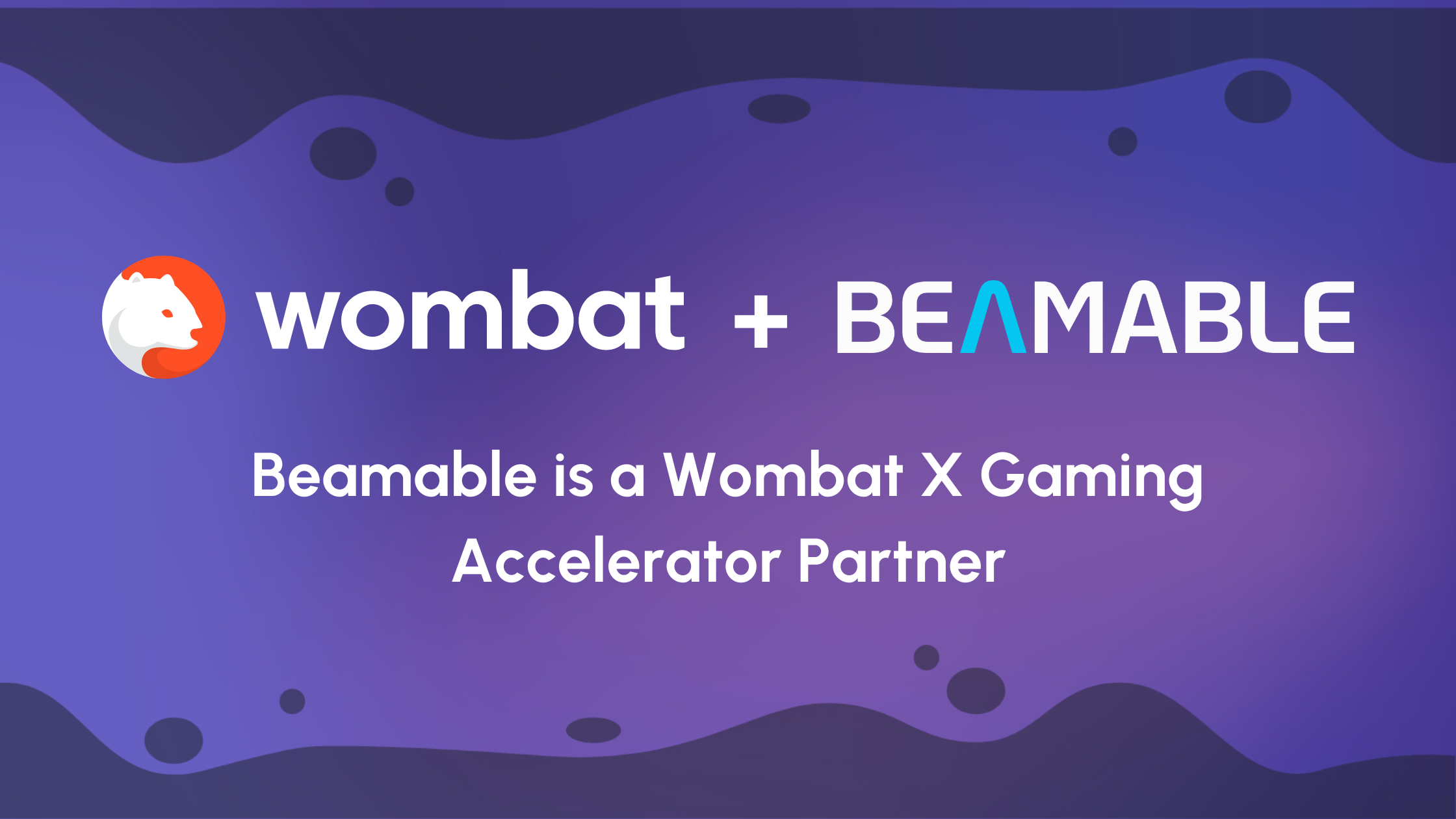
Beamable is a Wombat X Gaming Accelerator Partner
Spielworks is launching a Web3 gaming accelerator, Wombat X, to empower Web3 gaming projects. They are bringing together tools, education, and funding to help Web3 game developers accelerate their projects and grow their audiences by leveraging the Wombat ecosystem.
We are proud to be an initial partner in the Wombat X Accelerator ecosystem. At Beamable, we are committed to improving the workflow for game developers to implement meta-game systems and build out complex item economies that drive profound social and gameplay experiences. A partnership with Wombat X offers game projects the ability to take full early and discounted advantage of Beamable’s range of capabilities:
- Integrated player authentication with wallet capability
- A reactive game content system to propagate content changes across game clients
- An interoperable inventory later to manage both on-chain and off-chain assets.
- Unity and Unreal engine integration, along with advanced Cloud Code capabilities to build, extend, and integrate 3rd party game assets via the Beamable Live Services Marketplace.
You can learn more about how Beamable supports Web3 on our website.
If you have a Web3 project and want to take advantage of the Wombat X Accelerator program, head over to the website to learn more and sign up today!

Beamable April 2023 SDK Release Review
In April, Beamable released SDK versions 1.14.1, and 1.15.0. Here are the highlights from the previous month of releases.
Our changelogs can be found at https://beamable.github.io/changes
Microservice Performance
In Beamable 1.15.0, the Microservice performance has been dramatically improved for long-running services receiving game-level traffic in production environments.
Two major issues were addressed. Firstly, a multi-threaded access violation could occur during high-traffic periods in the deserialization pathway of a Microservice. The deserialization bug would cause seemingly random requests to fail for seemingly unknown reasons. Secondly, a running service’s max CPU utilization levels would periodically jump to 100% and stay there until a redeploy event. Microservices running at 100% CPU utilization cause extreme failure cases because there is no wiggle room for the service to process new requests.
The root cause of this error was traced to a bug during the secure websocket authorization process that happened when the remote Beamable host needed to reset the connection. Both of these issues have been fixed in 1.15.0 and result in a much more reliable deployed Microservice.
Standalone Microservices and Storage
We’ve been working towards an advanced workflow for Microservice and Microstorage.
Previously, Beamable Microservices were tied to the Unity development environment, which brought many challenges to developers. Microservices would compile in the same dotnet framework that Unity used. Using Nuget or recent dotnet features was not possible. Additionally, it was not possible to modify the .csproj or Dockerfile files that control the Microservice.
In Beamable 1.15.0, you can use Standalone Microservices. These allow you to create a Microservice in a separate dotnet solution. You can manage your own dependencies with Nuget, customize your .csproj to use advanced capabilities, and even modify the Dockerfile if you need to. Beamable has a command line interface tool called beam you can use to create and deploy standalone Microservices. You can run the Microservice directly from your IDE of choice or run it as a docker container to closely mirror the production environment. Microstorage is also available in this standalone format.
We are still developing these workflows, but you can check out the early documentation.
Sign up to give these and many more features a try today!
Also, check out our expanding marketplace of game server solutions!

Beamable March 2023 SDK Release Review
In March, Beamable released SDK versions 1.12.0, 1.13.0, and 1.14.0. Here are the highlights from the previous month of releases.
Our changelogs can be found at https://beamable.github.io/changes
Microservice Publish Window
In Beamable 1.14.0, we released a new Microservice Publish experience. You can read about it in our documentation. The new flow shows the publication status of each service and has a large banner explaining each step of the publishing process. We received lots of feedback that enabling and disabling services in the old flow was confusing, so we’ve re-hauled the experience for 1.14.0. Every time Microservices are published, every single Microservice is set to be “On” or “Off.” If the service is configured as “Off,” then the service will be turned off when the publication finishes.
Microservice Build Hooks
In Beamable 1.12.0, we introduced a way to run custom code before a Microservice is built. The primary use case was to facilitate a way for Microservices to copy custom files into the final runtime environment. You can read about building hooks in our documentation. At Beamable, we used this feature internally to develop the Polygon sample integration project. The project needed to copy the Solidity Compiler from the Unity project to the Microservice Docker build context and, finally, into the built Docker image. Build hooks can also be used to modify the Docker build context, run custom checks, or whatever else you can think of.
Config Defaults
In Beamable 1.12.0, we changed the behavior of the config-defaults.txt file. The file contained connection settings for a specific Beamable Realm. Previously, the Unity editor, Unity editor playmode, and the built Unity game would all reference the single realm in the config-defaults.txt file. In Beamable 1.12.0, the connection settings in config-defaults.txt only control the connection settings for the built Unity game. The Unity editor and playmode find their connection values elsewhere, controlled by a new file in Library/BeamableEditor. The config-defaults.txt file can be written to manually or by clicking the “Save Config Defaults” button on the account summary page.
Change Logs
Beamable 1.12.0, 1.13.0, and 1.14.0 also include a lot of bug fixes that you can review in our changelogs.

Beamable Unveils Live Services Marketplace
March 21, 2023 (San Francisco, CA) — Today, Beamable announces the Live Services Marketplace: the world’s first destination for game developers to create and share interoperable backend software that helps them build, grow and operate live games.
“Our vision is to accomplish for the cloud what Unity and Unreal accomplished with the front-end of game development,” said Jon Radoff, CEO of Beamable. “To do so, we had to create more than a place to download files: we had to create the software interfaces to compose backend gaming software in the cloud–and to interoperate with each other.”
The marketplace is built around components using the Beamable Live Services Marketplace SDK. This includes features such as:
- A cloud-native execution environment for running code that is maintainable, debuggable and automatically scalable
- A “data fabric” for representing the objects that exist in persistent worlds and online game economies
- A set of off-the-shelf methods for important use cases such as scheduling events and messaging campaigns.
The Live Services Marketplace is launching with support for a number of ready-to-use integrations, as well as announcements from partners who have announced forthcoming support. Included are examples for real-time interaction (Foundry, Photon), Generative AI (Scenario, Common Sense Machines, MobGames.ai), analytics forwarding (Amplitude, Mixpanel), blockchain (Solana, Polygon, Venly, Recur, Lamina1), and monetization (GoPlay.io).
To gain access to the Live Services Marketplace SDK or see the components already available, visit https://beamable.com/marketplace.
About Beamable
Beamable provides a platform for building and scaling the operations of live games, available as both a Software-as-a-Service (SaaS) version and a “bring your own infrastructure” Private Cloud deployment. The platform is tightly integrated with Unity and Unreal game engines, enabling game developers to focus on the creativity and differentiation of their products. Led by a team of game-industry and software veterans, Beamable is based in the Boston area, and has raised $14M from investors including Permit Ventures, Companyon Ventures, GrandBanks Capital and Defy.vc. For more information, visit beamable.com.

Beamable Announces Polygon Support & Investment
Today, Beamable is announcing support for Polygon developers. In addition, we’re pleased to share that Beamable has received an investment from Polygon to support integration between the Beamable and Polygon ecosystems.
Polygon is an “out of the box” integration for the Beamable Managed Inventory service. We’re also releasing the source code for people who want to see how we built it, or use it as a template for your own Beamable extension.
Our goal with Beamable’s preview release of Polygon integration is to make it the easiest and most powerful way to build a game on the Polygon blockchain. Rather than spending your time working on backend code, building homebrew live ops tools, or linking your game’s logic back to blockchain–we made it so you can focus on creativity.
Polygon integration is built as an extension to the Managed Inventory service, so you gain access to:
- Powerful tools to manage the live services for a blockchain-based economy: account management, customer support, event configuration, and content management.
- Develop, update and manage item schemas and game systems using the tools developers prefer–whether that’s a game designer who likes spreadsheets, or a programmer who prefers Unity or Unreal.
- A fully-integrated development environment that lets you work with items, access data, debug–whether in the game client or in the cloud
Next steps:

Beamable Live Services SDK for Unreal Engine 5
Today, we’re announcing that the Beamable Live Services SDK for Unreal Engine 5 is now available as a public preview. All of the source code for our Unreal Engine support is available.
For the last year, we’ve been working towards making it easy for Unreal developers to add live services to their games. And in December, Beamable received an Epic Megagrant to support our work.
Beamable’s approach to live services is to make it possible for Unreal developers to focus on the creativity and experience of their game without the headaches of provisioning, coding, and managing servers. We’ve wrapped Beamable’s rich set of live services into Unreal Blueprints so that implementing a sophisticated online game–whether a virtual world, an MMO, or games of any scale–is as easy as the node-based interfaces available.
Here are some of the things you can do with Beamable + Unreal Engine 5:
- Store and manage persistent data about identity, accounts, inventories, events, tournaments, and any other attributes you need to store
- Invoke microservices that implement server-authoritative game-specific systems and behaviors from player clients or dedicated GameServers.
- A wide range of “off the shelf” systems for live events, schedules, leaderboards, stores, and other Live Ops systems
- A complete game economy built on Beamable Managed Inventory
- Incrementally opt-in to only the features you need by experimenting with Blueprints and then transition into C++.
Beamable’s Live Services are modular, easy to get started with, and scale as big as your game can get. We’re excited to welcome Unreal Engine developers to the platform.
Next steps
- Access the GitHub repo for the Beamable Live Services SDK for UE5
- Building a game for UE5 that needs live services? We’d love to support you.

Beamable Releases Support for Solana
Today, we’ve released an “out of the box” integration for Solana to the Beamable Managed Inventory service. We’re also releasing the source code for people who want to see how we built it or adapt it to your own extensions.
Beamable’s Solana integration is the easiest way for Solana developers to build a live game: no more messing around with smart contracts, coding backends and linking them to frontends, or dealing with the complexity of making these systems work within an overall live ops environment. The Solana integration is built as an extension to the Managed Inventory service, so you gain access to:
- Powerful tools to manage the live services for a blockchain-based economy: account management, customer support, event configuration, and content management.
- Develop, update, and manage item schemas and game systems using the tools developers prefer–whether that’s a game designer who likes spreadsheets, or a programmer who prefers Unity or Unreal.
- A fully-integrated development environment that lets you work with items, access data, and debug–whether in the game client or in the cloud
Next steps:

How Beamable Enables Web3 Games
Blockchain integration is entirely optional–drop it in, or leave it out according to your game’s requirements. When you do choose to build a blockchain game with Beamable, we established several guiding principles to ensure your success:
- Authority of the chain. The blockchain becomes the source of truth about who owns what in your game’s economy
- Automation. As ownership changes occur on-chain, these changes are automatically reflected in your game servers. Similarly, when something in the game results in an ownership change (such as gaining something from a treasure chest, or players trading with each other) these changes are automatically transacted on-chain
- Performance. Your high-performing game servers built with Beamable provide moment-to-moment data about items–so that you can deal with thousands of API calls/second without being concerned about blockchain bottlenecks
- Optionality. Giving you flexibility around your blockchain options while you’re still developing your game–making it possible to build around interfaces that will adapt to different blockchains.
- Security. Robust access controls limit which game realms can record on-chain changes, and who has the authority to grant items to players.
From the game development standpoint, we wanted to achieve the same simplicity as with other Beamable systems. Beamable is built around people–meaning we think first in terms of the developer experience, and making it easy for the right people to interact according to the workflows that are mostly native to them. For example:
- Designers can parameterize items through spreadsheets, or through form-based interfaces built into Unity and Unreal.
- Programmers can add features to the parts that touch items from within Unity Editor or Unreal Studio, without fussing with backend code or implementing middleware.
- Live Ops personnel can use browser-based interfaces to set up events that grant item rewards, schedule content, perform customer service duties, etc.
Every software module that interacts with items–such as account management, inventory, campaign messaging, and events–all use the same interfaces whether for an on-chain or non-chain asset. That’s because our Web3 support is built on top of the Managed Inventory service, which provides an interoperability layer around the items in your game economy.
Here are some example screens of what the support looks like for a game built on the Solana blockchain (keeping in mind that the experience is reasonably identical for any other chain that has a Beamable integration):
Here, a programmer works inside Unity–using drag-and-drop tools to add account management buttons, wallet federation, and item use to a game:
The above only takes minutes to add to a game, because everything is performed visually inside Unity Editor.
What if customer support needs to review the history of one of your players? They can just look at a player account through the Beamable Portal:
Similarly, if a customer service person has the authorization to grant an item to a player, they could do that through the Web interface as well:
In the above example, you can look at the block explorer to confirm that the player’s wallet is appropriately updated:
Get Started Now
To get started with Beamable, sign up at beamable.com and visit our github repo for the latest web3 sample code & SDKs

Introducing Beamable’s Managed Inventory Service
This article is about Managed Inventory: how it simplifies life for game developers and live ops staff–getting your game to market faster, managing things easier, and ensuring that you’re equipped with an extensible, scalable platform for operating your online game.
Managed Inventory is part of the Beamable Data Fabric: it provides an extensible, unified means of managing the items that comprise your game’s virtual economy. The benefit of Managed Inventory is that you gain access to a network of business features to boost lifetime value–without spending valuable time on data-adaptation projects, addressing permission systems, ETLs, and other bridges between game systems and important business systems.
All of the Beamable core systems “just work” with your items–and as new modules are created (either stock components from Beamable, or from the growing marketplace of third-party integrations), those advantages just snap into place. Let’s take a look at what we mean by this; the following diagram shows the many modules and people who interact with a game’s economy:
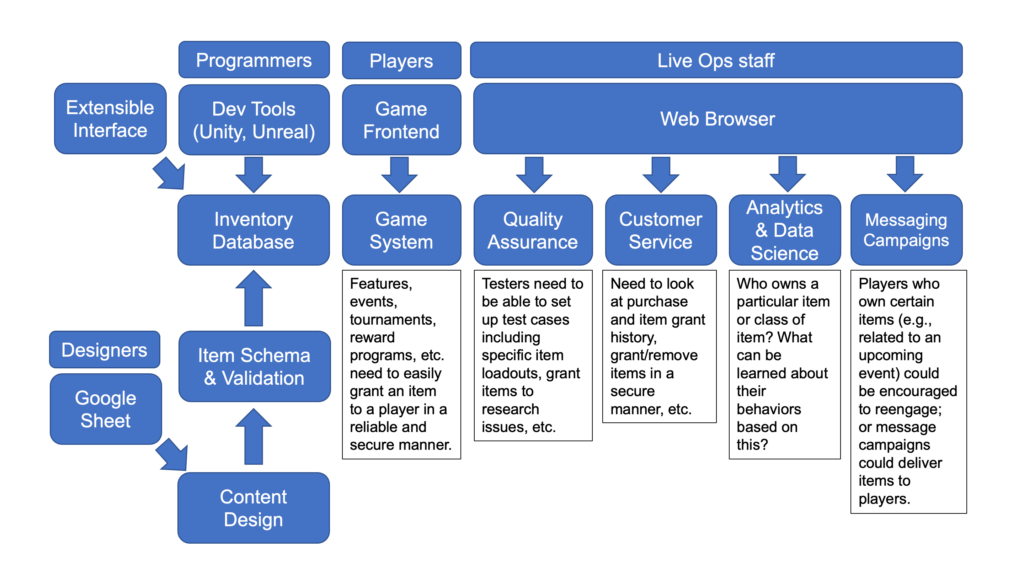
From this, we can see a number of systems are needed:
- Designing and maintaining the schema of items in the game
- Validators that check to make sure parameters assigned to items are within the appropriate bounds
- Connecting the game items to servers (to maintain state in the persistent world, enforce game rules in a server-authoritative manner, and update records atomically)
- Connecting the game items to the player experience (attaching them to front-end behaviors, UI, graphics)
- Facilitating Quality Assurance procedures (setting up test cases with specific item load-outs, investigating issues, etc.)
- Customer Service operations like looking at the item history for a player, adding/removing items and currencies, etc.
- Dashboards for analytics & user segmentation related to item utilization
- Forwarding of item data to sophisticated data science modules for applications like AI-driven offer optimization, advanced predictive modeling, lifetime value (LTV) prediction, etc.
- Messaging campaigns (targeting players with messages or device notifications who have obtained certain items–or gifting items as rewards to players)
Similarly, the types of people who need access to these systems–and the ideal interfaces for accessing these systems–are varied:
- Programmers usually prefer to work within their 3D engine environments
- Game designers might configure item schemas and attributes in a spreadsheet
- QA personnel may need access to a “cheat code” interface that grants/removes items
- Customer service needs a web-browser interface that lets them inspect account histories and make adjustments
- Product managers and data scientists need access to a combination of high-level dashboards as well as access to underlying item utilization data
- Marketing and live ops staff need to be able to create messaging campaigns that target specific segments of players
Off-the-Shelf Services
Beamable comes equipped with a number of stock services that make it easy to manage your game. Assigning items to events; account management interfaces for customer support to assign/revoke items; QA interfaces; and developer interfaces for Unity and Unreal are a few of these examples.
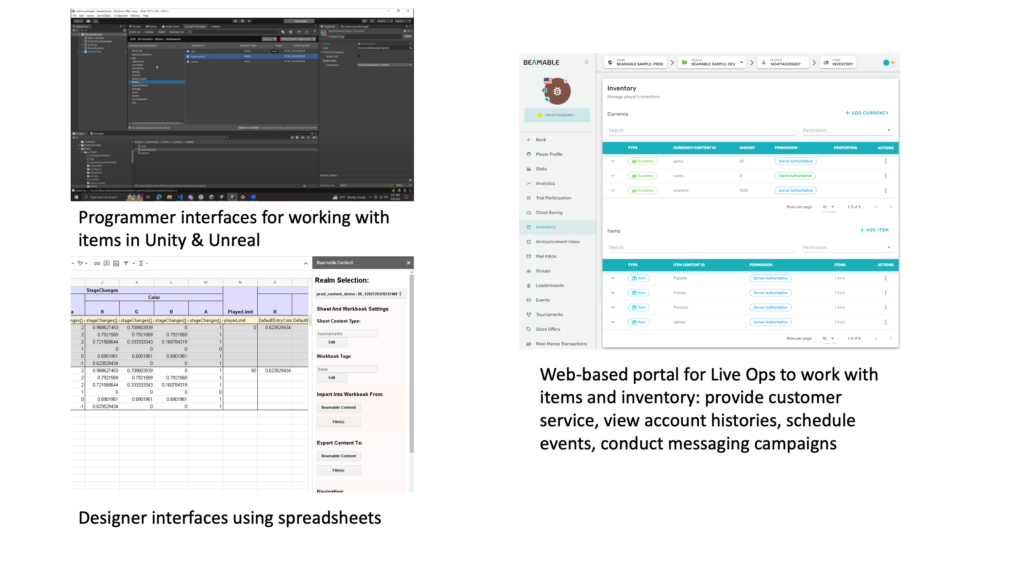
Deployment Process
Developers work on individual features that flow into a continuous integration (CI) process, while designers; content-creators make new items, and assign items to rewards, events, and systems; and all of these new items need to be tested, and then synchronized with live updates for players.
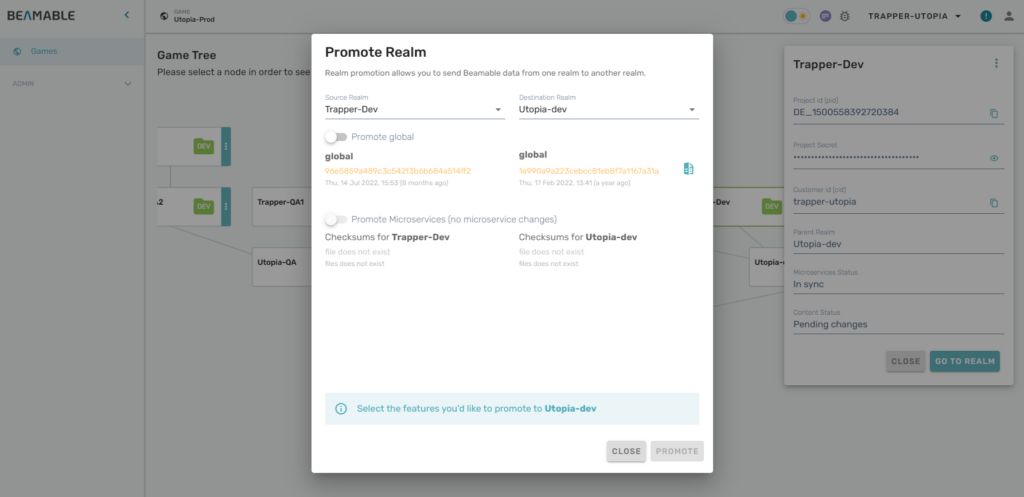
This progression from development to testing to production frequently involves a large number of manual processes and scripts which are usually brittle, cumbersome, and error-prone. Beamable deploys all of the item information alongside other code and content changes to ensure that the live game environment receives tested and appropriate updates–when and where you want them.
Access Controls
Since there are a variety of interfaces and user types, you’ll need an access control system to control who is able to perform specific actions across the various user populations–spanning all of the realms
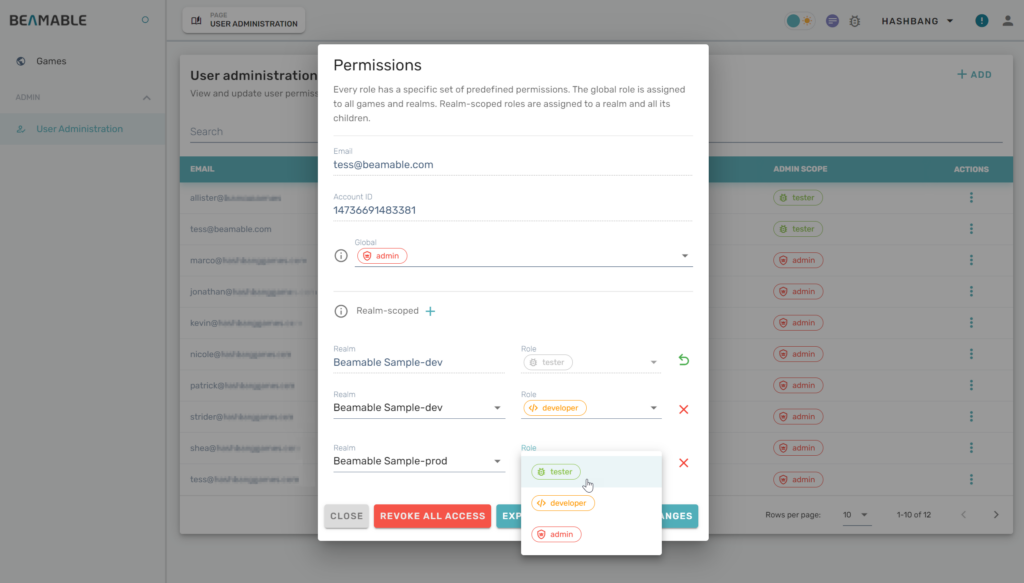
Validations
When a lot of people are involved in updating item data, errors can easily propagate–requiring complicated testing procedures. While testing is always a good idea, Beamable mitigates a lot of risk to your item economy by establishing validations. Because items are treated like another form of “content” in Beamable, they benefit from the same robust content validators that are built-in to the platform.
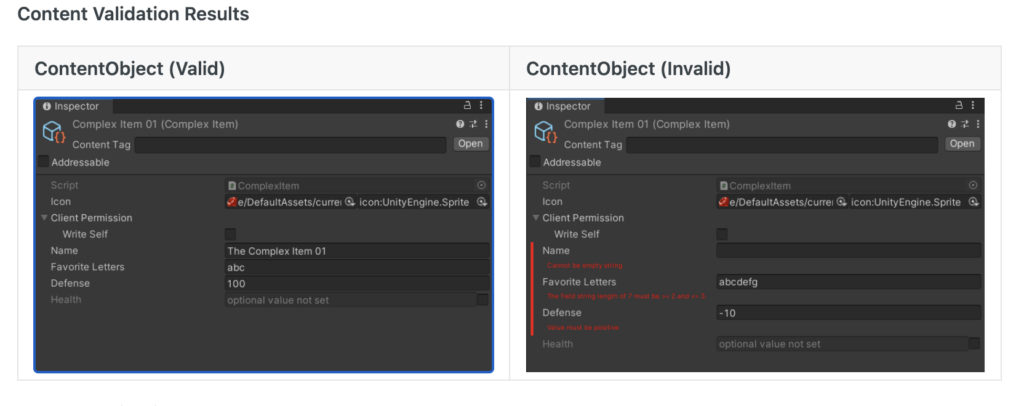
Full-stack Visibility and Extensibility
With Beamable, you have visibility into the entire software stack–including how you interact with data such as items. No more working with multiple IDEs, different data exploration UIs, or disconnected debugging processes. This is because the cloud-native microservices architecture Beamable is built around allows developers to locally instantiate the managed inventory environment, perform integrated debugging across both game frontend and backend, and add their own powerful extensions to how your game utilizes items.
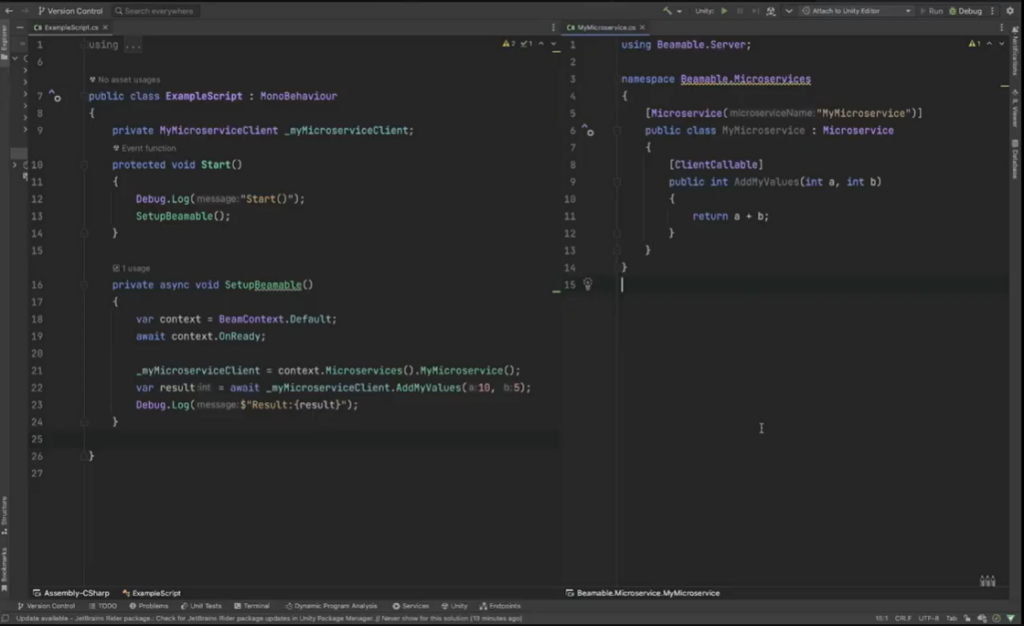
Extensibility
Because the Beamable environment is flexible and extensible, you can add your own capabilities–or easily integrate third-party functionality. Some of these use cases include:
- Automated integration of managed inventory with blockchains for Web3 games
- Hooks into Generative AI APIs to generate item art and descriptions as part of the production process–or live, while players enjoy the game
- Hooks into offer-optimization systems that look at purchasing histories and structure item bundles that maximize lifetime values
- Forwarding important events related to item assignment, consumption or economic transactions to analytics and data-science modules
Further Reading
Managed Inventory is just one part of Beamable’s fully-integrated platform for live services: an end-to-end system to accelerate the creation and operation of live games. Here are some ways to learn more about Beamable:
- Start playing with Beamable for free in our multi-tenant cloud
- Learn more about the Private Cloud edition–where you can run the entire Beamable software on your own infrastructure
- Download the Beamable Technology White Paper

Beamable LiveOps Portal Updates for March 2023
A variety of changes have been released for the Beamable Liveops Portal. Here is a collection of improvements, fixes, and additions.
General Improvements & Bug Fixes
- “Promote Realm” with the production realm as the source is now possible (with a warning displayed)
- Message Campaigns In-Game Mail campaigns support specifying an optional Category (similar to channel in Announcements)
Analytics Dashboard

- Retention table now distinguishes between 0% retention and unavailable data
- Retention table default date range window now only shows full days and no longer suffers from off by one
- Message Campaigns for Announcements now properly handle legacy Entitlement Attachments
Events & Leaderboards

- Player Events page will always show rewards
- Players > Events page now renders the event id as a link which takes you to the corresponding event details page
- Players > Events page now shows the leaderboard Id that a player has been assigned to (if available) and renders it as a link
- Clearing an entire leaderboard will no longer result in a 404 Error
- Removing player from leaderboard in Players > Leaderboards page no longer results in a malformed and failed request
- Players > Leaderboards section will load dramatically faster for customers with large numbers of leaderboards
Demo Project
- Fixed missing Microservices Deployment Status
- Fixed incorrect visualization for Player geolocation
Microservices
- Microservices now show “status” when they are deploying
- Portal users can now disable/enable Microservices and Storage Objects Operate > Microservices section
New Features
Portal Audit Log: Operations performed by Portal users are now logged in analytics and viewable from Realm > Analytics as a new table called client_portal_audit
Download Microservice Logs
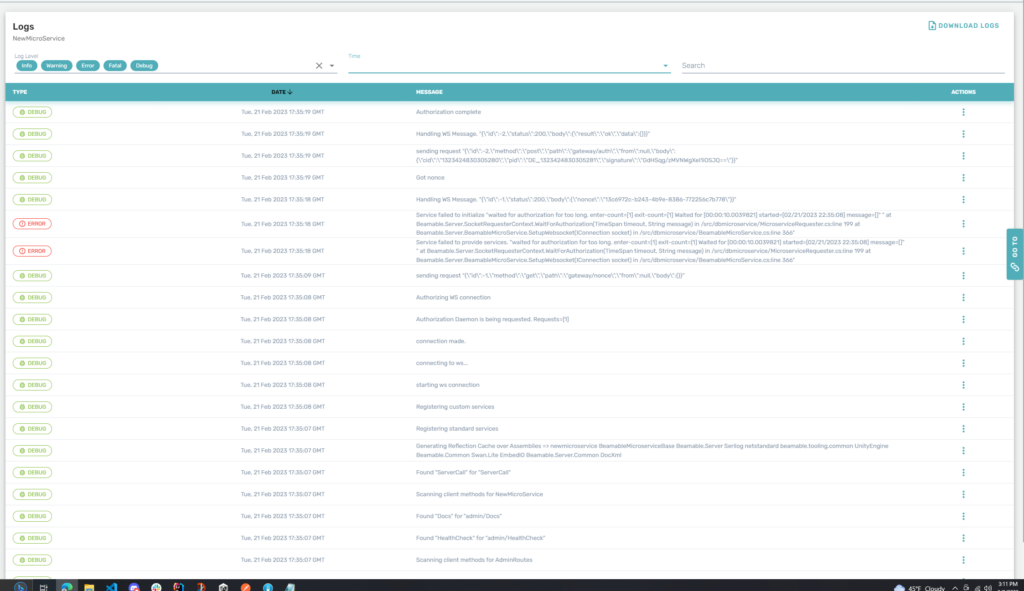
New “Download Logs” button will export view of logs into a flat file you can download
API & Microservice Usage
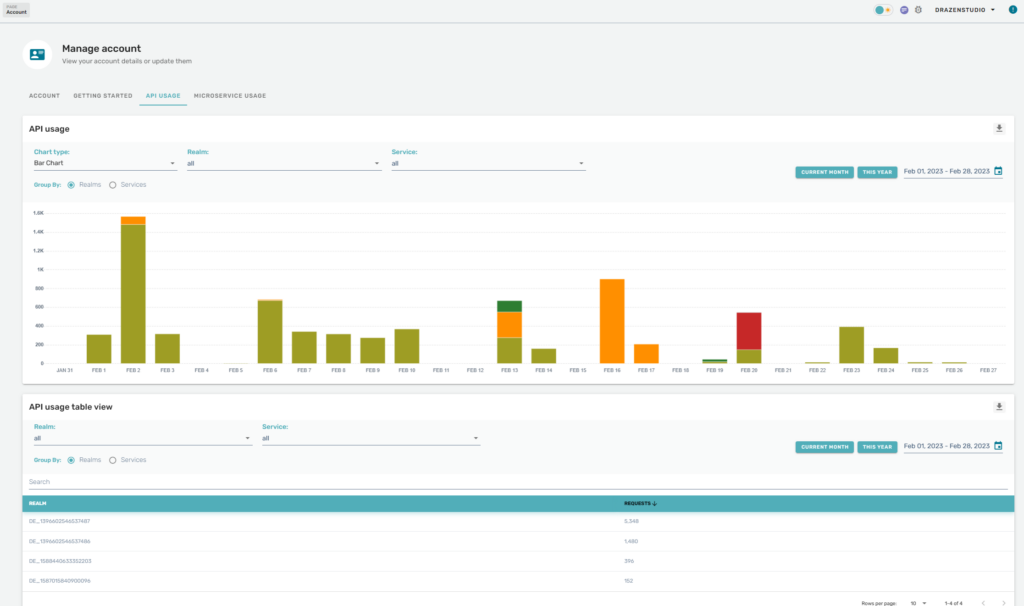
New api & microservice usage graphs segmented by realms and services now available in under Account > API Usage
NOTE: Not all api usage is billable. We will be adding a way to filter only billable apis in an upcoming update.
Mutable Event Rewards: Events now support changing Event Rewards for currently running events (as well as upcoming events)
Federated Identity
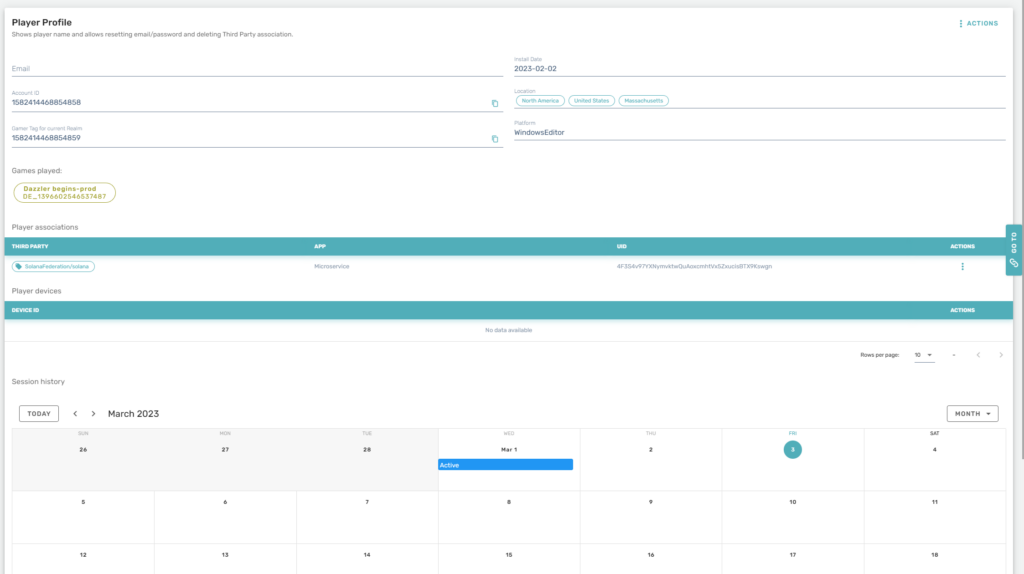
Player Profile will now show external, custom authentication schemes (such as web3 wallet association) under Player Associations alongside social login

Beamable February 2023 SDK Release Review
In February, Beamable released SDK versions 1.11.0, and 1.11.1. Here are the highlights from the previous month of releases.
Our changelogs can be found at https://beamable.github.io/changes
Federated Authentication and Inventory
In Beamable 1.11.0, you can add support for arbitrary external authentication, and manage Inventory state through arbitrary external third parties. Our documentation explains in more detail, but in short, you can use a Beamable Microservice to manage the secure interchange between Beamable authentication and whatever external authentication you need. Federated authentication could be used to integrate with Auth0, custom authentication solutions, or even blockchains. Federated inventory allows you to run custom logic on a Microservice anytime a player’s inventory would be modified, and act as the source of truth for the inventory state. The Federation of inventory enables you to manage a player’s inventory on a blockchain or back it up to a third-party source.
Presence SDK
Beamable 1.11.0 delivers a new Presence API and SDK that allows players to manage their online status. The documentation describes how to manage player presence. Any player can set their status to “invisible”, “do not disturb”, “away”, or “online”. Additionally, the presence update can include a free-text string to describe something unique about the status, such as “Playing level 4”, or “Sitting in the Lobby”. A player can view their friends’ presence status, and receive programmatic updates when the status changes.
SDK Enhancements and Bug fixes
In Beamable 1.11.0, the Player Inventory SDK received a few bug fixes, as well new methods to make managing inventory easier. There is a new method called UpdateDelayed that will enqueue inventory updates for a player and then send them in batch. For example, instead of sending 3 separate update requests in a short time span, the new method will wait for a short period of time, collect all the updates, combine them into 1 request, and then send the single request. This will help you manage your inventory API call volume.
Previously, in order to start using Beamable in code, you had to use code similar to the following,
ar ctx = BeamContext.Default;await ctx.OnReady;In Beamable 1.11.0, there is a new shortcut to get the BeamContext and await it all in one line,
var ctx = await BeamContext.Default.Instance;Change Logs
Beamable 1.11.0 and 1.11.1 also include a variety of bug fixes that you can review in our changelogs.

Beamable January 2023 Review
In January, Beamable released SDK versions 1.10.0, 1.10.1, 1.10.2, and 1.10.3. Here are the highlights from the previous month of releases.
Player Account SDK
In Beamable 1.10.0, we added a new accounts SDK that is observable, serializable, and collection based. Previously, in order to switch the active Beamable account, the only way was to use the ApplyToken method. Instead of manually managing TokenResponse structures, you can now use the BeamContext.Accounts. The new SDK exposes critical user stats like alias and avatar, as well as their credential information. Read about the new SDK on the Beamable documentation pages.
Content SDK Improvements
Previously, Beamable used an AssetDatabase.FindAssets call during Unity domain reloads to fetch and manage local Beamable Content. Now, in Beamable 1.10.0, the FindAssets call has been removed and replaced with a custom solution. The new process uses a class called ContentDatabase which does a single file scan and caches data until the next domain reload. Additionally, large-scale content interactions with the Content Manager are much faster in Beamable 1.10.0. Previously, anytime large sections of content were added or removed, the operation would happen serially for each content object. Now, those operations are done in bulk which improves the performance dramatically.
Dependency Provider in C#MS
Microservices have supported a form of dependency injection, but in Beamable 1.10.0, you can use the same dependency injection conventions that the Unity SDK uses. The IDependencyBuilder and IDependencyProvider are available in the ConfigureServices and InitializeServices methods. These types allow you to configure singletons or other services and access them from client-callable methods without the use of static keywords.
Change logs
Our full changelogs can be found at https://beamable.github.io/changes

Goplay Partners with Beamable
Goplay’s free and simple platform rewards a gamer’s physical activity to motivate player spend outside of your game. By integrating with Beamable C# Microservices, game developers can effortlessly and securely add Goplay to their game and take advantage of commerce integration to provide in-game items and currencies as rewards to players.
Why Goplay?
Research shows that only a mere 2% of gamers choose to spend money in free-to-play games. Additionally, 80% of gamers do not get enough physical activity. With Goplay, gamers can engage in physical activity in the real world and use the Goplay currency, GoBits, to unlock discounts and rewards within their games. This allows players to earn in-game currency for linked games even when they are not playing, and provides game developers with a source of passive revenue 24 hours a day.
Goplay already integrates with Playfab, Unity Game Services and custom backends, and now it integrates with Beamable to make implementation into your game an easy project for your team.
If you are a Beamable developer or are a game developer looking to increase your conversion metrics (who isn’t?), head over to https://goplay.io/ and check it out!
